
















CPUT Sustainable Heritage Research Unit in partnership with South African Heritage Resources Agency
Heritage structures, when subjected to disasters –whether natural or man-made – or simply to ageing over time, can face significant challenges in preservation and restoration. This concern underpinned the initiation of a research journey in 2018, focusing on the restoration and conservation of heritage structures. Several notable instances illustrate the urgency and importance of this research.

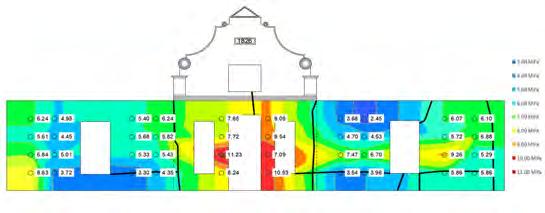
For example, historical buildings on the Upper Campus of UCT and the South African National Assembly, a National Heritage site located in Cape Town’s CBD, suffered severe damage due to fires in 2021 and 2022, respectively. These events highlight the vulnerability of heritage structures to catastrophic events and highlight the critical need for effective conservation strategies to preserve our cultural and historical heritage for future generations.
These two buildings hold historical significance in the larger community of Cape Town, and South Africa as a whole. These devastating disasters have seen the loss of important artefacts in these structures and the loss of aesthetic visual representation, which could have adverse effects on tourism. It is the responsibility of civil engineers, historians, archaeologists, environmentalists and the community to join forces in restoring these structures to their previous state, not just for tourism purposes but also for future generations to fully experience the works of their great-grandparents.

Investigations have shown that the conservation and restoration of heritage structures in South Africa has mainly been conducted using incompatible materials. This practice often leads to repeated restoration needs due to premature repair failures. To combat the incompatible restoration of heritage structures, mortars in particular, Prof Kumar Pallav and Dr Maphole Loke started working on a ground-breaking research project during 2018 and 2019. The master’s research conducted by Dr Loke under Prof Kumar and Prof Haldenwang’s supervision focused on formulating a standard protocol for restoring heritage structures.
In general, the procedure involves investigating the original material properties before any restoration work commences. This provides insights into the material’s physical, chemical, mineralogical and mechanical properties. The research also developed a contour mapping of material properties through NDT methods and analysed the Non-Pareille Manor House, situated on the Dal Josafat farmlands in Paarl. Mr Riaan Victor worked on this as a part of his master’s dissertation.
Such information becomes useful during the design of the new restoration materials. Further doctoral research work by Dr Loke focused on the design and development of heritage repair mortars, providing in-depth details of a procedure to be followed for designing compatible and durable restoration mortars for sections of the Castle of Good Hope and buildings on Robben Island. While
conducting field study for the master’s research, Dr Loke and Prof Kumar initiated collaboration with the South African Heritage Resources Agency (SAHRA). So far, they have showcased their research to the agency executives and were invited to present their research at the SAHRA National Heritage Week in 2022 and 2023. They further contributed to the South African community through participation in the Robben Island Museum (RIM) Research Strategic Plan, where the research idea was presented to RIM executives and board representatives.
The research gained international recognition as it was presented at the IEEE 11th International Conference on Mechanical and Intelligent Manufacturing Technologies (ICMIMT) (2020); the International Triple Helix Conference (2020); the International Conference of Structural Analysis of Historical Constructions in Barcelona (2021) (where it was the only African region conference paper presented); and Structural analysis of heritage Construction (SAHC) in Japan (2023). Dr Loke further represented South Africa and Robben Island at the UNESCO WHIPIC Workshop on Heritage Interpretation and Presentation (in partnership with the African World Heritage Fund) in Namibia (2023). This further contributes to introducing the research concept among a broader audience all over the African continent.
As part of building research relations and collaborations with international experts, Prof Kumar and Dr Loke were


The head of the Sustainable Heritage Research Unit (SHRU) is Prof Kumar Pallav (associate professor, Erasmus Mundus fellow, Chartered Engineer), of Civil Engineering and Geomatics, FEBE.
He can be contacted by email at kumarp@cput.ac.za
invited on a research exchange programme, fully funded by CPGS, at the University of Granada, Spain in 2022. They were hosted by Prof Giuseppe Cultrone. Through such collaborations, this research work has been published in Springer, Elsevier and the International Journal of Conservation Science among others.
Primary Material Cards (PMCs) were developed in 2020 to assist in the preparation of mixtures for restoration purposes, specifically for historical sites like the Castle of Good Hope and Robben Island. These cards provide detailed information about the original materials used in the construction of these sites, ensuring that any restoration work uses compatible and durable materials.
The Castle of Good Hope, built between 1666 and 1679, and Robben Island, with structures dating from the 1700s to the 1800s, both require careful restoration to preserve their historical integrity. PMCs help identify the characteristics of the original mortars used, such as the binder-to-aggregate ratio, types of binders (like hydraulic lime), and aggregates (such as sand and seashells) used in the original construction.
These cards are crucial for maintaining the authenticity and durability of restoration efforts, preventing the use of incompatible materials that could accelerate deterioration.
The conservation of heritage structures is a complex task that requires a careful balance between historical authenticity and modern preservation materials. The inventions of new materials need to be carefully assessed before they can be employed in heritage structures in order to achieve sustainable conservation practices. As there is an undeniably high global interest in preserving cultural heritage, such research is vital for developing strategies that protect and maintain our shared history through structures.
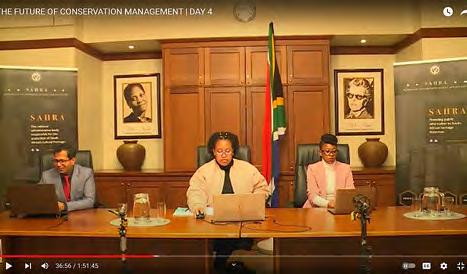


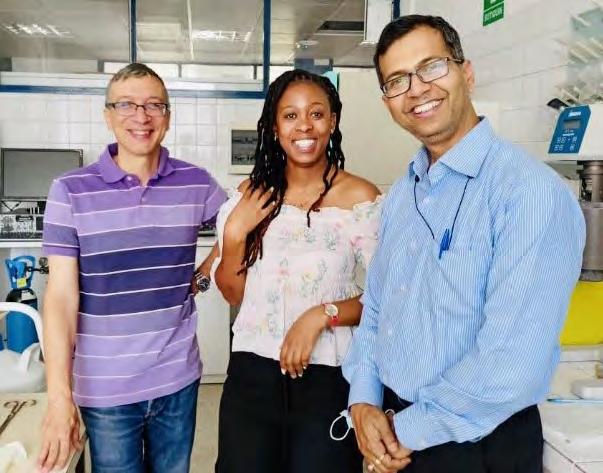



PROF CHRIS NHLAPO
As I write this foreword, I take immense pride in reflecting on our university’s remarkable journey toward realising our ambitious dream of becoming the MIT of Africa. Our vision extends beyond being a mere destination; it embodies an unwavering commitment to upholding excellence, fostering innovation, and conducting transformative research with farreaching impacts on our communities, our continent, and the world.
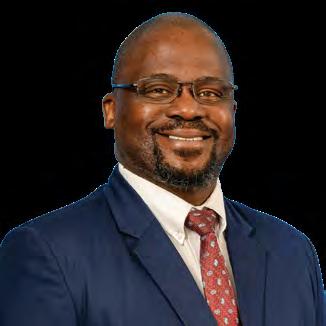
Over the past year, our institution has made significant strides in building a unique ‘smart university’. This concept, which combines high-tech solutions with high-touch relationships, ensures that we leverage cutting-edge technologies while remaining deeply connected to the needs and aspirations of our students, faculty and partners. Our research initiatives, particularly those aligned with the United Nations’ Sustainable Development Goals, have been at the forefront of this endeavour.
Our commitment to STEM (Science, Technology, Engineering, and Mathematics) education and research has become one of the pillars of our research agenda. This commitment empowers the next generation of innovators and thought leaders. Through interdisciplinary collaborations, we have developed programmes that enhance technical skills and foster critical thinking and creativity among our students. Our holistic approach aims to prepare students to tackle complex global challenges. In the field of satellite technology research, CPUT is increasingly emerging as a global leader. We are harnessing the potential of spacebased solutions to address pressing issues such as climate change, food security, and disaster management. Our research
teams are pioneering advancements contributing to sustainable development, demonstrating how technology can be a powerful tool for positive change.
I am also honoured to highlight the transformative work at the South African Renewable Energy Technology Centre (SARETEC), where we have established ourselves as a leader in renewable energy. Our commitment to innovation in this critical field has not only attracted global funding and interest, but has also positioned us at the forefront of addressing some of the most pressing challenges of our time. Research done at SARETEC is not just an academic pursuit, but a guiding light that shows the way to sustainable futures. We are committed to creating renewable energy solutions that empower communities, generate jobs, and promote economic growth.
I invite you to explore the pages of this report and celebrate the achievements of our faculty, students, and partners, as this report highlights the dedication and ingenuity of our researchers, who continue to push boundaries and challenge the status quo. Their work exemplifies the spirit of inquiry and collaboration that defines our institution. Lastly, and as I consider CPUT’s future, I am confident our collective efforts will propel us closer to our vision of becoming a beacon of knowledge and innovation on the African continent. Together, we are not just dreaming of a better future, but actively creating it – one research project at a time.
I am deeply appreciative of the unwavering support from the CPUT community and our valued partners. Together, we look forward to a future filled with continued collaboration and success.

CPUT celebrated the recipients of the VC’s Prestigious Achievers Awards during a ceremony held at the Bellville Campus in November. The purpose of the awards is to provide financial support to CPUT students on their journey to completing their master’s or doctoral studies. It is aimed at students who have achieved excellent results throughout their academic studies and who show the potential to contribute to society. The 2023 recipients each received a certificate during the ceremony and were allowed to present their research topics. They were also given an opportunity to share their stories.
The 2023 recipients are:
• Ms Oritonda Muribwathoho (DEng: Chemical Engineering), ‘Development of metal matrix composites suitable for hulls and ship decks’
• Ms Murendeni Nethengwe (DPhil Biomedical Sciences), ‘Evaluation of antioxidant potential and mechanism of action of phenolic compounds from South African indigenous plants used in the management of diabetes-related male infertility’
• Mr Shaun Mgoma (DEng: Chemical Engineering), ‘Recover y of valuable compounds from agricultural food using green technologies: Process design and techno-economic analysis’
• Ms Bongisiwe Zozo (DPhil: Chemistry), ‘Purification and characterisation of the native black soldier fly larva protein’
• Mr Mzoxolo Ntabeni (MEng: Civil Engineering), ‘The influence of academic and industry-specific project management qualifications on the effectiveness of project managers in the construction industry’
• Ms Nontle Mbana (DEng: Mechanical Engineering), ‘Development of an optimal fabrication procedure for producing aluminium-based surface composites’
• Ms Sindisiwe Ntsondwa (DEng: Chemical Engineering), ‘Development of catalysts for enhancement of H2 sorption kinetics for intermetallic hydride storage application’
• Mr Mfundo Radebe (Master of PR & Communication Management), ‘An assessment of the integration of social media in news production in selected community radio stations in Gqeberha’
The awardees all thanked the donors and the committee for their investment in their education. Ms Murendeni Nethengwe, working towards her DPhil Biomedical Sciences, said not only had the award helped her to focus on her studies without worrying about finances, but it has also boosted her confidence. She said she would continue to strive to make a difference in her community.
Prof Joseph Kioko, Chair: VC’s Prestigious Achievers Awards Committee, noted that since the programme’s inception in 2018, 21 students have received awards. Of these, 13 have successfully completed their degrees, with 10 having graduated so far. He thanked the programme’s donor, the Mauerberger Foundation Fund, under the leadership of Adv Dianna Yach. “The impact of the Foundation’s generosity and support for our students will ripple across many generations in many communities.”
VC Prof Chris Nhlapo said the awards are bestowed annually to deserving students who have shown academic excellence and are an embodiment of the CPUT graduate attributes. “This afternoon, we are celebrating people who think they can, we are celebrating people who have demonstrated the power of choice.” Adv Yach said, “I want to congratulate you all on your outstanding academic achievement, but I also want to stress, it’s not so much the theories and the ideas that we gather through reading and knowledge seeking, it’s the human factor that makes the difference.”

Met die skryf van hierdie voorwoord, is ek baie trots daarop om na te dink oor ons universiteit se merkwaardige reis na die verwesenliking van ons ambisieuse droom om die MIT van Afrika te word. Ons visie strek verder as ’n blote bestemming; dit beliggaam ’n onwrikbare verbintenis daartoe om uitnemendheid te handhaaf, en om innovasie en die uitvoering van transformerende navorsing wat ’n verreikende impak op ons gemeenskappe, ons vasteland en die wêreld het, te bevorder.
Die afgelope jaar het ons instelling aansienlike vordering gemaak met die bou van ’n unieke ‘slim universiteit’. Hierdie konsep, wat hoëtegnologie-oplossings met hoë-aanrakingsverhoudings kombineer, verseker dat ons voorpunttegnologieë benut, terwyl ons diep verbind bly tot die behoeftes en aspirasies van ons studente, personeel en vennote. Ons navorsingsinisiatiewe, veral dié wat in ooreenstemming is met die Verenigde Nasies se doelwitte vir volhoubare ontwikkeling, was aan die voorpunt van hierdie poging.
Ons verbintenis tot STEM (Wetenskap, Tegnologie, Ingenieurswese en Wiskunde) -onderwys en navorsing het een van die pilare van ons navorsingsagenda geword. Hierdie verbintenis bemagtig die volgende generasie innoveerders en denkleiers. Deur interdissiplinêre samewerking het ons programme ontwikkel wat tegniese vaardighede verbeter en kritiese denke en kreatiwiteit onder ons studente bevorder.
Ons holistiese benadering het ten doel om studente voor te berei om komplekse globale uitdagings aan te pak. Op die gebied van satelliettegnologienavorsing tree KSUT toenemend na vore as ’n wêreldleier. Ons benut die potensiaal van ruimtegebaseerde oplossings om aandag te skenk aan dringende kwessies soos klimaatsverandering, voedselsekerheid en rampbestuur. Ons navorsingspanne doen baanbrekerswerk wat bydra tot volhoubare ontwikkeling, en dien as toonbeeld van hoe tegnologie ’n kragtige instrument vir positiewe verandering kan wees.
Dit is ook vir my ’n voorreg om die transformerende werk by die Suid-Afrikaanse Hernubare Energie Tegnologiesentrum (SARETEC) uit te lig, waar ons onsself as ’n leier in hernubare energie gevestig het. Ons verbintenis tot innovasie in hierdie kritieke veld het nie net wêreldwye befondsing en belangstelling gelok nie, maar het ons ook aan die voorpunt geplaas om sommige van die dringendste uitdagings van ons tyd aan te spreek. Die navorsing wat by SARETEC gedoen word, is nie net ’n akademiese strewe nie, maar ’n rigtinggewende lig wat die weg na ’n volhoubare toekoms baan. Ons is daartoe verbind om hernubare energie-oplossings te skep wat gemeenskappe bemagtig, werksgeleenthede genereer en ekonomiese groei bevorder.
Ek nooi jou uit om die bladsye van hierdie verslag te verken en die prestasies van ons personeel, studente en vennote te vier,
aangesien hierdie verslag die toewyding en vindingrykheid van ons navorsers beklemtoon, wat aanhou om grense te verskuif en die status quo uit te daag. Hul werk is ’n voorbeeld van die gees van ondersoek en samewerking wat ons instelling definieer. Laastens, en terwyl ek KSUT se toekoms oorweeg, is ek vol vertroue dat ons gesamentlike pogings ons nader sal dryf aan ons visie om ’n baken van kennis en innovasie op die Afrika-kontinent te word. Saam droom ons nie net van ’n beter toekoms nie, maar ons is besig om dit aktief te skep – een navorsingsprojek op ’n slag.
Ek is opreg dankbaar vir die getroue ondersteuning van die KSUT-gemeenskap en ons gewaardeerde vennote. Saam sien ons uit na ’n toekoms van voortgesette samewerking en sukses.
The VC’s STEM Symposium is a celebration of Science, Technology, Engineering, Mathematics and Innovation. It involves various stakeholders who participate by conducting STEM activities during National Science Week (NSW) in August. Supplemented with funding from the UCDG of DHET, CPUT celebrated by bringing together STEM learners, students, practitioners, educators, industry and government in celebration of NSW with the theme ‘Transforming lives through evidence-based science’. The NSW Project Team, comprising Mr David Haarhoff, Mr Frikkie George, Ms Wardah Peck and Ms Jean Collins, coordinated a myriad of activities throughout the week.
SLCE commenced NSW with a STEM Roadshow to high schools in De Doorns, Laingsburg and Beaufort West. Approximately 2 300 learners benefited from the roadshow conducted in partnership with Western Cape Government’s Mr Mark de Bruin, local government of the Central Karoo, and Ms Monica Warden of Government Communication Information Systems. Students and staff from FEBE and FAS delivered presentations and demonstrations on the STEM themes. In Beaufort West, Mayor Ashley Sauls and Dr Anthony Obilana of CPUT’s Food Sciences & Technology addressed parents and learners.
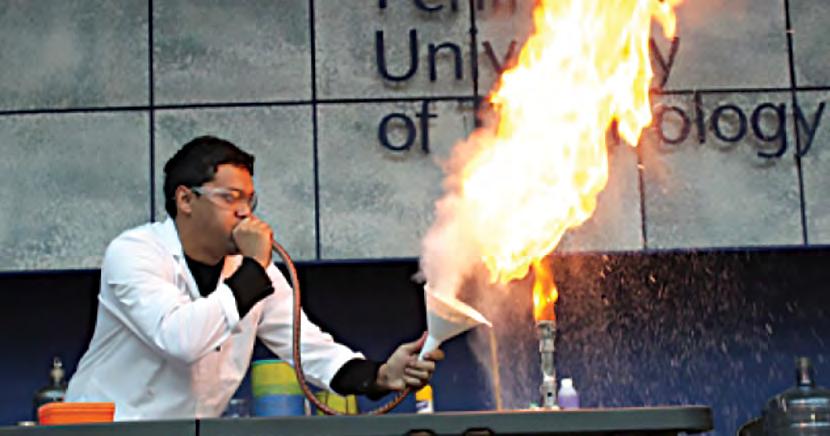
VC Prof Chris Nhlapo gave the welcoming address and emphasised the significance of STEM at both schools and universities. He also highlighted the importance of equality within the STEM sector. The VC advocated for more females to join the sector, which sentiment was echoed by the ED in the VC’s Office, Prof Hay-Swemmer, in her motivational speech. Dr Marco Adonis, HOD: Electrical, Electronic & Computer Engineering, delivered a thought-provoking presentation on the 2022 global electricity statistics and the centralised versus decentralised generation of energy. Dr Adonis emphasised the importance of generating a diversity of energy supply for a sustainable energy future, and that diversity allows for flexibility and security, as it is South Africa’s strength.
Master’s student, Mr Ridaa Manuel, emphasised the importance of turning ideas into action. Mr Manuel is the founder of Green New World, an initiative focused on developing low-cost, renewable energy solutions for Africa. He is currently employed at UWC as coordinator of the Energy Storage Graduate Programme at the Energy Storage Innovation Lab. Mr Ndumiso Mshicileli, Manager: ATS explained the significance of millets in fostering holistic physical and mental health. Mr Mshicileli highlighted how incorporating these into one’s diet can enhance overall well-being and support sustainable agricultural practices.
Symposium delegates were welcomed in the Major Sports Hall by a dynamic and entertaining demonstration by Ahmr Chippendale from the Cape Town Science Centre. “Delegates expressed their excitement and indicated how thoroughly they enjoyed the demonstration,” said SLCE’s Mr David Haarhoff.
Njengokuba ndibhala la magqabantshintshi, ndiyazingca ngokucinga ngohambo olumangalisayo lweyunivesithi yethu ekufezekiseni iphupha lethu lokuba yiMIT (Massachusetts Institute of Technology) yaseAfrika. Umbono wethu udlulela ngaphaya kokuba yindawo nje esisingise kuyo; iquka ukuzinikela okungagungqiyo ekuxhaseni ukugqwesa, ukukhuthaza ukusungula izinto ezintsha, kunye nokuqhuba inguqu kuphando oluneempembelelo ezifikelela kuluntu lwethu ngokubanzi, kwilizwekazi lethu kunye nehlabathi.

Kulo nyaka uphelileyo, iziko lethu lenze imitsi ebonakalayo ekwakheni ‘iyunivesithi ekrelekrele’ eyahlukileyo. Lo mbono, odibanisa izisombululo zobuchwepheshe eziphezulu kunye nobudlelwane obuphezulu, iqinisekisa ukuba sixhasa ubuchwepheshe obuphambili ngelixa sihlala sinxibelelene ngokunzulu kwiimfuno kunye neminqweno yabafundi bethu, eyefakhalthi kunye nayamaqabane esisebenzisana nawo. Amanyathelo ethu ophando, ngakumbi lawo ahambelana neeNjongo zoPhuhliso oluZinzileyo zeZizwe eziManyeneyo, ebephambili kulo mzamo.
Ukuzinikela kwethu kwimfundo kunye nophando lweSTEM (iNzululwazi, ubuChwepheshe, ubuNjineli, kunye neZibalo) luyenye yeentsika ze-ajenda yethu yophando. Oku kuzibophelela kuxhobisa isizukulwana esilandelayo sabaqambi kunye neenkokeli
zokucinga. Ngentsebenziswano phakathi kweenkalo ngeenkalo, siye saqulunqa iinkqubo eziphucula izakhono zobugcisa kunye nokukhuthaza ukucinga okunzulu kunye nobuchule phakathi kwabafundi bethu. Indlela yethu epheleleyo ijolise ekulungiseleleni abafundi ukuba bajongane nemingeni enzima yehlabathi. Kwinkalo yophando lobuchwepheshe besathelayithi, iCPUT ikhula ngokukhula njengenkokeli kwihlabathi. Sisebenzisa amandla ezisombululo ezisekelwe kwindawo ukujongana nemiba ecinezelayo efana nokutshintsha kwemozulu, ukhuseleko lokutya, kunye nolawulo lweentlekele. Amaqela ethu ophando angoovulindlela kwinkqubela phambili anegalelo kuphuhliso oluzinzileyo, ekwabonisa indlela ubuchwepheshe ekunokuba sisixhobo esinamandla sotshintsho oluhle.
Ndikwanewonga ukuqaqambisa umsebenzi wenguqu okwiZiko lobuChwepheshe laMandla aHlaziywayo laseMzantsi Afrika (iSARETEC), apho sizimise njengenkokheli kumandla ahlaziyiweyo. Ukuzibophelela kwethu ekuqaliseni izinto ezintsha kule nkalo ibalulekileyo akutsalanga nje inkxaso-mali kunye nomdla kwihlabathi jikelele, kodwa kusibeke phambili ekujonganeni neminye imingeni enzima yexesha lethu. Uphando olwenziwe kwiSARETEC alukho nje ukufuna imfundo, kodwa ukukhanya okukhokhelayo okubonisa indlela yekamva elizinzileyo. Sizibophelele ekudaleni izisombululo zamandla ahlaziyiweyo ezixhobisa uluntu, zivelise imisebenzi, kwaye zikhuthaze ukukhula koqoqosho.
Ndiyanimema ukuba nihlolisise amaphepha ale ngxelo kwaye nibhiyozele impumelelo yefakhalthi yethu, eyabafundi bethu, kunye neyamaqabane ethu, njengoko le ngxelo ibonisa ukuzinikela kunye nobuchule babaphandi bethu, abaqhubeka betyhala imida kwaye bekwacela umngeni kwimeko emiyo. Umsebenzi wabo ungumzekelo womoya wokuphanda kunye nentsebenziswano echaza iziko lethu. Okokugqibela, nanjengoko ndicinga ngekamva leCPUT, ndiqinisekile ukuba iinzame zethu ezihlangeneyo ziya kusisondeza kumbono wethu wokuba sisibane solwazi kunye nokwenziwa kwezinto ezintsha kwilizwekazi laseAfrika. Sikunye, masingaphuphi nje ngekamva elingcono kodwa masikhuthalele ukulenza - iprojekthi yophando enye ngexesha.
Ndinombulelo ongazenzisiyo ngenkxaso engagungqiyo esiyifumana kuluntu lwaseCPUT kunye namaqabane ethu axabisekileyo. Sikunye, masijonge phambili kwikamva elizaliswe yintsebenziswano eqhubekayo kunye nempumelelo.

Gathering on the Bellville Sports fields
VC Prof Chris Nhlapo delivered his State of the University address to hundreds of staff members at the Bellville Campus in March. Prof Nhlapo welcomed the staff members, who were dressed in blue and white and travelled from the various campuses to attend the event. The VC highlighted some of the progress made last year and how this aligns with the institution’s Vision 2030 aspirations. These successes include CPUT playing a pivotal role in launching Africa’s first constellation of satellites. The satellites ensure that South Africa’s marine and coastal resources are secured, and put CPUT at the forefront of Africa’s space ambitions. The university has also partnered with Eskom to play its part in solving the country’s crippling energy crisis. SARETEC is working with Eskom to reskill workers from decommissioned power stations to be retrained in critical renewable energy sectors.
Through its Faculty of Education, CPUT was the first institution to develop a Diploma in Early Childhood Care and Education, which is scheduled for application from 2024. The institution has also
rolled out a suite of new qualifications, like the Postgraduate Diploma in Mathematical Sciences, which has a strong foundation in Data Science. Prof Nhlapo said CPUT is the university of choice for the people of South Africa. The university has space for 18 500 students in campus accommodation with a plethora of alternatives.
“No other university can boast housing 43% of its student body in residence the way we can. And while it may not be perfect, I believe our student-centric approach to housing has been a game changer. Today, I commend the staff members who are at the coalface of this challenge, the ones who work late into the night and through weekends to vet and place these walk-ins.”
He added that CPUT received over 450 000 applications for study in 2023. “My reflections on 2022 were done so that we can see the value of planning appropriately and sowing seeds today, so that we can reap benefits later. There is always a choice as to how to best use our limited time, I hope I have sparked an idea in you on what your future self can look like when we meet here again in 2024.”
In October, VC Prof Chris Nhlapo led distinguished guests, including EM and former VC Prof Brian Figaji, in the re-launch of the Dome of Remembrance and Achievements at the Bellville Campus. Through the Dome, CPUT proudly commemorates the exceptional accomplishments of its esteemed alumni, dedicated staff, students and cherished friends in life and death. This emotive homage is a demonstration of people’s exceptional roles regarding advancing CPUT’s mission and vision.
“We are gathered today at this sacred place to re-launch the Dome of Remembrance. The Dome has always stood proudly nestled in the very heart of our magnum opus – the pristine Bellville Campus,” said Prof Nhlapo. He said while much has changed, the purpose of the Dome has remained the same. “It was built to commemorate the exceptional accomplishments of its esteemed alumni, dedicated staff, and cherished friends who have passed on. This poignant
tribute is a testament to their unwavering commitment to the excellence and betterment of CPUT,” said Prof Nhlapo.
In 2018, Prof Nhlapo began a series of discussions with former CPUT heritage institution leaders, Dr Franklin Sonn, Prof Figaji, the late Prof Marcus Balintulo, Dr Johan Tromp and many student leaders of the time. It’s where the idea of reimagining the Dome of Remembrance was explored. The stakeholders agreed that acknowledgement of those who have helped to build CPUT was critical. “So, it’s with a sense of pride that I stand here today knowing that we have made good on that promise… We cannot be serious about the claims of One Smart CPUT if we do not take projects like the Dome of Remembrance seriously,” said the VC. He also acknowledged the staff members “who have worked tirelessly behind the scenes to bring this digitisation project to life”.
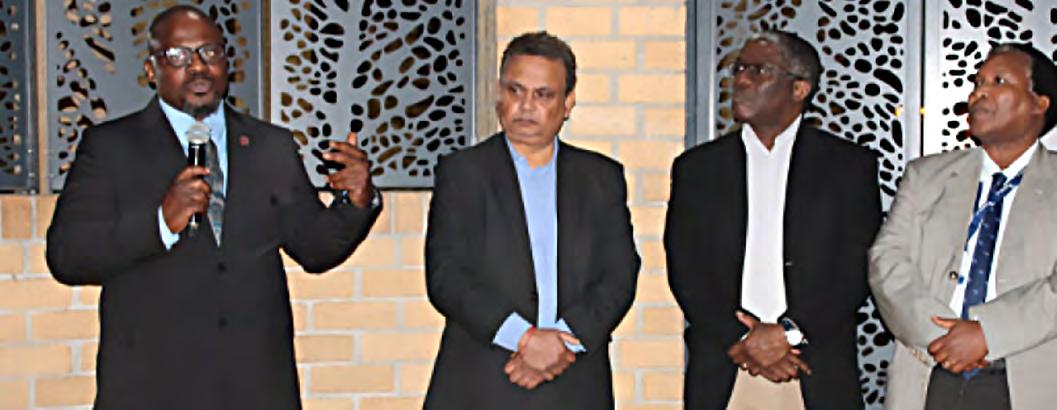
Five proud recipients of the VC’s Prestigious Achievers Awards celebrated their graduations in April this year. These awards are bestowed annually upon deserving students who have demonstrated academic excellence and embody the CPUT graduate attributes. The purpose of the awards is to provide financial aid to CPUT students who have achieved outstanding results throughout their academic studies and show potential to contribute to society, enabling them to complete their master’s or doctoral studies.
The five graduates are:

- Dr Justine Angadam: PhD in Environmental Health, ‘Plant digestive enzymes for semi-deligni-holocellulolysis of agro-waste’
- Ms Nolimo Mbunge: MBA in Project Management, ‘Critical generic skills for successful construction-project execution from conception to project close within the Cape Metropole
- Dr Caroline Tya vambiza: PhD in Biomedical Sciences, ‘An in vitro evaluation of the wound healing properties of Cotyledon orbiculata extracts and its silver nanoparticles’
- Dr Zamavangeli Mdletshe: DEng in Mechanical Engineering, ‘Development and testing of a renewable energy-based thermal desalination system’
- Ms Anza Ramatsia: Master of Sport Mana gement, ‘Contemporary challenges facing female senior managers in selected sport organisations in South Africa’
Dr Tyavambiza said being a recipient of the VC’s Prestigious Achievers Award helped her to go on when she felt like she didn’t want to continue. “Not only did it assist me financially, but it also gave me the encouragement and confidence that l needed to finish my studies. ln my lowest moments, when felt like quitting, I would tell myself that if the VC of our whole university put his confidence in me then indeed l must be special, l can do this. l will always be grateful for receiving this award.”
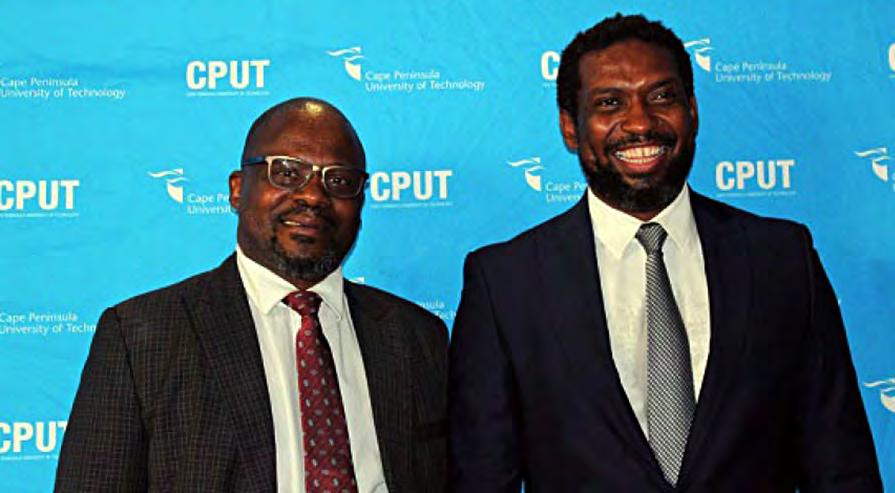
CPUT hosted its first Research Indaba on GBV in Higher Education in March, under the theme ‘Crafting trends, patterns and awareness intervention to combat GBV’. The purpose of the two-day event was to share lessons, strategies, interventions, practices, and research agendas on:
- Enhancing integrated, multisectoral coordination and collabora tion on gender equality and women empowerment to combat GBV in higher education
- Addressing changed behaviours, social norms, and inter ventions that drive GBV for students and staff
- Enhancing sustainable and survivor-centred response, care, and support services for students and staff
- Sustaining responsive, efficient, safe and secure campus protection
- Ensuring evidence-based research and integration of research focus areas
- Integrating realist evaluation approaches aimed at developing GBV interventions to existing social problems to bring about social change
The keynote speakers on the first day were the Deputy Minister of Higher Education, Science and Innovation, the Honourable Buti Manamela, and Prof Mzikazi Nduna, Dean of the Faculty of Health Sciences at the University of Fort Hare, who addressed the topic of ‘SDGs and GBV: Locating the higher education sector’. CPUT VC Prof Chris Nhlapo welcomed attendees and said that to give effect to the Department of Higher Education, Science and Innovation’s Policy Framework to address GBV in the Post-School Education and Training System, CPUT has put in place a high-level GBV Committee, which is chaired by the VC. He said the institution maintains a zero-tolerance stance on GBV.
Mr Manamela said that according to the World Health Organisation, over a quarter of women aged between 15 and 49 years have been subjected to physical and/or sexual violence by their intimate partner at least once in their lifetime since age 15. Globally, as many as 38% of all murders of women are committed by intimate partners. “We are implementing various programmes and support structures for students and frontline staff at institutions of higher learning. The programmes are offered on 420 campuses across the country.”
An emotional candle-lighting ceremony in honour of GBV victims was also held, where CPUT staff member, Ms Flora Buffet, shared ‘HerStory, from a GBV survivor’ from her childhood. The guests, who included students, were welcomed by the VC, who condemned every act of GBV, saying “Not at CPUT”. DVC: RTIP, Dr David Phaho, provided insight into eradicating GBV through RTIP aligned to Vision 2030: One Smart CPUT. The CPUT Arts Society showcased a GBV short drama just before the candle-lighting moment. The second day’s session dealt with multisectoral partnerships and collaborations to enhance the social, political, and economic consequences of gender inequality and GBV.
SRC member, Mr Xolani Booi, said, “We are happy with the response we are receiving from management and today there is this event, and we knew about it before it happened… We are happy that we’re not surprised when things are happening in this university, we’re part of the decision-making in this university.”
Speakers at the event included Advocate Lizelle Africa from Sexual Offences and Community Affairs: NPA. Her presentation was titled ‘GBV reporting protocol and training approaches to enhance the implementation of the GBV Policy: A CPUT case study’. Director: HERS-SA, Ms Brightness Mangolothi, spoke about ‘Women academics’ bullying experiences in higher education as a manifestation of GBV’. She said GBV is not only about sexual harassment; abuse of power and workplace bullying is another form of GBV.
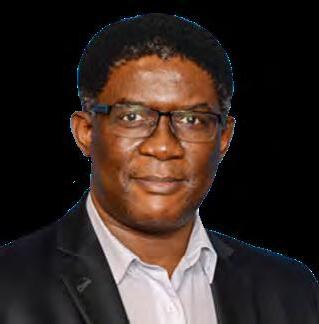
DR DAVID PHAHO
I am delighted to present CPUT’s annual Research Report for 2023. This year marks a significant milestone in our commitment to advancing research excellence and innovation, underscored by the successes we celebrated during our Research Festival – a vibrant three-day event that showcased our institution’s dedication to high-quality research, cuttingedge innovation, and transformative community engagement.
As we look back at our research and innovation initiatives during 2023, CPUT has much to celebrate during the period under review. A notable achievement is our status as the institution with the highest number of National Research Foundation (NRF) rated researchers among South Africa’s universities of technology. We are also doing well as compared to other universities in South Africa. This year, ten new researchers achieved their NRF ratings for the first time, and four researchers improved their existing ratings. This remarkable growth reflects our continuous pursuit of excellence in research and our commitment to fostering a thriving academic environment. Our Research Development Directorate, under the
astute guidance and leadership of Prof Dina Burger, deserves much credit for this stellar achievement.
We are particularly proud of initiatives such as the Sisonke 2.0 Supervision Mentorship Programme. CPUT emphasises the importance of ongoing development in research supervision. Sisonke is one of the institutional responses to the call by the Council for Higher Education (CHE) to universities to enhance the postgraduate supervision capacity at all our institutions of higher learning. This programme highlights the value of transdisciplinary research and collaboration in addressing global challenges such as climate change, food security and health, allowing us to create transformative solutions that benefit society.
The Centre for Postgraduate Studies has made significant strides by appointing a permanent Director and launching a five-year strategic plan #OneSmartCPGS. This plan aims to enhance the quality and quantity of our postgraduate students, elevate research standards, and enrich the
overall student experience. Such initiatives underscore our commitment to excellence in postgraduate education and research, supported by substantial investments in capacity building. The ongoing strategic review of our policies and guidelines also illustrates our commitment to optimise the overall postgraduate student experience at CPUT, in line with Vision 2030.
Our Technological Transfer & Industrial Linkages division continues to celebrate impactful partnerships that lead to job creation and societal benefits. For example, CPUT’s collaboration with AAC Space Africa, which involves licensing our technology, is set to create jobs and boost exports. Additionally, our partnership with NewSpace Systems is shaping the future workforce for the space industry, providing valuable internships and employment opportunities for our students while bridging the gap between academia and industry. In collaboration with the Technological Higher Education Network South Africa (THENSA), we are designing a Deep Tech Venture Builder to strengthen our technology ecosystem, focusing on functional technology innovation, skilled technopreneurial teams, cogent business models, and investment finance.
CPUT’s unwavering commitment to research excellence, strategic partnerships, and innovative solutions to real-world issues positions us to address the challenges of tomorrow.
In alignment with our Vision 2030, CPUT is embracing comprehensive internationalisation. Our strategic research partnerships extend within Africa as well as globally, ensuring that we incorporate virtual learning, digital credentials, and diverse perspectives. We are committed to decoloniality and inclusive internationalisation, valuing indigenous knowledge systems and the contributions of the African diaspora. Initiatives like Research Incoko and the University Capacity Development Grant promote research uptake and doctoral graduate development, enabling our researchers to engage in meaningful international collaborations.
This year, we celebrated significant recognition with our representatives winning three of the seven awards at the inaugural Higher Education Women
Leaders Awards. These awards honour South African women in higher education who exemplify leadership and inspiration, helping to advance gender transformation and create role models for future generations.
Our commitment to sustainability is further demonstrated through our membership in the Sustainable Development Solutions Network South Africa (SDSN). This network promotes integrated approaches to implementing the UN’s Sustainable Development Goals (SDGs) and the Paris Agreement on Climate Change. With over 1 800 members across 146 countries, our involvement in SDSN allows CPUT to contribute significantly to global efforts in achieving these critical goals while enhancing our research capabilities.
Moreover, we are excited about our collaboration with Tohoku University on the Carbon Removal and Environmental Remediation Project under the Science and Technology Research Partnership for Sustainable Development (SATREPS). This initiative, funded by the Japanese government through South Africa’s Department of Science and Innovation (DSI), aims to capture carbon dioxide, a major contributor to greenhouse gas emissions which adversely affect climate. The project aims to develop innovative products from industrial waste resulting from cement production, wastewater treatment, and soil remediation.
Below is just a small selection of the numerous achievements and initiatives from our faculties, research centres, and research focus areas for 2023. Each highlight reflects our commitment to academic excellence and innovation, showcasing the impactful work being done across various disciplines. We invite you to explore the pages of this Research Report to discover even more about how CPUT is contributing to knowledge creation and addressing real-world challenges.
The Faculty of Applied Sciences oversees seven research entities focused on Bioeconomy & Biotechnology, and Environment, Climate Change & Sustainability. The faculty has achieved notable gender diversity among postgraduate students, with a strong representation of women in both master’s and doctoral programmes. Strategic local and international collaborations have enhanced FAS’s research activities and global impact.
The Faculty of Business & Management Sciences has excelled in fostering innovative practices and has strengthened local and international partnerships that resulted in improved postgraduate enrolment and graduation rates. The faculty’s new Smart Classroom represents a significant advancement in educational facilities, fostering collaboration and enhancing learning experiences.
The Faculty of Education has engaged in national and international collaborative research projects, securing funding to address key educational challenges. Its commitment to mentorship and supervision has resulted in successful postgraduate graduations and innovative research initiatives.
The Faculty of Engineering & the Built Environment focuses on developing linkages with industry and government, actively addressing several of the UN’s SDGs through its research initiatives. The faculty’s commitment to internationalisation enhances its global reach and provides valuable opportunities for staff and students.
The Faculty of Health & Wellness Sciences has seen a marked increase in postgraduate student enrolment and significant research output. This year’s increase in DHET submissions reflect the faculty’s consistent upward trajectory in research contributions.
The Faculty of Informatics & Design has also experienced substantial growth in postgraduate studies, as well as engagement in various research activities, including collaborations with international partners. Notable achievements include securing funding for joint projects and hosting several international research fellows as well as on-going collaborations with leading universities such as Massachusetts Institute of Technology (MIT).
Our Research Focus Areas (RFAs) align closely with CPUT’s Vision 2030 and the UN’s SDGs, reflecting our commitment to addressing societal challenges. By fostering interdisciplinary collaboration and innovative solutions, these areas drive academic excellence and aim to create meaningful local and global impacts. The focus area programme is crucial for cultivating research expertise and showcasing the university’s strengths. As the foundation of our Smart RTIP Strategy, these RFAs embody CPUT’s transdisciplinary approach and enhance our efforts in research, technology, and innovation, ensuring alignment with our academic and research objectives.
This area tackles global challenges through interdisciplinary approaches that enhance community health and align with South Africa’s Bioeconomy Strategy. Its research aims to fulfil the RTI Blueprint and Vision 2030 objectives. An example of entities under this RFA is the Applied Microbial & Health Biotechnology Institute (AMHBI), which focuses on microbial and indigenous flora, significantly contributing to research capacity development by supervising postgraduate students and postdoctoral fellows.
Institutions like the French–South African Institute of Technology (F’SATI) and the African Space Innovation Centre (ASIC) are advancing research in space-based solutions for societal benefits, including energy security. Their initiatives, such as nanosatellite communication products and collaborations, exemplify a commitment to harnessing space technology for scientific advancement and nation-building.
This focus area aims to provide energy innovations that enhance quality of life and create value, aligning with several of the UN’s SDGs, including affordable clean energy, sustainable cities, and climate action. It leverages synergies across energy sectors and technologies, requiring interdisciplinary collaboration to develop sustainable solutions. Research includes e-mobility, energy production and use, energy-efficient agriculture, and power system improvements.
Research initiatives in this area support sustainable resource management and address climate change issues. Emphasising
microplastics and their impact on ocean ecosystems, this focus area integrates sustainability into teaching and community engagement. The Governance & Economics for Water & Sanitation Institutions Research Chair works to enhance governance and financial viability in the water sector.
This focus area explores interdisciplinary solutions to social, economic and environmental challenges, ensuring technology meets societal needs. It fosters collaboration to bridge the gap between academia and real-world practices through innovative research and learning initiatives.
Research in this area examines the intersection of technology and society, promoting digital inclusion and equity. Focusing on AI and ICT for Development, its interdisciplinary approach aligns with CPUT’s Vision 2030. An example of its entities is the Centre for Business Innovation & Incubation (BIIC), which supports highpotential innovations, fostering entrepreneurship through mentorship and networking opportunities.
As you explore this report, please reflect on the remarkable achievements and ongoing initiatives that define CPUT’s research landscape. Our unwavering commitment to research excellence, strategic partnerships, and innovative solutions to real-world issues positions us to address the challenges of tomorrow. Together, we continue to foster a vibrant research community that strives to make a meaningful impact on society.
Thank you for your support and engagement in our journey towards a brighter, more innovative future, for our community, for our country, for our continent, for our world.

PROF DINA BURGER
As the Director of the Directorate Research Development (DRD), it is my pleasure to celebrate relevance, growth and development, and success at CPUT through the annual Research Report. This is an opportunity to applaud and display the university’s achievements through various awarded programmes, training and excellence by our researchers, who work tirelessly to obtain innovative solutions to societal and global challenges.
The DRD supports a vibrant research culture of development, innovation and throughput, contributing to One Smart CPUT, Vision 2030 and the RTI Blueprint 3.0. It aligns its operation and management with the university’s six research focus areas, together with the Department of Science and Innovation (DSI), the National Development Plan (NDP), and the UN’s Sustainable Development Goals (SDGs) to connect with the world. Our research profile spans academic disciplines, engages students, industry, business, community and government. We support excellence in research culture and initiatives through policies, guidelines and compliance outlined by management, as CPUT strives to become the leading research-intensive university in Africa and one of the top institutions worldwide.
The DRD continues to support research that contributes to CPUT’s strategic plan and research agenda, working closely with its research chairs, institutes, centres and departments. It provides a state-of-theart Research Management Information System (RIMS) and electronic research platforms which integrate staff, fellows and postgraduates’ profiles and data with the university systems.
Data in the annual Research Report is shown year-by-year through graphics and tables in the faculties, institutes, centres and departments, indicating trends in the CPUT research climate and taking into account each year’s total. CPUT’s research activities are wide-ranging and therefore difficult to measure using one set of numbers in isolation. To provide as clear a picture as possible, the 2023 annual Research Report uses statistics and data from several sources and covers a variety of activities including success in obtaining research funding, publications and throughputs, along with commercialisation, industry linkages and community engagement.
The Research Report provides an overview of some of the exemplary research work conducted at CPUT, which continues to demonstrate
exceptional quality in research environment, support mechanism, infrastructure, resources, innovation, collaboration and commercial pursuits. The research highlights and the data presented provide a clear indication of the excellent research taking place at the university.
The DRD’s lean, experienced, dedicated and committed team focuses on:
• Research management and governance, including policy development
• Comprehensive research training and capacity development programmes
• Adherence to research integrity and compliance
• The state-of-the-art RIMS system for accurate reporting and decision-making, including monitoring and evaluation
• Grants information, administration and support to enhance grant income, and researcher development and profiling
• The annual recognition of research excellence through the Research Report and the Research Festival, including an Awards Ceremony
Our work is aligned with the CPUT 2030 decadal plan, focusing on:
• Development of future research leaders through innovation and mentorship, including the Sisonke Project and the Early-Career focus programme
• Investment in research leadership and a supportive research culture
• Facilitation of an increase in doctoral qualifications among academic staff
• Recruitment of top-tier academics, support staff and fellows
• Recruitment and retention of experienced researchers as adjunct professors and research fellows
• Support of NRF ratings for CPUT academics and distribution of grants
• Encouragement of high-impact research to address societal challenges such as water, sanitation, oceans, energy, food security, education, electricity, waste management and climate change
• Facilitation of an increase in transdisciplinary research for innovative solutions
These efforts have resulted in:
• Ground-breaking research and innovations showcased in this Research Report
• Increased research outputs
• Enhanced supervision through the Sisonke Supervision Mentorship Programme
• Recognition of research findings nationally and inter nationally
• Improved grants successes
• An increase in industry-linked programme
• Active participation in national initiatives
• Increase in doctoral degrees among academic staff
• Increase in transdisciplinary research projects
• Greater participation in conferences
• Improvement in numbers and quality of NRFrated researchers
• Support of CPUT’s research chairs and research institutes
• Increased numbers of adjunct professors and research fellows
I would like to acknowledge the visionary leadership of our senior management team, the invaluable contributions of our support staff, donors, sponsors and government support. I congratulate our academic staff for their ongoing research achievements, and I thank every staff member who supports research, especially the DRD team for their dedicated hard work towards achieving CPUT’s Vision 2030.
‘Celebrating and showcasing relevant, responsive and innovative research’

Research excellence and outstanding innovation were celebrated during CPUT’s three-day Research Festival at the end of February. The theme for this year’s event, held at SARETEC and on the Bellville Campus, was ‘Celebrating and showcasing relevant, responsive and innovative research’. The first day highlighted the world-class research being conducted at the institution through an exciting exhibition of research projects and innovations. The keynote speakers were VC Prof Chris Nhlapo and world-renowned researcher and Director of Global Engagement at Birmingham Business School, University of Birmingham, Prof Mark Saunders. Certificates were presented to academics who received ad hominem promotions, the winners of the Conversation Africa Awards, and the institution’s NRF-rated researchers.
The event culminated with acknowledgement and celebration of the winners of the institutional Research Excellence Awards. Prof Dina Burger, Director: DRD, said the institution was very proud of
the excellent work carried out by its researchers, and one way the institution acknowledged the outstanding achievements of academics was through the Research Excellence Awards. Dr David Phaho, DVC: RTIP, said the awardees had exceeded expectations, despite the challenges of the Covid-19 pandemic.
The winners were:
Research Publication – for DHET 2020 submission
- Dr Vipin Balyan: Bronze Award
- Dr Sipokazi Mabuwa: Silver Award
- Prof Johannes Cronje: Gold Award
- Prof Robertson Tengeh: Gold Award
- Dr Velaphi Msomi: Gold Award
- Prof Tiko Iyamu: Platinum Award
Postgraduate Supervision – for 2021 graduates
- Prof Johannes Cronjé: Bronze Award
- Prof Mohamed Tariq Kahn: Silver Award
- Prof Ephias Ruhode: Gold Award
- Dr Larry Jowah: Gold Award
- Dr Andre de la Harpe: Platinum Award
External Funding – for 2021
- Dr Pamela Welz: Bronze Award
- Dr Mariska Lilly: Silver Award
- Prof Kenneth Findlay: Gold Award
- Prof Tandi Matsha: Platinum Award
External Funding – for 2022
- Prof Tunde Ojumu: Silver Award
- Dr Mariska Lilly: Gold Award
- Prof Justine Daramola: Platinum Award
- Prof Kenneth Findlay: Diamond Award
The second day of the festival, the Postgraduate Conference, provided a platform for postgraduate students from across the university to showcase their research activities. They were given the opportunity to present their papers and engage with the audience. The festival concluded with an Ethics Day, under the theme ‘Research ethics and community engagement’. Dr Phaho welcomed the guests, which included experts from CCEWIL, Research Uptake: RTI-SIP and the faculties of Education and Health and Wellness Sciences, who shared their experiences and knowledge.
Prof Lalini Reddy, Director: CEWIL presented ‘Community engagement: Values, social responsibilities and ethics’. A presentation on ‘Ethical considerations in dissemination of findings among communities and policymakers’ was conducted by Dr Nelisiwe Maleka, Research Uptake: RTI-SIP. Language in Education lecturer, Dr Carike Kriel, presented ‘Ethical codes of conduct in teaching practice: The case of South African universities’. Manager: SLCE Units, Ms Jacqueline Scheepers spoke about ethical guidelines for digital storytelling in higher education. Prof Dina Burger said all research should start in the community and end in the community. It means we do research in the community, and results must find their way back to the community.
CPUT has much cause for celebration when it comes to excellence in research. One of the significant achievements is that the institution holds the highest number of NRF-rated researchers among UoTs in South Africa. Ten new researchers obtained an NRF rating for the first time in June.
The newly rated researchers are:
- Dr Enas Ismail, FAS – Y2 ra ting
- Prof Mangaka Matoetoe, FAS – C2 ra ting
- Prof Felix Nchu, FAS – C2 ra ting
- Dr Jonas Sagbo, FAS – Y2 rating
- Prof Candice Livingston, Faculty of Education –C3 rating
- Dr Sweta Patnaik, FEBE – Y2 rating
- Dr Ayodele Periola, FEBE – Y2 rating
- Dr Shanel Raghubeer, FHWS – Y2 rating
- Prof LJ (Nic) Theo, FID – C3 rating
- Dr Joseph Adebayo, FID – C2 rating
Additionally, four researchers have improved their ratings:
- Prof Ayesha Jacobs, FAS – from C3 to C2
- Prof Victoria Jideani, FAS – from C3 to C2
- Prof Agnes Chigona, Faculty of Educa tion – from C2 to C1
- Prof Tunde Ojumu, FEBE – from C3 to C2
The NRF sta tes that ratings are allocated based on a researcher’s recent outputs and impact as perceived by international peer reviewers. The ratings primarily reflect the quality and impact of research outputs over the past eight years, considering evaluations by both local and international peers. These ratings identify researchers who are leaders in their fields and recognise those who consistently produce high-quality research.
Ratings are awarded in the following categories:
A – Leading international researchers
B – Internationally acclaimed researchers
C – Established researchers
P – Prestigious Awards
Y – Promising young researchers
Prof Dina Burger, Director: DRD, expressed pride in the NRF-rated researchers and the increasing number of rated researchers at CPUT. She noted, “Under my leadership of research development since the end of 2016, CPUT has grown its NRF-rated researchers and today has the highest number of NRF-rated researchers among UoTs in South Africa. This growth did not occur without a carefully considered strategy by the Directorate of Research Development.” She added, “Our strategy is to grow the next generation of research and industry leaders through a careerfocused approach, with specific attention to each researcher’s individual career planning. This is achieved through tailor-designed training courses, individual mentoring interventions, and external specialist advice.”

Following the successful Sisonke 2.0 Certification and Celebration Day at the Cape Town Hotel School in November, Prof Janet Condy encouraged the CPUT community to volunteer for the Sisonke 3.0 project in 2024. She described it as a wonderful capacity development programme for novice supervisors. Supervision, she noted, is an academic practice that requires continuous learning and refining, and more can be done to support and capacitate supervisors.
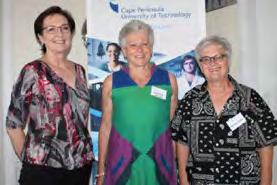
Globally, supervisors face challenges related to quality and capacity, as they are expected to supervise an increasing number of PhD candidates, despite students often lacking the necessary academic skills. There is a need to build sustainable higher education supervision mentoring programmes to increase completion rates and prepare students for work in both the higher education sector and professional practice. Academics generally agree that this process requires a ‘special pedagogy’.
Prof Condy, adjunct professor in the Faculty of Education, mentioned that since 2021, a few core participants at CPUT have been working on the Sisonke Supervision Mentoring Programme. ‘Sisonke’ in isiXhosa means ‘together’ or ‘to bridge’. This transdisciplinary research project, involving multiple stakeholders and driven by a real-world problem, has the potential to produce transformative and sustainable supervision pedagogies.
At the Sisonke 2.0 Certification and Celebration Day, DVC: RTIP Dr David Phaho welcomed the guests and praised the exceptional work done by the programme. The keynote address ‘Supervision and supervisors: Being inspired and inspiring’ was delivered by Prof Stephanie Burton. Prof Condy noted that in 2023, about 72 mentors and mentees attended the 12-week learning programme from August to October. She remarked that the best part of the day for her was meeting face-to-face with the mentors and mentees. “All the speakers spoke eloquently on this very necessary topic and gave us much to think about. The activity led by Prof Retha de la Harpe was exciting as we worked together, reflecting on our past learning, and thinking ahead about what we want to achieve. The certificates were also a highlight –it was wonderful to see how excited people were to receive these.”
Prof Condy added that in 2020, the Director: DRD, Prof Dina Burger, had invited her and Prof de la Harpe to lead this project. They both wrote the initial proposal and obtained ethical clearance for the research project. Currently, Prof Condy heads the project with Dr Heather Phillips, who manages the learning programme.
PROF IZAK VAN ZYL
2023 marked another year of progress and growth for the Centre for Postgraduate Studies (CPGS). Following the gradual return to normalcy in university activities after the peak of the pandemic, postgraduate research continued to thrive. Notably, a significant development occurred with my appointment as the centre’s permanent Director in July 2022, signalling a new chapter in its leadership.
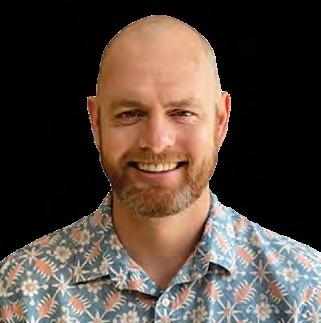
Building upon this momentum, I spearheaded a comprehensive 5-year strategic plan, coined #OneSmartCPGS, in alignment with the institutional Vision 2030. This strategic blueprint underscores our commitment to nurturing a postgraduate cohort that embodies the ethos of innovation. It is a critical pillar in the university’s aspiration to emerge as Africa’s leading smart university of technology (UoT), renowned globally for its transformative impact on humanity. Embracing the principles of human-centricity and open innovation, the #OneSmartCPGS framework sets the stage for fostering ‘human-centric innovation’ within our academic community.
At the core of this framework lie three overarching objectives:
1. Enhancing the quantity and calibre of postgraduate students
2. Elevating the standard and volume of research, innovation and creative outputs
3. Enriching the overall postgraduate student experience, inclusive of supervisors and academics
It is imperative to emphasise that these objectives are not standalone pursuits but interwoven facets guiding all the centre’s activities. Throughout 2023, we maintained a steadfast focus on these objectives while also addressing the evolving needs of our stakeholders.
One of our key accomplishments in 2023 was the continued optimisation and utilisation of our student data management portal, Higher Degrees Committee (HDC) Digital. With over 1 100 postgraduate enrolments in 2023, HDC Digital remains instrumental in effectively monitoring and tracking student progress across the university, ensuring timely interventions and support.
In line with our commitment to capacity building, CPGS continued to design and deliver a diverse array of training interventions tailored to the needs of our postgraduate cohort. These initiatives encompassed workshops covering various topics, including research proposal development, research methodology, academic writing, and data analysis software utilisation. Furthermore, our statistical consultation services, extended to staff and postgraduate students, were pivotal in enhancing research quality and output across the university.
Throughout 2023, CPGS facilitated more than 100 workshops, furthering our mandate to empower and equip our academic community with the requisite skills and knowledge. Additionally, our investment in postgraduate capacity development again exceeded R2 million, supported by the University Capacity Development Grant (UCDG). These resources were allocated to critical services such as language editing, methodology consultation, and training workshops, reaffirming our commitment to fostering excellence in postgraduate education and research.
As we reflect on the achievements and milestones of 2023, we remain steadfast in our dedication to advancing the goals outlined in the #OneSmartCPGS strategic plan. We are poised to build upon this foundation, driving innovation and excellence in postgraduate education while contributing to the realisation of CPUT’s broader vision.


Twelve graduates received their doctoral qualifications during the Summer Graduation Ceremony in December. In November, these accomplished individuals were given a platform to showcase their research findings and their potential societal impact at the inaugural Research Uptake: Doctoral Graduates Seminar. The event was organised by RTI-SIP and CPGS on behalf of the Office of the DVC: RTIP. The DVC Dr David Phaho gave the opening address under the theme ‘Potential societal impact of research’, and the graduates presented their research and discussed its impact on society. Manager Research Uptake: RTI-SIP Dr Nelisiwe Maleka, who was
one of the organisers, said they were joined by their supervisors and representatives from RTI-SIP.
The list of doctoral graduates who attended the event were: Dr Michael Agenbag (FID), Dr Warren Charles (FBMS), Dr Martha Grewe (FBMS), Dr Maryna De Lange (Faculty of Education), Dr Howard Fawkes (FEBE), Dr Olukayode Ayodele (FEBE), Dr Mohamed Almihat (FEBE), Dr Gideon Joubert (FEBE) and Dr Faeda Mohsam (FID). Those who weren’t able to attend due to work commitments: Dr Gareth Holtman (FEBE), Dr Leo Folifac (FEBE), and Dr Monica Nehemia (FID).
Dr Maleka said throughout the presentations, attendees had an opportunity to learn more about doctoral research studies that are responsive to societal needs and challenges, and their alignment to CPUT research focus areas and the SDGs.
Dr Agenbag, a graduate, said the seminar created an initial space for them to share their research contribution to CPUT’s leadership regarding their commitment to the university’s research objectives and “how our input from our long research journey focuses on societal challenges and needs”. He added, “It was also great to hear the research from other doctorandi and to be aware of the level of research that CPUT conducts. This seminar should undoubtedly become a regular for all doctoral graduates. The forum creates opportunities to share research and network with each other and different faculties and programmes.”
CPGS coordinator Dr Thandazile Mhlongo observed, “Listening to these insightful presentations has renewed our passion, fervour and enthusiasm for research as we have learnt of different expertise sparking insightful engaging discussions. A heartfelt thanks to our dedicated faculty members, mentors and advisors who have played a pivotal role in nurturing students, academic and research prowess in the university… What a wonderfully enlightening and thoughtprovoking Doctoral Graduate Seminar… It has been a wonderful experience witnessing not only the culmination of hard work through research and dedication done over the years by the doctoral candidates but also the promise of a future where research becomes a catalyst for positive change in society through the work done at CPUT.”
Dr Mhlongo also acknowledged the contribution made by the chair, Prof Izak van Zyl, and the organising committee who are the behind-the-scenes heroes who worked so hard to ensure the smooth execution of this seminar. “Finally, a sincere thank you to all the participants and attendees who have contributed to the success of this event. It is hoped that after this seminar, colleagues will foster an environment conducive to intellectual growth and collaboration.”
The Office of the VC hosted the first institutional VC’s Doctorandi Dinner for 19 doctoral graduates from all faculties to celebrate their accomplishments and give them the recognition they deserve. “Obtaining a doctorate is a fantastic achievement. It takes dedication, hard work and perseverance,” said Prof Izak van Zyl, Director: CPGS. He said some of the faculties have hosted similar events but this is the first one involving all faculties.
Prof Van Zyl continued, “I certainly regard this event as a celebration of reaching the pinnacle of higher education… To the class of 2023, I want to say, embrace this joyous moment. You have worked hard, and you are being recognised for that. But this is not the end of the journey, it is the beginning of a new one. Congratulations again, and all the best!”

CPUT’s VC, DVCs, Chair of Council and Chancellor were also present, indicating how deeply the university values its senior graduates, and how grateful and supportive it is of their achievements.
The doctoral graduates were:
• Mr Michael Agenbag – Doctor of Philosophy: Environmental Health
• Ms Phitlelelo Mokoena – DTech: Tourism and Hospitality Management
• Mr Mario Da Costa – DTech: Office Management and Technology
• Mr Warren Charles – Doctor of Human Resource Management
• Ms Lumka Ntwanambi – Doctor of Public Administration
• Ms Martha Grewe – Doctor of Human Resource Management
• Ms Maryna De Lange – Doctor of Education
• Ms Wendy Smidt – Doctor of Educa tion
• Mr Kabeya Tshimanika – Doctor of Education
• Mr Leo Folifac – Doctor of Engineering in Chemical Engineering
• Mr Howard Fawkes – Doctor of Engineering in Mechanical Engineering
• Ms Tabisa Ncubukezi – Doctor of Engineering in Electrical Engineering
• Mr Olukayode Ayodele – Doctor of Engineering in Mechanical Engineering
• Mr Gareth Holtman – Doctor of Engineering in Civil Engineering
• Mr Mohamed Almihat – Doctor of Engineering in Electrical Engineering
• Mr Gedeon Joubert – Doctor of Engineering in Electrical Engineering
• Ms Faeda Mohsam – DTech: Informa tics
• Ms Monica Nehemia – PhD: Informatics

DR REVEL IYER
The Intellectual Property Rights from Publicly Funded Research and Development Act (IPR Act 51 of 2008) was established to ensure that intellectual property (IP) arising from publicly funded research is effectively managed and commercialised, maximising its socio-economic benefits. From a university perspective, the act aims to enhance the commercialisation of research outputs by requiring institutions to have IP management strategies in place, facilitating technology transfer and innovation. It seeks to promote collaboration between academia and industry, incentivise the protection and use of IP, and ultimately contribute to the broader goal of translating research into practical applications that drive economic growth and address societal challenges.
Licenses with industry are crucial because they enable CPUT to transfer its technology innovations to commercial entities that can further develop, manufacture and market these technologies. Under the act, such licensing agreements are instrumental in ensuring that intellectual property generated from publicly funded research is effectively commercialised, thereby maximising its economic and social impact. This relationship drives economic growth by fostering industry–academia partnerships that stimulate innovation, create new products and services, and generate revenue through licensing agreements. By facilitating these connections, CPUT can enhance its research capabilities, attract additional funding, and contribute to the broader economy through technology commercialisation, job creation, and industrial development.
Three of these industry–university partnerships are highlighted below.
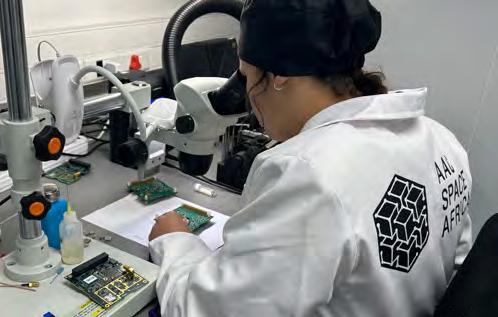
AAC Space Africa was founded in 2021 by the AAC Clyde Space AB Group to capitalise on the rapidly growing market for satellites and space services in Africa and as its Centre of Excellence in Advanced Radio Communication Systems.
AAC Clyde Space, a leading NewSpace company, specialises in small satellite technologies and services that enable businesses, governments, and educational organisations to access high-quality, timely data from space. This data has a vast range of applications, from weather forecasting to precision farming to environmental monitoring, and is essential to improving our quality of life on Earth. Its operations are located Sweden, the UK, the Netherlands, the USA, and now South Africa, with partner networks in Japan and South Korea.
AAC Space Africa designs, builds and delivers space missions to the continent from its Cape Town office outside Durbanville. South Africa was selected as the base as the country has an established space industry as well as a strong position in communication systems, with highly skilled engineers and data scientists. Many of the staff are proud alumni of CPUT.
AAC Clyde Space has been a reseller for the CPUT satellite communications solutions for over a decade, rebranding them as Pulsar. The Pulsar solutions are tried, tested and trusted. AAC Clyde Space uses these in its own satellite solutions. AAC Space Africa licensed CPUT technology and expanded its product range in 2023. This enabled a reduction in delivery lead times whilst building on existing experience as a manufacturer.
“Bringing the Pulsar range inhouse highlights our commitment to the African market and AAC Space Africa’s role in our group. It also helps us to maintain the high quality and reliability that is the foundation of the AAC Clyde Space brand,” says AAC Clyde Space CEO, Mr Luis Gomes.
Having acquired the licence to commercialise a range of CubeSat communications systems developed at CPUT, AAC Space Africa extended its production facilities and team, boosting job creation and export revenue by leveraging our global reach into the small satellite market. The relationship with CPUT is therefore hugely significant and beneficial; both in terms of training staff and strengthening the company’s position in the international market by providing quality communications products to client.

Incipientus Ultrasound Flow Technologies AB (Incipientus) is a leading tech company providing touch-free, in-line sensor solutions for the global process industry. Incipientus delivers continuous process data for improved production efficiency. The company has developed technology to further contribute to better automation and digitalisation and to achieve sustainable production. Customers use the process data that Incipientus provides for improved quality, less waste, and energy savings.
With roots in scientific research organisations such as RISE (Research Institutes of Sweden) and CPUT, Incipientus develops solutions applied across a wide range of process industries to support the transition to sustainable and automated production. The company’s sensor solutions are based on medical ultrasound echography technology, which was further developed by researchers at RISE and CPUT to enable in-line flow characterisation of industrial suspensions in real factory environments.
The commercialisation journey began over a decade ago when a PCT application was filed, leading to a patent license agreement with RISE and CPUT in 2017. In 2023, Incipientus made significant strides in commercialising the technology, successfully expanding its presence in the global market. By signing commercial agreements with key customers and achieving successful evaluations and installations in the food segment, the company has strengthened its brand and expanded its customer base, positively impacting its
long-term growth. Advances in research and development led to the introduction of new software and a hardware platform in 2023, with plans for a 2024 launch following certification. Innovations in digital data analysis, processing, and reporting have enhanced competitiveness and performance for customers. To meet company milestones and ensure customer success, Incipientus is expanding its team and optimising management time.
In the pre-commercialisation development phase, the relationship with CPUT was crucial, providing essential support in technology validation, patenting, and licensing with guidance from the Technology Transfer Office and expertise from the CPUT team. The 2024 investments in intellectual property (patents), new offices, and labs are expected to contribute positively to the company’s long-term stability, sustainability and success. Ongoing commercialisation efforts are anticipated to create additional job openings and collaboration opportunities. Incipientus is grateful for CPUT’s continued trust and support.
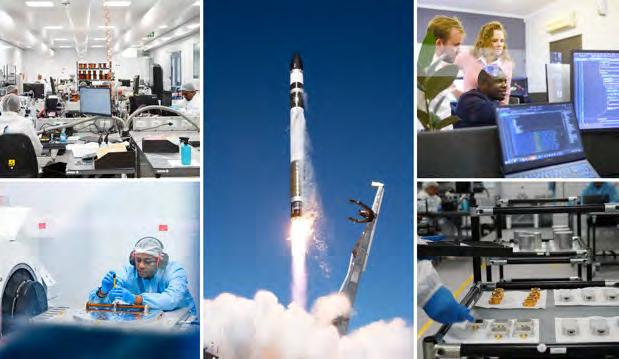
NewSpace Systems (NSS) is a leading multinational company specialising in precision spacecraft components and sub-systems technology. Leveraging over a decade of expertise in guidance, navigation and control (GNC) products, combined with an unwavering commitment to continuous research and development, has propelled NSS to become the largest manufacturer and exporter of spacecraft-utilised hardware on the African continent. The NSS headquarters are located locally in Somerset West, with supporting branches extending across North America, Europe and Oceania.
With a well-established reputation and products utilised on over 2 000 spacecraft, NSS supports the majority of spacecraft manufacturers, including esteemed blue-chip companies, constellation builders, and even national space agencies such as NASA.
NSS is committed to fostering transformative partnerships that drive innovation and advance research. One notable collaboration is with CPUT. Under this strategic partnership, CPUT and NSS have successfully executed a technology licensing agreement.
This agreement involves the transfer of IP for RF Communication Technology developed by CPUT, fostering collaboration between academia’s research and development and NSS’s capacity to commercialise and manufacture these products at scale. The licensed technology is positioned to enhance spacecraft communication capabilities with the ground and with other spacecraft.
This partnership highlights the commitment of NSS and CPUT to bridging academia and industry for mutual growth. CPUT not only contributes to the practical application of research, but also plays a vital role in shaping the future workforce of the space industry, with over 25% of NSS employees having an educational background from CPUT. The collaboration also provides internship and employment opportunities at NSS for CPUT engineering students, offering real-world experience.
NSS invites space enthusiasts among CPUT alumni and students to join their dynamic team, where a passion for space aligns with precision engineering. The multinational company offers the opportunity to contribute to shaping the future of the space industry, providing exciting career prospects for those eager to embark on a journey with them. You can visit them at https://www. newspacesystems.com/
CPUT, in collaboration with Technological Higher Education Network South Africa (THENSA), hosted a workshop in May. This was the first of a series of eight workshops spread over 2023, targeted at designing a Deep Tech Venture Builder (VBA), which will be piloted by CPUT in 2024.
The vision is to have the formal launch of the finalised Venture Builder in February 2024. CPUT and THENSA have agreed to collaborate in designing an adapted venture builder model for accelerating technology innovation and commercialisation through the creation of a technology ecosystem that includes top talent, leaders, investors and government all banded together to create a stronger, more innovative, inclusive and successful network.

Delegates from various HEIs, THENSA, government, RISA Fund and other institutions
“The current phase is directed at designing and birthing a micro-innovation ecosystem,” said Dr Revel Iyer, Director: TTIL. The 40 delegates who attended the workshop were from various HEIs including CPUT, DUT, University of Venda, WSU, CUT, TUT, VUT and MUT. There were also delegates from the DSI, National Intellectual Property Management Office, South African Research and Innovation Management Association, TIA, CoCT and the Greater Tygerberg Partnership.
In his keynote address, VC Prof Chris Nhlapo said, “The approach you are going to learn today involves the design of a venture builder-type vehicle, that marries elements of traditional venture builders and seed accelerators, wherein teams of prospective technopreneurs compete and develop the business case for individual technologies within a supportive learning environment.” He continued that the adapted venture builder model would be designed around a set of key drivers of spin-off success: i) Functional technology innovation; ii) Suitably skilled technopreneurial teams; iii) Cogent, scalable business models; and iv) Acquisition of investment finance.
Reflecting on the workshop, Dr Iyer said, “We achieved our objectives in that we targeted stakeholders from the broader national system of innovation with the view to introducing them to the concept of the Deep Tech Venture Builder, with the hope of developing interest and buy-in. The feedback all around was exceedingly positive with many stakeholders contacting us to have longer-term partnerships in this endeavour.” Prof Nhlapo commented, “We all understand the importance of science, technology and innovation in our day-to-day lives and the ways in which they are transforming the world. Our country has fantastic innovations.”
PROF JUDY PETER
The global mandate for the internationalisation of HE responds on various levels to the constructs of virtual learning, international networks and partnerships, digital credentials and microcredentials, diversity and inclusion, global research collaboration, language and cultural competence, sustainable and responsible internationalisation, data-driven decision-making, and virtual reality and international reality.

HEIs have embraced the National Policy Framework for Internationalisation as a guide. HEIs must build on the understanding of notions such as comprehensive internationalisation to expand the context and debunk the universality of Euro–American knowledge systems for the specific South African context. HEIs must continue locating their modus operandi within the relevant historical and geopolitical spaces. While the decoloniality projects are mind fields for innovative transformations, the areas that need more focus are:
• Establishing symmetrical and strategic research partnerships and collaborations across the globe
• Inclusive internationalisation to embrace indigenous knowledge systems and African and South Asian diasporas
• Equity sensitive access
• Capacity development of staff students and the transformation and decolonisation of the curriculum
The report below provides an overview of the Research Uptake and International Relations portfolios to support the academic project across faculties and Research Focus Areas. The need to establish and sustain transdisciplinary research projects underpin the objectives of the Research Incoko and related seminars. These projects support the National Framework for HE Internationalisation by promoting capacity-building projects.
The International Relations Portfolio has established and entrenched global partnerships with a greater focus on African partnerships to enhance staff and student mobility. Concerted efforts have been made to engage in SADC diplomatic relations. The data shared for partnerships, and staff and student mobility show an increase in momentum to promote further strategic collaborations – the implementation of an Internationalisation Policy addresses additional fundamental issues related to good governance and compliance. CPUT’s footprint has extended across the globe through the participation of RTI-SIP in multiple forums, such as THENSA, AIEA, EAIE, NAFSA and IEASA, and consortia that include SASUF, CHEC and Mellon-funded decolonial initiatives.
The Research Uptake Portfolio provides support to RTI-SIP that primarily upholds, maintains and supports the RTIP strategy and CPUT’s Vision 2030. This includes coordinating relevant activities and national partnerships. Various research initiatives and capacity development workshops have been hosted to support the research focus area leaders, research chairs and researchers.
Research Incoko is a platform for quarterly research engagements on a variety of topics to develop CPUT’s research capacity from within using trans-disciplinary approach. Research Incoko was held in March, September and November this year.
RTI-SIP is part of the team that implements UCDG: Focus Area 5 for growing CPUT’s rising stars in research and innovation. This is aligned with Activity 4: Develop and facilitate activities and appropriate systems to promote and support research uptake. Five workshops were held under the themes: Dissemination of findings; Science communication; Social influence and societal impact; Indicator development to measure knowledge/research uptake impact; and Stakeholder engagement between researchers and users. The workshop participants were CPUT senior researchers, researchers and emerging researchers.
The Office of the DVC: RTIP hosted the first Research Uptake: Doctoral Graduates Seminar with the theme ‘Potential societal impact of research’ in November. The purpose was to provide a platform for doctoral graduates to present their research studies at a high level. Presenters highlighted impact on society as well as the alignment of their research to the CPUT RFAs and SDGs. A small booklet was compiled to celebrate graduates’ outstanding accomplishments.
CPUT has become a member of the Sustainable Development Solutions Network (SDSN) South Africa. SDSN promotes integrated approaches to implementing SDGs through education, research, policy analysis, and global cooperation. CPUT’s initiatives that address SDGs were featured in SDSN SA Newsletter Issue 2, published in June.
The portfolio of International Relations is responsible for providing support to RTISIP in respect of the comprehensive internationalisation initiatives of CPUT, through developing strategic initiatives in the international domain for research, learning and teaching and community engagement partnerships in line with the government framework on internationalisation.
agreements
The partnership strategy, alongside the guiding principles, provides a context for the data shared on national and international partnerships in the portfolios of International Relations and Research Uptake to strengthen CPUT’s global reputation and profile. The guiding principles of the partnership strategy are relevance (finding partnerships aligned to V2030 and the Policy Framework for the Internationalisation of HE in SA 2019; contributing to learning and teaching: joint teaching, joint qualifications, research: research development, research projects, technical support, joint supervision; capacity development of staff; student training; funding opportunities: pulling and sharing resources).
NAME OF UNIVERSITY FACULTYCOUNTRY
Kwame Nkrumah
University of Science and Technology FIDGhana
University of Namibia FAS Namibia
Namibia University of Science and Technology WILNamibia
University of Luanda RTI-SIPAngola
BRICS
NAME OF UNIVERSITY FACULTYCOUNTRY
Chongqing University RTI-SIPChina
NAME OF UNIVERSITY
Odisee University of Applied Sciences
FACULTYCOUNTRY
RTI-SIPBelgium
University of Derby, UK FID United Kingdom
UPEC, France
Howest University
FEBEFrance
RTI-SIPBelgium
The University of Reunion Island FEBEFrance
KAUNAS University of Technology
RTI-SIPLithuania
Agricultural Research Centre for International Development (CIRAD–CPUT) FEBEFrance
Hanze University of Applied Sciences, Groningen FHWSNetherlands
Hochschule Hannover – University of Applied Sciences & Arts, Hanover FIDGermany
The Hungarian University of Agriculture and Life Sciences, Institute of Physiology and Nutrition FHWSHungary
ESTIA Institute of Technology FEBEFrance
EDUNET (Phoenix International Education Network) FEBEGermany
Ernst-Abbe-Hochschule Jene University of Applied Sciences (EAHJ) FEBEGermany
Osnabruck University of Applied Science, Germany FAS Germany
Technische Hochschule Ingolstadt, Germany
RTI-SIPGermany
Fontys University of Applied Sciences FAS Netherlands
MIC the Entrepreneurial School FEBEAustria
L’Institut Agro (IA) FAS France
National Construction Academy FEBE Saudi Arabia
BSM Cadet Programme
CBS International Business School
FEBECyprus
FBMSGermany
Erasmus + Inter-Institutional Key Action 1
CPUT is an active participant in EU-funded programmes with countries in Europe. Participating in EU-funded programmes enables staff and students at CPUT to increase their global footprint and broaden their horizons. CPUT welcomes incoming staff and students from global partners to increase the diversity of the institution and enhance intercultural competence amongst staff and students.
Hochschule München University of Applied Sciences
Riga Technical University
Odisee University E+ Agreement
Odisee University E+ Agreement
Sakarya University of Applied Sciences
FBMSGermany
RTI-SIPLatvia
FEDBelgium
FBMSBelgium
FEBETurkey
Duale Hochschule Baden-Württemberg Ravensburg FID. Germany
TH Köln – University of Applied Sciences
University of Economics Bratislava, Slovakia.
Düsseldorf - University of Applied Sciences
Mainz University of Applied Sciences
Munich University of Applied Sciences
MCI Innsbruck
FIDGermany
FEBESlovakia
FEBEGermany
FEBEGermany
FEBEGermany
FEBEGermany
National partnerships
Developing linkages within a quintuple helix environment is key for CPUT strategic partnerships. This is navigated through building synergies, creating and sustaining opportunities for staff and students at CPUT to work in collaboration with stakeholders in SADC: industry, government, other universities and UoTs, research institutions and civil society. NAME OF UNIVERSITY
UKZN–CPUT FEBE
HERS SA–CPUT
HC
Council for Scientific and Industrial Research (CSIR)–CPUT FEBE
University of Zululand FEBE
Co-Operative Agreement CoCT–CPUT FID
The Fisheries Economic Development, Research, Advisory Training Institute (FEDRATI)–CPUT FAS
Centre for Proteomic and Genomic Research (CPGR) FAS
Joint Supervision Agreement University of Venda–CPUT FEBE
Higher Health University Direct Grant HIV/Aids Unit
EDT–SETA HC
Centre for Water and Sanitation Research FEBE
Agriculture Research Council (ARC) FAS
Liquid Telecomm Lit Funding Agreement FEBE
RTI-SIP’s MoU with CPUT’s Faculty of Education
RTI-SIP
Two Oceans Aquarium Foundation FAS
TUT FAS
College of Cape Town FEBE
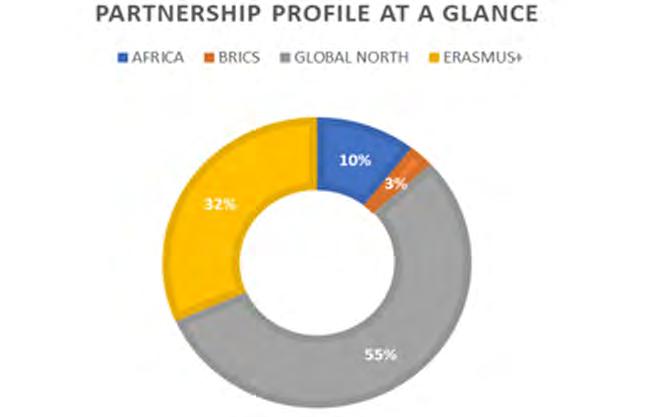

In alignment with the Policy Framework for Internationalisation of Higher Education, HEIs are required to give annual reports on internationalisation targets. It is assumed that HEIs have internationalisation strategies in place. The proposal to include these targets is agreed upon in the annual planning and performance appraisals of deans, vice deans and HODs for each faculty. To enhance the Internationalisation@ Home paradigm of comprehensive internationalisation, RTI-SIP actively seeks out international study-abroad partnerships. Study abroad students are direct fee-paying (dollar fees) students who enrol for a semester for non-degree purposes or who take courses for credit towards their degree back home. RTI-SIP provides a supporting and oversight role in using partnership agreements to include student and staff mobility.
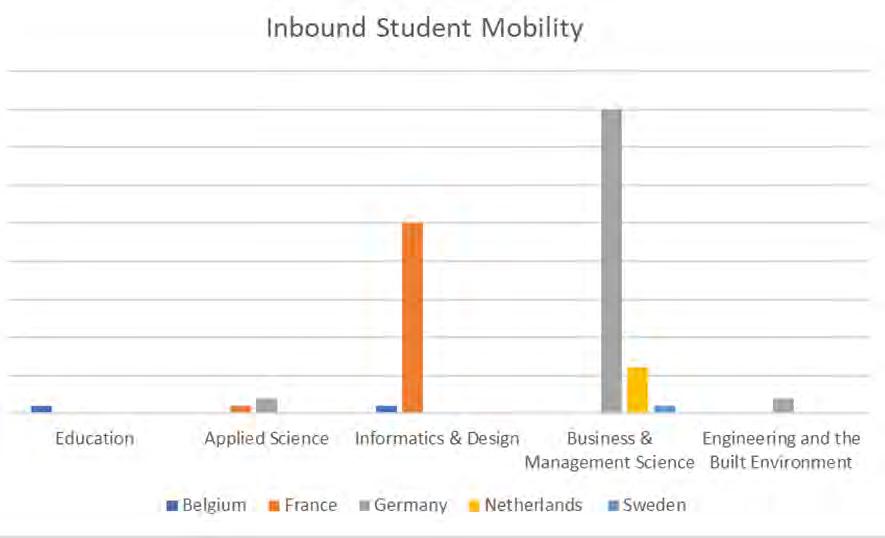
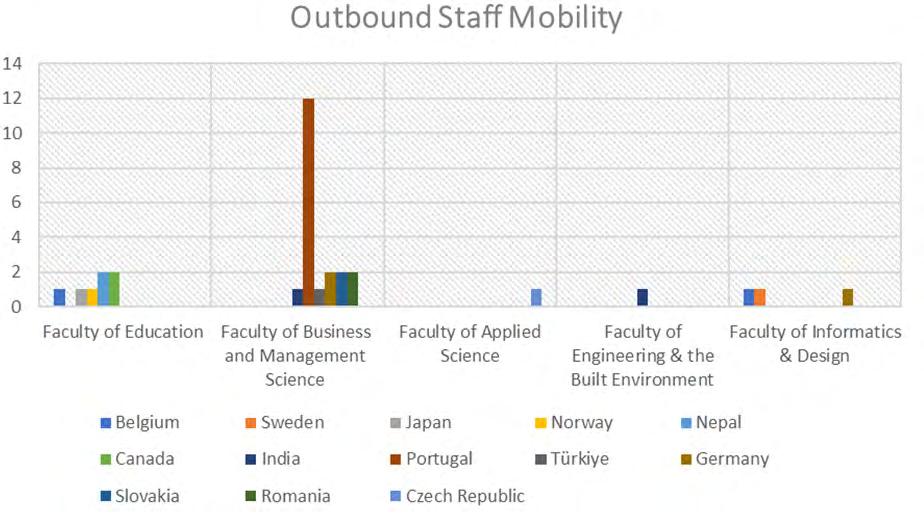
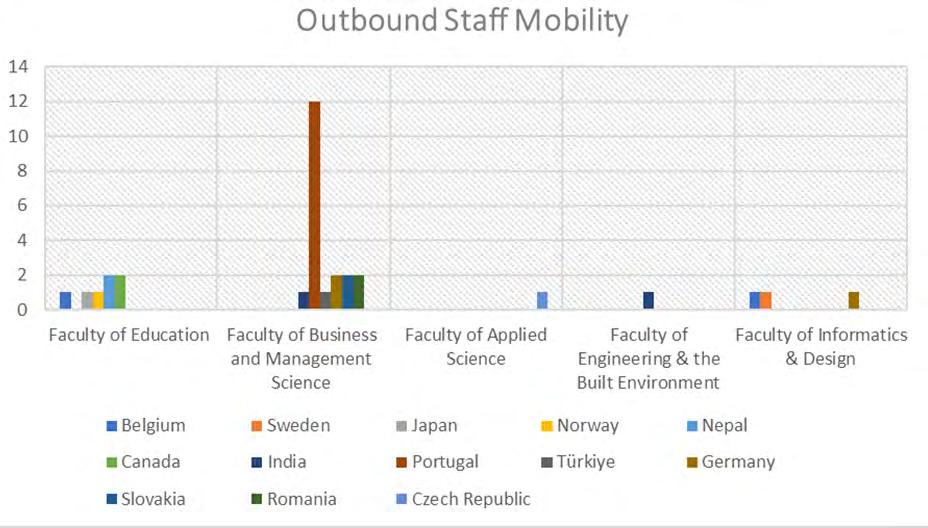

DATE PRESENTERS OR ATTENDEES
ENGAGEMENT TITLE
January Prof Peter Teaching and research opportunity at George Enescu University, Romania
DESCRIPTION
The trip is part of the Erasmus Agreement with George Enescu University
February Prof Peter, SA and USA colleagues AIEA Board Meetings and Conference, WashingtonConference attendance of 800 from 48 countries; five days of meetings, panels, plenaries and exhibition halls
March Prof Peter, Dr Singh Faculty of Business and Management Sciences International Hybrid Forum
Keynote address at FBMS International Hybrid Week held at Granger Bay Campus; event attended by CPUT staff and international partners
RTI-SIP team Stellenbosch International Academic Networks (SIAN)SIAN event was hosted by SU to celebrate 30 years of their international office
Prof Peter SASUF 2030 Work Integrated Learning Workshop, Satellite event
Prof Reddy, Prof Engel-Hills, Prof Ncube, Prof Garraway
SASUF 2030 information sessions
April Prof Dr Pfaffenberger, University of Applied Science, Flensburg Exploring International Partnerships for Community Engagement
May-June Prof Peter and Dr Singh
SASUF 2030 WIL Workshop was hosted by CPUT’s Prof Reddy and colleagues from Sweden at Granger Bay Campus
Research & Innovation Week was attended by over 500 participants from Sweden and SA; the event kicked off with the hosting of satellite events across the country
RTI-SIP was invited by CPUT’s CCEWIL to attend the half-day workshop
Equity-Sensitive Strategies for Internationalising HE in the Global South NAFSA Conference presentation, Washington
July Prof Peter, Dr Singh, Dr Maleka Mangosutho University of Technology International Leadership Programme
RTI-SIP was hosted by MUT to introduce their staff to the core principles of internationalisation, managing an international office, COIL projects, and to meet with staff engaged in internationalisation
Dr Singh HERS-SA Emerging Leadership Programme Dr Singh was invited to speak at the event held at the Double Tree Hilton Hotel, CT
Prof Peter, Dr Singh Ubuntu Postgraduate Forum
RTI-SIP attended and presented at Ubuntu Postgraduate Forum on the directorate’s initiatives
DATE PRESENTERS OR ATTENDEES
ENGAGEMENT TITLE
August Prof Peter, Dr Singh, Dr Maleka UNESCO Chairs Launch, Stellenbosch University
Prof Peter, Dr Singh, Dr Maleka, Mr Booi IEASA Conference and Workshop, Durban
September Prof Peter Negotiating the Fabric of the African University Conference, UWC
Prof Peter UFS Colloquium Conference
DESCRIPTION
RTI-SIP attended SU’s UNESCO Chairs Launch on Intercultural Competences
RTI-SIP hosted a workshop on ‘DHET policy framework for internationalisation’ at the IEASA Conference
Prof Langa of UWC invited Prof Peter to participate in the round table on Diversity at the conference titled ‘Negotiating the fabric of the African university’
Prof Peter was Invited to participate in the colloquium hosted by UFS Office for International Affairs, which explored the power dynamics of international knowledge generation
Prof Peter Gender-Smart Academia: Traction to TransformationProf Peter attended the SANORD Conference at INN University in Hamar, Norway
Ms Letlhaku, Mr Galochkin International Scholarships information session.RTI-SIP hosted the International Scholarships information session presented by DHET and Vice Consul of the Consulate General of the Russian Federation
Mr Booi SANORD Heritage Day Celebration, UWC UWC’s SANORD Office hosted a Heritage Day Celebration in which Mr Booi moderated the panel discussion on Heritage
Ms Haniff Ethical Inter nationalisation: Is this possible?
October Prof Peter, Mr Mtonjeni Mellon Decoloniality Project, UCT: Integrating decolonial feminisms in the decolonising HE rhetoric
Prof Peter, Dr Singh Virtual Erasmus+ regional cluster meeting seminar in Africa
Dr Singh Dutch Knowledge Mission meeting, UWC
Prof Peter DHET and the Kingdom of Netherlands Roundtable discussion
November Dr Jowi Making Internationalisation Work for African Universities: Reframing New Ways for Strategic Responses and Resilience
RTI-SIP hosted the Internationalisation Forum
Prof Peter and Mr Mtonjeni as CPUT’s representatives on the Mellon Project presented a paper at the Mellon Seminar
Prof Peter and Dr Singh attended the virtual Erasmus+ regional cluster meeting seminar
Dr Singh attended the Dutch Knowledge Mission meeting hosted by UWC
Prof Peter represented CPUT at the Roundtable discussion: Diversification of education and the future of work, an intersection of industry and academia to close the skills gap hosted by DHET and the Kingdom of Netherlands in Pretoria
RTI-SIP hosted the second Internationalisation Forum
DATE PRESENTERS OR ATTENDEES
Dr Samuels, Ms Jithoo
December Dr Upasana Singh, UKZN
Dr Francke and Prof Svensson, Malmo University
ENGAGEMENT TITLE
COIL Workshop (RTI-SIP/FEBE), CPUT
Responsiveness of academics to innovative artificial intelligence
Workshop: Critical and Human-Centred Perspectives on Data, AI & programming
DESCRIPTION
RTI-SIP in conjunction with FEBE hosted the first COIL Workshop conducted by DUT
RTI-SIP hosted the final Internationalisation Forum
SASUF workshop
In-person delegation visits
DATE
DESCRIPTION
February - Delegation from Reunion Island
- Mr Bosscha, Education & Science Attache, Embassy of The Netherlands, Pretoria
- Odisee University of Applied Sciences, Belgium
- VC and team from the University of Luanda, Angola
March - Delegation from Lithuania
- Delegation from Academie De Bordeaux, France
- Mr Galochkin, Consulate General of the Russian Federation in Cape Town
April
June
- Delegation from the Hungarian University of Agriculture and Life Sciences (MATE) Hungary visited CPUT for a week-long staff exchange
- Ms Hochschule München, University of Applied Sciences, Germany
September - Nanjing Forestry University, China
- DSI and NRF delegations
November - Strasbourg University, France
- City of Cape Town delegation
December - SPI, a Tech transfer company in Portugal
- Prof Wengelin from Lund University, Sweden
To expand the African footprint beyond the SADC region is critical to decolonising the internationalisation agenda in the Global South by more intentional alignment with ANIE and the African Union. RTI-SIP will continue to actively entrench historical partnerships and bi-lateral agreements in BRICS countries and in western Europe, e.g. the EU, Germany, DAAD (Deutscher Akade), and France, to extend strategic cooperation in staff and student mobility, research collaboration, capacity building projects, COIL, and joint degree programs to internationalise the curriculum and create intercultural competencies. The intention is to revive the vibrant international culture at CPUT through short-learning programmes (Summer and Winter School), increasing the international student enrolment, enhancing the multicultural ecosystem, and digitising reporting and administration systems.
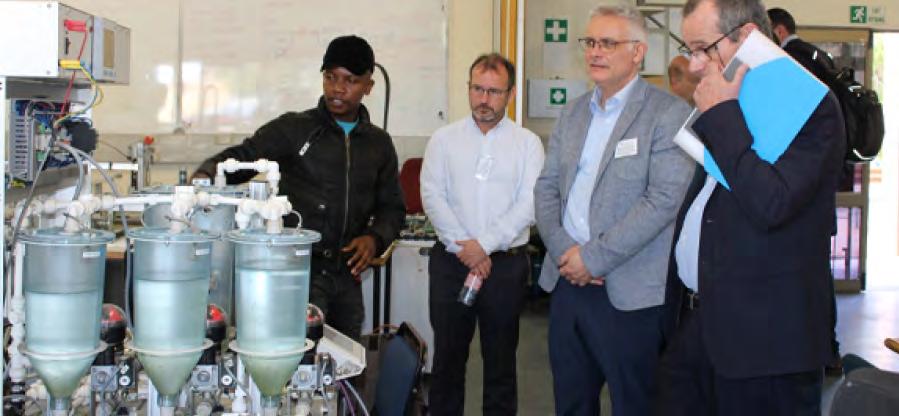
RTI-SIP hosted a delegation from the Nouvelle-Aquitaine academic region in France at DEECE in April. The meeting, held at the Bellville Campus, aimed to define proposals and promote and strengthen long-lasting partnerships between TVET colleges, universities and vocational training institutions in South Africa and those in Nouvelle-Aquitaine.
The delegation included Mr Jean-Pierre Meau and Mr Fabrice Methee, Inspectors of National Education Industrial Science and Technology; Mr Franck Cazaurang, Director of Evering Aeronautics Engineering at Bordeaux University; Mr Yoann Gac, Chief Operating Officer of the Campus of Trades and Qualifications of Excellence Aeronautics and Space, Aérocampus Nouvelle-Aquitaine; Mr Laurent Marche, Franco–South African 3DExperience Academic Centre; and Mr Philippe Senechal, Acting Inspector of National Education Industrial Science and Technology.
During their visit, the delegation attended a meeting at DEECE Block A, where Prof Suresh Ramsuroop, Dean of FEBE, presented an overview of the faculty. The French delegation reciprocated. Both delegations identified common areas of interest and synergy between their institutions. Dr Tasmeera Singh, Manager: International Relations at RTI-SIP stated that the meeting was successful based on its objectives and outcomes. FEBE’s Assistant Dean of RTIP, Prof Veruscha Fester, expressed her admiration for the integration of French universities, TVET colleges, and companies to ensure student success. “We can certainly learn from this model.”
FEBE’s Assistant Dean: Teaching and Learning, Prof Bingwen Yan, said the French delegation visit had been truly enriching for staff, faculty members, and various departments from the CPUT community. In his closing comments, Prof Yan said, “Your remarks have been thoughtful, insightful and inspiring, and we are fortunate to have had the opportunity to listen to them.”



From publishing research papers to embarking on innovative studies, CPUT academics continue to make the institution very proud. This excellence in research was celebrated at the university’s Research Festival, held at the SARETEC venue in Bellville from 28 February to 2 March 2023.
One way the institution acknowledges our academics’ outstanding achievements is by presenting annual Research Excellence Awards.
There are three categories of Research Excellence Awards: Research Output, Postgraduate Supervision and External Funding. There are generally up to four awards in each category: Platinum, Gold, Silver and Bronze. A fifth award has recently been introduced for “extra outstanding” achievements, the Diamond Award.
These awards are calculated from the total number of DHET units produced by each author. This includes all output types acknowledged by the DHET, namely:
• Journal Articles
• Books & Chapters in Books
• Conference Proceedings
• Creative Outputs & Innovations
These awards are given for the number of postgraduate students supervised. They are calculated based on the total number of units earned by a supervisor.
Supervisors earn:
• One unit for supervision of a master’s degree
• Three units for supervision of a doctorate
This category includes industry funding as well as grants given by universities and councils.
To qualify for eligibility for awards in the External Funding category, a researcher needs to have received funding of at least R1 000 000 in the year under consideration. However, if there are not at least four academics who have reached this goal, then funding of over R500 000 will be considered.
If funding is R1 000 000 or over, the researcher will definitely win an award. Once the top awards have been allocated, anyone left with over R1 000 000 in external funding will be presented with Bronze Awards.
If funding is over R5 000 000, the researcher will be presented with a Diamond Award. Hearty congratulations to Prof Kenneth Findlay, Research Chair: Oceans Economy, who is the first researcher ever to be presented with a Diamond Award.
Awards presented at the Research Festival 2023
RESEARCH PUBLICATION – for 2020 publications
AWARD RECIPIENT FACULTY
Platinum Prof Tiko IyamuFaculty of Informatics & Design
Gold Prof Johannes CronjeFaculty of Informatics & Design
Gold Dr Velaphi Msomi Faculty of Engineering & the Built Environment
Gold Prof Robertson TengehFaculty of Business & Management Sciences
Silver Dr Sipokazi Mabuwa Faculty of Engineering & the Built Environment
Bronze Dr Balyan Vipin Faculty of Engineering & the Built Environment
POSTGRADUATE SUPERVISION – Dec 2020 & Apr 2021 graduations
AWARD RECIPIENT FACULTY
Platinum Dr Andre de la Harpe Faculty of Informatics & Design
Gold Dr Larry JowahFaculty of Business & Management Sciences
Gold Prof Ephias RuhodeFaculty of Informatics & Design
Silver Prof Mohamed T Kahn Faculty of Engineering & the Built Environment
Bronze Prof Johannes Cronje Faculty of Informatics & Design
EXTERNAL FUNDING – for 2021
AWARD RECIPIENT FACULTY/RESEARCH INSTITUTE
Platinum Prof Tandi Matsha Faculty of Health & Wellness Sciences
Gold Prof Kenneth FindlayFaculty of Applied Sciences
Silver Dr Mariska Lilly Applied Microbial & Health Biotechnology
Bronze Dr Pamela WelzApplied Microbial & Health Biotechnology
EXTERNAL FUNDING – for 2022
AWARD RECIPIENT FACULTY/RESEARCH INSTITUTE
Diamond Prof Kenneth Findlay Faculty of Applied Sciences
Platinum Prof Justine DaramolaFaculty of Informatics & Design
Gold Dr Mariska Lilly Applied Microbial & Health Biotechnology
Silver Prof Tunde Ojumu Faculty of Engineering & the Built Environment
Awards to be presented at the Research Festival 2024
RESEARCH PUBLICATION – 2021 publications
AWARD RECIPIENT FACULTY
Platinum Dr Vipin BalyanFaculty of Engineering & the Built Environment
Gold Dr Velaphi MsomiFaculty of Engineering & the Built Environment
Silver Prof Robertson Tengeh Faculty of Business & Management Sciences
Silver Prof Oluwafemi Oguntibeju Faculty of Health & Wellness Sciences
Bronze Prof Tiko IyamuFaculty of Informatics & Design
POSTGRADUATE SUPERVISION – Dec 2021 & Apr 2022 graduations
AWARD RECIPIENT FACULTY
Platinum Dr Larry JowahFaculty of Business & Management Sciences
Gold Prof Tiko IyamuFaculty of Informatics & Design
Silver Prof Johannes Cronje Faculty of Informatics & Design
Bronze Prof Vipin BalyanFaculty of Engineering & the Built Environment
Bronze Prof Charles Laubscher Faculty of Applied Sciences
Bronze Dr Velaphi MsomiFaculty of Engineering & the Built Environment
RESEARCH PUBLICATION – 2022 publications
AWARD RECIPIENT FACULTY
Platinum Prof Tiko IyamuFaculty of Informatics & Design
Gold Prof Victoria JideaniFaculty of Applied Sciences
Silver Prof Rodney DuffettFaculty of Business & Management Sciences
Bronze Prof Vipin BalyanFaculty of Engineering & the Built Environment
POSTGRADUATE SUPERVISION – Dec 2022 & Apr 2023 graduations
AWARD RECIPIENT FACULTY
Platinum Dr Larry JowahFaculty of Business & Management Sciences
Gold Prof Robertson Tengeh Faculty of Business & Management Sciences
Silver Prof Atanda RajiFaculty of Engineering & the Built Environment
Bronze Prof Justine DaramolaFaculty of Informatics & Design
Bronze Prof Andre de la HarpeFaculty of Business & Management Sciences
POSTGRADUATE SUPERVISION – Dec 2023 & Apr 2024 graduations
AWARD RECIPIENT FACULTY
Platinum Prof Mohamed KahnFaculty of Engineering & the Built Environment
Gold Prof Andre de la HarpeFaculty of Business & Management Sciences
Silver Prof Atanda RajiFaculty of Engineering & the Built Environment
Silver Prof Michael TwumDarko Faculty of Business & Management Sciences
Bronze Prof Tiko IyamuFaculty of Informatics & Design
EXTERNAL FUNDING – for 2023
AWARD RECIPIENT FACULTY
Platinum Dr Conrad Sparks Faculty of Applied Sciences
Gold Prof Tandi MatshaFaculty of Health & Wellness Sciences
Silver Prof Tunde Ojumu Faculty of Engineering & the Built Environment
Bronze Dr Kessie GovenderFaculty of Engineering & the Built Environment
Bronze Dr Pamela WelzApplied Microbial & Health Biotechnology

The NRF is a national agency for research support and promotion. In addition to funding, human resource development and the provision of research facilities, the NRF annually invites researchers in all academic fields to apply for individual ratings.
THE NRF RATING CATEGORIES
A | Leading international researchers B | Internationally acclaimed researchers C | Established researchers P | Prestigious awards Y | Promising young researchers
Applied Microbial & Health Biotechnology Institute
Dr S Abel C2
Dr M le Roes-Hill C2
Prof JL Marnewick C1
Dr T Mthethwa Y2
Dr AL Prins C2
Dr L van der Westhuizen C2
Dr P Welz C2
Applied Sciences
Prof NB Báthori C2
Dr BS Chidi Y2
Prof KP Findlay C1
Prof S Geerts Y1
Dr EL Ismael Y2
Prof A Jacobs C3
Prof VA Jideani C3
Prof MO Jimoh Y2
Prof L Kambizi C3
Prof CP Laubscher C2
Centre for Innovative Educational Technology
Prof EN Ivala C2
Dr F Waghid Y2
Business & Management Sciences
Prof SEH Davies C3
Prof B Knott Y2
Dr M Mutize Y2
Prof V Naicker C3
Dr M Twum-Darko C3
Dr SJ West C3
Prof FB Lewu C3
Prof MC Matoetoe C2
Prof AA Mohammed C2
Prof F Nchu C2
Dr N Ndube-Tsolekile Y2
Prof BO Opeolu C3
Dr AB Oyenihi Y2
Dr AL Prins C2
Dr J Sagbo Y2
Prof VS Somerset C2
Centre for Postgraduate Studies
Prof IJ van Zyl C2
Education
Dr PH Boer Y2
Prof A Chigona C1
Prof JL Condy C2
Prof L Hibbert C2
Prof C Livingston C3
Prof ZC Sosibo C3
Dr Z Waghid Y2
Prof C Winberg C1
Health & Wellness Sciences
Prof P Clarke-Farr C3 Y2
Prof G Davison C3 C1
Prof P Engel-Hills C2 C2
Prof K Jooste C2 C2
Prof T Matsha C1 C3
Prof OO Oguntibeju C3 C3
Dr S Raghubeer Y2 Y2
Prof C Winberg C1
Engineering & the Built Environment
Prof K Aboalez C3
Dr V Balyan Y2
Dr MR Chowdhury Y2
Prof VG Fester C2
Dr V Msomi Y2
Prof B Ncube C3
Prof TV Ojumu C2
Prof OO Oyekola C2
Dr A Patnaik C2
Dr AA Periola Y2
Informatics & Design
Dr JO Adebayo C2 C3
Prof J Cronjé C1 Y2
Prof J Daramola C3 Y2
Prof T Iyamu C2 C2
Prof LJ Theo C3 Y2
South African National Biodiversity
(SANBI) and Stellenbosch University

In January, CPUT welcomed Dr Kotani Motoko, Science & Technology Co-Advisor to Japan’s Minister for Foreign Affairs and Executive Vice President for Research at Tohoku University, to the Bellville Campus. CPUT collaborates with Tohoku University on the Carbon Removal and Environmental Remediation Project under the Science and Technology Research Partnership for Sustainable Development (SATREPS) scheme. SATREPS is a Japanese initiative by the Japan International Co-operation Agency and the Japan Science and Technology Agency, in partnership with South Africa’s Department of Science and Innovation (DSI). The event, held at the Chemical Engineering Building, was also attended by Mr Ghaleeb Jeppie, MinisterCounsellor: Science, Innovation and Education at the Embassy of South Africa to Japan, and Mr Sizo Zwane, Assistant Director: Development Partnerships at the DSI.
Prof Veruscha Fester, FEBE Assistant Dean: RTIP, welcomed the guests. Dr David Phaho, DVC: RTIP, expressed his appreciation and said the project was a high priority for the institution. Prof Manimagalay Chetty, Head of Chemical Engineering, reiterated that her department is excited to host this national project. The Department of Chemical Engineering’s Prof Tunde Ojumu, who is the project’s PI and manager, presented on the project, including its progress and planned activities.
Prof Ojumu commented that the project focuses on recycling and capturing carbon dioxide from the flue gas of some industries in concrete, demolished concrete, and cement wastes. The products obtained from this process will find applications in cement industries and thereby reduce their dependence on limestone. Some products may also be applied in wastewater and acid mine drainage treatment, soil remediation, and may be suitable for mine backfilling. He remarked that the industrial partners are keen to see the application of the results of this project in their processes.
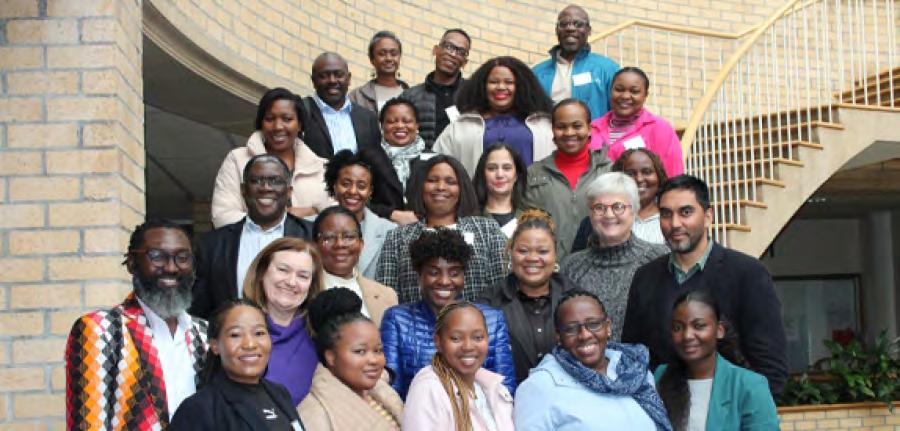
The DSI, the NRF and the SARChI and Centres of Excellence (CoEs) hosted a two-day Strategic Institutional Engagement at Bellville Campus in September. The purpose of the engagement was to reflect on CPUT’s Research Strategy and current implementation alignment to the Decadal Plan with a particular focus on areas of advanced readiness, areas of envisaged future readiness as well as human capacity development over the next five to ten years, “and an indication of the envisaged support required,” said Dr Elma Maleka, Manager: Research Uptake at RTI-SIP.
The DSI–NRF meeting came about at the right time for CPUT, said Prof Dina Burger, Director: DRD. “It gave us a comprehensive understanding of the respective funding streams and opportunities available, and it also provided insight into the reporting requirements.”
There were three presentations on the first day:
• DSI presented an overview of the Decadal Plan, priorities and sta tus of implementation with a view to extrapolate areas of interest and opportunities for historically disadvantaged institutions (HDIs).
• The NRF presented an overview of their Vision 2030, Stra tegy 2025 and Strategic Investments and in particular SARChI and CoEs.
• DVC: RTIP, Dr David Phaho, delivered a presentation on CPUT opportunities to expand the Research and Innovation Agenda in line with national and global imperatives such as the UN’s SDGs and our country’s NDP.
“There are several opportunities at CPUT and some of our existing or proposed centres and institutes could benefit from this external funding in areas such as Agri-Food, Biotechnology and Teacher Education,” Dr Phaho said. He also highlighted CPUT’s readiness to host any of the new NRF Research Chairs in areas where “we already have expertise, such as Biotechnology, Food Security and Energy. We also seeded the idea of a School of Veterinary Science at CPUT to support the farming sector in the Western Cape, Eastern Cape and Northern Cape seeing that we only have one school in the country at UP.”
The first day of the event concluded with discussions on potential collaboration and support from the DSI, NRF and others. On the second day, the NRF provided insight into the SARChI and CoE governance. Prof Burger and Research Chairs Prof Glenda Davison, Prof Bongani Ncube and Prof Zayd Waghid presented their research activities. The discussions included challenges regarding research office chair implementation.
“During this important meeting, we had the opportunity from our DVC: RTIP to make a presentation on our Vision 2030 and the role that his portfolio will play in the implementation of the vision, the NDP and SDGs. We could articulate our specific needs to the delegation for ongoing and future support. It was an opportune time for CPUT to understand how to strategically further position our research entities and research chairs to align with the funding support available from the DSI and NRF,” said Prof Burger. She continued that the well-organised meeting provided a springboard for CPUT to carefully craft the next steps in advancing its relationships with these two important stakeholders, and to take hands to further support key initiatives that align well with those of these institutions.
Dr Phaho added, “My overall impression about the engagement is that it was fruitful and productive and both the NRF and DSI have a deeper appreciation of the significant role CPUT as a UoT can play in our national system of innovation.”
CPUT celebrated a significant achievement when its representatives won three of the seven awards at the inaugural HERS-SA Higher Education Women Leaders Awards (HEWLA) in September. The awards recognise the achievements of South African women in HE who lead, inspire and motivate those in and outside their institutions to be more and do more. It aims to attract and encourage new leadership talent to the sector, thereby creating role models, advancing gender transformation, and increasing visibility for women leaders in higher education across the country.
The winners were Prof Tembisa Ngqondi, Dean of FID in the Humanitarian category, Dr Sisanda Nkoala, FID in the Emerging Young Women Leaders category, and Prof Beatrice Opeolu, FAS in the Trailblazer category. The awards recognise the achievements of South African women in HE who lead, inspire and motivate those in and outside their institutions to be more and do more. Prof Ngqondi said winning the award made her feel both humbled and excited. “I feel encouraged and motivated to do more in serving the wider society. It is a humbling experience.” She said humanitarian work is not a planned activity for her but a natural gift.

Prof Opeolu, whose daughter accepted the award on her behalf, obtained her PhD in Environmental Toxicology at the Federal University of Agriculture, Abeokuta in 2007. She is a full professor (Environmental Chemistry/Toxicology) and an established C3-rated researcher. She has published over 120 articles in peer-reviewed journals, book chapters and conference proceedings in Environmental Chemistry and Environmental Toxicology. “In accepting this award, I want to emphasise the importance of empowerment and mentorship. Mentorship is critical, allowing us to share our experiences, knowledge and insights with those who come after us. Let us all commit to being mentors and advocates for the aspiring women leaders in our midst,” Prof Opeolu’s acceptance speech read.
Dr Nkoala is a senior lecturer in the Media Studies Department with a PhD in Rhetoric Studies from UCT. She has held leadership positions in several professional organisations, including Brand South Africa and the International Association of Media and Communication Research. She dedicated the award to her students who she said inspire her to lead, and to her children who are her “heartbeat”.
HERS-SA (Higher Education Resource Services South Africa) is an NPO dedicated to the advancement and leadership development of women in the HE sector. The association’s director, Ms Brightness Mangolothi, said this year marks HERSSA’s 20th anniversary. “We received 218 nominations, which is a huge number for an inaugural award. The calibre of women nominated is a testament to the fact that we have women who can hold the reins of power.”
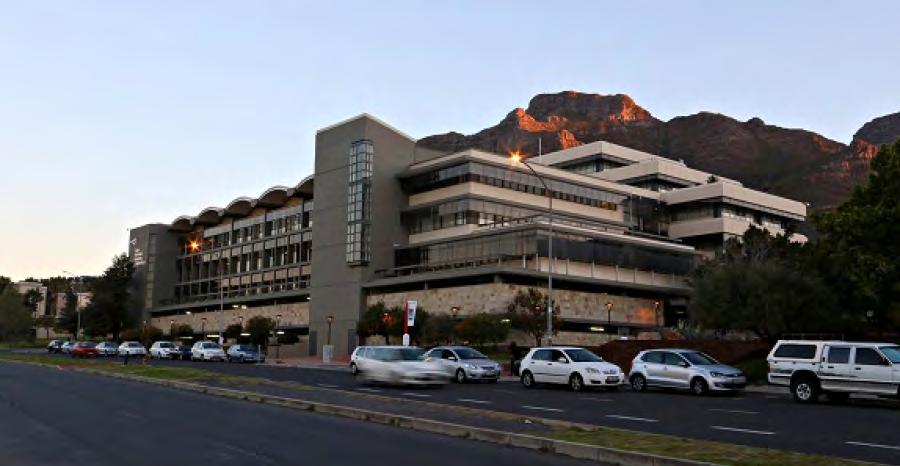
CPUT became the newest member of the Sustainable Development Solutions Network (SDSN) South Africa in June. The SDSN promotes integrated approaches to implement the SDGs and the Paris Agreement on Climate Change, through education, research, policy analysis and global co-operation. It has over 1 800 members in 53 networks across 146 countries. Dr Yolande Steenkamp, Network Manager: SDSN South Africa, said that for institutions like CPUT, the benefits of entering this international network – the largest of its kind globally – are enormous. “Not only could they become involved in some of the global or national workstreams, they could also create workstreams based on their own strengths.” The institution hopes to
contribute to the network through transdisciplinary research projects, activities and initiatives.
CPUT’s Vision 2030 is geared towards building One Smart CPUT. Its development was influenced by the hype of introducing 4IR, AI and the explosion of education and technological developments while also taking into consideration South Africa’s NDP and the UN’s SDGs. “The SDSN will help strengthen collaborations, research and postgraduate training, funding opportunities, staff and student training, student exchange, information, knowledge and data sharing and networking,” said DVC: RTIP Dr David Phaho.
The hard work and dedication of over 500 graduates were celebrated during the Summer Graduation ceremony in December, the longest single graduation ceremony in the history of CPUT. “This graduation is extremely special because not only will you be capped by our Chancellor, the Honourable Thandi Modise herself, but also because so many of you are receiving your doctorates, degrees which have taken years of dedication and immeasurable sacrifice to obtain,” said VC Prof Chris Nhlapo.
The VC added, “For many, the road to this point has been challenging, and it will have taken immense grit to not only finish the course but excel. You represent the cream of the crop. Armed with your qualification, you can launch yourself to greater heights, and also assist in the development and growth of South Africa.”
The 514 graduates comprised: 289 from FEBE, 95 from FBMS, 81 from FAS, 24 from FHWS, 13 from FID, and 12 from the Faculty of Education.
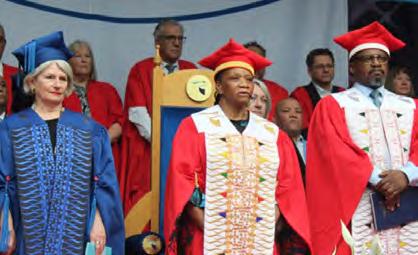
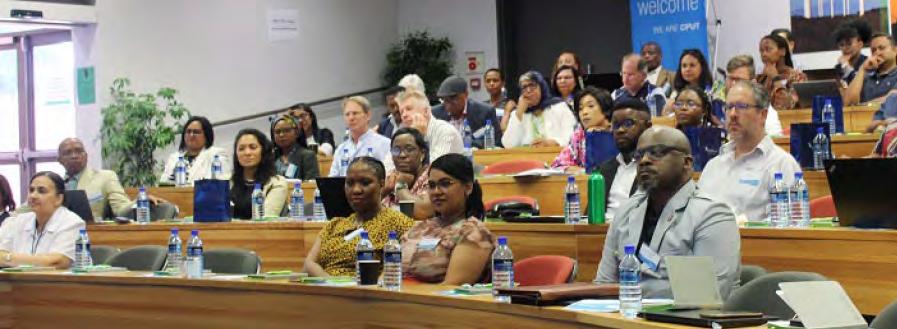
In November, CPUT hosted an engagement session for business and industry partners, providing an opportunity for networking and valuable input from stakeholders. The event, held at SARETEC, was themed ‘One Smart CPUT: Engaged with its critical stakeholders’. Guests were welcomed by the DVC: T&L, Prof. Rishidaw Balkaran. The day featured presentations by the WIL coordinators from each faculty, as well as an exhibition prepared for the stakeholders.
VC Prof Chris Nhlapo said CPUT needs industry partners and members of civil society to achieve the goals set by the institution. He said the key component of a knowledge economy is greater reliance on intellectual capacities rather than on physical input of natural resources. He added that if South Africa is to play its role
in the knowledge economy space, it is important that the institution nurtures its relationships with quintuple helix partners. “We have no choice as we can all see the rampant inequality, corruption and poor education standards that continue to impede growth in South Africa.”
DVC: RTIP Dr David Phaho said CPUT is being proactive in terms of responding to the changes in the job market. “We are working to develop programmes and courses that prepare students for the job market, not just through a regional lens but a national lens and also a continental and a global lens.” Prof Lalini Reddy, Director: Community Engagement and WIL, thanked all the partners and said CPUT subscribes to the concept of Ubuntu.
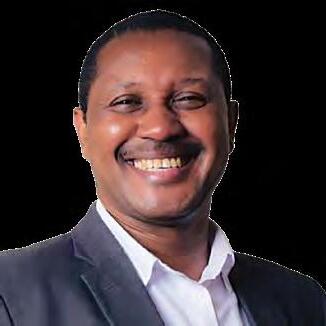
PROF JOSEPH KIOKO
Introduction
In many ways, 2023 represented a ‘settled-down’ year for the faculty after often disruptive and anxious times experienced in the previous year due to external factors. In this regard, the residual impacts of the Covid-19 lockdowns of previous years have been overcome, and the HEQSFalignment project for postgraduate qualifications was completed after some delays in the accreditation process. The postgraduate programme now proceeds smoothly.
One of the faculty’s strategic goals is to develop and implement a programme qualification mix (PQM) that prepares our students for
the future, as well as to contribute to the production of Modes 2 and 3 knowledge. We now have nine master’s qualifications (Agriculture, Chemistry, Consumer Science in Food & Nutrition, Conservation Science, Marine Science, Horticultural Sciences, Food Science & Technology, Environmental Management, and Environmental Health); and seven doctoral programmes (Agriculture, Chemistry, Conservation Science, Horticultural Sciences, Food Science & Technology, Environmental Management, and Environmental Health). These are underpinned by the appropriate undergraduate or postgraduate diploma qualifications. We are still awaiting PQM clearance or CHE accreditation for the Doctor of Marine Science, the Master of Biotechnology and the postgraduate Diploma in Mathematical Sciences. Nonetheless, we are well on target for meeting goals we set ourselves when we embarked on Vision 2030 in 2021. I wish to thank everyone in the faculty and the support departments for their invaluable contributions in getting us this far.
In 2023, the faculty had 194 higher degree students, of whom 146 were registered for master’s and 48 for doctoral studies. Significantly, the majority of these students were female (58% of the master’s students, and 63% of the doctoral students). This is in keeping with recent trends in which female students take up the lion’s share of our enrolments at both undergraduate and postgraduate levels. A similar trend holds among the students graduating, and we are very pleased with the uptake of, and success in, our programmes by female students.
Regarding enrolment, it is noteworthy that the number of students enrolled for master’s and doctoral studies in the faculty in 2023 was well below our enrolment target, reaching about 80% of the target for both levels. This is receiving attention and we expect to remedy the situation.
Another aspect that we are working to address is the number of graduating postgraduate students. In 2023, a total of 33 master’s and 6 doctoral students graduated from the faculty. This is lower than our target, and we aim to raise this number in the coming years.
During 2023, the faculty continued to maintain seven research entities aligned to two of CPUT’s six research focus areas. The two focus areas are: Bioeconomy & Biotechnology; and the Environment, Climate Change & Sustainability. The faculty’s entities in Bioeconomy & Biotechnology: AgriFood Technology Station, Bioresource Engineering Research Group (held jointly with FEBE), Functional Foods Research Group, and Natural Products Chemistry Research Group. The entities in the Environment, Climate Change & Sustainability: Centre for Sustainable Oceans, Crystal Engineering Research Group, and Environmental Chemistry, Toxicology & Remediation Research niche area. The research entities and their respective leaders during 2023 are listed below, and each of the entities has a report in the Focus Areas section of this Research Report.
Centre for Sustainable Oceans, which hosts the CPUT Research Chair: Oceans Economy
Environmental Chemistry, Toxicology & Remediation Research Niche Area
Crystal Engineering Unit
Agrifood Technology Station
Bioresource Engineering Research Group (joint Research Group with the Faculty of Engineering & the Built Environment)
Functional Foods Research Unit
Natural Products Chemistry Research Group
* Prof Beatrice Opeolu is the
Dr C Sparks (Acting) The Environment, Climate Change & Sustainability *
Prof J Odendaal
Prof M Wicht
Mr N Mshicileli Bioeconomy & Biotechnology
Prof V Okudoh
Prof M Opperman
Prof A Mohammed
Please note that more information about this faculty’s 2023 research activities can be found in the Focus Areas section of this Research Report
Faculty of Applied Sciences
The research output from the faculty, as submitted to DHET for subsidy claims, was 63.1261 units, comprising mainly journal articles. Although this is in line with a trend of increasing outputs in recent years, it is a drop from the 2022 output. The faculty is working on reversing this drop and returning to an upward trajectory.
The graduation of postgraduate students and research output are always a highlight for the faculty. In addition, for 2023, I would like to mention a number of other items:
Full professorship represents the highest academic rank at CPUT, and the most defining criteria for this rank are requisite levels of research and scholarship. During the last round of academic promotions in 2022, the university promoted two academics to the level of full professorship. Both academics were from the Faculty Applied Sciences: Prof Vernon Somerset (Department of Chemistry) and Prof Learnmore Kambizi (Department of Horticultural Sciences). As per academic tradition, on achieving this milestone, both professors gave their inaugural addresses in 2023. These addresses were among the pinnacles of the academic calendar of the institution, and left all of us motivated and encouraged to aim higher in our respective academic endeavours.
Heartfelt congratulations to Prof Somerset and Prof Kambizi for reaching this well-deserved summit.
NRF-rated researchers
The faculty had 15 NRF-rated researchers in 2023, with one of them being a C1 rating for established researchers (Prof Kenneth Findlay) and one being a Y1 rating for younger researchers (Prof Sjirk Geerts). In summary for 2023, the faculty had one C1 rating, six C2 ratings, five C3 ratings, one Y1 rating and two Y2 ratings:
Prof KP Findlay C1
Prof NB Bathori C2
Prof CP Laubscher C2
Prof AAH Mohammed C2
Prof VS Somerset C2
Prof MC Matoetoe C2
Prof F Nchu C2
Prof A Jacobs C3
Well done to all our rated colleagues!
Prof S Geerts Y1
Dr N Ndube-Tsolekile Y2
Dr BS Chidi Y2
Biennial customer satisfaction survey for Golden Arrow Bus Services
As part of a long-standing relationship with Golden Arrow Bus Services (GABS), staff and students from the Department of Mathematics & Physics conducted a customer satisfaction survey for the bus company during September 2022. The results of the survey were handed over to the GABS executive management and the Western Cape MEC for Mobility, at a ceremony at CPUT in June 2023. The survey was extremely well received by both GABS and the Western Cape Government, and was acknowledged as playing a key role in strategic decisions for the bus service.
research partnerships
This year, the faculty maintained a suite of strategic research partnerships and also established new ones. Among the existing partnerships was the U6+ Consortium of African Universities in which the faculty continues to play a leading role, including providing the founding director, Prof Learnmore Kambizi (CPUT’s Department of Horticultural Sciences), for the consortium’s African Centre Herbal Research, based at the University of Ilorin, Nigeria. The centre has already produced several patented products developed from African medicinal plants. In 2023, CPUT accepted the invitation to host the 8th International Conference of the U6+ Consortium, scheduled for September 2024.
Apart from maintaining strong intra-Africa partnerships, the faculty also initiated and maintained strategic partnerships across the world. From one such partnership, we co-hosted a joint international conference on Science for Impact in Africa with a focus on agriculture and agri-business. Others taking part in organising the conference: Wageningen University in the Netherlands; Université du Sine Saloum El-Hâdj Ibrahima NIASS (USSEIN) in Senegal; the Weihenstephan-Triesdorf University of Applied Sciences in Germany (HSWT); Université de Gabès (UG) in Tunisia; and Wollo University (WU) in Ethiopia. The conference provided a forum for engagement on local embeddedness, jobs and entrepreneurship in the agribusiness sector; exploration of potential funding opportunities from Europe for Europe–Africa collaboration; and promotion of intra-Africa collaboration in agriculture and agribusiness.
Such partnerships are an important avenue towards making an impact nationally, regionally and globally.
Staff development and capacity building
The achievement of the faculty’s research objectives, including postgraduate output and strategic research partnerships, is dependent on staff capacity and commitment. Thus, staff development and transformation are key pillars of our Strategic Plan. We made use of targeted capacity-building programmes for staff.
During 2023, we had academics taking part in the following programmes, all of whom aimed to attain doctoral degrees by the time of completion:
• Black Academic Advancement Programme: four lecturers
• New Generation of Academics Programme (nGap): three lecturers
• Improvement of Qualifications Programme (IQP): three lecturers, two of whom completed their PhDs in 2023
• Nurturing Emerging Scholars Programme (NESP): one student, who completed her master’s degree in 2023, and we are in the process of recruiting a second student
There were also numerous staff members on the NRF Thuthuka post-PhD and rating tracks.
The Faculty of Applied Sciences’ Strategic Plan, aligned with the university’s Vision 2030, includes an action plan specifically for Research, Technology Innovation & Partnerships. This is in line with Focus Area 3 of Vision 2030, i.e. ‘Smart RTIP that is relevant and excellent in its knowledge production’. In this regard, the faculty has committed itself to the following:
• Developing the research capacity of the next generation of scholars and innovators, putting our faculty at the forefront of innovation in its broadest sense
• Increasing and strengthening interdisciplinary and transdisciplinary research entities
• Creating new opportunities to work in collaboration with industry, business and communities
• Developing commercialisation and other pathways for research impact
• Maintaining a high number of NRF-rated researchers
• Improving research output by academic staff
• Increasing the number of staff qualified to operate leading-edge instrumentation
W ith commitment to the Strategic Plan and the necessary actions, we are confident that we will continue our positive trajectory in the research arena.
To all staff, students and collaborators: Thank you for your commitment, energy, dedication and support in making the year 2023 a success for our faculty.
Postgraduate degrees obtained by staff
PhD in Chemistry
CPUT
Akinfenwa OA
‘Isolation of bioactive compounds from selected plants of South African flora (Helichrysum and Aspalathus species) for application in the preparation of biocompatible metal nanoparticles’
PhD in Environmental Health
CPUT
Agenbag MHA
‘Towards effective local government environmental health services: A policy impact analysis approach’
PhD in Environmental Health
CPUT
Shuping LS
‘A critical analysis of contaminants associated with production of shellfish in Saldanha Bay, South Africa’
PhD in Environmental Health
CPUT
Tanga M
‘Morphological characteristics and chemical composition of skullcap (Scutellaria lateriflora L.) and burdock (Arctium lappa L.) cultivated under different conditions’
Prof Vernon Somerset, a lifelong advocate for planetary protection, delivered a highly praised inaugural lecture at CPUT in June. As an esteemed Environmental Chemistry professor, Somerset possesses a remarkable publication record, with 65 peer-reviewed journal articles, 10 conference proceedings, 15 project and technical reports, 4 books, 22 book chapters and 4 popular articles.
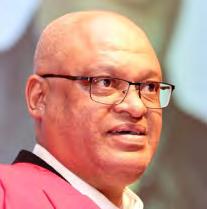
His lecture, titled ‘From atoms to biosphere: A perspective from pollution assessment’, received acclamation from VC Prof Chris Nhlapo. In his opening remarks at the special occasion, Prof Nhlapo highlighted the significance of celebrating contributions while individuals are still alive, and endorsed the vision of ‘One Smart CPUT’, emphasising unity and excellence within the Faculty of Applied Sciences. The event was attended by several distinguished guests, including visitors from UWC, Prof Emmanuel Iwuoha and Dr Natasha Ross. CPUT dignitaries included Prof Andile Mji, Dean of the Faculty of Education, Prof Joseph Kioko, Dean of FAS.
Prof Somerset’s academic journey began as a high school teacher in Mathematics and Physical Science. He holds a BEd (Honours) from UNISA, a Master’s in Chemistry from UWC, and a PhD in Electro-analytical Chemistry from UWC. His career has been marked by numerous national and international awards.
During his lecture, Prof Somerset expressed heartfelt gratitude to his family, friends and mentors for their unwavering support over more than two decades. He underscored the collaborative aspect of his research and its potential impact on future generations.
Prof Iwuoha lauded Prof Somerset’s influence on environmental sustainability policies both nationally and internationally. Prof Somerset also acknowledged Prof Merrill Wicht, Head of the Chemistry Department, for her support.
This inaugural lecture was a significant academic event, reflecting Prof Somerset’s substantial contributions to environmental chemistry and highlighting the importance of collaborative efforts in addressing global pollution challenges. The event served as a testament to Prof Somerset’s dedication and impact, inspiring both current and future generations of scientists. As CPUT continues to champion excellence and innovation, Prof Somerset’s work remains a beacon of hope and progress in the quest for a sustainable future.
Lecturer and curriculum officer in the Department of Food Science and Technology is thrilled to have been awarded a Thuthuka Grant Award by NRF and DSI from 2023 to 2025. Dr Vusi Mshayisa said this grant is for a study continuation of his PhD project on edible insect proteins. “We aim to use green-extraction methods to optimise the extraction of edible insect proteins with a view to value-added food products high in proteins,” Dr Mshayisa explained. This funding will enable him to establish collaborations with other researchers in the field, both locally and internationally, and participate in relevant conferences, workshops and symposia. “All these activities will increase my exposure to the field of Food Science and Technology and build my capacity to become a leading researcher in this field.”
This award reflects positively on CPUT’s DFST. “Receiving the NRF Thuthuka funding award is an exciting and motivating milestone in my academic career, and I am grateful for the support and recognition that this award provides,” said Dr Mshayisa. He also acknowledged support from Prof Jessy Van Wyk, HOD: Food Science and Technology, the entire staff, CPUT Academic Research Group and the DRD.
In 2021, Dr Mshayisa received FAS’s Teaching and Learning Excellence award. In 2022, he was received FAS’s Research Award for most publications for the year 2021. “I attribute my academic success to my passion for research, determination and hard work. have always been driven to succeed and I have always had a keen interest in the field of food science and technology. I have learned that success is not just about working hard, but also about being disciplined, setting achievable goals and prioritising time effectively.”
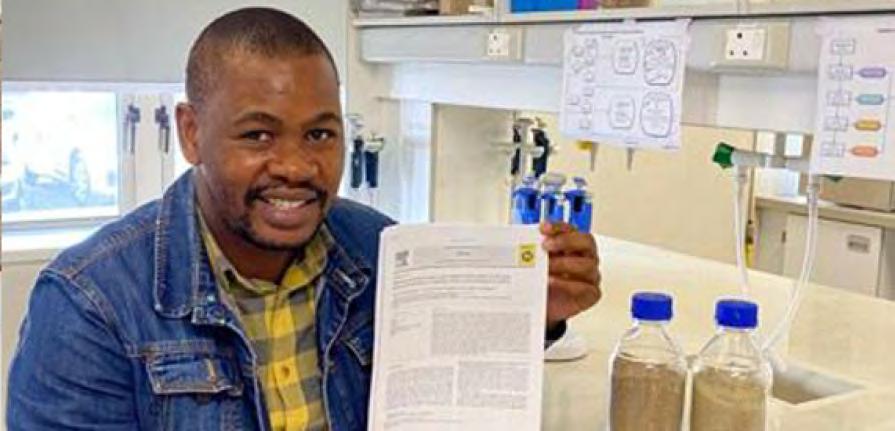
Faculty of Applied Sciences

FAS’s Prof Learnmore Kambizi delivered his highly anticipated Inaugural Professorial Lecture at the Bellville Campus in June, marking the second of two inaugural professorial lectures held in 2023. The lecture, titled ‘Sustainable utilisation and conservation of medicinal plants: A panacea for human health’, highlighted Prof Kambizi’s extensive work in the field of horticultural sciences and his commitment to environmental sustainability. The prestigious event was attended by a diverse audience, including the CPUT Executive Management led by VC Prof Chris Nhlapo, Prof Kambizi’s family, various community leaders, as well as students and staff from CPUT and neighbouring institutions.
Prof Kambezi, who was born in Zimbabwe, has an impressive academic portfolio. He has published over 75 research articles, 10 book chapters, and edited a ground-breaking book Sustainable Uses and Prospects of Medicinal Plants, which was released this year. This work is aimed at both undergraduate and postgraduate students and various stakeholders involved in the field. The esteemed professor also has a second book currently in preparation.
Prof Kambizi’s academic journey is marked by significant milestones. He completed his PhD in Botany at the University of Fort Hare, and has since supervised five PhD students, 18 master’s students, and numerous honours students. Notably, he was the first Director of the African Centre for Herbal Research at the University of Ilorin in Nigeria, part of the U6 Plus Consortium.
In his address, VC Prof Nhlapo praised Prof Kambizi for his excellence in research, teaching and community service. He emphasised the critical need to preserve medicinal plants, which are vital not only for their medicinal properties but also for maintaining ecological balance. Prof Nhlapo urged the integration of traditional knowledge with modern practices to ensure the sustainable use of these plants for future generations.
Prof Joseph Kioko, Dean of FAS, delivered the citation for Prof Kambizi, highlighting his numerous awards, research grants and membership in professional bodies. He noted that the distinguished academic supervised the first doctoral graduate in Horticulture at CPUT, a testament to his pioneering work in the field.
During his inaugural address, Prof Kambizi expressed his gratitude to his family, funding agencies and CPUT staff, including VC Prof Nhlapo, Dean Kioko, and DVCs Prof Rishidaw Balkaran and Dr David Phaho. He also acknowledged the crucial support of his mother, who valued education despite her own lack of formal schooling, and his wife Mercy, who has been a constant source of encouragement throughout his career. He also recognised the contributions of Prof Antony Afolayan, who played a significant role in his early academic development, and Prof Ahmed Mohammed, who has mentored him in research, particularly in Phytochemistry. Prof Mohammed also delivered a response to the inaugural address, and Prof Phaho acknowledged Prof Kambizi, his family and the guests.
This special occasion celebrated Prof Kambezi’s remarkable contributions to horticultural sciences and environmental sustainability, and also highlighted the importance of preserving traditional knowledge and integrating it with modern practices. The event was a testament to Prof Kambizi’s dedication, inspiring both the academic community and the broader public. As CPUT continues to foster excellence and innovation, Prof Kambizi’s work stands as a guiding light, paving the way for future advancements in the sustainable use of medicinal plants.
Thanks to the outstanding work of the Mathematics and Physics Department, Golden Arrow Bus Services (GABS) now has a deeper understanding of its passengers’ needs and areas for service improvement. This was highlighted by the company’s CEO Mr Francois Meyer during the official handover ceremony of the Customer Satisfaction Survey Report for Golden Arrow Bus Services, held at the Bellville Campus in June. VC Prof Chris Nhlapo noted that Golden Arrow had engaged the Department of Mathematics and Physics five times (2012, 2014, 2016, 2018, 2022) to conduct customer satisfaction surveys.
Prof Nhlapo expressed his enthusiasm, “To say I am happy to be part of today’s handover event is simply an understatement, an oversimplification, and not a sincere and fair depiction of the magnitude of this occasion. CPUT has a standing contract research relationship with Golden Arrow Bus Services going back ten years.” Mr Meyer acknowledged the report, saying, “This survey has informed many strategic decisions over the years. It has helped us serve our passengers better by providing invaluable performance insights and understanding their needs.”
Prof Joseph Kioko, Dean of FAS, remarked that the partnership over the past decade has been a unique platform for advancing the three main pillars of Higher Education: Teaching and Learning, Research and Scholarship, and Community Engagement. He added, “For an enterprise like Golden Arrow Bus Services or a metropolis like the City of Cape Town or the Province of the Western Cape, using data to leverage effective marketing, build better products and services, and design strategic solutions is crucial. This also applies to universities like ours.”
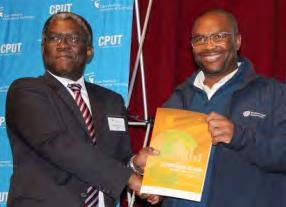
Acting HOD: Mathematics and Physics, Dr Thomas Farrar, presented the survey results. Dr David Phaho, DVC: RTIP, handed over the survey to Mr Ricardo Mackenzie, Western Cape MEC for Mobility, while Prof Gilingwe Mayende, DVC: Operations, delivered a vote of thanks.
Chemistry Department’s Prof Mangaka Matoetoe received a pleasant surprise in the form of a communication congratulating her on being a recipient of a C2 rating by the NRF in July. The driven, focused, hardworking academic has a very good working relationship with her co-researchers, Dr Ncediwe Ndube-Tsolekile, Dr Kanyisa Maqashu and postgraduate students.

Prof Matoetoe has been an associated professor in the Chemistry Department for the past ten years. She said the C2 rating means that all six reviewers for a rating application agreed that a researcher under review is an established researcher, based on the research output in the last eight years. Her research interest is Material Electrochemistry, focusing on synthesis of metal nanoparticles (metal, metal oxide and bimetallic), polymers and quantum dots (ternary and quaternary porphyrin based) as well as their composites.
Prof Matoetoe said the rating will enhance promotion opportunities for her at CPUT and has the potential to positively influence her career. She said now she can apply for full professorship and can personally submit her research proposals for rated NRF funding in the next three years. She adds this achievement required acknowledgement from her fellow researchers that her research is locally known and has some international visibility. Prof Matoetoe acknowledges that juggling her busy academic schedule and family has not been easy, “Hence my study progress was staggered, and my PhD graduation was at 38 years of age.”
Prof Matoetoe expressed appreciation to CPUT for the opportunity, and added, “To any researcher interested in reaching this level, I would advise them to have a focused research theme, target high-impact journals, and be consistently productive.”

An associate professor in the Department of Horticultural Sciences, Prof Felix Nchu, said the C2 rating he has been awarded by the NRF acknowledges the sustained high quality and value of his research endeavours in Applied Biology over many years. Prof Nchu always wanted to be a scientist, but upon completing his BSc in Botany, he could not further his education because of funding challenges. However, in 2022 he enrolled for the BSc Hons Biology programme offered by the Medical University of South Africa (now Sefako Makgatho Health Sciences University), completed it, and obtained a master’s degree and then a PhD from UP. The PhD qualification opened many doors for him, and his dream of becoming a research scientist was finally realised.
Prof Nchu said, “The NRF C2 rating is an important milestone in my career as a research scientist. It means that external, well-respected experts have rigorously reviewed my research outputs, research impact, student supervision, community engagement, research collaboration and leadership against international standards, and determined that I am an established researcher.” His research focuses on optimising and developing environmentally friendly methods for controlling pests in the agricultural and medical domains. Specifically, the applications of arthropod pathogenic fungi and medicinal plants in sustainable pest management.
He commented that preparing for the NRF rating is not an easy task. “It takes time and needs careful planning. Crucially, a candidate has to carve a research niche years before the application and, over time, has to modify and readjust their path continuously to ensure their work is coherent. Receiving an NRF rating indicates that your peers recognise your body of work, and am so grateful and motivated. Next, I intend to keep the momentum going and work towards achieving a higher NRF rating.”
Prof Nchu joined CPUT as a lecturer in 2011. He said it takes hard work and perseverance and admits that balancing family and work can be challenging for scientists who work long hours, often solitarily, up to 45 hours a week, and sometimes in the evenings and weekends. “However, scientists need emotional stability to perform well. I plan, set clear goals and allocate sufficient time to other activities that bring me meaning and joy, such as spending time with my family and friends and exercising.” Prof Nchu expressed appreciation for the support of his wife and children. He believes he has been fortunate to have been supported by people like Prof Solomon Magano, Prof Kobus Eloff and Dr Nguya Kalemba Maniania, renowned scientists who supervised his research theses and are now his collaborators, and Dr Dioh Esona, a brilliant molecular biologist and close friend.
Reflecting on his achievement, he said he feels very grateful and blessed by the Lord. He added that CPUT has been incredibly supportive and provided seed funding for most of his research projects.
The Department of Chemistry was visited by distinguished fellows from various institutions and research fields in December. Dr Ndube-Tsolekile, a senior lecturer, said the primary aim of the visit was to showcase the department’s facilities and to foster engagement between the fellows and CPUT staff members to explore potential collaborations. The visit was part of the STIAS Joint Symposium, to provide a platform where all fellows present their research work to find synergies for future partnerships. Sixteen guests from various scientific backgrounds attended. Research fields included work on nanomaterials and surface chemistry (Chalmers UoT), Medical Chemistry and Biophysics (Umeå University), Immunolog (Karolinska Institutet), and Medical Science (Lund University), among others.
A bus tour around the Bellville Campus was followed by a welcome by HOD, Prof Merill Wicht, and visitors were given an overview of the institution and the Chemistry Department. “The selection of CPUT as the host for these distinguished fellows underscores the university’s emerging research identity and highlights the Chemistry Department’s noteworthy reputation for conducting innovative research. Dr NdubeTsolekile said that the visit was a success, and the delegates were interested in forming collaborations based on the research performed in the department.
The visit could provide CPUT an opportunity to sign MoUs across different institutions, which would benefit postgraduate students.
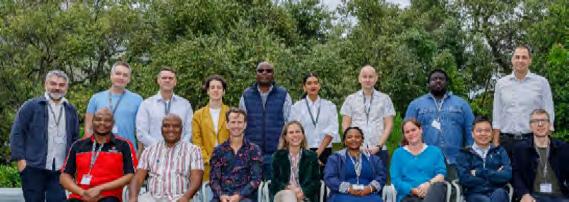
Dr Ncediwe Ndube-Tsolekile with Wallenberg Academy Fellows from Sweden, Stellenbosch Institute for Advanced Study (STIAS) Iso Lomso Fellows, and DHET Future Professor Fellows
The Department of Biotechnology and Consumer Science hosted a WIL Mentor workshop at the District 6 Campus in July. The workshop was for all new and existing food industry partners who accommodate the Consumer Science third-year students for WIL. The programme offers a three-month WIL placement to third-year students. WIL is the practical work experience aimed at helping to prepare the learner for the challenging work life after graduation, and provides an opportunity to build skills needed for a sustainable career path.
The workshop targeted the food industry partners and companies that accommodate the students for their WIL placement. The programme offers training for mentors on providing students with food industry-specific support and training, general career and education guidance, as well as personal and professional growth. Consumer Science Lecturer and WIL Coordinator, Ms Theloshni Govender said, “This workshop strengthens employees’ supervisory and leadership skills, as they play a special role as in-company mentors for our mentees.”
The elective fields of applied workplace learning for Consumer Science students are: Food production; Food service; Quality assurance; Recipe development; Food buying; Fresh food management; Food editing and styling; Training and advising; Food promotion; and Product development.
Ms Govender, who facilitated the workshop, is responsible for assisting students with WIL placements. She ensures that work-based learning experiences effectively guide students in developing the knowledge, skills, attitudes, and work ethics needed to successfully transition into the Food Industry upon graduation. The programme was designed around an instructional strategy which enhances classroom learning by connecting it to the workplace. The WIL mentor programme enables coordinators to understand industry demands for a more skilled workforce. It offers students opportunities to receive training, acquire skills, and gain experience in all aspects of the food industry.
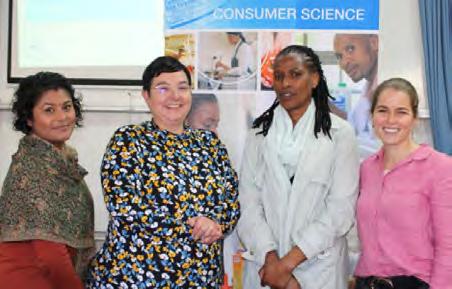
Ms Govender commented, “I am grateful to our food industry partners for their continued support to provide learning opportunities to our students, where the student obtains first-hand experience and insight into the food industry careers by exploring the fundamentals as well as real-world scenarios from the workplace.”
Lecturer graduates on her birthday – for the third time
Dr Lusani Nonkululeko, a lecturer in the Department of Food Science & Technology, received an extra special gift for her birthday – the title of Doctor of Food Science and Technology. The subject of her thesis is ‘The use of nanoencapsulated plant extracts in inhibiting non-enzymatic browning in fruit canned in juice’. The FAS graduation ceremony marked the third time this academic has graduated on her birthday. She earned her National Diploma on 17 April 2008, and she graduated with her MTech on 17 April 2012. “To tell the truth, I had no hope of graduating in April. I still cannot believe it is happening. I remember jokingly telling my sister, ‘Can’t God perform miracles for me, and get to have my last formal graduation on my birthday’, not knowing that He was doing so already.”
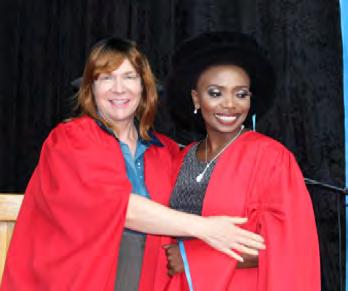
Born in Lwamondo in Venda, Dr Nonkululeko began her education at Maphuphe Primary School in 1993. In 1994, her family relocated to Embalenhle in Mpumalanga, where she continued her schooling at Shapeve Primary. She graduated from Osizweni Secondary School in 2004. Balancing her postgraduate studies with full-time employment was a significant challenge. “That is why I am grateful for my supervisor and line manager, Prof Jessy van Wyk. She acknowledged the assistance from CPUT’s research fund, the NRF Black Academic Advancement Programme fund, which afforded me the opportunity to take a sabbatical to complete my PhD studies. My colleague, Dr Anthony Obilana, sent me the call and together with Dr Vusi Mshayisa, they gave me pointers on how to apply for the grant.”
In addition to holistic wellness, Dr Nonkululeko aims to further her professional growth and share her knowledge with future students, utilising all the opportunities provided by CPUT.
Faculty of Applied Sciences
The Department of Biotechnology and Consumer Sciences said farewell to two exchange students from the Department of Food, Nutrition and Facilities at FH Münster University of Applied Sciences, Germany, in June. CPUT Consumer Sciences: Food and Nutrition lecturer, Ms Raché Hanekom expressed pleasure in hosting Ms Litha Lorenz and Ms Freya Linnig from February to June. The exchange was based on an MoU between the departments.
Ms Lorenz and Ms Linnig participated in the Food Production and Service Operations 2 and Food: Science and Practice 3 subjects. The pair completed large-scale production days, working alongside the programme’s second-year students. Ms Hanekom said, “It has been an absolute pleasure working with Ms Lorenz and Ms Linnig. Their willingness to learn, share knowledge and skills, and participate in all academic activities are commendable.” Prof Maretha Opperman, Head of FFRU, said the students were the second FH Muenster exchange student group visiting the department. “This exchange programme is valuable to our department as it creates opportunities for future research collaboration as well as international benchmarking.”
Second-year student, Ms Oyena Dlwengu said, “It was amazing working with Ms Lorenz as she offered unique perspectives and ideas to assist with group practicals. Despite the social differences and language barrier, she worked well with us and demonstrated a positive and enthusiastic approach towards the subject.” Another second-year, Mr Alistor Rossouw said it was enjoyable to work with Ms Linnig. “I learnt some fascinating facts about Germany. She is an imaginative person and always has solutions for challenges in a practical laboratory.” In a joint statement, the German students said they had enjoyed their stay. “The cultural immersion, educational opportunities, and warm hospitality of the South African people made it a truly memorable experience. The academic staff were knowledgeable and passionate about their subject.”

The Programme Consumer Science: Food and Nutrition looks forward to future collaborations, aligning with CPUT’s 2030 vision of Internationalisation, and plans to host three more exchange students in Semester 1 of 2024.
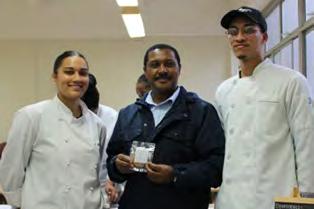
The Department of Biotechnology and the Consumer Science Programme: Food and Nutrition invited industry professionals to evaluate the third-year Consumer Science project-based learning Fibre project in June. This initiative was a collaborative effort between two major subjects, Food: Science and Practice 3 and Nutrition 3, led by lecturers Ms Theloshni Govender and Ms Madidimalo Tshikovhi. Approximately 46 students from each course participated in the project, showcasing their knowledge and skills.
Ms Govender commented, “The Fibre project was nominated according to local and international evidence-based research indicating children are not meeting the daily recommended fibre intake.” She mentioned that the fibre-rich biscuit developed by the students could serve as an ideal snack for the National School Nutrition Programme (NSNP). This South African national school feeding scheme provides over nine million nutritious meals to learners each day.
The adjudicators from industry included Ms Enid Hinrichsen-Swart, a retired Consumer Science lecturer; Ms Maylene Matthews, Senior Product Developer (in the protein area) for Woolworths SA; and Ms Jennifer du Plessis, Culinary Specialist at Mane Shared Services Africa, Deli Spices (Pty). Reflecting on the project, Ms Matthews said, “It was indeed a treat to see the future foodies in action today.” She added that the key characteristics included passion for the product, comprehensive knowledge of the product and process, and effective presentation skills. Ms Govender said that the entire process, from project brief and planning to the final presentation of the fibre-rich biscuit, is designed to meet the standards of Consumer Science food industry partners.
Department of Food Science and Technology’s (DFST) Prof Jessy van Wyk is delighted with the fact that her department has produced nine proud recipients of the first Bachelor of Food Science & Technology degrees (BPFSTH) during the second ceremony of the Autumn Graduation 2023 at the Bellville Campus in April. “As HOD, I am both extremely grateful and immensely proud of the fact that our department reaped the fruits of its long and hard labour in terms of designing and implementing this qualification. I am also proud of our graduates – they will be true ambassadors of the DFST and CPUT,” remarked Prof van Wyk.
She added that for CPUT, this could truly become a flagship qualification, as they are working closely with CHEC, the Food Bev SETA, and their industry partners to incorporate workplace-based and other WIL modalities into their offering. This will transform the BPFSTH into a Dual Higher Education Programme (DHEP). Prof van Wyk stated that this will enhance the job-readiness of graduates and elevate the quality and value of the BPFSTH, potentially making it the most sought-after Food Science and Technology programme in South Africa and beyond.
The exit level of the BPFSTH is at NQF level 8, allowing graduates to pursue postgraduate studies (such as a Master of Food Science and Technology or a master’s at another institution) or find employment, typically at a first-line managerial level in the food industry. “In a nutshell, the key difference between the BPFSTH and the diploma is that graduates achieve a higher level of cognitive complexity, with mastery of knowledge, skills and attitude, with theory and practice focused on conceptual more so than contextual forms of knowledge”, said Prof van Wyk.

As part of community outreach for Maths and Physics, the Chemistry Department hosted learners and teachers from Oscar Mpetha High School during August. They introduced the learners to university facilities, and also encouraged them to pursue STEM professions such as Analytical Chemistry.

The event was organized by the department’s Dr. Ncediwe Ndube-Tsolekile in collaboration with Ms. Madillo Mareka from Duram Paint, and was sponsored by the Council for Scientific and Industrial Research. To help make it a memorable experience and show that the learners are valued by the department, the young people had the opportunity to interact with NRF-rated researcher, Prof Mangaka Matoetoe. They were also offered course selection advice, allowing them to ask questions about university applications, career choices and research within the department.
The learners acknowledged the importance and value of the opportunity provided by CPUT, especially for those from the townships. “It was the first of its sort for Oscar Mpetha High School, which generated a lot of excitement for us and the Nyanga community,” Dr Ndube-Tsolekile observed. As someone who grew up in the township herself, Dr Ndube-Tsolekile told the young visitors, “Our background does not dictate our future, and we should never let it define our destiny. We can all realise our dreams with hard work, commitment and perseverance.” She also provided an overview of the faculty and the department, and included career guidance. “The laboratory visit, which featured demonstrations on nanomaterial synthesis and observing their luminous nature, stood out for them. Watching their excitement when they made their own ice cream in the laboratory made us so happy. Those smiles were just priceless.”
Ms Vusiwe Tsetsana, a teacher from Oscar Mpetha High School, noted that the event provided them with valuable insights, and commented, “We are very honoured and are grateful to CPUT.”

PROF PAUL GREEN
Introduction
The Faculty of Business and Management Sciences (FBMS) continued to lead in strategic and innovative business and management practices during 2023. The faculty has strengthened its collaborations and strategic partnerships with other universities, industry and the community, improved postgraduate enrolments and graduation rates, and increased research outputs.
FBMS is proud of its four well-established research centres, which engage in world-class research projects and operate under the Institutional FA 5: Human, Health & Social Dynamics and FA 6: The Digital Society. Detailed information about each centre can be found in the Focus Areas section of this Research Report:
• Centre for Sport Business & Technology Research (CSBTR), in the Sport Management Department, page 219
• Centre for Business Innovation and Incubation (BIIC), at the Graduate Centre for Management, page 224
• Brand & Digital Research (BDR) Hub, in the Department of Marketing, page 230
• Centre for Tourism Research in Africa (CETRA), in the Tourism & Events Management Department, page 214
The faculty enrolled 289 postgraduate students in 2023. A total of 134 students were awarded degrees, with 123 master’s and 11 doctoral students graduating at the April and December ceremonies.
FBMS hosted a number of conferences over the past year. These conferences highlight the faculty’s diverse research areas and showcase the significant contribution the faculty is making to the academic community.
FBMS continued its virtual internationalisation efforts by expanding its Collaborative Online International Learning (COIL) projects. The BDR Hub collaborated on a COIL project with Anhalt University of Applied Sciences in Germany. Professor Daniel Michelis from Anhalt University of Applied Sciences was the keynote speaker at the 2nd BDR Hub Research Symposium, where he shared his expertise on using digital communication for good. His address on collaborative online international learning, along with other collaborations with the Marketing Department, motivated enhanced collaboration.
During 2023, partnerships with the following institutions were renegotiated and signed:
• DHBW University, Germany
• Polytechnic Institute of Porto, Portugal
• Namibia University of Science and Technology, Namibia
The Romanian–American University (RAU) signed a new Erasmus+ partner agreement with the Department of Marketing, resulting in Ms Jones, Dr Williams and one of Prof Duffett’s master’s students, Mr Ayabonga Siyamthanda Mxunyelwa, participating in a staff and student exchange to RAU in the first semester of 2023. Prof Duffett also published several journal articles with RAU staff during the year.
Discussions and negotiations with prospective international partners, in line with our strategic intent, led to additional MoUs being signed during 2023 with the following institutions: Walter Sisulu University and Nelson Mandela University, South Africa; Hochschule Niederrhein University of Applied Sciences, Germany; University of Port Harcourt, Nigeria; University of St Augustine, Tanzania; and CBS International Business School, Germany.
The Cape Town Hotel School (CTHS) hosted the Minister of Tourism from Jamaica, the Honourable Edmund Bartlett in April. The purpose of the visit was to establish areas of common interest for collaboration and to provide an overview of the CTHS programme offerings. Dean Prof Paul Green, accompanied by staff members, accepted an invitation to the Polytechnic University of Porto in Portugal. Engagements included meetings with deans from the School of Business and the School of Hospitality, as well as the Director: Centre for Research. This visit resulted in a strengthened partnership that has expanded to other faculties at CPUT. FBMS also participated in the recent UK–Africa Education Roundtable hosted by the British High Commission’s Midlands Region.
Prof Renitha Rampersad, Assistant Dean of Research, received a grant from the National Institute of the Humanities and Social Sciences. The African Pathways and International, BRICS and Global South Mobility Programme saw a team of four project members travel to Rio de Janeiro to visit the Federal University of Rio de Janeiro as part of a BRICS project. The visit focused on digitalisation and infrastructural challenges, and included delegates from Brazil, South Africa and Indonesia.
Please note that more information about this faculty’s 2023 research activities can be found in the Focus Areas section of this Research Report
FOCUS AREA 5
Health & Social Dynamics Research Centres:
FOCUS AREA 6
Research Centre:
Faculty of Business & Management Sciences

Ms Simone Thomas, a Marketing doctoral student, was awarded a bursary and job opportunity, which she took up in Germany in 2021 to undertake academic activities at Hochschule Koblenz University of Applied Science (HSK) while furthering her doctoral studies through the CPUT–HSK cooperation. Ms Thomas’s residency in Germany continued in 2023.
The faculty welcomed 114 international exchange students for short and full semester visits, while a 8 of our students visited the following partner universities: RAU in Romania, Aalan University of Applied Science in Germany, DHBW Ravensburg in Germany, and Rotterdam University of Applied Sciences in the Netherlands. The faculty also welcomed 68 international scholars, including world-renowned research methodology expert Prof Mark Saunders, and our academic staff members visited various international partner universities.
All FBMS research activities are guided by CPUT’s ‘Vision 2030: One Smart CPUT’ with a focus on providing an enabling environment for all academic staff and postgraduate students. Capacity building and academic development remain key priorities to enhance the skills, knowledge and competencies necessary for conducting relevant and high-quality research. Online research workshops are held weekly to support all postgraduate students and equip them with essential tools and knowledge. The Master’s Advancement Programme (academic staff studying towards their master’s) continues, and of the Doctoral Advancement Programme (aimed at academic staff working towards their doctorates) was introduced this year. Various events and research capacity workshops held in 2023 are described below.
Prof Sebastian Kot (Czestochowa University of Technology, Management Faculty, Poland) and Prof Janusz Grabara (Jan Dlugosz University in Czestochowa, Faculty of Law and Economics, Poland) visited FBMS in February. They met with academic
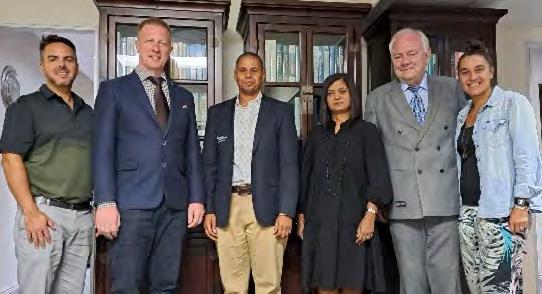
staff for a collaborative discussion and presented on ‘Successful preparation and submission of papers to high ranked journals: Tips from an editor’. FBMS’s Research & Innovation Unit launched the Women’s Mentorship Programme in August to assist emerging women researchers with research, time management, funding and resources. Guest speakers included Prof Denise Zinn (Programme Leader, Higher Education Leadership and Management), Dr Naziema Jappie (Deputy Dean CHED, UCT), Prof Dina Burger (Director: DRD), and Prof Retha de la Harpe (adjunct professor at GCM). Topics covered included ‘Growing
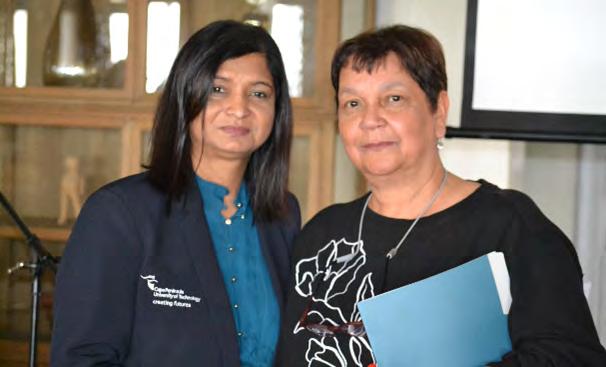
who you are and what you can become’, ‘Shifting the mindset: Transitioning from employee to manager and leader’, ‘Mentoring women scholars is a key value proposition for becoming tomorrow’s leading scholars’, and ‘How mentorship has shaped my academic journey’.
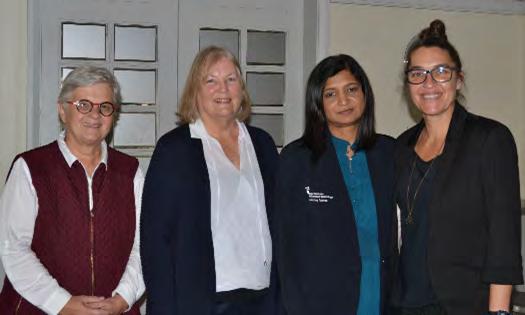

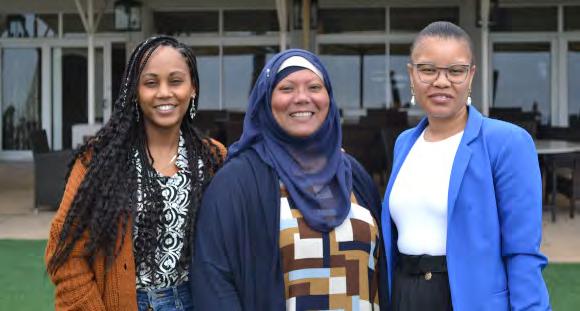
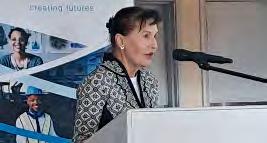
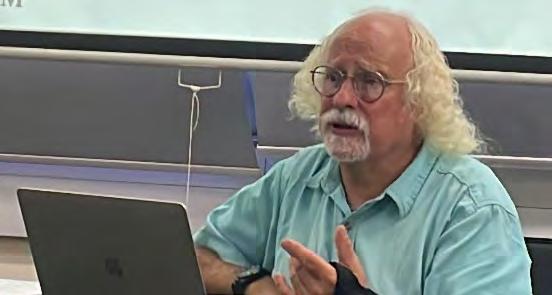
Please note that you can find information about capacity development and enhancement programmes hosted by CETRA on page xx of this Research Report.
A workshop was held to expand the knowledge of the faculty’s academic staff on cohort supervision. Prof Judy van Biljon (SARChI Chair: Information & Communication Technology for Development, Unisa) and Mrs Ronell van der Merwe (School of Computing, Unisa) facilitated the workshop, which included aligning expectations of cohort supervision, argumentation in academic writing, and tips and traps of cohort supervision.
Prof Mark Saunders (Business School, University of Birmingham) visited CPUT for collaborative discussion, knowledge sharing and postgraduate scholarly guidance. He presented at CPUT’s Research Festival on the ‘The importance of relevance in research: For whose benefit’. Prof Saunders returned in October to assist our postgraduate students and staff with proposal, dissertation and journal article writing.

The faculty held a highly engaging journal writing workshop for students and staff to improve their understanding of the publication process and enhance their academic writing skills. The workshop was
facilitated by Prof de la Harpe and Dr West, with presentations by Prof Naicker and Prof Duffett focusing on the structure of a journal article, writing techniques, the peer review process, and selecting the right journal.
Dr Andre de la Harpe, Prof Harry Ballard, Prof Theodare Haupt and Prof Retha de la Harpe were appointed to the faculty as adjunct professors this year. They assist with research collaborations, student supervision, staff development, research workshops, mentoring and publication of journal articles.
FBMS was involved in hosting various conferences during 2023. For example, the 2nd BRICS Postgraduate Forum (hybrid) held in August at the Hyatt Regency was hosted by FBMS, CPUT and DUT. The conference attracted over 200 postgraduate presenters from several the BRICS countries.
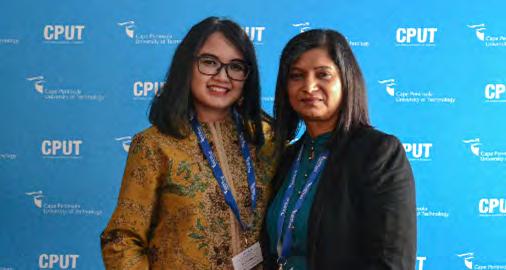


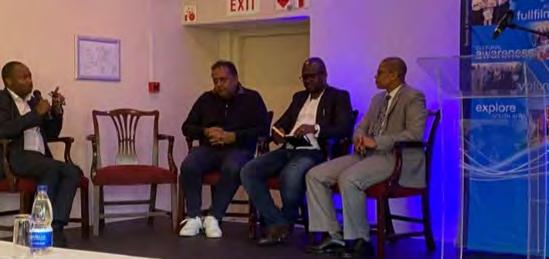

The 9th Hybrid International Conference on Business and Management Dynamics (ICBMD) held in September focused on the theme ‘Managing higher education and business enterprises in developing countries beyond Covid-19’. Guest speaker Prof JJ Thabane sparked meaningful conversations around the evolving landscape of research and how research needs to be relevant for communities and societal change.
2023 was unofficially branded the ‘year for women’s sport’ in South Africa, and a series of women’s sports events were hosted here, including the 2023 International Women’s T20 Cricket World Cup and the Netball World Cup. It was therefore fitting for the Department of Sport Management to hold the Women in Sport Conference, which included discussion and presentations on women in leadership, women’s sport participation and development, leisure and wellness in women’s sport, policy development for women in sport, and women’s sports events.
The FBMS Achiever Awards 2023 was held at the Cape Town Hotel School to celebrate outstanding research achievements of our academic staff and postgraduate students. The event brought together researchers, faculty members and postgraduate students, and provided a platform to honour and recognise exceptional work. The guest speaker, Prof Linda Ronnie, UCT’s former Dean of Commerce and current acting DVC: Teaching & Learning, shared insights from her own research journey and inspired the audience with her perseverance and academic achievements. The event celebrated individual and collective departmental achievements, and also highlighted the significant role research plays in driving societal progress and shaping a better future.
The awards presented:
• Research Department of the Year Award: Tourism and Events Management
• Researcher of the Year Award: Prof Rodney Duffett
• Emerging Research of the Year Award: Dr Chris Hattingh-Niekerk
• Supervisor of the Year Award: Prof Rodney Duffett
• Top Doctoral Student of the Year Award: Dr Maritsa Grewe
• Top Master’s Student of the Year Award: Ms Rentia Van Heerden
• Runner Up Master’s Student of the Year Award: Ms Ilanza Perold





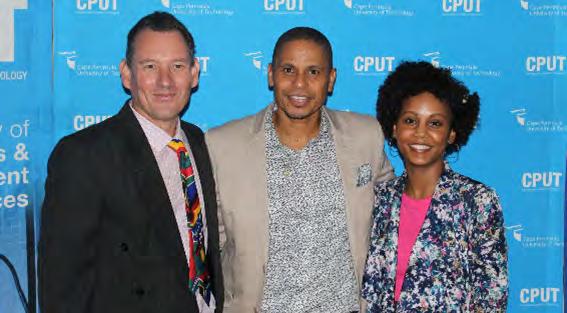
Faculty of Business & Management Sciences

FBMS NRF-rated researchers
The faculty is very proud of its NRF-rated researchers. Prof Simeon Davies, Prof Vicky Naicker, Prof Michael Twum-Darko and Dr Sacha West have a C3 rating. Prof Brendon Knott has a Y2 rating.
FBMS Postgraduate Research Conference
The FBMS Postgraduate Research Conference was held virtually once again this year, providing our postgraduate students with the opportunity to present and share their research.
FBMS Emerging Researcher Conference
The FBMS Emerging Researcher Conference took place on the Granger Bay Campus. This event, aimed at our Advanced and Postgraduate Diploma students, was themed ‘Voices of the future: Empowering emerging researchers in social sciences’.
Postgraduate degrees obtained by staff
FBMS extends sincere congratulations to all staff who obtained postgraduate degrees this year. Please see page xx for details.
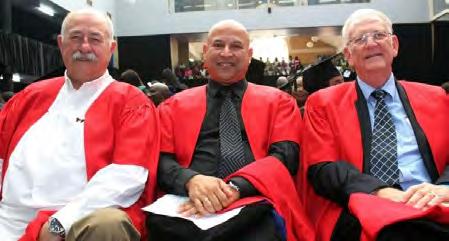

Postgraduate degrees obtained by staff
Doctor of Commerce in Marketing
CPUT
Hermanus T
‘A strategic marketing framework to manage the effect of user generated content on consumer-based brand equity of major retailers in the Cape Metropole’
Doctor of Human Resource Management
CPUT
Charles W
‘Integration of people with disabilities in the Western Cape into mainstream employment: A model for provincial government departments’
DTech in Informatics
CPUT
Mosham F
‘The level of alignment between the use of implemented Health Information Technologies (HITs) and the clinical work activities of nurses in the public hospitals of Cape Town’
DTech in Office Management and Technology
CPUT
Da Costa M
‘The influence of organisational policies on office administrators’ ethics in a selected financial services company in South Africa’
DTech in Tourism and Hospitality Management
CPUT
Venske E
‘Contemporary curricula for business event tourism in South Africa: Strategies and responses to industry requirements’
DTech in Tourism and Hospitality Management
CPUT
Mokoena P
‘New-age tourism students’ learning preferences and implications for tourism education at universities of technology’
PhD in Social Science Communication
University of Fort Hare
Mhlomi Y
‘Integration of digital media and pedagogy in the twenty first century classroom: A survey of selected high schools in Eastern Cape, South Africa’
PhD in Economic and Management Sciences with Business Statistics
North-West University
Rapoo MI
‘Modelling and forecasting foreign direct investment: A comparative application of machine learning-based evolutionary algorithms hybrid models’
PhD in Sport and Exercise Science
University of the Western Cape
Ras J
‘Relationship between cardiovascular health metrics and risk profile, musculoskeletal health, physical fitness and occupational performance in firefighters’
Faculty of Business & Management
Sciences
PhD in Sport Management
University of the Western Cape Moroe J
‘An analysis of the implementation of DSAC’s club development programmes: Case studies of selected community football clubs in KwazuluNatal and the Western Cape’
LLM: Master of Laws
University of the Western Cape Mopp M [thesis title]
MPhil in Business Management
University of Pretoria
Tsaque-Mbumbo E
‘The effects of digital technology adoption at the organisational level on firm performance in the agriculture industry in South Africa’
Master of Tourism and Hospitality Management
CPUT
Abrahams E
‘Edu-tourism destination selection motives: focusing on study abroad programmes at universities in the Western Cape, South Africa’
Master of Tourism and Hospitality Management
CPUT
Cornelissen Z
‘Event organisers’ perspectives on the importance of marketing management of culinary festivals in the Western Cape’
Master of Tourism and Hospitality Management
CPUT
Nditha A
‘Adaptation strategies for the Franschhoek Rond and Bont community-based tourism route in the context of Covid-19 pandemic’
Master of Tourism and Hospitality Management
CPUT
Tomlinson Z
‘Online reputation management: Exploring how hotels in Cape Town’s central business district manage online reviews’
Master of Sport Management
CPUT
Perold I
‘The work-life balance, leisure and wellbeing of working parents with toddlers during the Covid-19 crisis in Cape Town, South Africa’
Master of Sport Management
CPUT
Ramatsia A
‘Contemporary challenges facing female senior managers in selected sport organisations in South Africa’

Ms Zimkitha Bavuma is an emerging researcher and lecturer in the Department of Tourism & Events Management, and is affiliated with the South African Association for the Conference Industry (SAACI). She received the SAACI Enkuklu Youth Award 2023 for her exemplary work as an Events Management lecturer and her extensive experience in organising a wide range of events. The SAACI Enkuklu Youth Award 2023 recognises young professionals in the meetings and events industry who have shown exceptional dedication and achievement.
This award is part of the broader Enkuklu Awards, which celebrate outstanding contributions in various categories within the industry. The Youth Award specifically honours individuals under the age of 35 who have demonstrated significant industry achievements, leadership abilities, and contributions to sustainable development. The award aims to promote the industry to young professionals and highlight their role in building the image of their employers and the industry as a whole.
FBMS Faculty Achiever Awards ceremony was held in March at the Cape Town Hotel School, Granger Bay. The purpose of the event is to recognise excellence in research, teaching and learning, and administration within the faculty. The Achiever Awards function is an annual event that recognises and acknowledges staff for their research achievements, innovative teaching methods, and consistent and exceptional administrative skills over the previous year (in this case, 2022).
FBMS Dean, Prof Paul Green, opened the event and welcomed all guests, including DVC: RTIP, Dr David Phaho (Guest Speaker); DVC: T&L, Prof Rishi Balkaran;
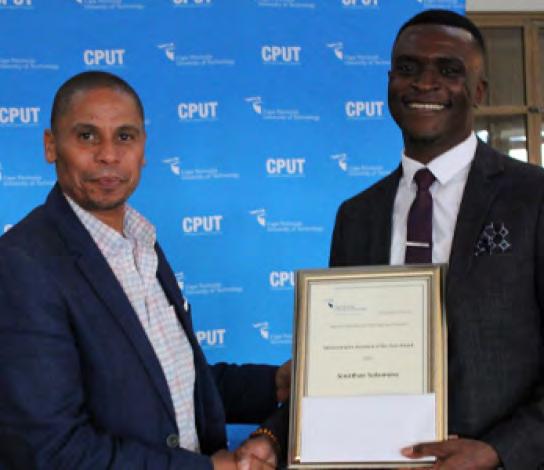
assistant deans; HODs and awardees. Dr Phaho spoke of the importance of excellence and its value within an institution, and Prof Balkaran congratulated the award recipients. All awardees received a certificate and a monetary grant to be used for work-related purposes.
The award winners were:
Research Awards
- Ms Miria Claude Eulalie Oukouwadela, Master’s Student of the Year
- Mr Lance Barbier, Doctoral Student of the Year
- Prof Brendon Knott, Researcher of the Year
- Dr Hilary Bama, Emerging Researcher of the Year
- Prof Robertson Tengeh, Super visor of the Year
- Public Administration & Governance, Research Department of the Year
Administration Awards
- Mr Jonathan Solomons, Administrative Assistant of the Year
- Ms Daphne Morrison, Secretary of the Year
- Ms Amiena Sallie, Secretary of the Year
Teaching Excellence Awards
- Mr Nizaam Peck, Departmental Teaching Excellence Award
- Mr Faraaz Omar, Departmental Teaching Excellence Award
- Dr Janice Hemmonsbey-Lodewyk, Faculty Teaching Excellence Award
- Dr Liiza Gie, Faculty Teaching Excellence Award
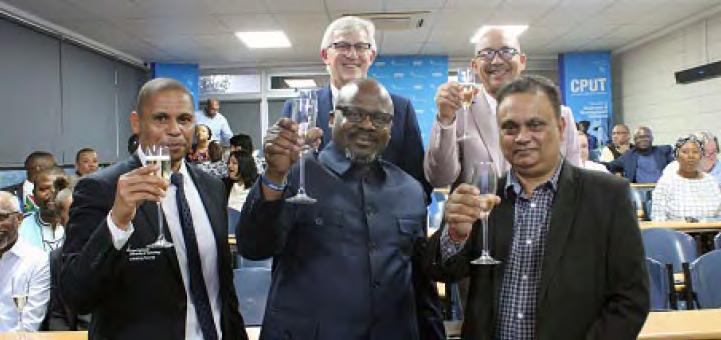
The new state-of-the-art FBMS smart classroom is set to redefine the landscape of learning, teaching and assessment. At the launch of this cutting-edge venue, Dean Prof Paul Green welcomed attendees, describing the innovative space as “a hub designed to transcend traditional boundaries,” facilitating a spectrum of academic and collaborative activities. He continued, “Our collective vision of ‘One Smart CPUT’, as envisaged in Vision 2030, has been met with resounding enthusiasm in FBMS, and the actions of the faculty express that this morning.” He explained that the venue had been designed to host a myriad of functions, including advanced postgraduate classes, webinars, and colloquia, as well as to facilitate hybrid academic events and advisory board meetings. He added, “FBMS is immensely proud to pioneer this transformative initiative in line with CPUT’s ambitious Vision 2030. This smart venue embodies our commitment to excellence in education and serves as a beacon of innovation for the entire institution.”
Attendees were treated to a demonstration of the smart venue’s functions and capabilities. DVC: T&L Prof Rishidaw Balkaran said the facility “creates the conditions for much more production and productivity in terms of our academics”. He thanked Prof Green and the faculty for their commitment to the project. VC Prof Chris Nhlapo said what was key about the mission of the institution is that “CPUT transforms its students through world-class researchers who inspire knowledge production and innovation that are cutting-edge,” and that CPUT was ready to be the MIT equivalent in Africa.
Faculty of Business & Management Sciences


This year, in a noteworthy achievement, a staff member from the Department of Management & Project Management, PhD candidate Mr Luyolo Mahlangabeza, was selected to attend the PhD Winter School on Innovation & Strategic Entrepreneurship for Sustainable Development at Bern University of Applied Sciences in Switzerland. Mr Mahlangabeza was chosen from a pool of over 200 international applicants and was the sole candidate from CPUT whose application was approved.
Additionally, Mr Mahlangabeza was appointed Secretary-General of Business Network Africa (BEN-Africa) during the 2023 academic year, earning a position on BEN-Africa’s Executive Committee. Established in 1999, BEN-Africa aims to unite Africans with an interest in business ethics and expand business ethics on the African continent. Mr Mahlangabeza’s focus on sustainable entrepreneurship in his PhD studies positions him to make significant contributions in this field, further enhancing the institution, faculty and department’s involvement in pertinent discussions and research regarding African business ethics.
Mr Mahlangabeza has also been recognised by other institutions. He was approached by Unisa and appointed as a reviewer for the 5th African International Conference on Industrial Engineering and Operations Management, to be held in Johannesburg in April next year. He has reviewed three of the conference papers. Additionally, he was approached by Nelson Mandela University to examine eight Master’s in Business Administration theses.
FBMS helps advance research and the development of the next generation of leaders
Dr Cynthia Dube of the Department of Tourism & Events Management delivered a presentation at the South Africa Heritage Hub Inception Workshop in September. Her talk focused on fostering a stronger, mutually beneficial relationship between Iziko Museum and the department. This workshop resulted in an MoU being signed between the department and the museum to advance collaboration on matters of mutual interest, particularly in advancing research and developing the next generation of leaders and experts.
The South Africa Heritage Hub Inception Workshop was organised by Iziko Museums in collaboration with the International Centre for the Study of the Preservation and Restoration of Cultural Property (ICCROM). The workshop aimed to establish a Youth Heritage Hub in South Africa, focusing on engaging young people in the preservation and promotion of cultural heritage. It brought together various stakeholders from across Africa to exchange ideas and strategies. The goal was to create a platform where youth could creatively express their cultural heritage through arts such as theatre, poetry and music. This initiative is part of the broader Youth.Heritage.Africa programme, which links heritage to daily life and promote it as a source of livelihood for African youth.
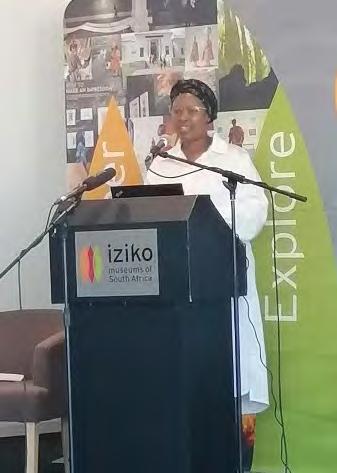
The Heritage Hub also focuses on fostering entrepreneurship and business development skills among young people, leveraging creative arts and partnerships within Africa’s heritage protection and promotion cycle.
FBMS hosted its inaugural Hybrid International Week at the Cape Town Hotel School, Granger Bay Campus in March. The event, which brought together international and local universities, businesses as well as government representatives, was aimed at strengthening the faculty’s strategic partnerships. The theme was ‘Re-imagining internationalisation post Covid-19, focusing on the lessons learned, while navigating the new normal’. Dean Prof Paul Green opened the event and welcomed the guests. He extended sympathy to the Turkish partners who were forced to withdraw their attendance due to the disaster that recently hit their nation.
Prof Judy Peter, Director: RTI-SIP, delivered a keynote address. Dr Carla Enslin, Head of Postgraduate Studies at Vega School, spoke about brand resonance. Also among the delegates were members of the SRC, President of the CPUT Convocation, Mr Lwandile Socikwa, as well as international visitors from Germany, Slovakia, Finland, Réunion Island and Russia. They each presented an overview of their institution and country. Prof Green commended all attendees for participating in the event, recognising their attendance as a symbol of the shared vision in respect of strengthening collaborations. He ended his address with the African proverb, “If you want to go fast, go alone. If you want to go far, go together.” Prof Green added, “I want to wish you a successful event, may the deliberations be invigorating, and provoke your thinking as well as extend your boundaries. I thank you. Enkosi.”
Ms Andiswa Mrasi, Acting Manager: RTI-SIP at FBMS, said the positive feedback they received from guests and colleagues was heart-warming. “Putting together an event of this magnitude, marking the first of its kind in the entire institution, was quite overwhelming. am beyond humbled that it all went well, and of course, I cannot claim the glory alone. We were supported by several individuals and departments
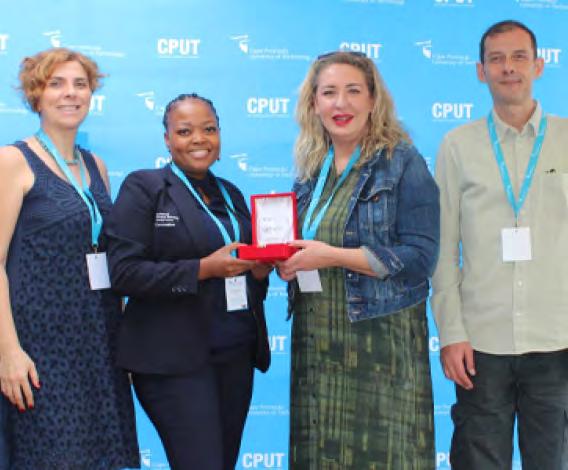
Dr Jerome Kiley is a lecturer in Human Resource Development, where the focus is on nurturing and enhancing the skills, knowledge and abilities of employees. Dr Kiley contributed two chapters to the new edition of Practising Learning and Development in South African Organisations, published in 2023. His chapters were ‘Delivering and learning interventions’ and ‘Evaluating learning intervention effectiveness’.
within the faculty as well as across the university. We remain grateful,” said Ms Mrasi. She said her faculty was committed to producing the policymakers and game changers of tomorrow, particularly from our developing country and continent, where people still face inequality and poverty. Reflecting on the event, Acting HOD of Management and Project Management, Ms Nobuhle Luphondo, said “It was very important for us to know what is being offered on the other side so that we can relate that to what we are offering.”
The three-day event included presentations by international universities and industry partners, excursions and community engagement with a township tour to Gugulethu 7 Memorial, Unako Children’s Home, Guga S’thebe Cultural Centre, and a South African lunch at Tee’s Lounge.

This fourth edition of the comprehensive guide provides an outcomes-based, occupation-directed and work-based learning and development (L&D) approach to workplace learning design, integrating theoretical and practical perspectives. It is regarded as highly valuable for students as well as for practising L&D and HR professionals, offering practical principles and insights into effective L&D procedures within our South African context.
FBMS’s Sport Management Department in collaboration with the Western Cape’s Department of Cultural Affairs and Sport (DCAS) invited stakeholders from the sports bionetwork to be part of an influential Woman in Sport (WIS) Conference to make gender equality a lived reality in and through sport. The two-day conference was held at the Kelvin Grove Club in Newlands in October. Sport Management lecturer Dr Janice Hemmonsbey-Lodewyk said 2023 may be seen as the year for women’s sports in SA, with a series of sports events hosted here, such as the ICC Women’s T20 Cricket World Cup, the Netball World Cup, and our women’s soccer team’s victory in WAFCON,
which qualified them for the Women’s FIFA World Cup. “It is from this backdrop that the Sport Management Department and DCAS decided to leverage the opportunity to host the conference to raise awareness, discuss pertinent issues, and highlight achievements of women in sport.”
The event, with the theme ‘Critical global issues related to women in sport’, aimed to identify practice–knowledge gaps to take the conversations forward and delve into further research topics. In his opening address, Dean Prof Paul Green said the conference underscored “the significance of the challenges and opportunities that
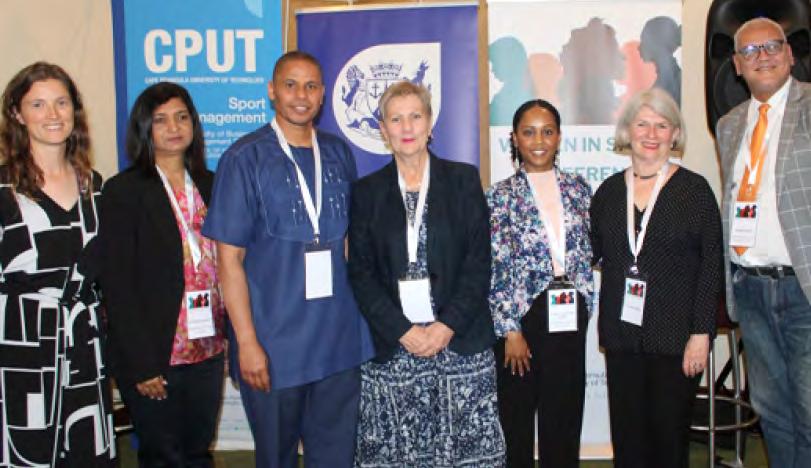
women in sports face on a global scale. As we embark on this two-day journey of exploration, discussion, and enlightenment, we are privileged to have a line-up of distinguished keynote speakers who will provide invaluable insights. On Day 1, we will be graced by the presence of the Honourable Minister Anroux Marais, who will share perspectives on ‘Women in sport: Past, present, and future’.”
The delegates came from the Western Cape Government, the CPUT community and networks, NWU and Istanbul Bilgi University. Prof Kamilla Swart from Hamad Bin Khalifa University in Qatar honoured the delegates with a keynote address on women in sports leadership. Delegates from the South African Football Association (SAFA) and Fédération Internationale de Football Association (FIFA) were also in attendance. The event ran smoothly, and the panel discussions were insightful, touching on a variety of pertinent issues. “The contextual South African challenges – such as safety aspects to participate in sport and lack of proper sporting infrastructure – seemed to be a common theme throughout. However, the conference also highlighted the many strides that the industry has made in women’s sports participation at an elite level,” Dr Hemmonsbey-Lodewyk observed.
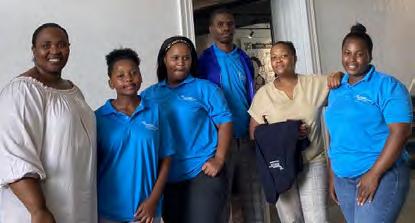
Staff members of the FBMS, along with five SRC members, attended a March screening of a new documentary on the life of the late Archbishop Desmond Tutu. Titled ‘A tree has fallen, remembering Archbishop Desmond Tutu’, the documentary was directed by Ms Marika Griehsel. It features conversations with people who were close to the Archbishop. CPUT attendees included Ms Andiswa Mrasi, Acting Manager: Unit for RTI-SIP; Ms Mandisa Silo, HOD of Tourism & Events Management; and District 6 SRC members Ms Ongeziwe Jeke, Mr Xolani Booi, Ms Thaler Mbaba, Ms Nwabisa Sotyingwa and Ms Xolisile Dingilizwe.
“In line with Vision 2030’s Focus Areas 6 and 7 of smart student engagements and linkages with quintuple helix partners, FBMS, through its unit for RTI-SIP has been intentional in all its collaborations,” said Ms Mrasi. She continued that it was a great honour to have been invited to the event and to have been accompanied by their SRC members. She added, “Seeing them network with some of the international guests present, including the Swedish Ambassador to South Africa, was heart-warming.”
The delighted newly appointed Director: Cape Town Hotel School (CTHS) Dr Oswald Mhlanga brings with him a remarkable blend of experience, relentless pursuit of excellence and vision. Dr Mhlanga joined the hotel industry as a front office porter carrying guests’ luggage and later acquired formal education.
Dr Mhlanga was born in the small mining town of Hwange in Zimbabwe. Reflecting on his journey, he said, “I am here today due to a culmination of many years of hard work, long hours, dedication, experience and exposure in a quest for new knowledge and betterment”. The third-born of six siblings said his immigrant parents built a better life for themselves and their children through hard work and determination. “My parents both are hard-working and supportive, and they have always instilled in me the importance of education, hard work and perseverance. I am grateful for the values they have taught me, and I believe they have made me a strong and resilient person.”
Growing up in a small diverse community exposed Dr Mhlanga to different cultures and perspectives, and this has helped him to become open-minded and tolerant. He is a good communicator and listener and can build relationships with people from all walks of life. “I believe these skills are essential for success in any workplace.” Being a child in a small town meant that everyone knew each other. His community was very supportive and he always felt like he belonged. He learned the importance of teamwork and cooperation from a young age. “I am thankful for the values that my family and community have taught me and the person they have helped me become.”
For Dr Mhlanga, “Hospitality is more than just a job, it’s a calling, it’s a way of life. It’s the desire to create a warm, welcoming environment for others and to provide them with experiences that they will never forget. It’s about bringing joy and fulfilment to others by providing an impeccable service. It requires dedication, long hours, and a relentless pursuit of excellence. A true passion for this industry is rare and comes from deep within.”
After graduating with his first degree, Dr Mhlanga re-entered the industry on a management training programme and rose through the ranks. In 2009, he joined academia as a Lecturer at WSU. Before he was appointed a director of the CTHS, Dr Mhlanga was a senior lecturer and a programme leader for Hospitality at the University of Mpumalanga. “I am excited about my appointment but at the same time, I know full well that this is going to be a huge responsibility. This is a dream come true, a validation of my years of dedication to academia and my passion for driving positive change through learning and teaching, and research.”
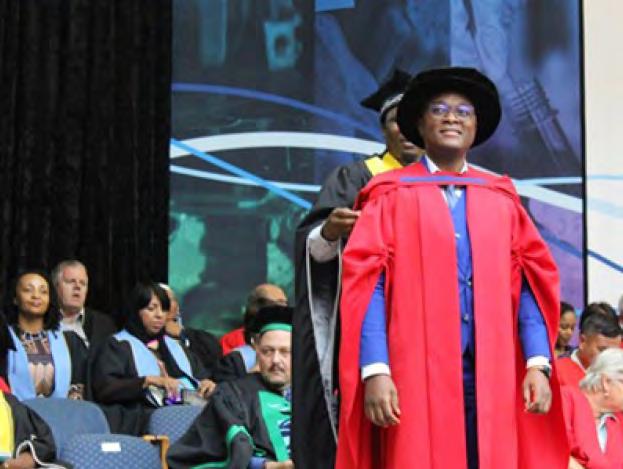
For Dr Mhlanga, the chance to lead and shape the future of CTHS, equip students with academic knowledge, prepare them for the evolving job market, and build robust partnerships with the community and industry, is both humbling and empowering. His role is to serve as a visionary leader, guiding both academic and financial aspects, and steering CTHS toward achieving its strategic and operational goals in line with FBMS’s objectives. “Central to my vision are three pivotal areas: the enhancement of postgraduate student supervision, curriculum development and review to produce future fit graduates who are employable, adaptable and entrepreneurial, and the creation of an environment that champions quality learning and teaching and research.”
Faculty of Business & Management Sciences
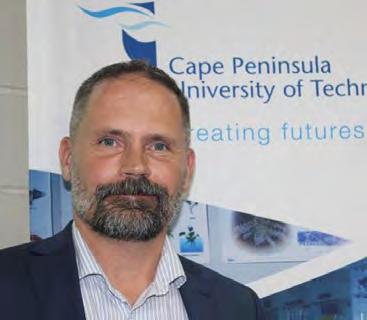
In November, FBMS hosted a guest lecture by Swedish academic and researcher Prof Jens Hultman titled ‘Building sustainable retail in a technology-driven environment’. Prof Hultman is a Professor of Marketing at Kristianstad University, and has over 20 years of experience in research and teaching in retailing and marketing. He is part of the leadership team of the research platform called FOHRK (Food, Health, and Retail at Kristianstad University) and is also involved in various research projects on food retail marketing and format development in the retail sector.
Guests were welcomed by HOD: Retail Business Management Prof Victor Virimai Mugobo, who said the guest lecture would be part of an annual series, and that this was the first guest lecture the faculty has had from Kristianstad University. Prof Hultman said that the competitiveness of a retailer is heavily associated with sourcing. “Where they buy, what they buy, and how they buy will of course influence their sustainability.” Retailers also have a major influence on the decisions consumers make. “If they can influence what and how we consume, they also can function as a transformative power in our society, for example, nudge consumers to buy less of something or more of something else.”
Prof Hultman explained that new technology and digitalisation have created the need for multichannel capacity in retail, and that the physical store is not a necessary component in retail anymore. “Pretty much every one of us carries around a mobile phone. In the new shopping environment, the way that we shop is hugely different now compared to 15 years ago.”
The day concluded with a question-and-answer session. In addition to the guest lecture, Prof Hultman also presented a workshop for postgraduate students and staff titled ‘Navigating postgraduate research’.

Two students and one staff member from FBMS made their way to Germany for an exchange programme opportunity this year. The two third-year students are Ms Sinazo Bonga and Mr Likhona Lukholo Mtiya, and they were joined by Mr Wayne Jooste, lecturer in the Department of Retail Business Management. Retail Chair Coordinator, Ms Fezeka Twalo, said the group went to DHBW Ravensburg University through a strategic partnership formed between Sol Plaatje University (SPU) and CPUT. SPU student Ms Nonhlanhla Dlamini, and a lecturer, Mr Isaac Patsa, were both given the opportunity to form part of the 2023 Germany Exchange Programme. The students spent three months in Germany and the lecturers two weeks.
Ms Bonga said she was elated “to be specially chosen from other qualifying applicants as the best student to take part in this life-changing exchange programme in Germany at the prestigious DHBW Ravensburg University. I am very grateful to CPUT and W&RSETA for this opportunity.”
Mr Mtiya, who comes from King William’s Town (now Qonce), said his journey had been marked by personal growth and development and the thought of international travels was overwhelming to take in. “My sincere gratitude goes to CPUT, the Retail Chair and W&RSETA for turning one of my long-term dreams into a reality. I believe this genuinely proves their commitment to the growth and development of individuals like myself – an aspiring, motivated, hard-working African man who comes from an underprivileged background. To my parents, thank you for your many sacrifices for us and I promise to make my family proud.”
Mr Jooste, who is also a CPUT alumnus, interviewed before the trip, said he was excited to have been selected for the exchange. “I am keen to learn more about their local retail landscape and how it differs from ours. I am privileged to have this opportunity and I wish to thank CPUT, the W&RSETA and DHBW Ravensburg for making this all possible.”
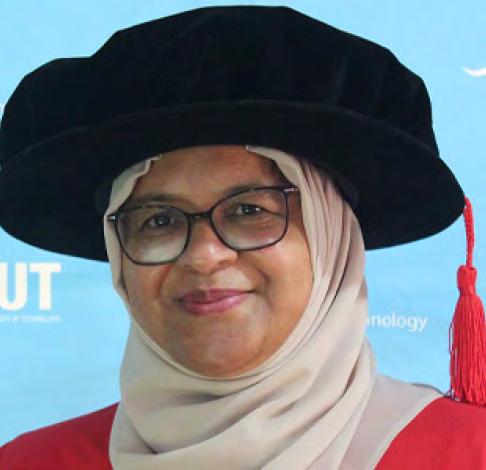
She experienced devastating loss and grief on her road to graduation, but quitting was never an option for doctoral graduate Dr Faeda Mohsam. Dr Mohsam, an FBMS lecturer, who suffered two bereavements during her academic journey, necessitating a break in her studies. First, she lost her father in 2018. Then, in 2021, she lost her beloved daughter during the Covid-19 pandemic.
In December, she was awarded a DTech in Informatics during the Summer Graduation ceremony and was one of two FID doctoral graduates. She is grateful that she was able to complete the journey. “It has taken me some time, and there have been numerous challenges, but I persisted. Quitting was never an option. In the words of our beloved Madiba, ‘Do not judge me by my success, judge me by how many times I fell and got back up again’,” she said.
Balancing the demands of doctoral study with work was no easy feat. “Full-time lecturing responsibilities and my personal life were challenging and made maintaining a work-life balance difficult.” Dr Mohsam said peer support played a pivotal role during her studies, and she believes this contributed greatly to the successful completion of her degree as well as to her overall well-being. “Peers understand the challenges, setbacks and triumphs that come with doctoral studies and I had the honour of receiving peer assistance from two amazing ladies I now consider my ‘research sisters’.”
Dr Mohsam joined CPUT in 2004 in an administrative capacity, and went on to take up an academic role 2009. She also holds a BTech in Office Management & Technology and an MTech in Business Information Systems from CPUT. Her research title is ‘The level of alignment between the use of implemented Health Information Technologies and the clinical work activities of nurses in the public hospitals of Cape Town’.
She expressed her deep appreciation to her supervisor, Prof Retha de la Harpe. “Thank you for being a source of inspiration, sharing your knowledge so generously, and fostering an environment that promotes learning and intellectual curiosity.” Prof De la Harpe said supervising Dr Mohsam had been a pleasure because of her excellent work ethic. “During her studies, she had to deal with some serious family crises and suffered the biggest loss during the pandemic. Although she was devastated, it never derailed her, and know that achieving her doctorate is not only for her but for all who are dear to her.”
FBMS’s Department of Applied Legal Studies hosted a delegation from Hochschule München University of Applied Sciences (MUAS) for a three-day event in March. This featured cultural exchange sessions, engagements in breakaway groups, and plenary sessions where groups presented their work. The initiative stemmed from discussions last year between Prof Henrike Weiden from the Department of Applied Legal Studies at MUAS and Prof Noleen Leach from the Department of Applied Legal Studies at CPUT.
The collaboration between MUAS and CPUT students initially took place online and culminated in a three-day face-to-face interaction at the Bellville Campus, guided by Prof Weiden and Prof Leach. During this time, students from the two institutions had the opportunity to collaborate in person, comparing notes on legal issues in data-driven business models. Open coaching sessions were also held to prepare students for joint presentations in a plenary session on the final day.
Both South African and German student teams gained valuable experience in collaborating on the transfer of business activities across the continents. They researched various legal questions related to data-driven business relevant to their team projects, and developed legally feasible solutions for the transfer of identified business models. Prof Weiden expressed her thanks, stating she was extraordinarily grateful for the efforts of Prof Leach, the faculty and CPUT members. She noted that everyone went the extra mile to make the student project a success and to provide a memorable experience in Cape Town. “Everyone made us feel they believed in this cross-continental university project,” she said.

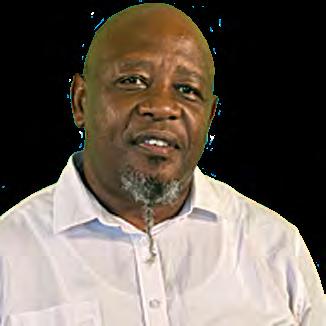
PROF ANDILE MJI
Introduction
During 2023, the Faculty of Education was involved in several collaborative research projects with national and international funding. We enjoyed partnerships with institutions in Japan, Belgium, Sweden, Finland, the USA and Ireland. The faculty is involved in research projects that focus on science, technology, engineering, arts and mathematics (STEAM) education; vocational and adult education; communities of practice within service-learning; work-integrated learning; language and literacy; leadership and gender awareness; cultural–historical complexities in education community engagement; curriculum; teaching and learning issues; impact of pandemics on teaching and learning; as well as technological and e-learning methodologies in education. Staff were also involved in research supported by the provincial and national Departments
of Basic Education (DBE) and the DHET, and with other local universities, with funding from CPUT and the NRF.
A number of researchers in the faculty were awarded funding for various projects this year:
• Prof Zayd Waghid was awarded R300 000 NRF Young Researchers funding for the project ‘Examining remote teaching and learning in universities in response to a higher education crisis’
• Prof Janet Condy was awarded R230 000 NRF–CPRR funding for the ‘Reading for Meaning’ research project
• Dr Naseema Shaik was awarded R119 500 Thuthuka funding for the project ‘Strengthening a transformative pedagogy through developing a children’s participatory rights framework in early childhood care and education’
• Prof Agnes Chigona was awarded R349 000 for year two of the of the R1.2 million NRF project ‘Equipping pre-service teacher with digital pedagogies for the most marginalised 21st century learner’. This project is contributing to the closing of the gap identified in her previous research work which showed pre-service teachers are not adequately prepared to teach with and through mobile technologies available to the learners in rural and less affluent communities. Effective digital pedagogies would enable teaching and learning to continue even when school-based, face-to-face curriculum delivery may not be possible due to lockdowns.
This year, Dr Naseema Shaik was successful in securing an REP grant to visit Prof Laura Lundy from Queens University, Belfast. Prof Lundy is co-director of the Centre for Children’s Rights, and she is also responsible for the conceptualisation of the Lundy Model of Child Participation, which Dr Shaik taught her final year BEd students.
During the visit, Dr Shaik presented a paper at the Children’s Rights, Participation and Education Symposium, held in September. This research exchange also resulted in her securing research collaborations with Prof Lundy.
Another international collaboration is with the University of Gent and UWC. This multiuniversity partnership is funded by the Global Minds Fund (University of Ghent and the Flemish Inter-university Council) and investigates ‘Decolonial communication in HEI: Exploring new frameworks’. CPUT is the Global South Partner 2. Team members from the faculty include Prof Candice Livingston (CPUT leader), Prof Hanlie Dippenaar, Dr Nonzolo Titi, Ms Sibongile Xamlashe, Ms Shamiega Chaudhari and Mr Clive Brown. Prof Livingston visited Belgium in October as part of the planning phase of the project. This project aims to create a decolonial negotiation programme for guiding curriculum and pedagogical policy and practice in HE. The methodological design follows a cyclical approach, with each phase contributing to knowledge construction and hands-on deliverables, subject to content and construct validation. The four cyclical components involve a needs analysis, curriculum transformation, pedagogy of decoloniality, and policy-level discussions, with the key deliverables to include research output and hands-on tools for wider implementation. The project, situated in South African and Flemish HEIs, targets teacher educators and student teachers.
In 2023, the faculty cemented a South Africa–Japan Joint Research Collaboration Programme with researchers from Hiroshima University. This is a bilateral initiative aimed at fostering scientific and technological cooperation between the two countries. The R1.8 million project is funded by the NRF and the Japanese Society for the Promotion of Science, and the tile is ‘Equipping teachers with technological pedagogical content knowledge: A comparative study between South Africa and Japan’. Prof Chigona is the principal investigator (PI) on the South African side, while Prof Takayoshi Maki is the PI on the Japanese side.
The South African team of three researchers (Prof Chigona, Dr Nyarai Tunjera and Dr Osman Sadeck) from our faculty visited Japan in November, where they learnt a lot about technology integration and STEAM education. The Japanese team of four academics is due to visit South Africa during March next year. While in Cape Town, they will meet Mowbray and Wellington executive staff. During this time, Prof Maki will give a lecture to the faculty on ‘Design and practice of STEAM education in Japan’. We hope many staff will attend to learn more about the STEAM curriculum.
Please note that more information about this faculty’s 2023 research activities can be found in the Focus Areas section of this Research Report
Human, Health & Social Dynamics
Research Chairs:
Teacher Education and Global Institute for Teacher Education and Society (GITES) (NRF SARChI Chair)
204
The number of NRF-rated researchers in the faculty continues to grow. We have both young and established researchers as follows:
Prof Pieter H Boer
Prof Zaid Waghid
Prof Luiza da Sousa
Prof Candice Livingston
Prof Zilungile C Sosibo
Prof Janet L Condy
Prof Agnes Chigona
This year, the faculty hosted two adjunct professors who co-supervised doctoral and master’s students, mentored and co-authored articles with staff, presented research and writing workshops, and facilitated local and international research collaboration and exchange. Adjunct Prof Janet Condy and her postdoctoral fellow were the leaders of the Sisonke Supervision Mentorship Programme, which benefited all faculties at CPUT. Our faculty had sixteen mentees on the programme, thus facilitating the growth of our supervision capacity.
In May, we hosted a visiting professor from Old Dominion University, USA. Prof Helen Crompton facilitated seminars and workshops for academic
staff and postgraduate students. The visit was in line with the faculty’s internationalisation focus, aimed at encouraging staff to work collaboratively with international researchers. Prof Crompton is an international collaborator on the 21st Century NRFfunded projects housed in the faculty. Collaboratively, Prof Chigona the Principal Investigator on the project, and Prof Crompton edited an international book titled Global Perspectives on Teaching with Technology: Theories, Case Studies, and Integration Strategies. The book is being published by Routledge and will be released in June 2024. This book attracted authors from 11 countries from across all continents.
In October 2023, Prof Pieter Boer and Dr George Joubert hosted Prof Roel de Ridder from Ghent, Belgium using the REP grant.
This year, the Faculty of Education again hosted a Tier 1 SARChI research chair. The SARChI research unit Centre for Initial Teacher Education (CITE) is funded by the NRF. The impact of the work of the research chair lies in only enlarging the discipline’s body of knowledge of education theory and practice, as well as in drawing together students and researchers in the discipline to work in collaboration with stakeholders across the education landscape, nationally and internationally, including national and provincial education departments, unions, the South African Council for Educators, universities, NGOs, schools and teachers. During 2023, the centre also hosted Prof Amy Stambach from the University of Wisconsin-Madison. During 2022 and 2023, the
A-rated Prof Crain Soudien worked closely with the centre and its research projects. Further, CITE remains committed to supervising and building the capacity of its enrolled students. Monthly seminars remain key to building capacity and development. Students have been involved in various research projects, presentations and discussions at seminars and conferences. In addition to this, the centre and chair work closely with the British Council and their consultants in the development and implementation of the ‘Teaching for All’ material and course work. The course is now available on the Western Cape Education Department website for all teachers at no cost, and includes accredited CPD points.
One of our staff members graduated with her doctoral degree this year. We congratulate Dr Tanja KotzéCoetzer on her achievement.
In addition, 23 students graduated from the faculty’s master’s and doctoral programmes. Of these, 14 were awarded master’s degrees and 9 were awarded doctoral qualifications. This is the first time the faculty has graduated such a large number of doctoral students, and as such we are very proud.
Mr Imre Istvan Andras, Ms Vivian Edirin Eboigbe, Mr Ali Lwanga, Mr Wandile Mangcengeza, Mr Cavin Benedict McPherson, Mr Mfundo Nyunguza, Mr Zainoedien Petersen, Mr Rachmat Petersen, Ms Eltena Rethman, Ms Elaine Steyn, Mr Tlholohelo Tsotetsi, Mr Marinus Daniel van Wyk, Mr Rushaad White
Doctor of Education:
Dr Desiree Christian, Dr James Daniels, Dr Tanja KotzéCoetzer, Dr Maryna de Lange, Dr Caroline Magunje, Dr Joyce Rainhuis, Dr Wendy Smit, Dr Kabeya Tshimanika
An expression of appreciation
The faculty wishes to acknowledge and express its appreciation towards the following CPUT units for supporting its continued growth:
• DVC: Research, Technology Innovation & Partnerships
• Directorate Research Development
• Strategic Initiatives & Partnerships
• Technology Transfer & Industrial Linkages
Postgraduate degrees obtained by staff
Doctor of Education
CPUT
Kotzé-Coetzer T
‘Teaching and learning strategies to enhance IsiXhosaspeaking learners’ mathematical understanding in English Grade One classrooms’
Faculty of Education
There was an exciting start to the academic year in January as CPUT demonstrated to HEIs, both local and international, what it means to present a high-level Education Association of South Africa (EASA) Conference. Never before had it been necessary to cancel an EASA Conference due to a worldwide pandemic, but this was the unfortunate situation with the event in 2021/2022. The conference’s theme was ‘Oceans of wisdom, mountains of knowledge and the winds of change’, and it was held at the Century City Hotel. EASA is an inclusive network of academics, researchers, and practitioners whose primary concerns are education, particularly in South Africa.
The local organising committee chairperson, Prof Candice Livingston, welcomed delegates from all over the world to the Cape of Good Hope. Prof Livingston said, “We gather to share findings and prospects and savour the educational world like the salt from the sea. It is our wish that delegates will return to their institutions after the conclusion of this conference, enriched and refreshed and that the experience opened horizons of hope and confidence, so that we can sail ahead and not be engulfed by storms of despair.” Dean of the Education Faculty, Prof Andile Mji said, “It is an absolute joy to be hosting this crucial academic event.” The local organising committee declared that due to the very trying nature of the past three years, it was an absolute pleasure to be hosting the conference this year.
The outgoing chairperson of EASA 2022, Prof Funke Omidire said, “We look forward to the keynote addresses of Prof Thuli Madonsela and Prof Mbulungeni Madiba, and the presentations of Prof Irma Eloff and Prof Piet van Avermaet. Furthermore, I want to seize this opportunity to show appreciation to our hosts CPUT, the Two Oceans Graduate Institute, the Flemish Interuniversity Council, the organising committee, the conference administrators, and the EASA executive committee. We look forward to a memorable conference.”
The presentations by the keynote speakers were:
- Prof Thulisile Madonsela, ‘Social justice, fragility and education’
- Prof Mbulungeni Madiba, ‘Multilingualism, social justice, and inclusion in South African higher education’
- Prof Irma Eloff, ‘Vignettes of sustainability: The role of teacher educators in supporting Agenda 2030’
- Prof Piet van Avermaet, ‘Diversity, excellence and equity in education: A historically pressured symbiotic relationship’
Prof Livingston added, “Last, but definitely not least, the EASA executive members, local organising committee and all stakeholders involved in the setting-up of the conference would like to thank the star of the show, Mr Clive Brown, our Master of Ceremonies and programme director. His energy and professionalism are a pleasure to behold.”

Established researcher and award-winning teacher, Prof Candice Livingston, was “in total disbelief” when she was awarded a C3 rating by the NRF. Prof Livingston, who first joined the Education Faculty in 2012 as a part-time lecturer in the English Department, has always had a passion for reading and writing and has a special interest in storytelling, autobiographical learning and fairy tales (as part of teaching children’s literature). “I was that child whose punishment for naughtiness was to have my books taken from me. I was that child who hid in the library at break so that I could read. My dad was also a book hoarder, so I was exposed to many genres from a very young age. I was lucky enough to have had the most fantastic English teacher in Matric, and she nurtured my love for literature.”

Prof Livingston studied at NWU where she completed her BA and an HDip Ed, followed by a BA (Honours) in English Literature. After her studies, she taught for a few years in the UK and South Africa. She then decided to focus on becoming an education specialist and completed her Bed (Honours), her Master’s in Education and finally, her PhD. She is the faculty research coordinator on the Wellington Campus. She also coordinates the postgraduate and honours programmes and is the faculty language coordinator. Her career highlights have included being appointed to the English National Language Body (PanSaLB). “This is a once-in-a-lifetime opportunity and to sit on a committee that really has a say in language issues in our country, is a privilege. Another highlight has been my service to the Council of the English Academy of Southern Africa. Regarding my time at CPUT, a highlight was receiving the Institutional Teaching Excellence Award in 2021.”
NRF ratings are allocated based on a researcher’s recent research outputs and their impact as perceived by international peer reviewers. The rating of individuals is primarily based on the quality and impact of their research outputs over the past eight years, considering evaluations by both local and international peers. It identifies researchers who are leaders in their fields of expertise and recognises those who consistently produce high-quality research outputs.
The Faculty of Education’s Prof Zayd Waghid has been selected for the prestigious Fulbright Visiting Scholarship for the 2023/24 academic year. Prof Waghid’s host institution will be Cornell University in New York, which is ranked as one of the top universities globally. He said, “It’s something that I have worked hard towards achieving, from writing a comprehensive project application to being interviewed, and then finally being selected, based on the decision of the Fulbright Committee in Washington. It’s such a competitive programme for which only 900 scholars from around the globe are selected.”
Distinguished Professor N’Dri Thérèse Assié-Lumumba will host Prof Waghid in the Africana Studies and Research Centre from March 2024 to September 2024. Elaborating on the focus of his research, Prof Waghid said that there is a dearth of academic programmes in South Africa that offer Global Citizenship Education (GCE) as a comprehensive curriculum in the humanities and social sciences. In the Faculty of Education at several UoTs, GCE is largely absent from existing curricula.
Prof Waghid continued, “Most UoTs appear to focus more on subject-specific disciplines with little emphasis on interdisciplinarity. While students in the Faculty of Education are trained in their respective disciplines, there is a lack of adequate skills, knowledge and values… This has significant implications concerning the school learners that are taught in schools, the schools remaining significantly localised and adequate integration in a global environment.” He said this was in contrast to what is happening at several universities in the US where GCE is offered as an integrated course in a structured programme that is very much aligned with achieving the SDGs.
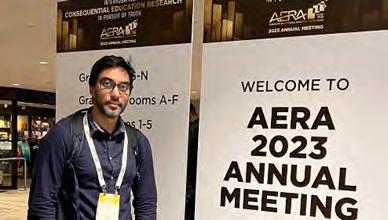
“Research concerning GCE is at a far more developed phase than what is currently happening in SA. Cornell’s relationship with the communities and other universities makes it an appropriate host in further exploring the structured SL and WIL programmes I believe would be beneficial to developing the GCE curriculum in South Africa,” Prof Waghid concluded.
The annual Teaching Practice (TP) Symposium, under the umbrella of WIL within the Faculty of Education, was held online in November. This event assembled the voices of diverse stakeholders within the education field under the theme
‘A relook at the qualities and competencies of professional teachers’. The symposium looks at final-year student teachers who are awaiting their turn to venture into the world of work. Mr Clive Brown, Intermediate Phase Teaching Practice Coordinator, said the faculty is the largest provider of teacher educators within the Western Cape, and this comes with huge responsibility. “A few of the daily challenges emanating from schools are a lack of educational resources, learner overcrowding, and immense learner behavioural issues, coupled with low teacher morale and mammoth administrative-related duties.”

The TP Symposium organisers for 2023 was led by Mr Brown along with Dr Belinda Cornelissen, Mr Ruben Daniels and Dr Alettie van den Heever. They chose participants who could expand on pertinent matters in the real-world classroom. “Hence, a robust dialogical engagement concerning the execution of the vital role of teacher professionals in the holistic development of each learner assigned to them when they commence their formal employment was orchestrated,” said Mr Brown. Undergraduate student teachers, academics, beginner and seasoned teachers, official structures within the WCED, and the teacher unions gathered to enlighten student teachers about the way forward in their careers.
The success of the TP Symposium was achieved through robust, respectful engagement. “Moving forward, the aim is to shift to a dual symposium, which with extensive planning, will hopefully bring together members face-to-face and online”. In closing, Mr Brown, added, “Our Faculty of Education here at CPUT is committed to producing professional teachers for the world of work who are highly competent, skilled and sought after within their field.”

Faculty of Education WIL Committee met in September for a Collaborative Reflective Work-Integrated Learning Seminar. Here they explored the current Teaching Practice (TP) Model utilised within the faculty’s TP Programme. WIL/TP is the process of uniting theory with practice within the place of work. Mr Clive Brown, Intermediate Phase Teaching Practice Coordinator at Mowbray Campus, believes that the on-site development of student teachers into professional educators is the most exciting aspect of their initial teacher education programme. “To be afforded the opportunity to act in the role of a student teacher during Teaching Practice placements is often filled with a complexity of emotions ranging from emotional distress and anxiousness to awe, happiness, and career satisfaction,” said Mr Brown.
He added, “The reality of teaching in the South African context is transforming rapidly for newly qualified teachers venturing into the world of work… the beginner or novice teacher should be readily prepared for the diverse typologies of schools in the South African context.” Mr Brown continued, “CPUT’s Faculty of Education, the largest provider of teacher educators within the Western Cape, acknowledges that we cannot ignore the realities of numerous schools where student teachers experience their practical learning. The truth is that many South African schools are plagued by myriads of challenges, which has been exponentially detailed in the book of Prof Jonathan Jansen and Ms Molly Blank titled How to Fix South Africa’s Schools: Lessons from Schools that Work.”
WIL Coordinator, Dr Zena Scholtz said, “As a WIL Committee, we will continue to have robust dialogical engagements about the quality of teachers emanating from our faculty.” Mr Brown added, “I am a proud product of CPUT. In 2003, fresh out of high school, I had hard-working lecturers moulding and shaping my thinking when entered the ITE programme. Today, I am proud to work amongst many exceptional staff members.”
Prize-winning author, Prof Brenda Flanagan, said it was “an extraordinary delight” to complete her Fulbright Specialist term at CPUT. Prof Flanagan, a full professor in the Department of English at Davidson College in North Carolina, visited the Education Faculty in October as a Fulbright English Specialist. Prof Hanlie Dippenaar, Assistant Dean at the faculty, said the focus of the visit was to discuss the teaching of literature in the English courses which are part of the BEd undergraduate programmes. “This was an opportunity to share ideas and to benchmark the curriculum internationally. During her visit, Prof Flanagan presented several classes to undergraduate students on the Wellington and Mowbray campuses on relevant literature, addressing the agenda of political awareness and decolonisation. She accompanied colleagues in the Department of English to SL projects where students were tutoring at a correctional facility and a children’s home, and she gave valuable advice and insights.
Prof Flanagan was the keynote speaker at the Literacy Day hosted by Ms Joanne Arendse, Wellington Campus’ Librarian, and her team at a local school in Wellington. During the last few days of her stay in SA, she joined CPUT colleagues and MEd students at the LITASA Conference in Port Elizabeth where she shared her ideas and joined colleagues across the country participating in discussions on literacy. Students and staff alike were in awe at Prof Flanagan’s energy and insight into the South African context and inherent challenges, especially regarding the teaching of English, which is often described as the language of the coloniser.

Prof Flanagan said the students were engaging and the professors, including Prof Sandra Swanepoel of the Mathematics Department, were ones she would like to have as “forever colleagues”. She continued, “I learned valuable lessons from the vital work of Prof Cisca De Kock, Prof Valencia Theys and Prof Lizette De Jager, and their conduct in and outside their classrooms; and thanks to Ms Joanne Arendse, I was able to visit a primary school to learn about the library’s activities and buy the most comfortable shoes I’ve ever worn. Ms Nomalizo Mapasa provided warmth each cold day I came to campus. Of course, none of this would have been possible without Prof Dippenaar, who initiated the Fulbright proposal, provided great Indian food, and took me to Port Elizabeth. I wish all the students and faculty at CPUT and Mowbray every success and offer my gratitude for an unforgettable experience.”
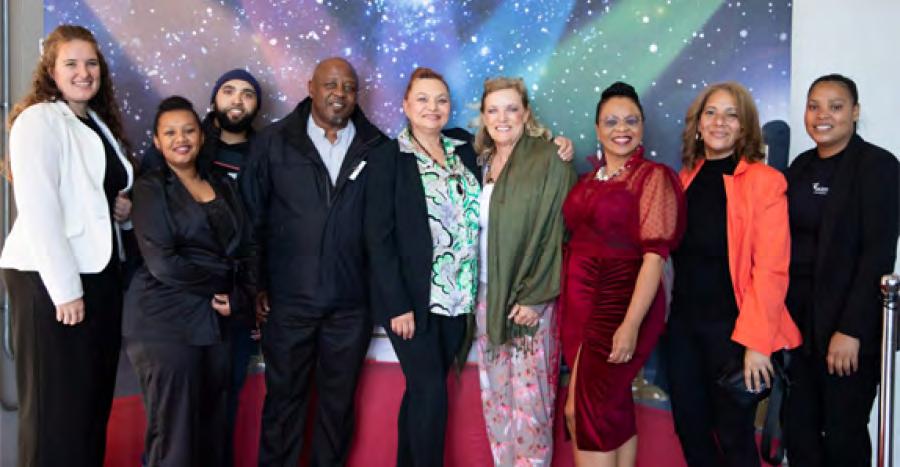
The CE and SL Units and CCEWIL joined with the Faculty of Education to celebrate and host World Teacher’s Day at the Bellville Campus in October. Faculty of Education project convener Dr Dorothy Esau and ECP lecturer Mr Henry Esau were the programme directors. Dean Prof Andile Mji stated, “We are teachers, we are the developers of the world.” The faculty was invited by ENCA for a debate on GBV in schools. Ms Jacqui Scheepers, Manager: SLCE, stressed the importance of integrating sport, arts, culture and recreation in the education of young learners. “The inclusion of these activities in the programme was testimony to the project
team’s commitment to the development of the whole person,” said Ms Scheepers. Arts and cultural entertainment were provided by Ms Nuska George who performed a dance from a classical ballet and Mr Freddie Arendse who offered musical items. A former learner from Dr Esau’s teaching years, Mr Kyle Wyngaard from Heart 104.9, was the house DJ who supplied the sound and continuity music.
Principal at Duneside Primary and founder of the Western Cape Teacher’s Forum, Mr Lee Hoffman said, “Let’s heal the world through education. World Teacher’s Day is a day to recognise and
honour the valuable contribution that teachers make.” To the future teachers, Mr Hoffman said, “You are valuable and worthy and recognise the power of human connection. Every child deserves a champion – someone who never gives up on them. Leaders measure themselves against the best”. All teachers can do is “try and do better than the day before,” continued Mr Hoffman. Ms Celine Solomons, a teacher at Cedar High School a member of Edufocus Projects (with a vision to inspire, ignite and impact) shared and appreciated the immense support provided by the programmes. She said that the Women in Education Civic Engagement project aimed to be interdisciplinary and interfaculty. EMS student and leadership academy ambassador Ms Nompumelelo Ntuli thanked the SLCE Units for giving her this opportunity to be part of the leadership academy.
Certificates were issued to all participants and the event ended with special trophies from EduFocus projects being awarded to Prof Rouaan Maarman from UWC and Mr Ronald Engelbrecht from the WCED, Metro South. Mr Baartman, a retired teacher, was honoured with a lifetime achievement award for his contribution to education. Ms Theresa Burns handed over SL awards to Ms Shanique Dempers for her support and to Ms Dealshaad Swart from Ceres Secondary School. Cedar High School, Mitchells Plain received an award for Most Valuable Contribution as a partner. An Edufocus award for Outstanding Leadership was presented to Dr Esau to acknowledge her efforts in creating Edufocus.
Mr David Haarhoff, CE project team member said, “Teachers play a critical role in the development of our future leaders. I believe that teachers should receive more recognition for their efforts within the teaching and learning sphere. I would like to commend Dr Esau and her team for their remarkable work and dedication toward the promotion of teaching and learning.”

This year, the Faculty of Engineering & the Built Environment (FEBE) focused on ensuring the relevance and excellence of its academic and research programmes by developing linkages with our four primary communities, namely, civil society, industry, government and academia. To this end, the faculty hosted its first Advisory Committee meeting for Research, Technology Innovation & Partnerships. The committee included members from government agencies, manufacturing industries, the space industry, the chemical industry, the water and energy sectors, international universities, international companies, and alumni involved in business and research start-ups.
The chairperson, Dr Jean van Laar, is a council member at the South African Institute of Industrial Engineering (SAIIE), with extraordinary lecturer appointments at both NWU and SU. Dr van Laar is currently the Programme Manager for the Integrated Postgraduate Industry Partnership (IPGIP). IPGIP adds value to the South African economy by fostering R&D
development through industry–academia partnerships, in line with the DST’s White Paper on Science, Technology and Innovation.
FEBE is committed to ensuring its research addresses the Sustainable Development Goals (SDGs). It recently hosted the first seminar in a series, chaired by Prof Veruscha Fester, titled ‘Innovative Solutions for SDGs 6, 7, 9, 11, 12’ (InnoSol1). During this seminar, staff were invited to demonstrate how their research is addressing the SDGs, particularly for sub-Saharan Africa and South Africa, or to pitch innovative ideas on how to do so. The event also provided an opportunity for CPUT staff to share their work and develop multidisciplinary projects. The plenary speaker, Mr Andre van der Walt, Chief Director for Sanitation Services Support from the Department of Water and Sanitation (DWS), presented an extensive list of challenges that need to be addressed for South Africa to meet the goals of SDG 6. This list will be distributed to various departments as potential topics for honours, masters and doctoral students.
Demonstrating our commitment, Prof Bongani Ncube, Chair in Governance & Economics for Water & Sanitation Sector Institutions, was invited by the DWS to join their panel for the SDG 6 mid-term review. A follow-up workshop will be held to showcase the outcomes of these projects. The next seminar, InnoSol2, will focus on a different SDG.
SARETEC, due to the demand, attracted R130 million to expand their facilities from the German Development Bank (KFW).
FEBE was awarded three Eskom Chairs for a period of five years to the value of R18 million. The project leaders are excited to provide solutions for the energy industry.
There are currently 12 NRF-rated researchers in the faculty. Dr Velaphi Msomi won the NRF Research Excellence Award for Early Career/Emerging Researchers. The faculty also hosted its first internal Research Awards event in style to celebrate and encourage research excellence.
The faculty graduated 50 master’s and 9 doctoral students at the April and December 2023 graduation ceremonies. Two staff members received their doctoral qualifications in Mechanical Engineering.
CPUT’s smart internationalisation strategy supports the principles of comprehensive internationalisation to develop a multi-cultural society that can better prepare students and staff for the future world of work. In line with this strategy, the faculty engaged with strategic partners to realise the envisaged outcomes. There are now a number of K7 Erasmus Mobility Grant MoUs that will enable mobility opportunities to receive as well as send out staff and students to international institutions. The faculty is also broadening its collaborative footprint in Africa, and visited Lumbubashi University in the DRC to find opportunities for research collaboration.
FEBE hosted its 2nd International Day in the Bellville Sports Hall to accommodate the participation of more staff and students. Prof Stephan Sauter from Duale Hochschule BadenWürttemberg Ravensburg in Germany delivered a keynote address and shared valuable insights into the role of internationalisation in the curriculum, and the importance of international students working together to solve problems utilising diverse perspectives. Two of our students joined the international team in Ravensburg in October.
We hosted three students from Dusseldorf University of Applied Sciences and one student from Ernst-Abbe-Hochschule Jena in Germany.
Our focus for the future is to strengthen our research entities, and capacitate more staff to become world-class researchers. This is in line with CPUT’s mission to transform its students into world-class researchers who inspire cuttingedge knowledge production and innovation.
Please note that more information about this faculty’s 2023 research activities can be found in the Focus Areas section of this Research Report
Bioeconomy
Research Group:
Bioresource Engineering Research Group (BioERG) 153
[Note: This research group is also involved with projects in FA 5]
Technology
FOCUS
During 2023, FEBE successfully hosted the following conferences and seminars:
• 3rd International Conference on Applied Research and Engineering (ICARAE 2023); this was the first time the conference was hosted physically since its inception during the Covid-pandemic in 2021
• Webinar on AI-assisted visual inspection systems for cultural heritage
• Seminar on Innovation Solutions for SDG 6, 7, 9, 11, 12 (InnoSol1_2023)
Five staff members obtained their doctoral degrees and three obtained their master’s degrees. Please see page 89 for details.
Postgraduate degrees obtained by staff
Doctor of Engineering: Chemical Engineering
CPUT
Dlangamandla C
‘Destabilisation and inactivation of foam and foamforming microorganisms in poultry slaughterhouse wastewater’
Doctor of Engineering: Chemical Engineering
CPUT
John J
‘An integrated pinch analysis framework for the development of a low carbon dioxide emissions industrial site planning which includes a fuel cell configuration’
Doctor of Engineering: Electrical Engineering
CPUT
Mataifa H
‘A novel optimisation method for voltage and reactive power control of electric power systems’
Doctor of Engineering: Mechanical Engineering
CPUT
Ayodele OL
‘Development of micro-nuclear generators for autonomous systems’
Doctor of Engineering: Mechanical Engineering
CPUT
Fawkes HT
‘Hub ratio of horizontal axis wind turbine rotors for optimal performance’
Master of Engineering: Mechanical Engineering
CPUT
Fose N
‘Application of IEC 61850-90-5 standard-based predictive dynamic stability system’
Master of Technology: Business Administration
CPUT
Kakaza L
‘The impact of using emerging technologies for direct purchasing of travel-related goods and services in an organisation in the Western Cape, South Africa’
Master of Technology: Cartography
CPUT
Thuse T
‘An assessment of UAV-generated digital elevation model using ground surveying techniques’
CPUT’s research standing continues to improve. Department of Electrical, Electronic & Computer Engineering Lecturer, Dr Ayodele Periola, was granted a Y2 rating by the NRF in July. A researcher in this group is 40 years or younger, has held a doctorate or equivalent qualification for under five years at the time of application, and is recognised as having the potential to establish themself as a researcher within five years after evaluation, based on their performance and productivity of quality research outputs during their doctoral studies and/ or early postdoctoral careers.
Dr Periola’s research interest is computing and communication systems, which focuses on the design of intelligent systems that incorporate communication networks. The intelligent systems designed in this regard are useful across a significant number of applications. Research in this area has a significant societal impact because of a focus on the design of solutions that enable future communication networks and their cross-cutting applications. These provide a platform for supporting future internet-enabled applications.
“The rating signifies that research efforts have significant benefits and can bring recognition, given the exercise of effort and perseverance. The rating will provide encouragement that there is light at the end of the tunnel. If there is no light, it is not the end of the tunnel,” said Dr Periola. He continued that he is humbled and happy about his recent milestone. “This is an honour and a privilege as I have been recognised to have research value potential.” He said the rating is a modest contribution to CPUT’s realisation of its research goals towards having more NRF-rated researchers.
For his career achievement, he acknowledged his siblings,

and brother Dr Gbenga Periola, Prof Isaac Adeyemi, his MSc supervisor Prof Ifiok Otung, his PhD supervisor Prof Olabisi Falowo, Prof Adeniyi Isafiade, Dr Olumide Ogunmodimu, Prof Opeyeolu Laseinde, Prof Michael Kolawole, and his postdoctoral hosts Dr Akintunde Alonge and Prof Kingsley Ogudo. Dr Periola also acknowledged and appreciated the support of his father and mother towards his education and expressed gratitude for the understanding and support of his wife.
Reflecting on his career journey, Dr Periola said, “This part is not easy because I still have a long journey ahead requiring stamina, strength and a massive daily dose of humility in every area. Hopefully, I will get to become a professor at some point in my academic career. This will be a huge privilege.”
Engineering Education lecturer and consultant Ms Ekaterina Rzyankina had the immense honour of representing South Africa and CPUT at the 8th BRICS Young Scientist Forum and the 6th BRICS Innovator Prize event in August. The theme of the event was ‘Building BRICS and Africa partnership for mutually accelerated growth, sustainable development, and inclusive multilateralism’, and it was held at the prestigious Boardwalk Hotel, Casino and Convention Centre, Gqeberha.
Ms Rzyankina specialises in research methodology and qualitative data analysis. During the event, she presented her ground-breaking research on ‘Digital literacy practices of reading engineering e-textbooks at a UoT’, which is part of her PhD study. “It was an exciting opportunity to showcase how technology and education can intertwine, shaping the future of learning and paving the way for innovation in engineering education,” Ms Rzyankina remarked. Ms Rzyankina extended heartfelt thanks to her mentors, VC Prof Chris Nhlapo, CPUT and UCT colleagues. She said, “(You) have been instrumental in guiding me throughout my academic journey. Without your unwavering encouragement and support, this achievement would not have been possible.”
Looking ahead, Ms Rzyankina is excited to further develop and implement her research findings to “revolutionise the landscape of engineering education, bridging the digital divide and empowering students with cutting-edge knowledge and skills”. She concluded, “Let’s keep working together to build a better, brighter, and more inclusive future for all.”

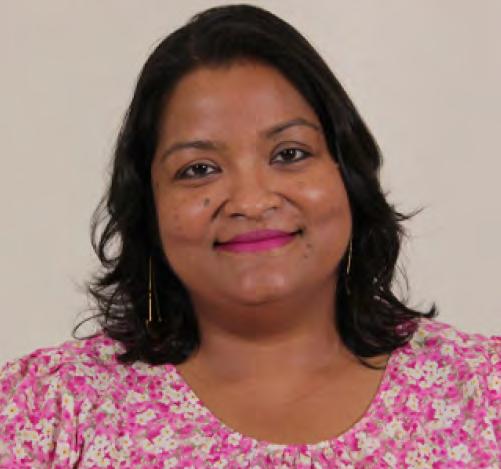
A senior lecturer in the Department of Clothing & Textile Technology, Dr Sweta Patnaik, is among the young researchers under 40 years who have received a Y2 rating from the NRF. This is in recognition by all reviewers as having the potential (demonstrated by research products) to establish herself as a researcher, with some of them indicating that she has the potential to become a future leader in her field. Dr Patnaik said the NRF rating system is a benchmarking system whereby individuals who exemplify the highest standards of research, as well as those demonstrating strong potential as researchers are identified by an extensive network of South African and international peer reviewers.
She believes the rating is a valuable tool for benchmarking the quality of her research against the best in the world. “For me, it will enhance career
prospects, increase opportunities for funding and collaboration, and provide a measure of credibility and prestige within the research community. Receiving a research rating signifies CPUT’s research productivity, quality and impact within the academic and scientific community.” She said the rating system encourages researchers to publish high-quality outputs in high-impact journals. Reflecting on her achievement, Dr Patnaik commented, “There is a sense of happiness and joy. It validates my hard work, dedication, and accomplishments. I am motivated and inspired to continue excelling in my work.”
Amongst Dr Patnaik’s job responsibilities are teaching and learning coordinator, curriculum officer and supervisor to her master’s and PhD students. She aspires to make her students proud of her. She commented that proper planning is the key to juggling between her busy academic schedule and family. “If asked of highlights, getting placed at a prominent brand like NIKE post my MBA, NRF Outstanding Doctoral Scholarship, being the first at CPUT to acquire the DAAD UNILEAD scholarship 2020, NMU Alumni Rising Star Award 2020 from my alma mater, the Institutional Teaching Excellence Award 2022, and the eLearning Excellence Award at the European Conference of eLearning 2022 all confirmed my passion and dedication towards my work.”
She continued, “All that I have achieved so far since I joined CPUT has been a communal effort. Be it my department, my students, or my colleagues, all have played a vital role in shaping me into the person that I am. They have constantly supported, motivated and at times been critics. Thank you.”
After having been awarded the NRF Research Excellence Award for Early Career/ Emerging Researchers, Mechanical & Mechatronic Engineering Department senior lecturer, Dr Velaphi Msomi, said the recognition is very important as it is an acknowledgement of the high quality of his work and encourages him to continue doing good work.
All universities in the country make submissions of their candidates to NRF. The submissions get evaluated by experts of panellists, and then the top researcher gets selected and awarded. “I feel very excited that my work could be number one against all other candidates from other universities. It was an honour to receive such an award and this boosts confidence in my work,” said Dr Msomi. “This means the department is recognised outside CPUT and is testimony that CPUT is doing quality research. This gives confidence to the students am supervising… My HOD Mr Simphiwe Nqabisa, the Dean Prof Suresh Ramsuroop, the Assistant Dean: Research Prof Veruscha Fester, and my wife Mrs Simphiwe Msomi, have contributed immensely to my achievements.”
Dr Msomi continued, “I have recently received the news from Applied Sciences congratulating a doctoral student of mine whose paper received the highest number of views since it was published. This news came right after had received the NRF Award and is again confirmation that I am doing a good job.” Despite his busy academic schedule, Dr Msomi has time for his family. “I do academic work during working hours and focus fully on my family after working hours.”

Faculty of Engineering & the Built Environment
FEBE hosted the inaugural Innovative Solutions (Innosol) 2023 Seminar in August. The aim was to raise awareness of the looming deadlines for the SDGs as well as the specific targets that must be met. Representatives from the Department of Water and Sanitation (DWS) were among the guests, as they are tasked with reporting on the progress towards achieving the targets. “So, in this case, we had external input on SDG 6 target 6.2. The event was also for them to provide the challenges that they face in meeting the targets. This provides an opportunity for our students to engage in relevant research,” said Prof Veruscha Fester, Assistant Dean: RTIP.
During the seminar, Mr Andre van der Walt, CD: Sanitation Services Support at DWS, provided a plenary address on possible contributions of the academic institutions towards achieving the sustainable development goal 6.2 target for

sanitation and hygiene. “Sanitation in South Africa is in a bad state… There is a projected 17% deficit in water demand and supply by 2030,” said Mr van der Walt. He continued, “Our water consumption per capita per day is above the world average. Water levels continue to decline. 53% of wastewater treatment works are in poor to critical state.”
Prof Fester said the seminar was “in line with Vision 2030 Goal 6 that states ‘Ensure the relevance and excellence of CPUTs academic and research programmes through the development of linkages in the quintuple helix environment’. She said this is an example of engagement with government entities. SARChI Research Chair in Governance & Economics for Water & Sanitation Sector Institutions and Acting Director: Centre for Water & Sanitation Research, Prof Bongani Ncube, delivered the keynote address on implementing SDG 6: ‘From community to policy level’. The purpose of Prof Ncube’s presentation was to showcase how we have implemented SDG 6 and other linked goals over the years.
Dr Sweta Patnaik, a lecturer in Clothing & Textile Technology, presented with Mr Shamil Isaacs, Manager: TSCT. They highlighted ‘technopreneurship’, which refers to technology meeting entrepreneurship. “If through the project we could prepare students to support themselves without depending on companies to place them, then it’s a success,” said Dr Patnaik. Prof Fester added, “We are excited about the list of nine major challenges that the DWS provided us that relates to SDG Target 6.2. Our task now is to promote these as opportunities for staff and students to provide solutions.”

FEBE bade a fond farewell to three exchange students from Hochschule Dusseldorf’s University of Applied Sciences (HSD) in March. The young visitors had spent six months at the faculty. The students from the German university shared their experiences about the student exchange programme at CPUT and life in South Africa, especially in Cape Town. Assistant Dean: RTIP, Prof Veruscha Fester, opened a question-andanswer session about the students’ exchange programme experience. The students responded positively, saying that they had always wanted to come to South Africa and experience the culture. Asked about choosing CPUT, the students said Düsseldorf has built a good relationship with several universities in Cape Town, but they selected CPUT due to the long-standing relationship between the two institutions. Commenting on differences between education in the two countries, they said CPUT allows students to work more independently which provides them the opportunity to grow.
The titles of the projects of the three students are:
-Ms Jil Labes, ‘Analysis for drone rescue’
-Mr Julian Hasemann, ‘Development of extruder for the recycling of 3D printing filaments’
-Mr JanLucas van der Veen, ‘3D printable structure for the CubeSat standard’
Prof Fester said in her closing remarks, “Receiving international students allows us to benefit from internationalisation at home, which allows interaction between local students and international students and faculty.” Prof Jörg Niemann, Ms Claudia Fussenecker and Mr Martin Schlösser from Hochschule Dusseldorf’s Life Cycle Excellence research unit at the Department of Mechanical and Process Engineering, together with Dr Monika Katz from the institution’s International Office, laid the foundation for this long-term and sustainable partnership that has seen several staff and student exchanges over the past seven years.
Representatives of the Department of Industrial & Systems Engineering visited Standard Profil to observe how graduates and WIL students are performing in the workplace. This visit also aimed to help lecturers understand which tools and techniques taught in class are applied in industry. Standard Profil enhances lives with their automotive sealing solutions, making mobility safe and comfortable. They produce door, window, boot, and other sealing systems for most automobile brands globally, from initial design to car assembly.
Department of Industrial & Systems Engineering lecturer, Dr Desiree Jaftha, said the visit fostered industry–academia collaboration.
Potential areas of partnership include the use of CPUT test laboratories that are relevant to industry requirements, and exploring research areas based on real problems in the industry. “The engagement was also an opportunity for lecturers to touch base with the real-world application of theory and benefitted the department in bridging the gap between theory and practise, for the creation of a more realistic learning environment to improve the quality of graduates from the department and university,” noted Dr Jaftha.
She continued that the lecturers were also given insight into possible career paths for the students, which helped them to better prepare them for the work environment. Mr Logan Govender, the
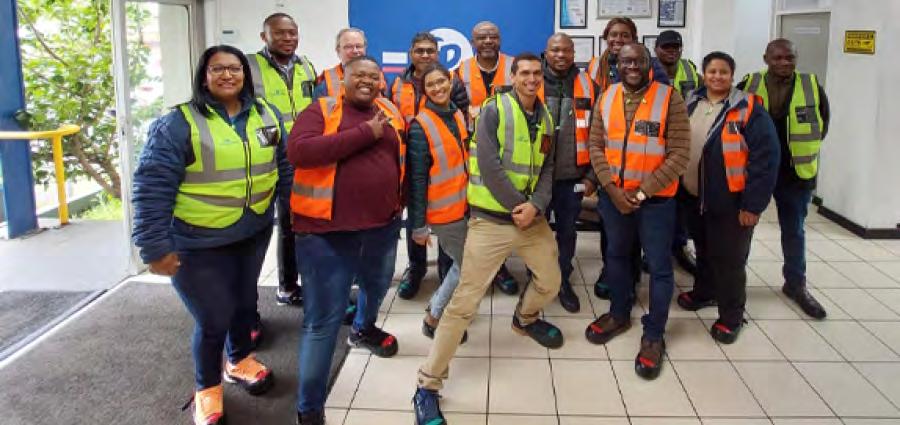
quality manager, commented, “Standard Profil would continue to provide CPUT with bursaries for earmarked staff and opportunities for our WIL students.” Dr Jaftha has a long-standing relationship with this company which has always been keen on providing CPUT students and graduates with placement and permanent work opportunities. “One of our Advanced Diploma: Quality graduates who is the quality manager at the company, invited us to come and do a walkabout and learn more about how they have implemented and are maintaining the industrial and quality systems knowledge acquired through our courses. This helps us to fine-tune our curriculum and teaching methods in a way to produce work-ready graduates who contribute to the growth of their current and future employers.”
The staff members were shown a video on safety induction. The employees – CPUT alumni – gave short presentations, and the students came to greet their lecturers. The staff members were then received by the quality manager who gave them an overview of the company and explained their quality management system operating processes. There were also recommendations to: Investigate the capacity of CPUT laboratories to perform the company’s required tests; Explore research areas from the company that can lead to projects or consultancy; and Invite industry practitioners for guest lectures for different subjects within our qualifications.
Individual lecturers would be able to incorporate case studies from the company from their observations when teaching. Dr Jaftha said the exposure was eye-opening, especially for the supply chain in automotive original equipment manufacturing and original design manufacturing. “There was positive feedback regarding our qualifications. It was impressive seeing the performance of former students and the value that they have brought to the company. The audio-visual presentations were top-notch, especially the safety protocol, which could be adopted for our Diploma: Industrial Engineering first-years.”
Senior maritime instructor and manager of the Survival Centre, Ms. Samantha Montes, has achieved a significant milestone by becoming the first female and the first person from the African continent to be appointed as Chairperson of the International Association for Safety and Survival Training (IASST). She assumed her role in September 2023. The IASST, founded in 1980, is committed to promoting effective maritime safety and survival training globally. It also forges and maintains links with government, industry, national and international organisations, and provides consultative and advisory services in safety and survival training.


Ms. Montes attended the IASST International Meeting and Conference, hosted by the Ceronav Training Centre in Romania, earlier this year in May. The seminar, themed ‘Using simulators and practical training basis to improve maritime safety training’, featured robust discussions and knowledge sharing among global colleagues. Ms Montes remarked, “My expectations were surpassed by the robust discussion during the members’ meeting and the safety seminar the following day. Knowledge sharing is vital in the field of safety and survival training. Best practices were discussed by colleagues who attend from across the globe, and there was also a chance to share what we practice in South Africa.” Ms Montes noted that the lecture about changes to the Global Maritime Distress and Safety System will be shared with lecturers to update their course materials.
Having managed the CPUT Erasmus+ Project (EURO-ZA Capacity Building in the field of Maritime Education), Ms Montes is ready for this new challenge. With over 20 years in the maritime field and service on several committees within the South African Maritime context, she is affectionately known as the ‘Maritime Oracle’ in her industry. “From the IASST being a mere certificate on the walls which I pass every day at work, to now heading up this association is quite a personal achievement. The greatest glory in living lies not in never falling but in rising every time we fall,” she said.
Ms Montes hopes to see more women in similar posts within their organisations and emphasises that safety has no gender discrimination. She aims to bring to South Africa her knowledge of how training providers in other countries have worked to mitigate their challenges. As she embarks on her new role as Chairperson of the IASST, she is filled with a blend of excitement and nervousness, deeply moved by the overwhelming support she has received from the maritime industry. Her mandate as chair is to promote the association internationally, be the spokesperson for IASST, and establish working groups to carry out specific tasks. Ms Montes teaches others that failure does not define who you are; rather, it is your response to failure that truly shapes your character.

Dr Sweta Patnaik, lecturer in the Department of Clothing & Textile Technology, received well deserved recognition for her teaching style and dedication when she won the Institutional Award at the distinguished Institutional Teaching Excellence Awards 2023. The ceremony was held at the Cape Town Hotel School on the Granger Bay Campus in April. DVC: RTIP, Dr David Phaho welcomed the guests and said, “This is a great privilege for us to be here again recognising excellence.” In his opening address, DVC: Teaching & Learning, Prof Rishidaw Balkaran said, “This whole event is a symbol of quality in various aspects.” CHEC officer, Prof Eugene Cloete, delivered a keynote address. The awards recognise learning and teaching support programmes and services that make an outstanding contribution to the quality of student learning and the student experience.
Among the recipients were Prof Sjirk Geerts, Ms Rache Hanekom, Dr Anthony Obilana, Dr Courtney Puckree-Padua, Mr Faraaz Omar, Mr Nizaam Peck, Dr Naseema Shaik, Dr Senthil Krishnamurthy, Prof Asis Patnaik, Dr Mohammed Pourbehi, Mr Mukove Ratshitanga, Dr Vipin Balyan, Ms Carike Abrahamse, Ms Judy Sheahan, Ms Rizqa Sibrietz-Williams, Mr Johan van Rooyen, Dr Liiza Gie, Dr Janice HemmonsbeyLodewyk, Prof Pieter Boer, Dr Ali- Mustafa Almaktoof, Dr Bruce Snaddon, Dr Blessing Makwambeni and Ms Alexandra Noble.
The biggest winner of the night, Dr Patnaik said, “I felt happy, recognised, praised and motivated… Hard work pays off.” She continued, “I still am over the moon since the awards ceremony.” Dr Patnaik attributed her academic achievement to a combination of skills, organisation, time management, prioritisation, concentration, flexible and open mindset to change, and motivation to achieve academic success. “Awards for me are not only recognitions but also validate the work I am doing, the path I am on, and they’re a motivating factor to keep excelling out of my comfort zone. They are a great way of gaining recognition and respect among my peers.”
Dr Patnaik holds an MBA in Fashion Management as well as a PhD in Textile Science. She is also a NRF Y2-rated researcher, a recipient of the NRF Innovation Doctoral Scholarship (2015), Nelson Mandela University Alumni Rising Star of the Year Award (2020), and the first recipient at CPUT for the DAAD UNILEAD Scholarship (2021).
FEBE celebrated its second Annual International Day in October, a day which broadens students’ and staff members’ horizons and affords opportunities for them to learn more about their contemporaries while forming a greater understanding of their place in the wider community. The event brought together students and staff from various backgrounds, showcasing the global community we have built. The day was marked by a cultural showcase and prize-giving for the best cultural performance and best dressed in cultural attire. Assistant Dean: T&L Prof Bingwen Yan emphasised the significance of embracing internationalisation in the academic community.
Prof Stephan Sauter from Duale Hochschule Baden-Württemberg Ravensburg, Germany delivered the keynote address. Prof Sauter shared valuable insights into the role of internationalisation in the
curriculum. His talk focused on the collaborative efforts of international student teams and their project ‘E-mule’. He also discussed the importance of international students working together to solve problems and the tremendous value that diverse perspectives bring. His vision for a more interconnected and inclusive educational experience captivated the audience.
“One of the day’s highlights was the cultural showcase, which celebrated the rich diversity within our institution,” said Prof Veruscha Fester, Assistant Dean: RTIP. Attendees were treated to vibrant displays of African and Asian cultures featuring traditional clothing, art and culinary delights. “This programme segment reminded everyone of the incredible mosaic of traditions that make up our global community,” said Prof Fester. She added that the event also recognised outstanding contributions
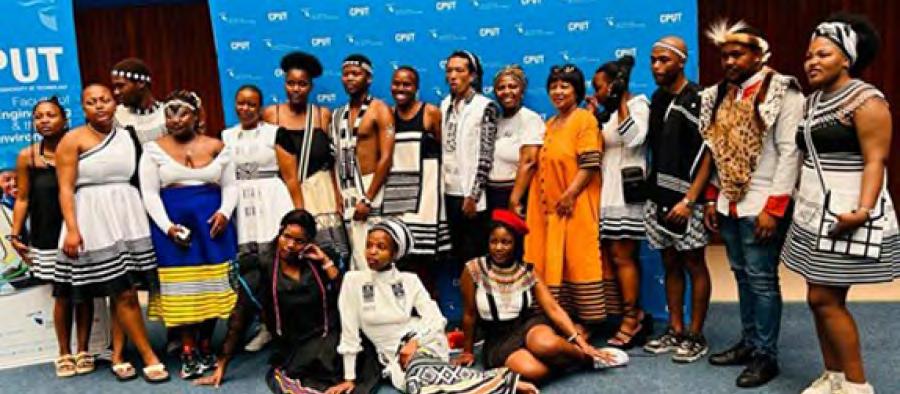
from our international community with awards for the Best Performance and Best Dressed. “These awards acknowledged the commitment and enthusiasm students and staff showed in making the event a success. The recipients of these awards demonstrated a passion for their cultures and a dedication to fostering understanding and unity among our diverse community.”
Prof Fester reiterated the importance of internationalisation at CPUT. She encouraged everyone to continue working together to promote cross-cultural understanding, collaboration and mutual respect. She reflected on her journey of constantly feeling anxious when told to wear ‘cultural attire’ because she does not have specific cultural wear to embrace all aspects of her heritage. Last year, she embraced her African roots, and this year, she embraced her Indian roots. She added, “The event was an overwhelming success, reflecting our institution’s commitment to fostering a globalised and inclusive environment. The event showcased our international community’s incredible talents, perspectives and traditions, and served as a reminder of the power of diversity in education and beyond.”
The event also received wholehearted support from Fundani’s Language Working Group. Prof Fester said that FEBE is grateful for this support and eagerly anticipates further collaboration in the coming year. “We look forward to continuing our efforts to promote internationalisation and celebrate the diverse tapestry of cultures that enrich our institution.”

Introduction
The Faculty of Health & Wellness Sciences (FHWS) specialises in many diverse fields related to overall health and wellbeing, and consists of several research entities, each one working towards improving the current health dynamic. The staff and postgraduate students produce significant research output, which represents CPUT and South Africa on the international stage.
FHWS’s postgraduates have increased in 2023, when compared to 2022. The faculty produced eleven master’s and two doctoral graduates, with 148 PG Dip graduates. One staff member, Dr Aladdin Speelman, was awarded his doctorate (Doctor of Radiography) this year. The increase in graduations is an indication of increased research activity within the faculty.
The postgraduate enrolment numbers for 2023 were 380, of which 261 were postgraduate diplomas, 98 master’s and 22 doctoral studies. The total number is just slightly lower than that for 2022. This can be traced back to a greater than usual number of graduations in 2021, which could not be followed by a proportional intake of new postgraduate students. This may also be linked to decreased applications and enrolments of postgraduate students since the Covid lockdown. It is encouraging to see the increased intake of postgraduate diploma students since the first intake into these programmes in 2022. The table below indicates our registered student numbers for postgraduate diplomas, master’s and doctoral degrees for 2023 for the various departments.
There are currently six NRF-rated scientists in the faculty:
Prof Tandi Matsha C1
Prof Karien Jooste C2
Prof Penelope Engel-Hills C2
Prof Peter Clarke-Farr C3
Prof Glenda Davison C3
Prof Oluwafemi Oguntibeju C3
Dr Shanel Raghubeer Y2
This year, members of FHWS from various fields of study have actively presented their work at both national and international conferences. However, these presentations typically do not evolve into formal conference proceedings, as this is a practice not commonly followed within most health disciplines.
The faculty takes pride in producing cuttingedge research output in the health sciences within South Africa. Our commitment to interdepartmental collaboration further enhances our research ethos. This year, we submitted 27.14
units of research output to the DHET, marking a significant improvement from the 19.73 units produced in 2022. Analysing the output profile over the past five years, it is evident that the faculty is on a consistent upward trajectory.
Ms Patricia Maishi successfully presented her research findings at the ISMRM Conference in Toronto, Canada in June. Following her presentation, a summary of her study was published on Antminnie.com, a prestigious website widely utilised by radiologists and radiographers all over the world.
https://www.auntminnie.com/index.aspx?
sec=ser&sub=def&pag=dis&ItemID=140317
In addition, her study was recognised by Antminnie.com as one of the 10 best papers presented at this conference.
https://www.auntminnie.com/index.aspx?
sec=eba&sub=eml&pag=dis&itemId=140383 &muid=11234413
Please note that more information about this faculty’s 2023 research activities can be found in the Focus Areas section of this Research Report
FOCUS AREA 1
Bio Economy & Biotechnology
Research Group:
FOCUS AREA 5 Human, Health & Social Dynamics
Research Chair:

Three FHWS academics, including the Acting Dean Dr Nicole Brooks, took part in a staff exchange with the Polytechnic Institute of Porto in July. Dr Brooks, along with Dr Lizel Hudson, Coordinator: WIL and Language and Ms Yanda Peter, an MITS GAP lecturer and PhD candidate, spent six days in Portugal, while Prof Sílvia Fernandes and Prof Mónica Vieira from the Porto polytechnic visited CPUT. The exchange presented an opportunity for strengthening collaboration, networking and professional development.
“The aim is to foster research collaboration with common projects housed in Biomedical Sciences, Medical Imaging and Therapeutic Sciences, and Ophthalmic Sciences. During their visit to the Bellville campus, Prof Fernandes and Prof Vieira were welcomed by Prof Marelize Le Roes-Hill and her colleagues at the Applied Microbial and Health Biotechnology Institute, where possible projects were also discussed,” said Dr Hudson.
The visit to the Polytechnic Institute of Porto coincided with that of Mr Lloyd Christopher, Acting Assistant Dean of the faculty, who attended the Business School as a postgraduate student finalising his PhD thesis.
Two academics in the Medical Imaging and Therapeutic Sciences (MITS) Department have been honoured with outstanding reviewer awards by the Journal of Medical Imaging and Radiation Sciences, namely Diagnostic Radiography lecturers Dr Kathleen Naidoo and Mr Gerhardus Koch.
Dr Naidoo, who joined MITS in 2019, said she has been a reviewer for two years and was honoured to receive the award.
“I have reviewed a large number of articles with a special focus on qualitative research in radiography as this is my research area of expertise. I am very excited to receive this award as the journal is highly recognised in international radiography research publications. This award is only given to four reviewers each year, so it is quite an honour to be acknowledged by the journal for my work.”
Mr Koch, who joined CPUT in 2021, received the award within his first year of working with the journal. “As a young academic, this award has motivated me to work even harder towards reaching my professional goals. It is an amazing feeling to be recognised for the work that you do and that from an international DHETaccredited journal. I am happy to have made a difference and to have contributed positively towards my profession.”
Dr Merlisa Kemp, HOD of MITS, said Dr Naidoo and Mr Koch have done
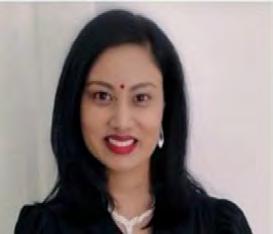
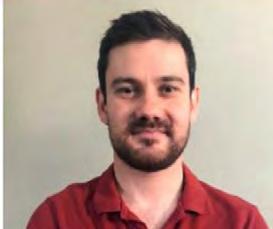
outstanding work. “I am immensely proud of the MITS staff who, despite the challenges faced during the Covid-19 pandemic from 2020 to 2022, still managed to produce approximately 30 research outputs, which include research articles and ebook chapters. The department also celebrates the achievement of Dr Aladdin Speelman, who was awarded his Doctorate in Radiography in December 2022.”
FHWS academics from the Department of Biomedical Sciences won two prizes at the Society of Medical Laboratory Technology of South Africa (SMLTSA) Congress held in November. The theme of the congress was ‘Next generation laboratory, a partnership in health’. Mr Nkosikho Sogwagwa, a lecturer and the faculty’s ECP Coordinator, won Best Overall Presentation. Dr Yvonne Prince, a senior lecturer, won the prize for
Best Presentation in Microbiology.
Mr Sogwagwa said it was truly an honour to have their work recognised by their professional peers. He continued, “Winning the best overall presentation at such a prestigious congress is testament to the importance of understanding and adapting to the evolving landscape of education.” The title of his presentation was ‘Student perceptions of online assessments: An interdisciplinary study in undergraduate medical
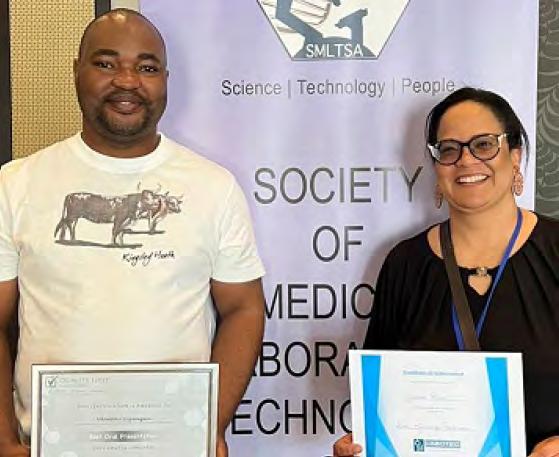
laboratory sciences and food science and technology’. “It was a collaborative effort between myself from the Biomedical Sciences department [in HWF] and Dr Vusi Mshayisa from the Food Science & Technology department [in FAS].”
Dr Prince said winning the Best Microbiology Presentation prize had been “an exceptional and humbling experience”. Her presentation was titled ‘The link between the oral microbiota and metabolic syndrome’. “This recognition significantly influences my future pursuits in the field of microbiology and undoubtedly opens doors to new opportunities. I am brimming with gratitude for this acknowledgement and remain eager to continue pushing the boundaries of scientific knowledge. I would like to extend my heartfelt thanks to the directors and staff at the SAMRC/CPUT Cardiometabolic Health Research Unit for their unwavering support in shaping me into the best scientist I can be. Additionally, I express my gratitude to SMLTSA for their sponsorship of this prestigious award.”
Faculty of Health & Wellness Sciences
FHWS celebrated extraordinary staff members during its annual Faculty Excellence Awards in March. The event was held at the Cape Town Hotel School, Granger Bay Campus. Acting Assistant Dean, Mr Lloyd Christopher, said there were many staff members “who go beyond what is expected of them” and excel, despite challenges. “I think today is really a celebration of the work we have achieved in the last year,” he said. Staff members received the following awards:
- Departmental Teaching Excellence Award: Ms Rizqa Siebritz-Williams (Biomedical Sciences)
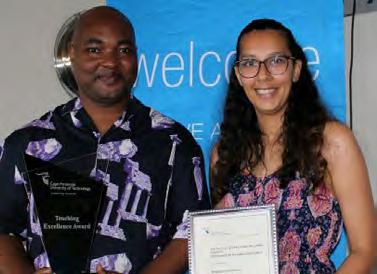
- Departmental Teaching Excellence Award: Ms Judy Sheahan (Emergency Medical Sciences)
- Recognition of exceptional contribution to the Faculty Administration: Mr Siyabonga Mntanywa
- Two awards for excellent service of over 30 years upon retirement: Dental administrators, Ms Maureen Anthony and Ms Stephanie Isaacs
- Recognition of outstanding service and contribution in the fields of mathematics, physical science and chemistry in the faculty: Mr Michael Smith (Ophthalmic Sciences)
- Research Award: Dr Kathleen Naidoo (Medical Ima ging and Therapeutic Sciences)
Faculty awardee for Teaching Excellence in 2021, Mr Nkosikho Sogwagwa, received his trophy at the event. A number of staff members were recognised for completing SL projects for 2021/22:
- Ms Llizane McDonald (Emergency Medical Sciences)
- Ms Roxanne Maritz (Emergency Medical Sciences)
- Mr Gerhardus Koch (Medical Imaging and Thera peutic Sciences)
- Ms Heather Hendrickse (Biomedical Sciences)
- Ms Nomfundo Mkhombe (Ophthalmic Sciences)
- Ms Moeneeba Jacobs (Wellness Sciences)
Prof Kareemah Najaar (Emergency Medical Sciences) was awarded the Faculty Prestigious Achiever’s Award for convening the Life Science tutoring project across the faculty.
Four academics from FHWS presented their research in June at the 2023 Southern African Association of Health Educationalists (SAAHE) Conference, where CPUT won the runner-up spot in the Best Poster category. The conference was held at the Business School of NMU in Gqeberha, and the theme was ‘Health is a key to life’. The programme included workshops, panel discussions, symposia, knowledgesharing sessions and keynote presentations. The academics who attended were Ms Judy Sheahan (EMS), Dr Lizel Hudson (Coordinator: WIL and Language), Dr Kathleen Naidoo (MITS) and Mr Gerhardus Koch (MITS). Prof Penelope Engel-Hills is a co-author of one of the papers presented but was unfortunately unable to attend the conference.
Dr Naidoo and Mr Koch’s research was titled ‘Medical imaging and therapeutic sciences students’ reflections from a service-learning
community project’. According to the two researchers, a service-learning component had been integrated into four undergraduate MITS programmes. The students were asked to collaborate with a community partner of their choice and a service provider to deliver a service to their community partner. As part of an assessment outcome, students were asked to reflect on their individual journeys while engaging with their respective projects. The aim of the study was to explore the reflections of students who had undertaken and successfully completed an SL community project.
Regarding their poster winning runner-up in the Best Poster category, Dr Naidoo remarked, “This was a huge surprise for us as there were a large number of posters submitted. We feel very excited and privileged to have our work showcased on this platform.”

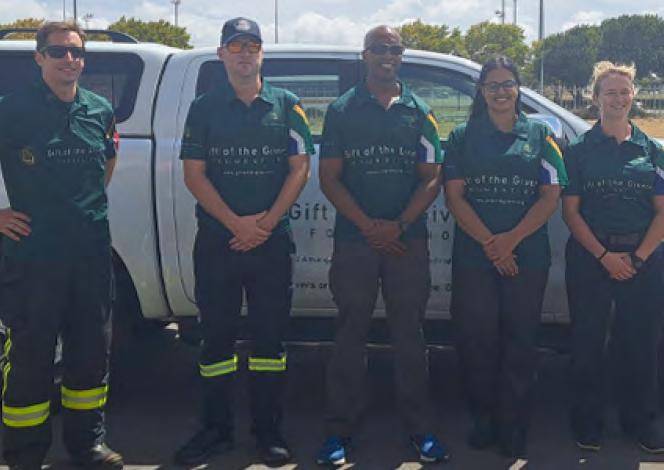
Staff members and students from EMS stepped in at short notice to volunteer their services at Tygerberg Hospital’s trauma unit after several nursing staff members were unable to report for duty because of the taxi strike. “The staff were informed by students who were working the day shift on Monday that they were asked to stay the night and assist with the workload. The on-duty doctor also called on us to assist, which we gladly did,” said HOD: EMS Dr Simpiwe Sobuwa. The staff members were Dr Sobuwa, Ms Roxanne Maritz, Mr Elroy Cameron, Mr John Meyer and Ms Raina Gihwala. Dr Sobuwa said many of the staff members were part of the cohort who travelled to Turkey earlier this year to assist Gift of Givers during a relief mission following the devastating earthquakes.
Describing the experience at Tygerberg, Ms Gihwala said beds were scarce and patients were lying on the floor, some with only the clothing they had come in with. “As we arrived, we immediately started with pain management. Some patients had received pain meds the day before but had not been able to receive the day’s pain meds... Being able to bring pain relief to so many patients made all the difference. In what may seem like a minuscule task to some, to quickly sort out was the hardest task but gave the greatest mental healing for those who knew the wait was far from over,” said Ms Gihwala.
Five staff members from Emergency Medical Sciences Department flew to Turkey in February to assist with search and rescue operations following a 7.8 magnitude earthquake that struck Turkey and Syria. CPUT and Gift of the Givers have a longstanding working relationship, with staff members previously joining the disaster response NGO for the 2015 Nepal earthquake and the 2018 tsunami in Indonesia. Acting HOD: EMS, Dr Simpiwe Sobuwa, joined the mission along with colleagues Mr Louis Jordaan, Ms Rozaan Norval, Mr Xavier Millar and Ms Raina Gihwala. Dr Sobuwa stated that they were eager to use their unique skills to assist in a natural disaster of this scale, and had taken specialised rescue equipment with them. He noted that they would also gain valuable experience in assisting in an international disaster. The team of five participated in the rescue operation for one week.
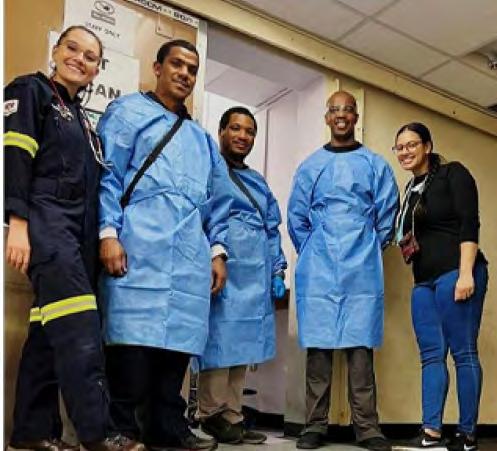
Ms Maritz said helping in the trauma unit as extra staff was an intense and rewarding experience.
“The fast-paced environment of Monday night demanded quick thinking from the team, exceptional teamwork, and the ability to stay composed under pressure. The camaraderie among all members in the unit, from nursing staff, doctors, students and our colleagues, made patient treatment flow like a well-oiled machine.”
An MSc Radiography student won the Presidential Award at an international conference held in Toronto in June.
Ms Patricia Maishi’s presentation at the ISMRM & ISMRT Annual Meeting and Exhibition was titled ‘Antiretroviral therapy use is associated with ectopic pericardial and paracardiac adipose deposition in people living with HIV’.
“I feel blessed and honoured to win this prestigious award. ISMRT is a global society for MRI research with more than 7 000 papers presented at the annual meeting.” Her master’s studies supervisors are Dr Aladdin Speelman and Ms Estelle Herbert. Ms Maishi is a senior MRI radiographer at the Cape Universities Body Imaging Centre. She said continued exposure to current trends in research and clinical work is important for skills development. “My vision is to make a difference by teaching and mentoring the next generation of radiographers to understand different approaches and sequences that may lead to improved protocols that will benefit their departments.”

The Ophthalmic Sciences Department paid it forward on Mandela Day with staff and students volunteering their time to conduct free vision screenings for students. HOD Ms Angelique Walbrugh said the purpose of the visual screenings was to identify undiagnosed refractive errors in the CPUT student community. “All ten departmental staff members and 21 Opticianry students participated as volunteers in the screening and manned stations, including reception, visual acuity, autorefraction, health promotion and statistics. The screenings took place at the Trafalgar Stone Building at the District 6 Campus, and despite the rainy weather, 87 students were screened. Ms Walbrugh said 47 students were found to have significant refractive error requiring further evaluation. “These students will be scheduled for a comprehensive optometric examination during our clinic launch in September.”
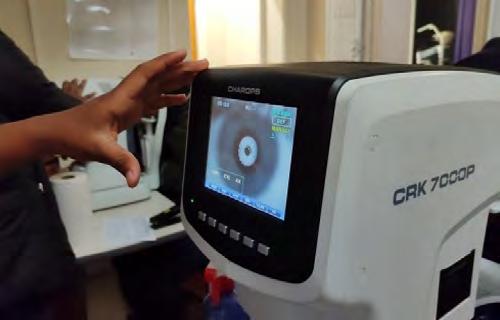

The staff and students of the Department of Ophthalmic Sciences committed themselves to creating awareness of the importance of regular visual and eye health assessments during Eye Care Awareness Month, which took place in September. The department worked closely with the South African Optometric Association (SAOA) whose theme for Eye Care Awareness Month 2023 was #LoveYourEyesAtWork.
Eight staff members from the Department of Medical Imaging and Therapeutic Sciences (MITS) presented at the Society of Radiographers of South Africa (SORSA) 2023 Congress, held at the Century City Conference Centre in August. They were Acting HOD Dr Florence Davidson, Dr Aladdin Speelman, Ms Heidi Thomas, Mr Geordean Schwartz, Ms Maria Hartnick, Ms Yanda Peter, Mr Gerhardus Koch and Dr Kathleen Naidoo. Student Ms Christelle Cloete delivered a poster presentation.
The conference, themed ‘Radiography: A new dawn’, was held in association with the
International Society of Magnetic Resonance Imaging Radiographers and Technologists (ISMRT), and marked ISMRT’s first meeting on the African continent. The event attracted over 300 attendees and featured a hybrid format, allowing both in-person and virtual participation. “The presentations included topics such as AI, Radiation protection, Forensic radiography, Radiography education, Ethics, and various research topics from current doctoral studies,” said Dr Davidson. The congress provided an excellent platform for networking, knowledge exchange, and showcasing the latest technological advances in the field.
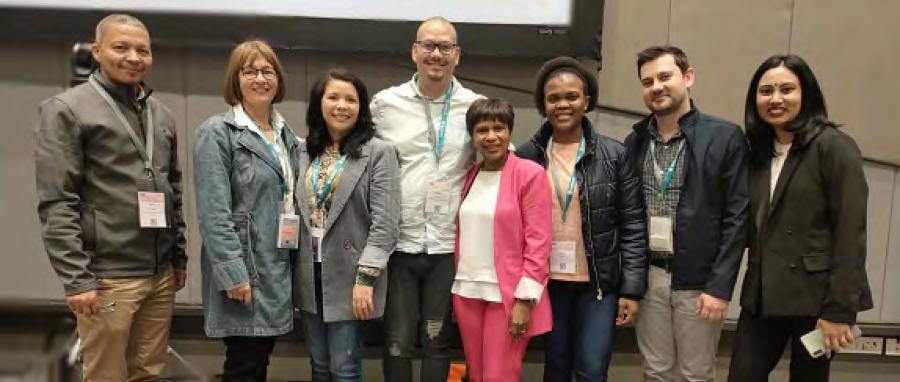

PROF TEMBISA NGQONDI
Introduction
Research, Technology Innovation & Partnership activities continue to grow in leaps and bounds in the Faculty of Informatics and Design (FID). The faculty herein proudly presents its report highlighting the significant milestones and achievements of 2023. One of the accomplishments is the awarding of twenty-three master’s degrees and five doctoral degrees (including four staff members). This conferral is evidence of the faculty’s deliberate and collaborative efforts to nurture postgraduate scholarship and improve staff qualifications.
FID participated in various research and innovation development activities during 2023. Among the most notable are:
• The faculty arranged an annual five-day postgraduate writing retreat in Grabouw in July/August. Facilitated by Prof Cronjé, the retreat was attended by 26 participants, including 20 students.
• Dr Bruce Snaddon, an academic in the Department of Applied Design, was invited to join the Design+Change master’s programme advisory board at Linnaeus University’s Faculty of Arts and Humanities, Sweden. At their 2023 board meeting, he delivered a presentation titled ‘Designing Design education’, which looked at nomadically mobilising pedagogical praxis and exploratory design projects through various local contexts.
• The faculty hosted HELTASA Teaching Advancement at Universities (TAU) Programme fellows in June.
• Dr Belinda Verster, an academic in the Department of Urban and Regional Planning, was invited to deliver a seminar presentation on ‘Digital humanities’ at the DH-Ignite SADiLaR in Somerset-West.
• The Department of Architectural Technology and Interior Design hosted a virtual lecture titled ‘The future of the house: The kitchen’ with special guest speaker Prof Camillo Cerro of the American University of Sharjah, UAE. The event was attended by Interior Design students and staff, Kitchen Companies South Africa, and professional members of the African Institute of Interior Design Professions.
• Dr Monica di Ruvo, HoD: Department of Applied Design, was elected to serve on the Cumulus Executive Board for the period June 2023 to June 2025, representing the African region. The benefits of this appointment include internationalisation for the faculty, and creating opportunities for collaborations and partnerships, particularly with HEIs in Africa. CPUT has been awarded the opportunity to cohost the Cumulus Conference in November 2025, together with UJ, bringing global networking and partnering opportunities to our university.
During 2023, FID signed agreements and/or collaborated with key partners that align with Vision 2030. Some of the highlights in this space include:
• Researchers in the Department of Urban and Regional Planning and the Massachusetts Institute of Technology (MIT) collaborators received $US 31 620 seed funding for an ongoing three-year project titled ‘Anti-gentrification planning in post-industrial Woodstock, Cape Town, South Africa’. The CPUT Team of Prof Masilonyane Mokhele, Mr Brian Fisher-Holloway, Mr Mzingisi Muluse, Dr Louis Lategan and Ms Kwena Letsoalo visited MIT in October to commence the project. The visit included a presentation to the MIT Department of Urban Studies and Planning and tours to similar case studies in Lowell and Salem. This is the first collaboration between CPUT and MIT, and has hopefully laid a foundation for other CPUT faculties and departments to follow suit.
• A partnership was signed with Malmö University, Sweden under the banner of the SASUF forum. The partnership aims to build collaboration capacity between Sweden and South Africa.
• Partnership discussions were initiated with De Paul University, Chicago to develop academic and education collaboration in areas of mutual academic interest. Prof Tiko Iyamu, from the Information Technology Department, hosted De Paul University’s Prof Adelakun in October.
• An agreement was signed with the University of Derby, UK to establish an International Parallel Studio in collaboration with the Interior Design departments of the two universities. This will include the incoming mobility of students and staff.
• A partnership was signed with Vivekanand Education Society’s Business School in Mumbai, India. The objective is to develop academic and educational collaboration in areas of mutual academic interest and to promote mutual understanding between the two institutions.
• A partnership was initiated with Breda University of Applied Sciences in the Netherlands to develop staff and student mobility between the two institutions.
• In partnership with UWC and CoCT, the Department of Urban and Regional Planning has been involved in a 3-year-long interdisciplinary project. Led by Dr Belinda Verster, the student project sees interdisciplinary student groups co-create digital innovations with the community of the informal township of Potsdam/Dunoon to solve complex sustainability challenges such as water and food insecurity, the informal economy and unemployment, lack of public services, and environmental challenges. The project follows a design thinking methodology. It was displayed, with posters and live student presentations, at CoCT’s annual week-long exhibition. It was nominated for an international teaching innovation award under the title ‘Unlocking innovation: Building collaborative interdisciplinary learning spaces through education for sustainable development’, presented in September in Portugal.
• Prof Nic Theo and Prof Masilonyane Mokhele are CPUT representatives in a project titled ‘UCPP doctoral communities of scholarship’, which aims to strengthen doctoral training at six South African universities. It seeks to do this through a decolonial and collegial approach by moving away from the standard supervision model to one promoting collaboration. The universities are CPUT, UJ, NMU, DUT, UP and NWU. The main project activities include the formation of research collectives through interdisciplinary collaboration among peers and supervisors, establishment of six supervisor-learning forums to support doctoral students and enhance supervisor skills, the development of a sixweek hybrid seminar series for advanced research methods training, the creation of six research hubs for collaborative work, and the formation of a cross-institutional think tank for interdisciplinary collaboration.
Bronze: Prof Tiko Iyamu (Department of Information Technology)
Gold: Prof Tiko Iyamu (Department of Information Technology)
Siver: Prof Johannes Cronjé (Department of Information Technology)
Bronze: Prof Justine Daramola (Department of Information Technology)
Faculty
Outstanding Achievement for Academic Research
Prof Tiko Iyamu (Department of Information Technology)
Prof Johannes Cronjé (Department of Information Technology)
Dr Errol Francke (Department of Information Technology)
Dr Boniface Kabaso (Department of Information Technology)
Dr Tabisa Ncubukezi (Department of Information Technology)
Dr Blessing Makwambeni (Media Department)
Outstanding Achievement in Learning and Teaching, Research, and Community Engagement
Dr Sisanda Nkoala (Media Department)
Ms Alexandra Noble (Architectural Technology and Interior Design)
Outstanding Achievement as a Young Researcher
Mr Gqibile Bulani (Media Department)
Postgraduate degrees obtained by staff
Doctor of Applied Arts in Design
CPUT
Van Staden DL
Towards Smart City implementation as an engagement practice: The case of Cape Town, South Africa
Doctor of Engineering
CPUT
Ncubukezi T
Design, development and evaluation of the cybersecurity risk tool: A case of small and medium-sized enterprises in South Africa
Doctor of Philosophy
Stellenbosch University
Makhetha W
The effect of LPBF post-processing solutions on material properties to meet functional Ti-6Al-4V requirements
Master of Technology in Design
CPUT
Monyaki NC
The exploration of remanufacturing and upcycling in the Cape Town fashion manufacturing industry
Master of Technology in Design
CPUT
Papa SD
Universal design in academic dress: A practice-based study of differently abled persons in Cape Town, South Africa
Master of Technology in Business Information Systems
CPUT
Vanda XB
A digital governance platform for knowledge management and sharing at a university in the Western Cape
An associate professor in the Media Department, Prof LJ (Nic) Theo, has been awarded a C3 rating by the NRF. Prof Theo specialises in various areas of media and communication studies, with a primary focus on the semiotic mechanisms through which subjectivity and consciousness are reflected and represented. “I have always been interested in language and its application and in how representation in visual media reflects social norms,” he commented.
Prof Theo added, “My focus on Applied Communication coalesced in a PhD on how formal psychiatric definitions and diagnostic criteria communicate meta-theoretical assumptions about how people live in the world and fuel media representations. Since then, I have focused specifically on meaning-making in mass visual media and journalism, with a niche in film screenwriting theory.” He started at CPUT in 2008 in the Film Production programme as a part-time lecturer before progressing to a full-time contract and becoming permanent in 2014 as Senior Lecturer and eventually being promoted ad hominem to Assoc Prof in 2016.

Prof Theo has won a few awards over the years, including the CPUT Institutional Teaching Award (2015), a Heltasa National Teaching Excellence Award (2016) and a Gold Award for Research from CPUT (2019). He currently serves as a board member and ad hoc acting editor for the Journal for Transdisciplinary Research in Southern Africa.
NRF ratings are allocated based on a researcher’s recent research outputs and their impact as perceived by international peer reviewers. The rating of individuals is primarily based on the quality and impact of their research outputs over the past eight years, taking into account evaluations by both local and international peers. It identifies researchers who are leaders in their fields of expertise and recognises those who consistently produce high-quality research outputs.
Faculty of Informatics & Design
Inspired by the allure of

A researcher and academic, who is “inspired by the allure of the unknown”, said receiving a C2 rating from the NRF was an unexpected surprise. Dr Joseph Adebayo joined CPUT in 2019 as a postdoctoral fellow under the guidance of Dr Blessing Makwambeni, before transitioning to lecturer in the Journalism and Media Studies Department. “When I received the notification of my rating from the NRF, I was overwhelmed with shock, joy and gratitude. Naturally, my gratitude extends to God and everyone who played a part, no matter how big or small, in helping me achieve this rating.” Dr Adebayo has a wide range of research interests with topics ranging from media and peace journalism, to culture, conflicts, democracy, governance and digital humanities.
The academic holds bachelors and honours degrees in Media Studies (Mass Communication) and postgraduate degrees in Peace Journalism (Peace and Conflict Studies). He said it was challenging to pinpoint a single highlight in his career as he intentionally strives to maintain a sense of wonder. “As a result, no achievement, regardless of its scale, is insignificant to me. I celebrate each accomplishment with deep and heartfelt gratitude. I am immensely grateful to the supportive and helpful community at CPUT, especially my Journalism and Media Studies Department colleagues.”
A senior lecturer in the Media Department, Dr Trust Matsilele, is one of the editors of an innovative new book that explores the intersection of journalism and social media. Dr Matsilele is also among the authors of the book titled New Journalism Ecologies in East and Southern Africa. This is the first and only edited volume examining the use of social media for journalistic purposes in Africa.
Published by Palgrave Macmillan, the book is co-edited by Mr Shepherd Mpofu, associate professor of Media and Communication at UNISA, and Mr Dumisani Moyo, Executive Dean of Humanities at NWU. The book presents case studies of news media integrating social media into their news production practices, linking social media use to journalistic

practices and news production processes in the digital age of the Global South. Dr Blessing Makwambeni from the Media Department is also one of the authors.
Dr Matsilele emphasised that academic research should inform the curriculum offered to students. “I think one always has to observe changes that happen in the discipline that we teach as academics, so that what we teach is reflective of the changes that are happening… There should be a conversation between what we teach and what we research.”
Since joining CPUT in 2019, Dr Matsilele has published over 30 articles. Last year, his first book, a monograph titled Social Media and Digital Dissidence in Zimbabwe, was released.
Some of Dr Matsilele’s current projects and activities include:
- Metavoicing, trust-building mechanisms, and partisan messaging: A study of social media uses by selected South African female politicians (with Dr Sisanda Nkoala)
- An edited book titled Journalism in Precarity, co-edited with academics in Portugal, South Africa and China
- A second monograph titled Digital Politics in Africa, coauthored with an academic in Portugal
- An article on AI adoption in community media, coauthored with CPUT academics Mr John Bulani and Dr Blessing Makwambeni
- A press council project: Studying media complaint rulings since 2018, with Dr Sisanda Nkoala
- Speaking at the Futures Media Conference at the London School of Economics in June
Dr Waldemar Bussiahn has been teaching for 33 years and joined FID’s Media Department six years ago. An exhibition by the senior lecturer and programme coordinator of CPUT’s Photography programme, is currently on display at the Central Library Art Gallery. The 35 “serendipitously selected scape photographs” that represent Dr Bussiahn’s experiences as an educator and his intrinsic involvement in many aspects and spheres of photography, were taken during academic visits to the USA, where he presented at photographic seminars and visited universities that specifically teach photography.



The title of the exhibition, ‘A pictorialist embodiment of contemporary American scapes,’ is a combination of introspection and a retrospective lens. According to Dr Bussiahn, he found himself connecting with Pictorialism, an international movement that exemplifies photography as an art form for personal expression. He indicated that as much as the Pictorialists borrowed from the fine arts of their time, he too has incorporated some of the earlier analogue, film and wet process printing characteristics into his work to create a specific look, ambience and character.




Faculty of Informatics & Design

Senior lecturer in the Media Department, Dr Sisanda Nkoala, was announced as one of the winners of the 8th Annual Humanities and Social Sciences Awards in March. Dr Nkoala won the category Best Digital Humanities: Visualisation/ Infographics for her project
‘Digitising the early South African black press: Towards an open education resource digital archive’.
“I’m humbled and inspired because it is a work in progress, and I’m looking forward to taking it to new heights now that it has received a nod of approval from such an esteemed body,” said Dr Nkoala. She said the digital archive, which is under development, forms part of a longitudinal project to develop a comprehensive multilingual digital archive of journalistic texts for use in teaching, learning and research. Dr Nkoala said these texts are newspapers from the early South African black press, published between 1836 and 1960 and were a sector of the print media in South Africa targeting the marginalised black, coloured and Indian communities under colonialism and apartheid.
“Scholars describe it as the oldest, most extensive collection of protest-cum-resistance press in sub-Saharan Africa. Even though they are journalistic texts, they are relevant for historians, educators, linguists, political and social science, and a host of other fields where the contents of newspapers are used for teaching, learning and research… These texts are currently available as hard copies in various libraries in southern Africa. Or, if they are available online, they are in an unreadable, often closed-access repository that keeps them from being accessible to the broader public. My work in digitising them and making them accessible as open education resources is aimed at addressing this gap and ensuring that these multilingual texts can be used for teaching and research at all levels of education and beyond.”
Mr Waldon Hendricks made CPUT proud at the Huawei ICT Competition 2022-2023 Global Final in Shenzhen, China, in May, where his team was awarded first prize. Mr Hendricks served as the coach and mentor for the South African Network Track global finalists in the competition. The team secured first place in the Practice Competition in Network Track. “It’s an eight-hour network exam where they have to build a working lab topology within that time frame,” explained the IT lecturer. “This is a significant achievement for me as a lecturer and instructor for the Huawei ICT Academy at CPUT. It’s also the first time South Africa has won an award at the global ICT competition. This milestone is not just for CPUT but also for the Faculty of Informatics and Design and the IT Department.”
Mr Hendricks was also a guest speaker at the Huawei Global Teacher Summit. “During my speech at the Global Teacher Summit 2023, I emphasised that this competition highlights the importance of industry and academia collaborating to bridge the gap and ensure our students are well-prepared for the industry. would like to thank my wife, Dr Boniface Kabaso, CPUT, and the Huawei ICT Academy for the amazing opportunity to lead the students in this competition.”
Mr Hendricks first joined CPUT in 2005 as an IT lab assistant in the ICT centre at the Bellville campus and worked as a CTS desktop technician from 2007 until 2010. “I became an IT department technician as a permanent CPUT staff member from 2010 to 2021. In 2021, I began my role as an IT lecturer.”

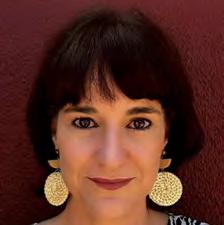
A senior lecturer in the Architectural Technology and Interior Design Department has been selected as a jury panel member for the prestigious International BLT Built Design Awards. Ms Colleen Cocotos said she felt privileged to have been selected as a jury panel member for the awards, which recognise and celebrate the contributions of professionals in architecture, interior design, construction and landscape architecture on a global scale. “The jury consists of practitioners from around the world, and I am honoured to represent South Africa alongside Mr Phill Mashabane, principal at Mashabane and Rose Architects. I look forward to the awards event, which will showcase exceptional work.”
Ms Cocotos joined CPUT in 2009 from Nikheel, a Middle Eastern property developer. “The most enjoyable part of my job is challenging students to become their best selves as designers. I believe that we have the power to make a positive impact on society through good design, and there is no greater privilege than being able to create happy, environmentally responsible and supportive environments.”
Ms Cocotos said being a juror for the BLT Built Design Awards would allow her to review a wide range of projects, buildings, and infrastructure that tackle the challenges of urbanisation. “I appreciate the chance to witness first-hand the exceptional and human-centred approach that goes into these projects. It is creatively stimulating to be part of an awards event that celebrates excellence and shares it globally, with a broad audience, allowing others to aspire to the same level of greatness.”
For Dr Sisanda Nkoala teaching is much more than just a job, and her passion for her profession earned her a nomination for the Forty Under 40 Awards. A senior lecturer in the Media Department, Dr Nkoala said she was honoured to be nominated in the Education category of the prestigious competition. “This nomination is testament to the hard work and dedication I have put into my career as an educator and the support I have received from my department, faculty and the institution at large. Anyone who knows me knows that I am passionate about teaching and mentoring students, and I am committed to using my skills and expertise to positively impact the lives of others, so to be in the running for an award that recognises this is humbling.”
The Forty Under 40 Awards is curated to identify, honour and celebrate a cross-section of the nation’s most influential and accomplished young business leaders under the age of forty from a wide range of industries. Dr Nkoala was nominated by one of her collaborators who came across the call for nominations and approached her to hear if she would be interested. “I jumped at the chance because such opportunities are not just about the accolade but about reflecting on the significance of one’s work and how it is making a difference,” said Dr Nkoala. Winners in each category are selected on two things: a portfolio they submit which a panel will then review, and votes from the public, as a ‘viewer’s choice’ aspect.
Dr Nkoala joined CPUT following a successful career in journalism. “I love journalism and will always be a journalist at heart, but two things made me want to join academia. Firstly, I was pregnant with my twin sons in 2016 when I joined CPUT in a part-time capacity and wanted to engage in less fast-paced work than the life of a journalist out in the field. Secondly, I have always been an educator at heart. As far back as 2009, when was an undergraduate student, I worked as a part-time maths literacy teacher at a local high school. Before that, I volunteered to help students who struggled with maths and math literacy because I liked teaching.”

Seeing students succeed is the most rewarding part of the job for Dr Nkoala. “There is nothing quite like seeing a student who was struggling finally understand a concept or master a skill. It is a reminder that your hard work is making a difference in their lives. In journalism, this is even more pronounced because you get to see their work on TV, hear it on the radio, or see it trending online. Right now, for example, our third-years have started their internship, and it is so fulfilling when they send you screengrabs or links to stories with their first by-lines, or when you happen to hear them reporting on a story while surfing stations on the radio.”
Dr Nkoala has celebrated many highlights over the past year. “I qualified with my PhD in Rhetoric Studies from UCT last year and thought nothing could top that moment. However, this year has come with some pleasant career surprises, including being awarded the NIHSS Digital Humanities Award for the best infographic or visualisation. Also, I’ve been elected vice-chair of the International Association’s Media & Communication Research’s Media Education Research Section, and I’ve also been appointed associate editor of a top international communication journal, the Journal of Communication Technology.”
Faculty of Informatics & Design
At the BLT Build Design Awards 2023 ceremony in Lucerne, Switzerland, a talented CPUT Architectural Technology & Interior Design student was one of the winners in the international design competition, while two other students received honourable mentions.
Ms Laikyn Julies won the Interior Design – SPA/ Fitness/Wellness category for her entry ‘Salvia Medical Clinic’. Ms Inge Botha received an honourable mention for her ‘Coastal Primary Care Clinic’ design in the Interior Design category, and Ms. Krystle Williams received an honourable mention for her ‘Good Hope Primary Care Clinic’ design in the same category.
Ms Julies, originally from Ottery, said she was humbled and honoured to be selected as one of the winners. “My design, the ‘Salvia Medical Centre’, was created to offer solace amid the challenges of the Covid-19 pandemic. Healthcare workers and patients alike experienced anxiety, exhaustion, and post-traumatic stress during this period. To combat this, the clinic aims to create a safe and welcoming environment. Private examination rooms and collaborative spaces strike a balance
between safety and social interaction. Biophilic design principles inspired the incorporation of natural elements, including colours and materials reminiscent of the salvia plant’s health benefits. A soothing palette of pale greens akin to sage promotes tranquillity, earthy curves and timber slats add a natural touch, blues accentuate wayfinding and staff areas, while patient examination rooms feature vibrant South African wallpaper, mirroring salvia’s seasonal flowering hues, providing visual variety.” Ms Julies thanked senior lecturer Ms Colleen Cocotos for her support. “She helped out with material as well as sending links and information to aid us in our design, and even went as far as taking time from her weekends to assist and critique our designs for us to receive personal attention so that we receive the best possible mark. For that I am truly thankful.”
Ms Botha said she felt extremely privileged to have received an honourable mention. “The concept behind the design, logo and name of ‘Coastal Primary Care Clinic’ was inspired by the well-known coast of the Western Cape. Ms Williams said she felt proud of her design

and truly grateful for being recognised in an international competition. Describing her entry, she said, “My design is a proposal for the renovation of a primary care clinic in the Western Cape. My focus was creating a welcoming environment for both patients and staff. My design language included curved lines and access to daylight to keep the space feeling open and inviting. I placed special attention on incorporating Biophilic Design principles through my use of materials, graphics and material choices. My design represents inclusivity. I ensured that wheelchair users and children can access all areas of the clinic. I specified chairs and exam beds that could accommodate bariatric patients. I aimed to create a clinic where all patients could feel welcome and at ease.”
Ms Cocotos, who attended the ceremony in Switzerland said, “I am truly proud of Ms Julies, Ms Williams and Ms Botha’s achievements in the BLT Awards. These awards do not only honour students but also recognise the best industry design work. It was a privilege to be a part of the awards ceremony and to present the winning projects to selected industry partners.” HOD, Mr Rayner Moodley, commended the students’ achievements, “Our students’ success in the BLT Build Design Awards 2023 is a testament to their exemplary talent and dedication. I commend Ms Laikyn Julies, Ms Inge Botha and Ms Krystle Williams for their outstanding achievements, reflecting the high standard of excellence within our department.”

IT Department lecturer Mr Waldon Hendricks proudly represented CPUT at the Huawei South Africa ICT Talent Development Awards Ceremony, where he was a guest speaker and ICT Competition Global Finals Award receiver. The prestigious event was held at the Huawei Office Park in Woodmead, Johannesburg and Mr Hendricks spoke on ‘Instructor case sharing’. He commented, “I felt privileged to have been chosen to showcase the work we have been doing at CPUT in the Huawei Academy since 2019. It was an honour to stand on stage and represent CPUT as one of the ICT academies in South Africa.”
Mr Hendricks was the coach and mentor of the South African Network Track finalists for the Huawei ICT Competition 2022-2023 Global Final competition, which was held in Shenzhen, China. The team was awarded the first prize in the Practice Competition in Network Track.
An outstanding student has won top honours in a prestigious international design competition. Ms Jaime Scholz, who entered the competition as an Advanced Diploma in Interior Design student in the Department of Architectural Technology and Interior Design, was announced the first prize winner of the Accor Design Awards 2023 during the recent awards ceremony held in Paris in October.
Ms Scholz said, “Hearing the news felt like a dream turned into reality, and I’m deeply honoured to be recognised alongside such talented designers and their incredible projects. The journey to Paris was an invaluable experience, I can’t thank the Accor Team and sponsors enough for making it possible.” She said the entire experience had not only been a boost to her personal growth but also a significant steppingstone in her career. Ms Scholz said, “I want to extend my sincerest thanks to my mentor, Ms Colleen Cocotos, for her unwavering guidance and support.”
This year’s theme was ‘Imagining Mercure Hotels social hub, placing local food and beverage and sustainability at the heart’, and Ms Scholz’s entry was titled ‘Mercure Africa safari edition’. HOD, Mr Rayner Moodley, commended the exceptional achievement, which he said highlighted the dedication and hard work displayed by both the student and staff involved.
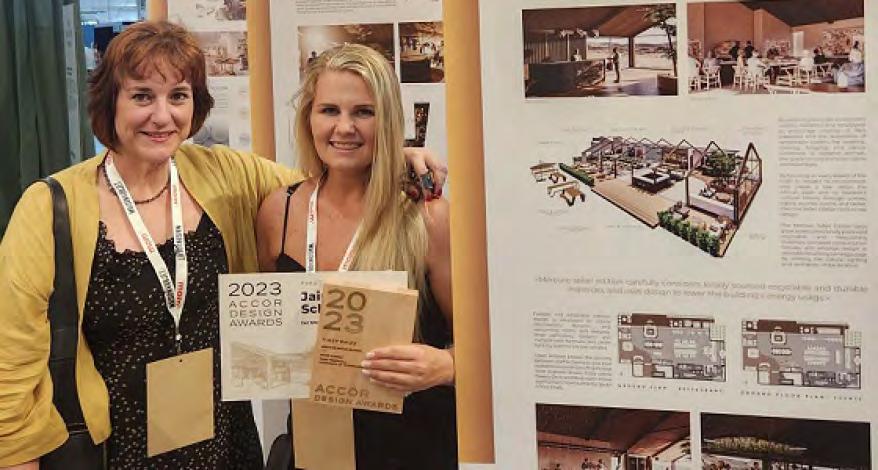
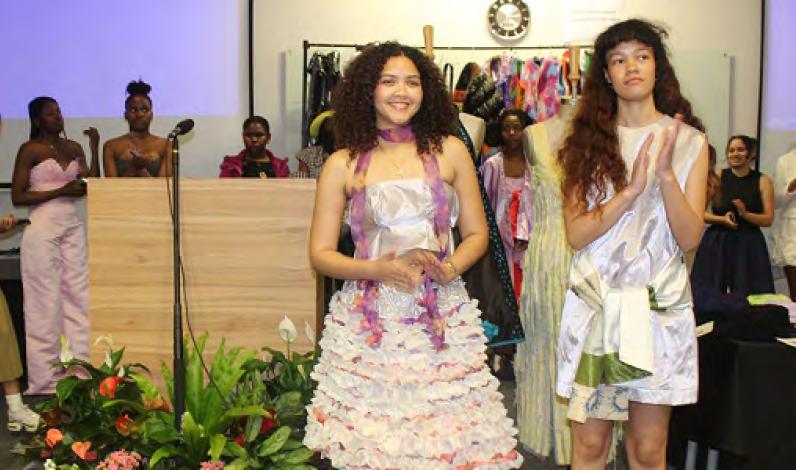
Fashion Design students had their creations showcased at an event held at SARETEC in September. The theme was ‘Building a better future through entrepreneurial, creative technological design’. Guests were welcomed by Prof Tembisa Ngqondi, Dean of FID, who said this marked the launch of the faculty’s Future Entrepreneur Programme, aimed at empowering students in creative fields to be entrepreneurs. The gathering was also a celebration of women, a group still facing challenges in entering the business world. Students were given the opportunity to showcase their work, which attendees could purchase. Prof Ngqondi said the second phase of the project involved getting IT students involved to create a platform for selling the products.
The guest speaker at the event was Mr Brian Mntongana, Executive Creative Director at Woolworths. Mr Mntongana told students that when he started “we were not privileged enough to have industry speakers sharing their knowledge. Remember that the world is constantly changing, we cannot be one-trick ponies anymore. You need to constantly evolve; you need to learn but you also need to unlearn, and you need to upskill yourself.”
ACADEMIC DEVELOPMENT & SUPPORT
CCEWIL is committed to promoting engagements with our quintuple helix partners nationally and internationally, for teaching and learning, research, and community engagement. We do this in order to enrich our academic qualifications, and for staff and student development.
The centre comprises various units:

• Prof Lalini Reddy presented ‘Preparing future-proof curricula to boost the economy and contribute to social cohesion: A Western Cape, South African perspective’ in Canada, which was published in the WACE Conference Proceedings.
• Ms Bronwyn Abrahams attended the SAGEA (South African Graduate Employers Association) Conference in Johannesburg in November.
Workshops and symposia
• Prof Reddy participated in the Centre for Teaching and Learning, NWU WIL SL Colloquium in October, with a presentation ‘CPUT structures for integrating WIL and service-learning’ and a panel discussion.
• In August, Prof Reddy and Prof James Garraway facilitated an institutional research workshop on Activity Theory in WIL Research.
• Staff WIL workshops promoting Future World of Work (FWOW) were conducted quarterly with CPUT faculties.
PROF LALINI REDDY
reddyl@cput.ac.za
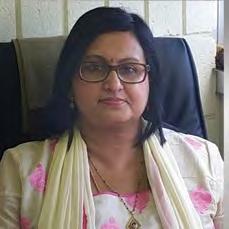
Manager: Prof Lalini Reddy
reddyl@cput.ac.za
Dr Frederick Odun-Ayo and Prof Reddy published ‘Potential biomedical applications of modified pectin as a delivery system for bioactive substances’, in Polysaccharides Vol 4(1) https://doi.org/10.3390/ polysaccharides4010001
Prof Reddy is supervising a WIL assessment project for PhD staff member Ms [first name] Daries in Environmental Health. One of Prof Reddy’s students, Ms Yonela Vakele, graduated with her master’s in Horticultural Science in December. She is also supervising two other master’s students.
Prof Reddy participated in the THENSA HERESA Obreal Project on WIL, Entrepreneurship and CBL with Finnish and Irish universities. The centre sponsored Paralegal student Mr Bongumusa Ngema to participate in the Rwanda Innovation Challenge in December.
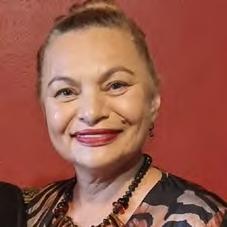

Manager ServiceLearning and Civic Engagement:
Ms Jacqueline Scheepers
reddyl@cput.ac.za
Manager Service-Learning Unit:
Ms Theresa Burns
burnst@cput.ac.za
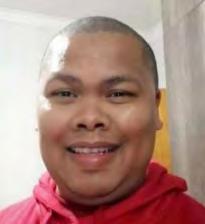
Managers: Civic Engagement Unit
Mr David Haarhof (2023)
haarhofd@cput.ac.za
Ms Gayelin Roman (2023-2024) romang@cput.ac.za
• The SL Unit supported the six faculties in the implementation of 15 SL projects during 2023, which led to the attainment and fulfilment of CPUT’s graduate attributes.
• As part of the STEAM project with 50 learners from Atlantis High School, the unit facilitated a student and staff reflection and certificate workshop in partnership with the Advancement Department in November.
• A Good Practice Guide and Self-Evaluation Instruments for managing the quality of SL have been approved for the SL Unit. All documents are being placed on SharePoint for easy staff access.
• The Department of Construction Management & Quantity Surveying staff and students completed the construction of a library at Balvenie Primary School as part of an SL project. This is an ongoing multi-disciplinary project, which will include departments from FID in 2024, to design and build furniture and develop educational materials for the library.
• The CE Unit offered students a Student Leadership Academy in 2023, which focused on the UN’s SDGs. 76 students attended a week-long Community Engagement Capacity Building Camp.

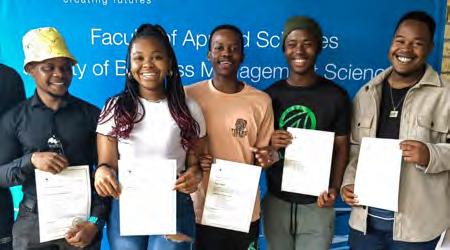
Students drawn from various faculties were required to conduct research and implement 18 studentled community engagement projects linked to the SDGs. To be inclusive and transformative, the academy includes students from diverse disciplines and cultures, and includes SRC leadership and alumni. The academy is funded by DHET’s UCDG. As part of their project presentations, students were required to express how their community engagement experiences actualised CPUT’s graduate attributes.

Medical Imagery & Therapeutic Science lecturers, Mr Gerhadus Koch and Ms Kathleen Naidoo, conducted a research project which was presented at the 2023 SAAHE conference in Port Elizabeth. Their topic was ‘Medical imaging and therapeutic sciences’ students’ experiences of service-learning’. They received second prize for their poster.

Mr Gerhardus Koch published ‘An educator’s reflections on service-learning as an approach to produce socially responsive medical imaging and therapeutic sciences graduates’, in Journal of Medical Imaging and Radiation Sciences https://doi.org/10.1016/j.jmir.2022.10.197.
Rhodes University launched a new journal for Community Engagement called African Journal of Higher Education Community Engagement in November. Ms Jacqui Scheepers, Mr Lloyd Christopher and Mr Stephen Harrison were invited to publish an article in this first edition, ‘Ethical Imperatives in Community Engagement’ https://journal.ru.ac.za/index.php/ AJHECE/issue/view/149/4
Two papers were presented at the Community Engagement Learning Symposium hosted by Rhodes University under the theme: The significance, relevance and impact of higher education community engagement for South Africa and the continent: ‘Ethical imperatives in community engagement’ and ‘Guiding engaged ethical research practices through the lens of university quintuple partnerships’.
As part of the Student Leadership Academy, a Community Engagement International Student Leadership Conference was held in October. The programme director was Ms Anelisa Friesta from FAS. Students presented and reflected on their community engagement projects to a national and international university audience.
The following presentations were made at the CPUT Research Ethics Day by SLCE colleagues and partners:
• ‘Guiding engaged ethical research practices through the lens of university quadruple partnerships’
• ‘The ethical imperative in service-learning and civic engagement partnerships’
• ‘Students’ impressions/perceptions and reflections on ethical leadership in community engagement – A DHET UCDG-funded programme’
• ‘Ethical guidelines for digital storytelling in higher education’
Ms Scheepers participated in the Centre for Teaching and Learning, North-West University WorkIntegrated Learning Service-Learning Colloquium in October, with a presentation on ‘Institutionalising service-learning at CPUT’ and also took part in a panel discussion. CPUT is nationally recognised as a university which has successfully institutionalised SL and a best practice model for universities nationally and internationally.
The organisers of the RTI&P Virtual Research Incoko #2: 2023 invited Ms Scheepers to present on ‘The NRF engaged research framework, participatory research methods relevant to community engagement and relevant theorists’.
The SLCE Units advocated CPUT staff participation in a National Roundtable on Engaged Research Ethics featuring two distinguished speakers, former
DVC of Research, Prof Peter Clayton, and Chair of Rhodes University Ethics, Dr Janet Hayward. A student from CPUT’s Department of Management & Project Management accompanied Ms Scheepers.
The SLCE Units hosted capacity-building workshops to provide staff with the international and national policy landscape relevant to SLCE and an understanding of the relevant theoretical and conceptual underpinnings.
An international partnership session was held at Cape Town Hotel School, Granger Bay with Prof Dr Norbert Gruenwald, Hochschule Wismar, University of Applied Sciences, Director Robert-SchmidtInstitute and Dr Małgorzata Zakrzewska, Uniwersytet Szczecinski, Poland.
A joint session ‘Exploring international partnerships for community engagement’ was conducted at Cape Town Hotel School, Granger Bay with Prof Dr Kay Pfaffenberger, Centre of Business and Technology in Africa, University of Applied Science, Flensburg. The session was attended by RTI-SIP, CPUT and the Department of Economic Development and Tourism, Western Cape Government.
Ms Scheepers was invited to participate in a study abroad visit during June by the Federal Ministry of Education and Research (BMBF) and the Federal
Institute for Vocational Education and Training (BIBB) in Berlin. There is a long-standing and successful cooperation between DHET and BMBF.
CPUT HAN Community Engagement project: 10
CPUT Faculty of Education students participated in an induction weekend. SLCE Units welcomed 14 HAN students to the university. HAN students introduced themselves and provided an overview of their potential projects which can be expanded to include students from other disciplines.
DAAD SDG Community Engagement project funding was approved for CPUT collaboration with Flensburg University, Germany and NUST, Namibia in December.
Planning meetings were held in December to establish projects for the international Hultz Prize Student Competition in 2024.
Ms Scheepers was invited to engage with the University of Szczecin, Poland through Dr Małgorzata Zakrzewska, Uniwersytet Szczecinski, Poland. The following activities were conducted in Europe:
• Meetings with faculty leaders
• Keynote address to university students, researchers, university leaders, industry, small business, and government officials; also presented DSI, NRF and SAASTA’s Engaged Research Framework 2022
• Consultations with students on their SL projects
• Meeting with the International Office to explore and discuss procedures for a formal bi-lateral agreement which has now been signed between the two universities SERVICE-LEARNING AND
• Meeting with Erasmus+ researchers from the Faculty of Education
• Visit to rescue laboratory and training centre
• Visit and meetings to Wismar University: Prof Dr Norbert Gruenwald, Director Robert-SchmidtInstitute and Prof Dr Jan Helmke, Wismar Business School, Business Informatics, Applications Systems Senator, Hochschule Wismar, University of Applied Sciences
The SLCE Units intend to strengthen the ties with the Uniwersytet Szczecinski to develop a space where SL and CE students and staff from both universities can exchange ideas and knowledge. Engaged scholarship and providing support to faculties and support units to produce research output will be pursued in 2024.

The Zentralstelle der Bundesregierung für internationale Berufsbildungskooperation im Bundesinstitut für Berufsbildung (BIBB), German Office for International Co-operation in Vocational Education and Training (GOVET) visited CPUT in June to explore areas of further development and engagement between Germany and South Africa with regards to the TVET sector. The delegation to South Africa comprised Mr Armin Reinartz, who is Head of Division International Co-operation Federal Ministry of Education and Research (BMBF) and Dr Ralf Hermann, who is Head of GOVET. The visit included a meeting with the DHET and Northlink College. At the request of the German delegation, a CAPE–VET research report was delivered by Ms Jacqueline Scheepers, co-researcher of the project (2019 to 2022), in partnership with the German universities Flensburg Europa University (EUF), Flensburg University of Applied Sciences (FUAS) and Hochschule Wismar.
DVC: RTIP Dr David Phaho delivered the opening and welcome speech. Ms Kristin Hess, a representative of BMBF Germany, also extended a sincere welcome to
all present. Dr Zena Scholtz, HOD: Teacher Professional Development in the Faculty of Education, provided an overview of the Advanced Diploma in TVET Education and Training Teaching programme as offered by the department. The CEO of Northlink College, Mr Brian Phike, provided the delegates with an overview of the college. Prof Joy Papier, SARChi Chair, gave an inspiring talk on her journey in TVET and stressed the importance of research for capacitating TVET lecturers.
The occasion included a presentation by Dr Sven Pietrangeli, SARETEC’s Operations Manager, on the courses offered by his centre. “SARETEC can adapt their courses to meet the needs and demands of industry,” said Ms Scheepers, Manager: SLCE Units. The engagement emanated from a long-standing partnership between CPUT, Europa-Universität Flensburg, and the University of Applied Science Flensburg. Ms Scheepers added that the ultimate aim was to ascertain how universities and TVET colleges can partner to address a myriad of issues relating to the TVET sector and empower key role players in this profession.
The Civic Engagement Unit and CCEWIL, in collaboration with the Faculty of Education, celebrated Women in Education at Fleur Park, Gordon’s Bay in August. The event, held in honour of Women’s Month, aimed to inspire aspiring and novice teachers to continue their outstanding work in their respective fields, fostering well-rounded learners within the education system. Participants included staff and students from the Faculty of Education, FHWS, FBMS, SLCE, novice teachers from the Western Cape government, and a representative from NPO EduFocus Projects. “This CE project was aimed at fostering professional development, empowerment and holistic well-being among women in the education sector,” said Faculty of Education’s T&L Coordinator, Dr Dorothy Esau.
Presentations delivered at the event included ‘Professionalism in teaching’ by Ms Dealshaad Swart. The Bed Hons student’s talk covered critical issues to effective teaching, including knowledge of education policies, subject expertise, work ethics, continuous learning, maintaining a positive disposition, time management, classroom management, conflict resolution, and effective communication skills.
Ms Anziré Coetzee, a fourth-year BEd SP/FET phase student, focused on addressing gender discrimination and promoting awareness of GBV in school settings. Ms Coetzee’s presentation highlighted the importance of creating safe and inclusive learning environments. EMS students, Ms Nompumelelo Ntuli and Ms Zenobia De Bruin, focused particularly on prioritising women’s health issues and holistic well-being with a focus on the significance of self-care and practical activities to support participants’ physical and emotional well-being.
The weekend concluded with a surprise high tea and photoshoot at Krystal Beach Hotel, allowing participants to unwind and enjoy the beautiful surroundings. The event was sponsored by NPO EduFocus Projects, founded by Dr Esau. Veteran teachers were invited as special guests and Ms Jolene Martin, lead actress from the local telenovela Arendsvlei, delivered an impactful, profound, and dynamic keynote address, titled ‘Find your light’.
Ms Jacqui Scheepers, Manager: SLCE, applauded and supported the expansion of this project to include more novice teachers in the following year, and commended Mr David Haarhof from the CE Unit for excellent project coordination.

CPUT participates in SAB Ottery
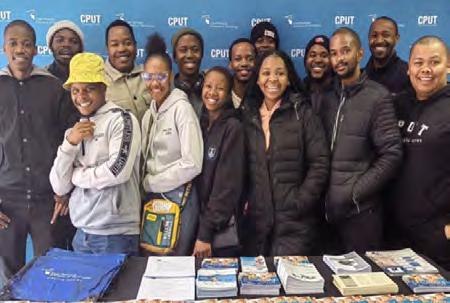
The SLCE Units and CCEWIL participated in the SAB Ottery Wellness Day in August. Young Transformers and Question Marks Student Leadership Academy groups engaged with SAB Ottery staff members on various issues, including providing guidance in terms of careers and study skills. This project forms part of their outreach activities aligned to the academy’s deliverables.
“Building effective partnerships is crucial for our university’s growth and broadens our social responsibility footprint aligned to our Vision 2030 strategy. Wellness of the body, mind and soul should receive a new appreciation and understanding,” said project leader, Mr David Haarhoff. Ms Jacqui Scheepers, Manager: SLCE Service-Learning and Civic Engagement Unit, added that engagement with society is aligned with CPUT’s Vision 2030 and the enhancement of the university’s quintuple partnerships. “The projects provide authentic and experiential learning experiences for students in interdisciplinary contexts,” said Ms Scheepers.
The SLCE Units and CCEWIL in collaboration with the Faculty of Education, hosted seven students from HAN University of Applied Sciences from the Netherlands. Twice a year, HAN students travel to CPUT and collaborate with various departments under the banner of SLCE. Organisations such as Home-Based Care, South African Red Cross Society, schools and Theewaterskloof Municipality benefit from the students’ hard work and dedication. HAN students reside in the rural towns of Grabouw and Caledon for the duration of the project.

An orientation weekend funded by HAN University was held in August. Seven CPUT students from FHWS, FBMS, Education, FEBE and FID engaged with the HAN students at the orientation. “Our first activity was to collaborate and do intercultural consciousness and cross-cultural communication. We shared info about the various cultures in South Africa and the HAN students shared information about the Dutch culture,” said Nursing Science student, Ms Yandisa Maqetuka.
At the intercultural and international engagement session held at SARETEC, CPUT afforded the HAN students a space to showcase their respective community projects. During the presentations, the HAN students gave a detailed report of their respective projects and expressed their challenges, opportunities and possible solutions to various issues experienced within communities.
According to Ms Jacqui Scheepers, Manager: SLCE, “Internationalisation can be achieved through collaborative community engagement activities with students and staff from various international partner universities. This project serves as an opportunity to achieve our institutional goals as per our Vision 2030 for focus areas 5: Smart internationalisation; 6: Smart engagement, and strong links with quintuple helix partners; and 7: Smart student engagement and learning experience.”
Mr David Haarhoff, project leader for CE, alluded to the importance of student involvement in such critical engagements, saying “VC Prof Chris Nhlapo often refers to CPUT becoming Africa’s MIT. This would require a different level of thinking and continued international exposure, not only for academics but for students as well. My heart is happy when our students integrate and present our university when hosting international guests. Our students really made me proud.”
The Civic Engagement Unit launched the Atlantis Special Economic Zone STEAM Programme, led by the Advancement Department. The purpose of the programme was to assist 40 learners from surrounding schools in Atlantis with Science, Technology, Engineering, Arts and Mathematics (STEAM).
STEAM, high on CPUT’s agenda, encourages learners to dispel the negative connotations of subjects and careers within these fields. As the world’s reliance on technology and innovation grows, so does the demand for individuals to upskill, particularly in the STEAM vocations. Advancement Department director, Mr Calvin Maseko, commended the Service-Learning and Civic Engagement (SLCE) Units for a job well done, especially the academy leadership. Mr Maseko said the leadership role which the participating students played in the project was “impressive and student leaders can serve as role models for the learners. The student academy should be compulsory for students who wish to occupy leadership roles at the university.”
SLCE Manager, Ms Jacqui Scheepers, said this interdisciplinary community engagement project requires students to conduct ongoing research, develop activities, and then implement through sharing their skills and knowledge. “As the programme was held early on Saturdays in Atlantis, students had to travel to a pick-up point on the Bellville campus, and then travel to Atlantis, an indicator of the dedication, discipline and commitment of the student leaders.”
In December, a reflective workshop was conducted with students from the Community Engagement Student Leadership Academy who were involved in offering tutoring and teacher support throughout the 26 sessions offered to learners this year. Mr Lutendzo Moavi, student project leader of Sports and Leisure Management, is responsible
for coordinating the weekly programme. Several students reflected on the project and shared what stood out for them. Mr Simphiwe Makhathini noted that the pupils’ eagerness to learn and compete was admirable. This enthusiasm challenged him to think on his feet, assess their needs, and deliver effectively. Mr Atlegang Lekabe, a Sports and Events Management student said, “The project has taught me patience and perseverance. Meeting learners from different backgrounds was a bit challenging. What stood out for me was a young man who comes from a very troubled household, however, the passion he has for his academics inspired me as you would normally find kids from such environments tend not to be interested in academics.”
Civic Engagement project leader, Mr David Haarhoff commended all partners and our university for their continued efforts in assisting learners to become more comfortable in the STEAM subjects.

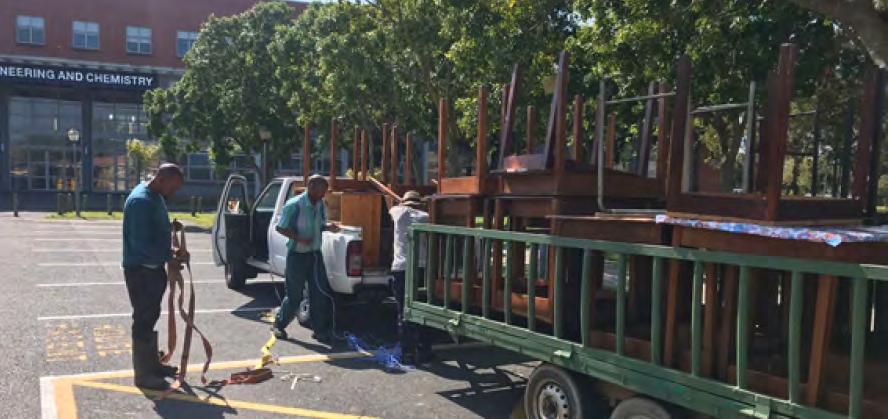
Staff and students make a positive impact
The CE Unit and CCEWIL collaborated with CPUT Residence Finance to disburse unneeded items from residences to communities as part of their Social Investment Project. The project began a few years ago with the distribution of used mattresses and bed frames. Currently, the desks in the residences are being replaced with new ones. Community organisations that benefit from the project include Saartjie Baartman, Ladles of Love, Vision Child and Youth Care Centre, Langebaan Policing Forum, Jenny Alexander Community Upliftment Foundation, Camissa Solutions, The Ark City of Refuge, Sons of God Reach NPC, Gift of the Givers, Ram Charity, Agape Family, Leliebloem Home, RWCW Foundation, Restoration & Leadership Skills Home, Al SABR Foundation, Hanover Park Home of Safety, Victory Outreach, Open Foundation, TAG Restoration Centre, and the Umsimbithi Foundation. These groups deal with disaster response and poverty alleviation in vulnerable communities.
Ms Jacqui Scheepers, SLCE Manager, believes that “the project gives credence to CPUT’s Oneness and Smartness through acts of kindness and demonstrating compassion (human-heartedness) by the university further cementing and living the philosophy of Ubuntu”. Ms Debbie Lindenberg from the Community Policing Forum said, “A huge thank you for the desks which were distributed to two schools in Langebaan and Redlinghuis. They were so appreciated.” A community partner, Mr Mark Govindsamey from Camissa Solutions also expressed gratitude for the donation, “It will be appreciated by those who suffered the loss of personal items in areas affected by the storm we had. Thank you to all at CPUT.”
Mr David Haarhoff, the CE project leader, indicated that CE cannot simply be deemed a tick-box exercise. “It requires passion, empathy, sympathy and a sense of alignment with the Ubuntu philosophy. Reaching out to the respective organisations is a true testimony of our CPUT’s seriousness in contributing to society at large.” This project is ongoing and shows how, through collaboration and partnerships, CPUT staff and students can make an impact in their communities.
Academic Development & Support
The SLCE Units, in partnership with the organisations Lovafriworx and Yes We Can Sports and Jazz Foundation, joined hands in celebration of women in September, when they hosted a group of special women at Oude Molen Eco Village near Pinelands. Oude Molen is a vibrant and diverse community focused on sustainability and social enterprise. Originally an abandoned hospital complex, it has been transformed into a holistic, environmentally friendly village, housing a variety of micro-businesses, NPOs and social services. It’s a hub for community development, providing jobs, food security and youth development programmes.

The project was made possible with donations from the Gift of the Givers and sponsorship from the DHET’s UCDG. Ms Thandekile Ndlovu, student group leader of Nuwe Lewe, said violence against women had increased alarmingly over the last decade. “The urge to address this crucial matter has become imperative at local, provincial and national government levels.” Around 30 women from various communities across the Cape Metropole were invited to attend this auspicious event at the Yes We Can Sports and Jazz Foundation at Oude Molen.
The main theme outlined by Ms Ndlovu was ‘Taking charge of your own narrative’. The guest speakers included Ms Faye Macheke, Co-Executive Director at the Association for Women’s Rights in Development (AWID). Ms Macheke started the proceedings with her presentation on ‘Quality care of survivors of gender discrimination and violence’. She reiterated the sad reality of women on the African continent being at risk with an intimate-partner, and a family-related homicide rate of 3.1 per 100 000 females.
Ms Lolwethu Luthuli, an FBMS lecturer, spoke passionately about empowering resilience by navigating life with strength and purpose after trauma. The focal point of her presentation dealt with resilience. Ms Phelekwa Mfuyo, Programming Specialist at Parliament and a CPUT alumna, inspired the women with her speech titled ‘My worth starts with self-worth’, sharing her personal journey and experiences. She also introduced the Sip and Paint activity, which is used globally as a means of therapy.
Mr David Haarhoff, project leader said, “We cannot work in silos if we intend to conquer such a great mountain. Community engagement programmes of this nature must be prioritised by our institution in alignment with national imperatives. We have to fight on behalf of our girls and women.” Mr Haarhoff urged everyone to do their part by reaching out to at least one battered girl or woman. “I am ecstatic that our external partners could hold hands and partner with SLCE, making the event a success for the special women hosted at the event,” he said. Ms Jacqui Scheepers, SLCE Manager reflected, “The student leadership community engagement projects are meaningful projects where students are provided with a platform to grow their competencies, their sense of citizenship and servant leadership.”
The programme concluded with each attendee receiving a care pack and food parcels sponsored by Gift of the Givers.
The CE Unit and CCEWIL participated in the Transnet National Ports Authority (TNPA) Garden Route Career Exhibition held at the Port of Mossel Bay in October. This annual career exhibition event is for learners around the Garden Route, and it is the brainchild of the TNPA Mossel Bay. TNPA collaborates with private and public institutions to deliver an exhibition where learners can gain access to maritime and other career and bursary opportunities. At the exhibition, CPUT Student Leadership Academy students and staff engaged with school learners on STEM study opportunities at CPUT.
The Civic Engagement Unit prides itself on taking CPUT to the community. “The impact of CPUT’s engagement in communities is an indication of the value that the university brings to its society. Exhibitions like these are important experiences for students as they reinforce their institutional and disciplinary knowledge through sharing with others. Learners are also more receptive when they can communicate with peers who share similar generational experiences,” said Ms Jacqui Scheepers, Manager: SLCE.
Third-year Mechanical Engineering student Mr Sandile Malinga shared how he assisted school learners with the modification of their solar car design. He said, “It gave me a chance to inspire young minds to create their own future in the STEM fields.” Third-year student and WIL intern Mr Sydney Hlongwane said, “The event provided a platform for networking, sharing insights and discussing career pathways with enthusiastic young individuals who were considering joining CPUT.”
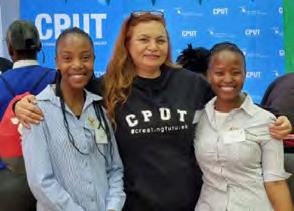
“As the only university present at the event, our engagement with learners was impactful, allowing us to provide advice and guidance, and most importantly, represent our university to the best of our ability. Partnerships of this nature are critical for future relations,” reflected Mr David Haarhoff, CE Unit project leader.
PROF EUNICE
NDETO IVALA
ivalae@cput.ac.za
CIET’s mandate is to support the academic project through staff development into innovative integration and use of technologies and pedagogies to promote holistic student success.

To achieve this mandate, the centre’s work is informed by design-based research. Results are used to improve staff development training programmes and student learning. Staff development activities include workshops, seminars, a short course on blended learning, learner analytics, and various other projects. The centre also mentors academics towards design-based research and scholarship of learning and teaching.
During 2023, some CIET staff members were involved in designing and delivering some of the short courses offered by the Cape Higher Education Consortium (CHEC) and the Teaching and Development Programme (TDP).
During 2023, CIET produced the following research output:
Journal articles
• ‘Har nessing student agency for easier transition and success’, in Journal of Student Affairs, 11(1)
• ‘A theory-driven lear ning analytic model for detecting student-at-risk in higher education’, in Ubiquitous Learning: An International Journal of e-Learning and Innovative Pedagogies Research Network
Book chapters
• Chapter 1: ‘Introduction’, in Co-Teaching and CoResearch in Contexts of Inequality: Using Networked Learning to Connect Africa and the World https:// vernonpress.com/book/1767
• Chapter 4: ‘Looking Back, Moving Forward: UniversityIndustry Collaboration for Architectural Education, Innovation and Transformation’, in Co-Teaching and Co-Research in Contexts of Inequality: Using Networked Learning to Connect Africa and the World https:// vernonpress.com/book/1767

Edited book
Co-Teaching and Co-Research in Contexts of Inequality: Using Networked Learning to Connect Africa and the World is an open access publication which can be accessed at: https://vernonpress.com/file/20326/ c36abeb603a4cf086907c0b595 daaabe/1681801910.pdf
CIET staff members were involved in collaboration with various researchers at CPUT and at other higher education institutions in the region and nationally, as well as one EUfunded project:
• FutureAbility Erasmus+ Project – aimed at investigating how educators taught visual art subjects and used visual arts methods to teach online during the pandemic 2021 to 2023 (EU-funded)
• Development of the Trans-Atlantic Platform (T-AP) call scope on Governance, Democracy and Trust, together with an academic writing group which included academics from Brazil, UK, France, Poland, Croatia, USA and Colombia
• A project by the British Council and Department of Basic Education on developing digital standards for the schooling sector in South Africa
Review of research publications and grant proposals
CIET staff members were involved as reviewers for DHETaccredited and ISSN journals. They were also involved in the reviewing of NRF grant proposals.
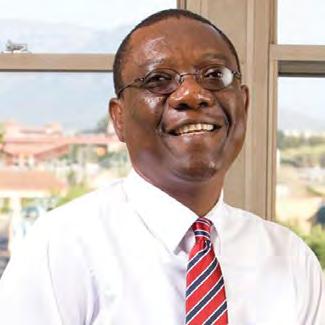
CPUT Libraries forms an integral component of research and scholarly communication activities at the institution by providing access to relevant world-class information resources, digital platforms, tools and services.
During 2023, CPUT Libraries was involved in key research support activities both institutionally and nationally, including:
• There was a collaboration with the Directorate of Research Development (DRD) and Computer and Telecommunication Services (CTS) to plan the development of coordinated eResearch services within the institution.
• The Office of the Library Director, in partnership with CREST at SU, co-chaired the National Publications Quality Framework project. This initiative aimed to contribute to the revision of the DHET Policy on Research Outputs, with the goal of enhancing research outputs in South African universities.
This year, we also saw the growth of our digital platforms, including eSango, the institutional data repository that is enhancing researchers’ collaboration and visibility on the global stage. Additionally, more focused training programmes have been introduced to support postgraduate students as they begin their studies.
eResearch services are envisioned as a collaboration between the Office of the DVC: RTIP, CTS, the Libraries, the DRD, researchers and postgraduate students. The goal is to accelerate research discovery by transforming research practices through advanced computing and emerging models of scholarly communication. This will be achieved by partnering with research groups in their academic endeavours, and connecting them to the most appropriate hardware, software and services. Some of these services include:
• Research software tools
• Research data storage services
• Research data management services
• Research computing
• Research collaboration
• Researcher training support
• Software development
• Research infrastructure
A successful workshop was held in October, allowing CPUT stakeholder divisions to define the services that cohesively support the research endeavour in a crossfunctional approach. One of the agreed outcomes was the establishment of an eResearch Working Group to develop and lead the establishment of eResearch capability at CPUT, providing direction on governance, strategy, structure, resourcing and priorities for the university.
Recent studies on publication behaviour by South African academics have revealed that some have increasingly begun to engage in questionable practices. Such practices must be addressed urgently to ensure public trust in scientific enterprises in the country. Against this background, a national collaborative project has been launched, the Research Publications Quality Framework for South Africa, consisting of four main activities:
• Establishing a timelier alert and support system to assist universities in identifying cases of questionable publishing behaviour before submitting for publication subsidies
• Ongoing monitoring and evaluation of the quality and integrity of all submissions to the DHET
• Developing and implementing educational and capacity-building interventions around good practice in scholarly publishing
• Supporting ongoing research and analysis of South African scholarly publishing practices to maintain the requisite levels of vigilance and ensure that public investment in subsidy systems meets the highest standards of research quality and integrity
The project is led and managed by a team consisting of Prof Johann Mouton (Project Leader: CREST, SU) in partnership with Prof Elisha Chiware (Director: Library and Associate Professor in Library and Information Science, CPUT).
CPUT has access to eight read and publish agreements negotiated by the South African National Library and Information Consortium (SANLiC) on behalf of all universities in the country. These agreements allow for open access publishing with no or reduced article processing charges. They provide access to paywalled content, as subscribed by the Libraries, while repurposing reading subscription expenditures to finance open access publishing in the same journal collections. CPUT Libraries facilitate access to these agreements and provides awareness and training for researchers. These agreements are with several leading scientific publishing houses. The cost avoidance for CPUT in 2023 was approximately R1 900 000 for 34 publications.
Through collaboration with sister universities in the Western Cape, CPUT Libraries actively pursues international certification of its institutional data repository (eSango) as a Trusted Digital Repository (TDR). A TDR is defined as ‘one whose mission is to provide reliable, long-term access to managed digital resources to its customers, now and in the future’. In 2023, a revised application was submitted to CoreTrustSeal for this status, and we await the results.
Research impact and measurement support and reports
The first version of the Metric Tool was completed in 2022, and further enhancements were made in 2023, including improvements to the interface, API limits, and report formats. The tool draws data from ORCID, Scopus, Web of Science, eSango (CPUT Research Data Repository), and Google Citation. It is available on the Libraries’ website: https://www.cput.ac.za/lib/research-support
Research outputs
In our own contribution to the librarianship body of knowledge, the Libraries’ staff produced several research outputs during 2023.
Journal articles
‘Open Science’, in Reference Module in Social Sciences https://doi.org/10.1016/ B978-0-323-95689-5.00061-4
‘Overcoming challenges to open research practices – A perspective from the Global South: A commentary on ‘(Why) are open research practices the future for the study of language learning?’, in Language Learning: A Journal of Research in Language Studies https://doi.org/10.1111/lang.12576
‘Publication of open access journals at a university of technology in South Africa’, in South African Journal of Libraries and Information Science https://doi:10.7553/89-12045
Conference papers
‘Securing and building trust in institutional research data repositories: Case of Cape Peninsula University of Technology eSango research data repository’, at the 3rd International Association of Social Science Information Service and Technology (IASSIST) Africa Regional Workshop, in Pretoria in October
‘Future models and architecture of data repositories in African universities’, at the 3rd IASSIST Africa Regional Workshop, in Pretoria in October
‘Artificial intelligence-based literature review process adaptation’, at the 3rd IFLA IT Section Artificial Intelligence Symposium, in Potchefstroom in September
conclusion
During 2023, CPUT Libraries made significant strides in supporting research and scholarly communication as well as contributing to the librarianship body of knowledge. As we look forward to 2024, we are excited to continue enhancing our services and fostering greater collaboration and innovation within the academic community.
Research output

CPUT Libraries and the Department of Intermediate Phase Studies, Wellington Campus presented a Community Engagement
Reading Literacy Seminar and Workshop in commemoration of International Literacy Day and officially launching a school library at Magnolia Primary School. A successful Reading Literacy Seminar and workshop for Grade 4 learners was held in September at the primary school in Paarl.
Ms Joanne Arendse, a branch librarian and one of the coordinators, said that Mr John Leibrandt, the principal of Magnolia Primary School, had reached out to the Wellington Campus Library for assistance in renovating and establishing a functional school library in 2020. Ms Arendse continued, “The aim was to provide the learners with access to reading and information resources supporting their school assignments and also to promote a culture of reading in a conducive library workspace.”
Prof Lizette De Jager delivered a reading literacy message. She said, “I am so excited to be involved in an initiative like this as the world celebrates International Literacy Day today. We are reminded of the critical significance of being able to read, and it’s a very important part of education and lifelong learning.” WCED official, Ms Elizabeth Hattingh, also delivered a reading literacy message and thanked CPUT for the initiative. Prof Brenda Flanagan, an academic and author from the USA, provided the keynote address, ‘Reading can blow your mind’.
The second session involved third-year Intermediate Phase Teacher Students who facilitated the reading literacy workshop activities in collaboration with their language lecturer, Ms Amanda Anker. Ms Audrey Patrick and Ms Portia Rhode handed over donations from Wellington Campus to Grade 4 teachers.
The Magnolia School project is a registered CPUT Libraries school project with CPUT’s CCEWIL. The project objectives include:
• To support the establishment of a conducive and functional library at the school
• To provide library training to school library teachers
• To promote and strengthen reading and literacy skills development of learners and teachers at the school through literacy and reading initiatives
CPUT Libraries hosted a series of events during Breast Cancer Awareness Month in October. During the annual campaign, various health and other structures raise awareness of the disease. Staff and students were given the opportunity to learn about the importance of early detection, treatments and care available as well as services available on the various campuses via CPUT Health Clinics. Awareness drives were held at Tygerberg Campus, Mowbray Campus, Wellington Campus, Granger Bay Campus, District Six Campus and Bellville Campus.
At the Bellville Campus event, the last in the series, attendees were welcomed by a senior Library Assistant, Ms Ncumisa Njecana, and Ms Barennise Arries, lecturer in the Department of Nursing Science, presented ‘Cancer journey of a loved one – My support’. Ms Georgell van Wyk of the Department of Medical Imaging & Therapeutic Sciences spoke about the barriers experienced by patients during mammography screening. A group of students from the Department of Nursing Science delivered a presentation including information on the causes of breast cancer. Dr Bronwyn Swartz, a senior FEBE lecturer, shared some of her personal journey, advising, “I would promote that you go and get your regular check-ups. We can’t control our circumstances, the stuff that happens around us, but we can control going for our check-ups.”
CPUT Libraries thanked FHWS, CPUT Health Clinics and all participating departments for their support.

DR XENA CUPIDO
cupidox@cput.ac.za
In the landscape of higher education, the Fundani Centre for Higher Education Development (CHED) has emerged as a pivotal force, steering innovative advancements and setting benchmarks in research excellence. As a strategic unit within the university, Fundani’s dedication to fostering the development of higher education is impactful, aligning its objectives with international and national educational directives.
Throughout the year, Fundani has been at the forefront of collaborative efforts, partnering with various faculties and strategic units within and beyond CPUT. These partnerships are the cornerstone of our commitment to enhancing the quality of teaching and learning. By facilitating a rich exchange of knowledge and research, Fundani has contributed significantly to the scholarship of teaching and learning, ensuring that our academic endeavours are relevant and transformative.
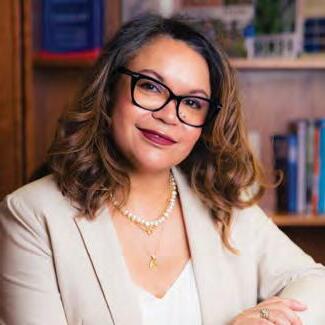
One of Fundani’s notable achievements in 2023 was hosting the 11th annual RITAL Conference at the Granger Bay campus in November. This conference, a significant event in the academic calendar, was organised by Fundani’s Research Coordinator, Dr Najwa Norodien-Fataar. The theme was Inclusive Digital Futures: Addressing Diversity in a Tech-driven World. Prof Simone Titus of Stellenbosch University delivered a keynote address on nurturing diversity and inclusivity in the digital age. The conference featured research on themes like bridging the digital divide, digital pedagogy, and equitable access to digital resources, underscoring Fundani’s commitment to inclusive education.


RIFTAL, overseen by Fundani, supports scholarly exploration within CPUT. Guided by Dr Najwa Norodien-Fataar and Dr Nosisana Mkonto, research proposals undergo peer review to maintain high standards. Funded by the UCDG and supported by DVC Prof Balkaran, RIFTAL provides approximately R650 000 annually for research innovations. This funding is instrumental in providing CPUT faculty members with the necessary resources to undertake classroom-based research, thereby contributing to the scholarly discourse on education and pedagogy.
Dr Faiq Waghid, HOD: Academic Staff Development at Fundani, received the prestigious NRF Y-rated award. This award recognises researchers under 40 who have the potential to become leaders in their fields. This accolade highlights Dr Waghid’s contributions and is an inspiration to his colleagues and students. The Y-rated category is particularly significant as it identifies individuals recognised by their peers for having the potential to establish themselves as leaders in their respective fields within five years of the evaluation. Dr Waghid’s receipt of this award reflects the calibre of professionals that Fundani nurtures within its academic community. It also inspires his colleagues and students, exemplifying the heights that can be achieved through dedication, innovation and pursuit of knowledge. As we celebrate this significant
achievement, we anticipate Dr Waghid’s continued contributions to his field and the broader impact his work will have on shaping the future of academic excellence and innovation at Fundani and beyond.
Dr Kabelo Sebolai, Fundani’s Language Coordinator, represented CPUT at two international conferences in Portland, Oregon in March. Supported by the US Embassy in South Africa, Dr Sebolai’s participation underscores Fundani’s role in global language education and its commitment to integrating international best practices. It is an outstanding showcase of our commitment to language education and professional development. This participation highlights Fundani’s position in the global language education community and reinforces our ongoing efforts to enhance language teaching and learning. Through engagement in such high-level academic forums, we continue to integrate international best

practices into our programmes, ensuring that our educators and students benefit from the most innovative and effective methodologies in language education.
The DSJP project, led by CPUT in collaboration with UWC and UCT, aims to revolutionise South Africa’s academic landscape through inclusive, decolonised curricula. Funded by a grant of R10.9 million from the DHET, DSJP promotes co-creation, the scholarship of teaching and learning, and social justice in education. This initiative leverages staff–student teams to design courses that reflect social justice principles and challenge traditional academic power dynamics.
The DSJP project addresses the urgent need for educational reforms, which was highlighted by student protests and called for a more inclusive academic discourse that does not alienate any

stakeholders. It leverages staff–student teams to co-design courses, promote the scholarship of learning and teaching, and conduct research on the effectiveness of these innovative pedagogical approaches. This initiative underscores the importance of creating an academic environment that fosters open collaboration, forwardthinking, and incorporating social design principles across multiple institutions.
A distinctive feature of the DSJP project is its integration of three key components, namely, the students as partners model, the scholarship of teaching and learning (SoTL), and socially just learning design. This approach challenges traditional power dynamics within universities by amplifying the student voice. It aligns with global best practices by emphasising the importance of embedding learning opportunities within larger social contexts. The project aspires to expand the capacity of educators in South Africa and beyond to embrace social justice in course design and delivery, thereby enhancing student success and advancing research on its long-term effects.
Being and Becoming: Decolonising the Fundani Writing Centre Cosmos is a chapter published by [Mr] Thembinkosi Mtonjeni, [Ms] Puleng Sefalane-Nkohla, [Mr] Frikkie George and [Ms] Lalia-Sue Duke in the book Reimagining Writing Centre Practices: A South African Perspective.
The book attempts to foreground both the strides made in the field and the critical questions and debates confronting writing centre practitioners in the South African higher education arena. It aims to review and reimagine the support currently provided by writing centre practitioners in their quest for transformation and social justice. The book focuses on critical issues such as multilingualism, disciplinebased writing, social justice, the impact of the Covid-19 pandemic, and specialised consultant/tutor training.
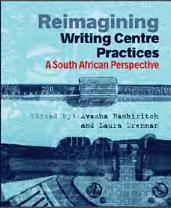
The chapter contributes to the current debate on the decolonisation of higher education raised by students during the #FeesMustFall and #RhodesMustFall movements of 2015 and 2016 by reviewing and re-imagining the Writing Centre pedagogical practices at CPUT.
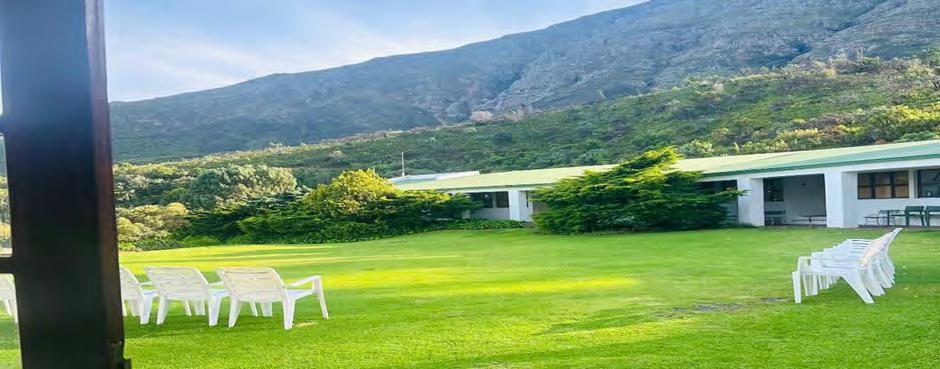
The annual writing retreat initiative organised by Dr Najwa Norodien-Fataar has once again proven to be a cornerstone in nurturing an environment conducive to academic writing and research. It is designed to support Curriculum Officers (COs) and lecturers immersed in research endeavours or completing their PhDs. The impact of the writing retreat extends beyond the immediate benefits of concentrated writing time. Participants often report a renewed sense of motivation and a more precise direction for their research upon returning to their regular academic responsibilities. The retreat’s collaborative atmosphere also helps build networks and relationships that support academic and professional growth long after the event ends.
Reflecting on the past year’s achievements, we are filled with a sense of pride and accomplishment. Fundani CHED continues to be committed to leading the way in higher education innovation, ensuring that CPUT remains at the forefront of learning and teaching excellence. Our journey is ongoing, and we look forward to the opportunities and challenges ahead, confident in our mission to enrich the academic landscape for all.
Excluding Postdoctoral Funding and Postgraduate Bursaries
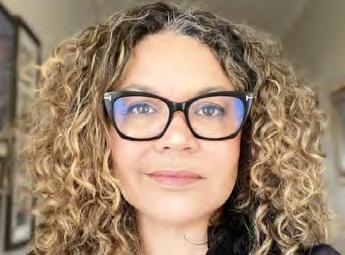
CPUT has received a substantial grant of R10.9 million from the DHET. Project leader, Dr Xena Cupido, who is also the Director: Fundani CHED, said the grant will be utilised over the next three years to support CPUT’s Vision 2030 objectives and the development of the Designing for Social Justice Partnership (DSJP) programme.
Dr Cupido said the DSJP Programme aims to promote social justice in course design and delivery by fostering collaborative partnerships between academics and students. “This 14-month cohort-based model emphasises academic community building, open collaboration, forward thinking and socially just design principles across multiple institutions. By co-creating and co-designing courses, academic–student teams will work together to enhance student success while conducting research to evaluate the effectiveness of these co-created designs.”
publications (submitted to the DHET in May 2024)
The DSJP is rooted in three key components:
- The ‘students as partners’ model, the scholarship of teaching and learning, and socially just learning design
- The ‘students as partners’ approach challenges traditional power d ynamics within universities, amplifying student voices and advocating for meaningful student participation in teaching, research and service
- By recognising students as experts in their own learning, this approach allo ws them to contribute to discussions on advancing learning outcomes, overcoming challenges and developing courses with a focus on social justice
The DSJP draws inspiration from successful programmes in Australia and the UK, but tailors its approach to the specific social context of South Africa. Students’ active involvement as co-researchers in the scholarship of teaching and learning further enhances their engagement and contributes to evidence-based practices. Dr Cupido adds that the programme will recruit two cohorts of lecturers and students from CPUT, UCT and UWC. “Through workshops, individual coaching, and peer mentoring, the project team will support the co-creation of socially just course designs, implementation, data collection and publication of research findings. Results will be disseminated through peer-reviewed publications, conference presentations and a symposium on the ‘students as partners approach’.” In the third year, a ‘Train the trainer’ scalability workshop will be held to enable participants and colleagues from other institutions to adopt and implement the programme in diverse contexts.
To ensure the success of the programme, two visiting scholars from the Schreyer Centre for Teaching Excellence at Penn State University will provide expertise and guidance. Their experience in running similar programmes at their institution will help model the ‘students as partners’ approach and contribute to the programme’s overall effectiveness. The programme holds the potential to expand the capacity of educators in South Africa to create socially just learning environments, thereby benefiting both students and society.

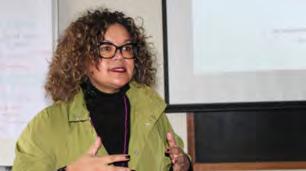
Development & Support The Unfurling Post School Education and Training (UPSET) project, established through an MoU between CPUT and DUT in May last year, has gained recognition as a pioneering initiative in the South African post-school education and training sector (PSET). Funded by DHET and supported by SAQA, UPSET aims to promote and strengthen TVET articulation to higher education and learning-and-work pathways.
Dr Najwa Norodien-Fataar, Head of the Curriculum Development Unit at Fundani CHED, stated, “The primary objective of the UPSET project is to address the critical issue of students’ learning pathways from TVET colleges to UoTs, and to establish accessible pathways that facilitate
students’ transition from TVET colleges to UoTs, enabling them to acquire industry-skilled jobs.”
Within the UPSET project, CPUT assumes the leadership role of the Western Cape Regional Hub, with other universities and TVET colleges joining as partner institutions. Dr Norodien-Fataar leads the Western Cape Hub and spearheads the project’s implementation, engaging with various faculties at CPUT to attract support for developing jointly developed higher certificates between TVET colleges and CPUT.
CPUT hosted the inaugural meeting of the UPSET: Western Cape Articulation Hub at the Bellville Campus in June. The meeting was attended by representatives from the College of Cape Town, Northlink College and various faculties within CPUT, including FAS, FEBE and FID. Prof Darren Lortan represented DUT and the UPSET project. The discussions focused on developing higher certificates in Science and Engineering, and a multidisciplinary certificate combining Design, Information Technology, and Media Studies, to be jointly offered with TVET colleges.
Dr Norodien-Fataar observed that the UPSET project builds upon the groundwork laid by SAQA and DUT, who undertook a comprehensive research project from April 2015 to March 2020. This research aimed to understand the factors facilitating students’ transition between TVETs, higher education and workplaces. One notable success story highlighted in the research was CPUT’s Higher Certificate in Information Communication Technology (ICT), which served as an exemplary model of successful articulation between TVETs and UoTs. The study revealed that
expanded access from TVETs to UoTs not only enhances education quality but also diversifies the provision of educational opportunities.
Prof Lortan emphasised the need for higher certificates to be multifaceted and stressed the importance of NSFAS funding for articulation from higher certificates to diplomas. He highlighted two main gaps in current articulation routes, namely, students who do not possess the correct subjects required for a qualification, and students who wish to articulate vertically from TVET colleges without the RPL route.
Dr Norodien-Fataar added that the UPSET project promotes TVET articulation and strengthens learning pathways between TVET colleges and UoTs, holding immense potential for transforming the South African post-school education and training sector. “Expanding access from TVET colleges to CPUT will improve the quality of education and increase the diversity of provision in the post-school sector,” she said. Director of Fundani CHED, Dr Xena Cupido, expressed excitement about being part of the UPSET project, stating, “When we received the invitation to be part of this initiative, it opened up the opportunity for us to explore how we could look at articulation and connect to TVET colleges.”
The UPSET project continues to address critical questions about students’ learning pathways from TVET colleges to UoTs, aiming to facilitate university study for TVET students and ultimately enabling them to acquire the high-level education and training needed for industryskilled jobs.
As mandated by the DHET to drive multilingual policies, Fundani CHED’s Language Unit hosted the annual Institutional Language Indaba at SARETEC in September. The indaba is a space where valuable ideas are shared on matters relating to CPUT’s Language Policy and its implementation. The Institutional Language Coordinator Dr Kabelo Sebolai stated that in current times, universities across South Africa are mandated by the DHET to steer multilingual policies. “Key to this is the expectation by the DHET that universities work towards ensuring that indigenous languages are empowered to become languages of teaching and learning.” He added that this year’s Indaba was a greater success than last year’s, especially in terms of attendance by members of the CPUT community.
Mr Ignatius Ticha, the Language Coordinator for FAS, showcased the remarkable progress in language development at CPUT, particularly within his faculty. Ms Somi Deyi, a sociolinguist and lecturer in the African Languages Department at UCT, delivered an enlightening keynote presentation on the digitisation of existing isiXhosa resources and the importance of continuing these efforts.


Dr Kabelo Sebolai, Head of the Language Unit at Fundani CHED, is one of six language professionals across all South African universities who were offered funding by the Regional English Language Office at the American Embassy in South Africa to attend two conferences in the USA in March. Dr Sebolai attended two annual conferences in Portland, Oregon. The first was held by the American Association for Applied Linguistics (AAAL), and the second by Teachers of English to Speakers of Other Languages (TESOL). Both conferences were aimed at the professional development of language professionals with AAAL being research-oriented and TESOL being more teaching inclined.
Dr Sebolai, who is also an Institutional Language Coordinator at Fundani, was attending the AAAL for the first time. “I was impressed by the wide range of language-related topics of the presentations.” This was the fourth time Dr Sebolai attended TESOL and he said it has always been a fulfilling conference. “It is much bigger than AAAL, probably because of its heavy focus on teaching. It is attended by both university lecturers and high school teachers. This is not the case with AAAL, which is attended by academics only, because of its heavy emphasis on research.” Dr Sebolai said, “My selection for the opportunity is a prestigious recognition of the work I am employed to do at CPUT.”
A trip to the USA is always a great experience for Dr Sebolai. He was once a master’s student at Northern Arizona University, and trips like these are always an opportunity to catch up with his former professors and classmates. “I met several of them at AAAL particularly. I should mention two of my former professors, Prof Bill Grabe and Prof Fredricka Stoller, whom I also met at AAAL, and who have always shown a keen interest in my contribution towards language development in South Africa.”
Academic leaders serve crucial leadership, management and administrative functions in higher education. As such, Fundani CHED has established an Academic Leadership Programme (ALP) to promote interactions between academics in various departments/faculties to enhance their professional competencies.
The programme coordinator, Dr Zanele Masuku, Academic Staff Development Unit of Fundani CHED, said ALP is designed for newly appointed HODs and acting HODs to support them in navigating their new roles in a safe space. They get to discuss their day-to-day work procedures and academic practices. ALP aims to support and capacitate newly appointed academic leaders to leadership and management positions. The programme aims to fill the gap as some HODs assume their roles unprepared for the position, and so the theme is ‘Capacitate, empower, innovate and lead’.
An event to launch the programme was held at the Bellville Campus. It commenced with an overview of academic leadership by Dr Masuku. She said the workshop was a space where HODs could share their experiences and help one another in developing robust discussions and community of practice. In her opening address, Dr Xena Cupido, Director: Fundani CHED said,“This programme marks a significant milestone in our ongoing commitment to fostering academic excellence, nurturing leadership skills, and advancing the vision of our esteemed institution as we journey towards Vision 2030.” She added that the programme had been meticulously designed to address a critical need within the academic community. “These academic leaders play a vital role in steering the ship of their respective departments, overseeing the implementation of policies, and ensuring the smooth functioning of our academic ecosystem. It is essential that they receive the support and tools necessary for success.”

Dr Siyanda Makaula, Director: Quality Management Directorate, provided an overview of CPUT Quality Matters and Processes in Learning and Teaching. Speakers also included Prof Eugene Cloete, CEO of CHEC, who spoke about academic leadership, and Dr Kabelo Sebolai of the Language Unit, who gave a presentation on language questions and epistemic justice.
maraisme@cput.ac.za
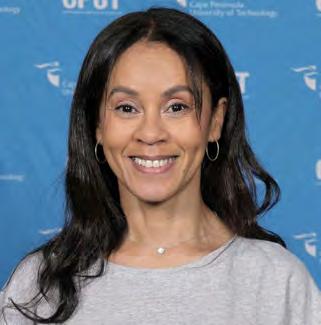
The Department of Student Health & Wellness, commonly referred to as Campus Health and HIV/Aids Unit, is located within the Division of Student Affairs. It offers comprehensive, easily accessible student-friendly health and awareness services to CPUT learners. The main office of the HIV/Aids Unit is based at the District 6 Campus and it has a satellite office at the Bellville Campus. It has a Mobile Wellness Vehicle that visits various campuses and residential spaces for health screening services. Campus Health has four clinics based in the District 6, Bellville, Mowbray and Wellington Campuses respectively. These clinics work closely with various departments including Student Counselling, Disability Unit, Sports Arts & Culture, Student Housing and the academic faculties.
The vision of Campus Health Services is to be accessible, affordable and at the centre of holistic health care and education, promoting total wellness. Its mission is to ensure practice by its code of ethics, to always maintain confidentiality and to promote health as stipulated by the World Health Organisation (WHO). The approach, in line with the WHO, is to treat students holistically, i.e. physically, mentally and emotionally. The HIV/Aids Unit’s vision is to also be at the heart of technology education and innovation in Africa. Its mission is to contribute to building a university that is highly efficient, sustainable and environmentally conscious. We want to be known for the high quality of our teaching and learning and the relevance of our curriculum. We want to contribute to creating vibrant and well-resourced living and learning environments for our students, and enhance and develop the quality and effectiveness of our research and knowledge production.
The services offered in the department (Health Clinic and HIV/ Aids Unit) include:
• General medical consultations
• TB-DOTS supervision
• Reproductive healthcare services
• Treatment of sexually transmitted infections
• Treatment support and follow-up of HIV-positive students
• Emergency response services
• Treatment of minor injuries/ailments
• Interdepartmental referrals between the unit and Campus Health
• Support during sports events
• Health screenings
• Awareness campaigns
• Reproductive healthcare services
• Internships
• Community engagement
• Peer education & student development
• Research & development
This is a year-long voluntary student development programme where students are trained as peer educators. They develop in areas such as social mobilisation for various health-related awareness and outreach campaigns such as HIV, STI and TB screening, pregnancy, alcohol and substance abuse, genderbased violence, first responder training, and engaging their peers through discussion groups within campuses and campus
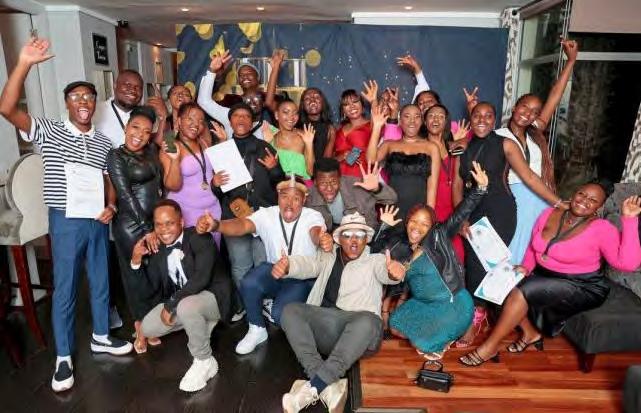
residences. Peer educators play a key role in promoting our health-related interventions and mobilising their fellow students to participate in awareness interventions.
Health screening is an integral part of the HIV/Aids Unit in terms of outreach programmes. This sets the unit apart in terms of reaching large numbers of students screened for HIV, STIs and TB.
We also screen for other health-related interventions such as voluntary medical male circumcision, gender-based violence, substance abuse and mental health, where the necessary referrals are made.
• Services provided through this programme and Mobile Wellness Services include:
• Early detection: Identifying health issues and risk factors in students at an early stage, allowing for intervention and treatment
• Preventative education: Providing opportunities to educate students about healthy behaviours, lifestyle choices and disease prevention
• Campus health promotion: Promoting a culture of health and wellbeing on campus and helping create a supportive environment for students
• Referral and support: Identifying students in need of medical and psychological support and linking them with appropriate services and resources
• Collaboration with other stakeholders and departments: Working together with various NGOs and other departments to render a holistic health service to students
• Public health preparedness: Early detection of contagious diseases, which can help with the prevention and control of outbreaks on campuses and at student residences
• Research and Planning: Data collected from health screenings can, in line with the institutional Ethics Policy, be used for research and planning of the university’s health demand and services
• Access to health services: The health screening programme serves as an easy access to health for students without causing disruptions to their academic pursuits, such as campaigns at campuses and student residences
• Data collection: Health screening data can be used to access the overall health of the student population and inform future health initiatives
Three posters were accepted for presentation at the 2023 Durban Aids Conference and two staff members represented us, including the Professional Nurse, [title name surname], and Peer Education Officer, [title name surname]. The following posters were displayed at the conference:
• Track 3 Social Behavioural Science: ‘Gender-based violence
– Conference findings from the perspective of young women in higher education within the Western Cape’
• Track 7 Youth and HIV: ‘A case study of the integration of HIV/Aids into the curriculum of courses within a higher education institution within the Western Cape’
• Track 7 Youth and HIV: ‘Innovative methods of addressing the drivers of HIV infection amongst young women at universities – A case study in the Western Cape’
Through the Directorate Research Development’s Confcom funding, the Acting HOD: Campus Health, [title name surname], presented at the International Centre for Higher Education Management (ICHEM) at the University of Bath, UK. The paper was titled ‘An investigation into health-related new product development successes through a university of technology in South Africa’.

MS LEANIE BRITS
pienaarl@cput.ac.za


Student Counselling provides a comprehensive range of services to registered and prospective students in the form of individual and group interventions. The department serves the CPUT community through various programme activities which focus on the prevention and treatment of mental health challenges and the personal development of students. These activities are supported through various partnerships with academic and support departments, and several student groups and organisations.
Peer helpers are based in CPUT residences. They are senior students who volunteer to be a source of support to other students. They assist fellow learners who may be struggling to navigate the challenges
of campus life or their academics. Peer helpers are invaluable student success partners who volunteer to be active sources of support, whilst promoting wellness in their respective living and learning spaces.
The Residence Peer Helper Programme aims to be proactive in its approach, making resources available to students in need through the presence of trained peers. They facilitate active referrals to Student Counselling when students require additional support. Peer helpers promote awareness around important mental health matters.
The Peer Helper Programme continues to expand and seeks to extend its student reach. 57 peer helpers from 18 residences were trained in this year.


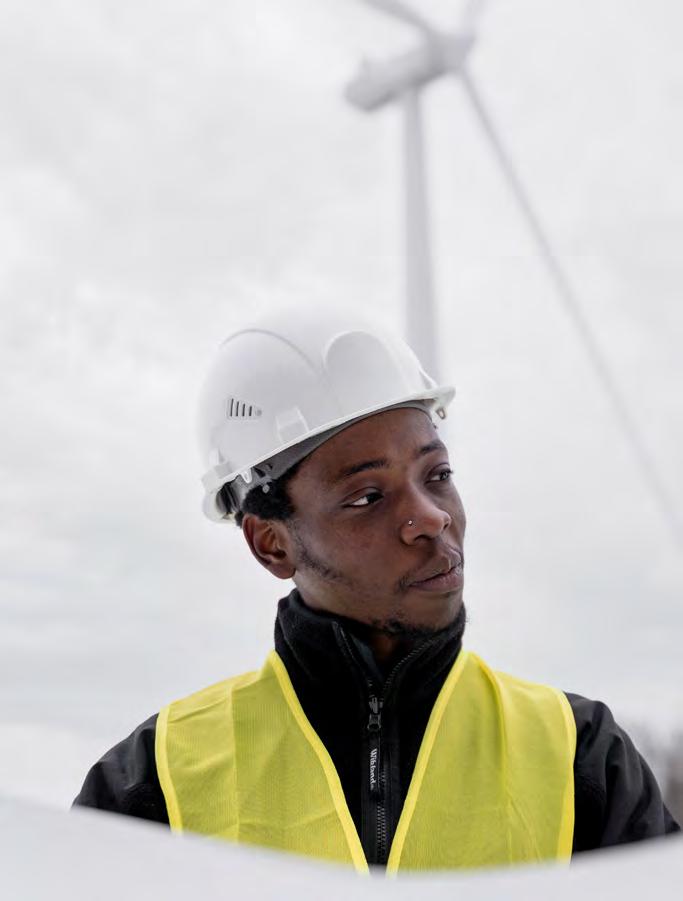




The CPUT focus area programme plays an important role in the development of research expertise and provides an institutional view of the university’s research strengths and foci.
The research focus areas provide a significant foundation for the institution’s Smart RTIP Strategy and give voice to the trans-disciplinary research approach used at CPUT. They are each populated with research niche areas to enhance CPUT’s research, technology and innovation efforts, and resources. These provide the mainstays around which capacity and strengths are developed in terms of our academic and research objectives. The research focus areas are further strengthened through the appointment of research chairs.
The choice of these focus areas and associated niche areas has been informed by:
• CPUT’s strengths
• Areas likely to make strong contributions to strategic imperatives and national priorities
• A need to support a multidisciplinary approach to research and innovation
1FOCUS AREA 1 Bioeconomy & Biotechnology
2FOCUS AREA 2 Space Science, Engineering & Technology
3FOCUS AREA 3 Smart Energy
4FOCUS AREA 4 The Environment, Climate Change & Sustainability
5FOCUS AREA 5 Human, Health & Social Dynamics
6FOCUS AREA 6
The Digital Society
The current six research focus areas are directly aligned to chapters in the South African National Development Plan (NDP) 2030 in terms of competitiveness and relevance to South Africa, and to the United Nation’s 17 Sustainable Development Goals (SDGs) in terms of competitiveness and relevance to the global earth.
FOCUS AREA 1
Bioeconomy & Biotechnology
leroesm@cput.ac.za
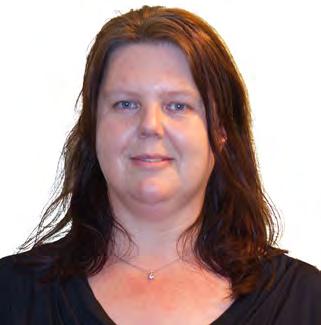
Biotechnology-based research and innovation at CPUT is aimed at achieving the objectives of CPUT’s RTI Blueprint and Vision 2030, as well as contributing to the South African Bioeconomy Strategy. This will be achieved with knowledge production aimed at benefiting local and national communities, and ultimately also supporting the growth and development of a global bioeconomy.
The goals of the South African Bioeconomy Strategy are to address health challenges; food nutrition and security; clean water; clean renewable energy with a reduced reliance on fossil fuels; a shift from a resource-based economy to a knowledgebased economy with sustainable resource management; and the protection of biodiversity. Research Focus Area 1 includes research activities within its various research niche areas aimed at addressing these goals.
In addition, a number of the UN’s SDGs are addressed through this research focus area:
Goal 2 – Zero hunger
Goal 3 – Good health and well-being
Goal 5 – Gender equality
Goal 9 – Industry, innovation and infrastructure
Goal 12 – Responsible consumption and production
Goal 14 – Life under water (biodiversity management)
Goal 15 – Life on land (biodiversity management)
The research taking place in Research Focus Area 1 aims to enhance strategic partnerships, facilitate knowledge exchange and capacity building, and stimulate socio-economic development in the target areas identified. Interconnectivity with the work taking place in the other CPUT research focus areas makes this research focus area an ideal base/starting point for multi- and transdisciplinary research.
The research niche areas that currently form part of this research focus area include:
• Biocatalysis and enzyme production
• Chemoprevention
• Community-based knowledge translation
• Energy from bioresources
• Functional foods
• Oxidative stress in health and disease development
• Natural products chemistry
• Sports performance and supplementation
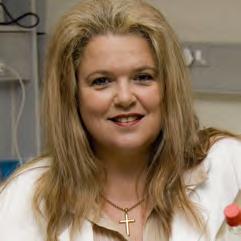
Prof Jeanine L Marnewick
(Chair: Biotechnology and Director: AMHBI)
marnewickj@cput.ac.za
The Applied Microbial and Health Biotechnology Institute (AMHBI) has a mandate to conduct excellent research with a strong multi- and transdisciplinary focus in line with CPUT’s RTI Blueprint and Vision 2030. The institute’s research is aimed at exploring South Africa’s vast microbial and indigenous flora biodiversity in finding innovative solutions to improve the overall health of our country’s communities. AMHBI strives to achieve this through integrated research in Microbial and Health Biotechnology while encouraging the development of key scarce skills in the realisation of South Africa’s Bioeconomy Strategy. The core business is focused on postgraduate training in the scarce skills areas of Biocatalysis, Biomarkers, Biotechnology, Chemoprevention, Oxidative Stress, Redox Biology, Proteomics, and related research fields, securing funding to allow for this research to take place, and the creation and dissemination of new knowledge related to these niche areas.
Message from Prof Jeanine L Marnewick, Research Chair: Biotechnology and Director: AMHBI
In 2023, AMHBI, in collaboration with our special members and national and international partners, undertook research activities aimed at addressing several key initiatives. These included the UN’s Sustainable Development Goals (SDGs), Africa’s Agenda 2063, and South Africa’s National Development Plan (NDP) 2030. We focused on both basic and applied research, employing inter-, multi-, and transdisciplinary approaches to generate new knowledge in CPUT’s niche and focus areas.
AMHBI’s contributions to the international science arena are noteworthy. Building successful international partnerships requires time and effort, with human interaction being crucial. In 2023, AMHBI staff and students excelled in fostering internationalisation through numerous international presentations and academic visits.
These collaborations and partnerships are aimed at enhancing AMHBI’s and CPUT’s global competitiveness.
This year, the AMHBI team expanded, welcoming two new junior researchers, Dr Taskeen Docrat and Dr Alaric Prins, as well as adjunct member, Prof Stephanie Burton, and affiliated member, Dr Naeem Sheik Abdul. We look forward to fruitful collaborations with them!
As always, none of these achievements would have been possible without the dedication of our staff, special members, postdoctoral fellows, and postgraduate students. I wish to thank everyone for their contributions towards achieving our goals and ensuring our longevity. You are all valued members of the AMHBI team!
The focus area and relevant niche areas within the AMHBI are aligned to address CPUT’s 10year RTI Blueprint. Focus Area 1: Bioeconomy & Biotechnology is featured within AMHBI via the following niche areas:
Niche areas within AMHBI
• Biocatalysis and enzyme production
• Biomarkers
• Chemoprevention
• Oxidative stress in health and disease development
• Wastewater remediation and reuse
Niche areas located within faculties and departments outside AMHBI
• Natural products chemistry
• Functional foods
• Sport performance and supplementation
• Health and well-being
• Environmental (air, soil and water) assessment and monitoring
During 2023, AMHBI staff, postgraduates and postdoctoral fellows contributed to 32 peerreviewed publications, including 4 book chapters and 15 conference presentations, resulting in a healthy conference-to-publication ratio of 1:2.
In true multi- and transdisciplinary nature, AMHBI staff in collaboration with CPUT faculties, and other regional, national and international HEIs, successfully supervised and/or co-supervised several postgraduate students. This resulted in one master’s degree and two doctorate degrees. Our staff currently supervise/co-supervise a total of 34 postgraduate students, 24 at master’s level and 10 at doctoral level. AMHBI researchers hosted 9 postdoctoral fellows this year, including one transdisciplinary fellow.
During 2023, AMHBI members strengthened their strategic partnerships with institutions, locally and nationally, and also across Europe, USA, Mexico, Japan and Africa to ensure alignment with CPUT’s Vision 2030.
AMHBI researchers were successful in attracting research funding to the value of R 5 656 311 for 2023 from external funders, which included the South African Rooibos Council, the Maize Trust, Rhodes University, the NRF (under various funding programmes), the Water Research Commission, CSIR/DSI, AFricaUninet, and the Technology Innovation Agency. Income received for service delivery by the institute exceeded R 1.2 million.
We celebrated a number of awards received by our staff and students on various platforms, CONGRATULATIONS to all!
• Prof Marnewick received the Hungarian Academy of Sciences’ Distinguished Guest Scientist Award.
• Prof Marnewick, Dr Docrat and Dr Sheik Abdul received an Erasmus+ mobility award for academic visit and training to the Hungarian University of Agriculture and Life Sciences in March and May.
• Dr Pamela Welz received a number of awards from the Faculty of Engineering & the Built Environment, which included a Platinum research award for Highest Paper Citation, and a Gold research award for Google Scholar H-index. She also received a Research Excellence Award for Postgraduate Supervision and a Bronze Award for Industry Funding at CPUT’s Research Festival.
• Ms Shana de Bruyn, a PhD student of Dr Lilly, received Best Doctoral Presentation Award at CPUT’s Research Festival. She was also awarded one of three winning presentations at the African Biotrade Festival in September. The prize is an all expenses paid trip to attend an international conference of her choice.
• Mr Elias Chipofya, a master’s student of Prof Marnewick and Dr Docrat, received an International Federation of Clinical Chemistry and Laboratory Medicine (IFCC) Travel Scholarship (sponsored by IFCC and Roche) to present at the 25th Wordlab–Euromedlab Conference in Rome in May.
• At CPUT’s Research Festival, various of our researchers were congratulated for their NRF ratings.
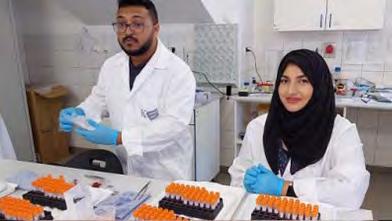

Leader: Dr Marilize le Roes-Hill
The 2023 academic year was filled with research engagements for our team. As part of our continued collaboration with the Antibiotic Accelerator Initiative (AAI) project (UK Newton Fund, UK MRC and SAMRC), Dr Alaric Prins and Prof Marilize Le Roes-Hill visited Rhodes University in April). Prof Le Roes-Hill gave a presentation titled ‘Actinomycetes diversity: To see a world in a grain of sand’ to the Department of Microbiology and Biochemistry. The talk focused not only on the continued work of the AAI team (the identification of potential new leads for the development of novel antibacterials), but also on the work focused on actinomycete enzyme discovery and application, highlighting collaborative work with the teams of Prof Rosemary Dorrington and Prof Brett Pletschke, Rhodes University, Makhanda.
Our enzyme discovery, characterisation and application work were also the focus of research presented at an EnzymeML webinar held in May by Dr Alaric Prins and Mr Max Häußler (University of Stuttgart), which focused on the ‘Systematic characterisation of the small laccase from Streptomyces coelicolor’. It was also the focus of the research presented at the 16th International Symposium on Biocatalysis & Biotransformations (BIOTRANS 2023), held in June in La Rochelle, France. Joint presentations were prepared with our collaborators from the University of Stuttgart and Forschungszentrum Jülich, Germany. The work emanated from the development of standardised protocols for the generation of good quality, reproducible enzyme data that can be converted into formats that are machine-readable and that would follow the FAIR principles of open access data.
This theme was carried through to a seminar given by Prof Le Roes-Hill to the South African Society for Biochemistry and Molecular Biology (SASBMB) in August, ‘Actinomycetes diversity: Discovery of enzymes, their application, and FAIR reporting’, as well as a joint presentation by Prof Le Roes-Hill, Dr Alaric Prins, and Mr Max Häußler (University of Stuttgart) at a specialist workshop on EnzymeML. The 4th EnzymeML workshop was held in September at the Jagdschloss Niederheim, Rüdesheim and organised by Dr Carsten Kettner (Beilstein Institute, Germany) and Prof Dr Jürgen Pleiss (University of Stuttgart).
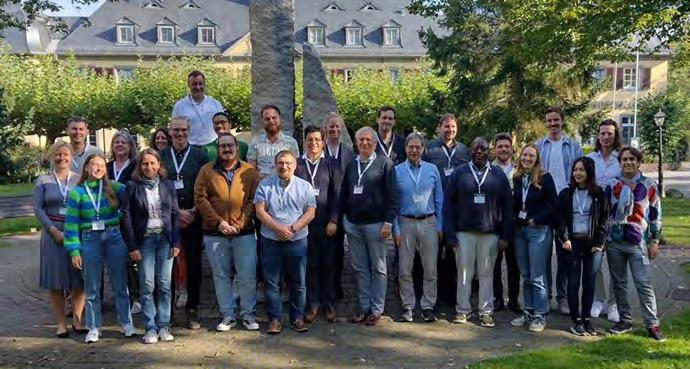
The 22nd Biennial Congress of the South African Society for Microbiology (SASM 2023) was held in Stellenbosch in September. Members of our team participated in two oral
presentations (Dr Jo-Marie Vreulink and Dr Alaric Prins) and one plenary presentation (Prof Le Roes-Hill). The work exhibited covered marine actinobacterial diversity studies, the search for novel antimicrobials, as well as enzyme discovery, and the development of a robust and reproducible workflow for the characterisation of new enzymes.
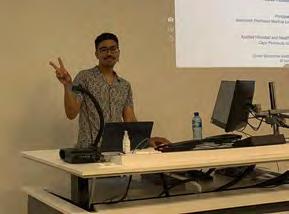

Biomarker development research is integrated in the Rooibos and Heart Health CPUT Prestigious Project within the Oxidative Stress in Health Promotion and Disease Development niche area of the Focus Area: Bioeconomy & Biotechnology. The initial phases of this clinical study were completed in 2022. The health benefits of Rooibos herbal tea have been ascribed to the high and unique polyphenol content of this South African beverage. Urine samples were collected from the clinical trial participants before the start of the study and following their consumption of green and fermented Rooibos. In 2023, these samples were analysed for the known Rooibos phenolic components by targeted LC-MS analyses at the Central Analytical Facilities of SU. Additional untargeted LC-TOF-MS/MS analyses have still to be mined for the phenolic metabolites to find possible biomarkers of effect.

As part of our ongoing NRF-funded project focused on marine enzymes and their application in bioremediation and beneficiation, our team became involved in a research project developed by the University of Stuttgart. Prof Le Roes-Hill was invited to give a presentation linked to the work emanating from the collaboration. The presentation ‘Making sense of disorder: The multicopper-oxidase (MCO) PyEED vs the MCO-like PyEED’, was given at the 2nd PyEED (Python-based Enzyme Engineering Database) Workshop, organised by the University of Stuttgart (online Webex meeting) in October.
For more information on the EnzymeML project, please visit https://enzymeml.github.io/services/, and for more information on the PyEED project, please visit https://github.com/PyEED/pyeed?tab=readmeov-file.
Dr Van der Westhuizen attended several virtual conferences, workshops and webinars on biomarkers, ethics, artificial intelligence, and other related fields. She is the Co-chairperson of the Institutional Animal Research Ethics Committee, and a member of the Faculty Health & Wellness Sciences HDC and Research Ethics Committee. She is the supervisor of two MSc and BHSc IV students in the Department of Biomedical Sciences.
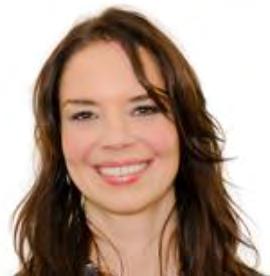
Leader: Dr Mariska Lilly
During 2023, the project exploring the potential antiinflammatory properties of Rooibos against UVB-induced skin damage has made significant strides. Thanks to funding from the TIA, a pilot study was initiated for the development of a Rooibos phenolipid. This innovative study aims to enhance the absorption and bioavailability of polyphenols to modulate inflammation. The implications of this research extend beyond skincare, as the developed phenolipid holds promise for addressing gut inflammation and may find applications in various cosmetic and nutraceutical products. Additionally, Ms Shana de Bryn, a dedicated PhD student within Dr Lilly’s research group, showcased her research on ‘The role of Rooibos in improving gut health’ at the African Biotrade Festival held in Johannesburg in September. Ms de Bryn’s exceptional work garnered recognition, as she received one of three prestigious awards, granting her the opportunity to attend an international conference of her choice. Furthermore, Dr Lilly was honoured with an invitation to present their research on Rooibos and skin health at the South African Rooibos Council Health & Beauty media day in November.
Collaborative efforts from Dr Lilly’s team with the Agricultural Research Council’s Infruitec and Tokyo University of Agriculture and Technology (TUAT) have yielded promising results. Funding for a study focusing on utilising nano-phytosomes as a delivery system for Honeybush anti-allergic and antiinflammatory bioactives has been secured for 2023 and 2024 through the NRF SA–Japan bilateral agreement. In furtherance of collaborative efforts, a delegation of TUAT researchers and students visited Cape Town in September. Impactful seminar sessions were conducted, providing a platform for researchers from TUAT, CPUT and the ARC to present and discuss their research progress.
Additionally, Dr Lilly visited Japan in November, where a series of informative seminars were delivered by all participating parties at TUAT, facilitating the exchange of knowledge and insights among researchers. The collaborative visit extended beyond academic discourse, encompassing visits to the Plant Factory and greenhouses where various medicinal plants of significance in Japan are cultivated. A comprehensive tour of the animal facility at TUAT provided valuable insights into the research infrastructure. Moreover, the visit included exposure to green tea plantations and processing plants in the Shizuoka Prefecture, offering a firsthand understanding of cultivation and processing methods associated with green tea production. This multidimensional experience strengthened research ties among participating institutions and contributed significantly to the overall objectives of the collaborative research initiative.
Mycotoxin research in the niche area continues with the inhibition of mycotoxin biosynthesis by mycotoxigenic fungi utilising South African herbal teas with the development of bio-control models. The niche area also secured THRIP funding in collaboration with BIOTIKUM at the end of 2023 for the development of a probiotic for cattle/dogs to promote gut microbiome health. This represents a promising advancement in animal nutrition and health management. It has the potential to positively impact animal welfare, reduce dependence on antibiotics, and improve productivity and sustainability within the industry, while aligning with evolving consumer preferences and regulatory requirements. This project is set to commence in 2024.
The progress made in 2023 reflects our commitment to advancing scientific knowledge, fostering collaboration, and addressing pressing global challenges.

Leader: Prof Jeanine L Marnewick
The research focus of this niche area is oxidative stress and its involvement in the aetiology of many diseases, including cardiovascular, metabolic and neurodegenerative diseases, and their prevention and/or delay via the use of indigenous medicinal plants, such as the proudly South African herbal tea, Rooibos.
Highlights of 2023 include an academic visit by team members, Prof Marnewick, Prof Engel-Hills, Dr Docrat, Dr Sheik Abdul and Mr Kamati of the Africa Uninetfunded project. We presented ‘The impact of Covid-19 on neuropsychological functioning and late-life dementia risk: The role of inflammation and oxidative stress’ to our collaborators, Prof Dr K-H Wagner and colleagues, Dr Agnes Draxler and Ms Laura Bragagna from the University of Vienna. It was a very successful meeting, and there are future projects in the making!

Prof Marnewick, being a recipient of the Hungarian Academy of Sciences’ Distinguished Guest Scientist Award, joined the research group of Prof Dr M Kovacs from the Hungarian University of Agriculture and Life Sciences for a 3-month period to conduct a joint research study involving Rooibos. Earlier in the year, two members of AMHBI, Dr Docrat (junior researcher) and Dr Sheik Abdul (affiliate member) visited the research group of Prof Dr Kovacs, where they joined in on the laboratory activities as part of the experimental study.
Prof Marnewick also delivered a keynote address at the launch of the Cannabis Indaba in Cape Town, providing an overview of the health research on Cannabis and the CanPlan for the agricultural sector.
One of our master’s students Mr Elias Chipofya received an IFCC Travel Scholarship designated to allow young scientists from selected countries to attend and present at the 25th Wordlab–Euromedlab Conference held in Rome in May. He presented outcomes stemming from his master’s project, ‘The neuroprotective effects of Rooibos extracts against hydrogen peroxideinduced oxidative stress in human neuroblastoma SH-SY5Y cells’.
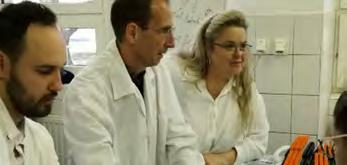
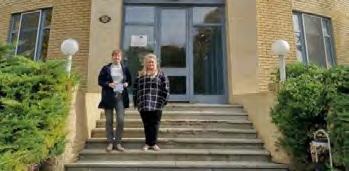
In 2023, this niche area welcomed Dr Docrat, a junior researcher, and Dr Reddy, a postdoctoral fellow. They bring their expertise to the area, enhancing and expanding the research taking place here. Dr Docrat was also invited by the South African Rooibos Council to share our research on Rooibos and cognitive health at the Rooibos Health and Beauty Briefing held at the Mount Nelson, in Cape Town. Dr Docrat was invited to the South African Rooibos Council Health & Beauty media day hosted in November to present her research titled ‘The abili “tea” of Rooibos to protect against Alzheimer’s disease: From bench to bedside’.
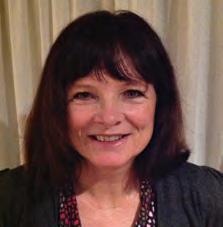
Leader: Dr Pamela Welz
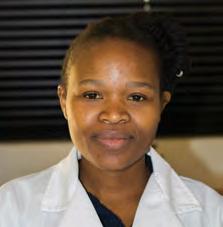
Co-leader: Dr Thandeka
Mthethwa
The group focuses on the remediation and/or valorisation of solid and liquid waste. The research is funded by the WRC, the CSIR and the NRF. The current projects are mainly centred around beneficiation of agri-industrial and industrial wastes, and are conducted in collaboration with industry partners from the edible oil, winery, maize wet-milling and tanning industries. As part of the THENSA niche area Waste Management and Circular Economy that focuses on synthesis and degradation of bioplastics, the group is performing novel research on the use of Canola fines and starch-rich waste for microbial and chemical synthesis of bioplastics.
Other projects include:
• Phytoremediation of pre-treated tannery effluent using native algal species
• The effect of inoculum source and acclimation of the efficiency of anaerobic digestion of agri-industrial wastewater sludge
• The use of bimetallic nanoparticles against fungi isolated from contaminated maize
• Nanostructure engineering of graphitic carbon nitride for catalytic reduction of nitroarenes and visible light photocatalysis
Six manuscripts, one book chapter and two WRC technical reports authored/co-authored by members of the group this year. Two doctoral students, Dr Ashton Mpofu and Mr Gareth Holtman, graduated. Their theses were titled ‘Anaerobic treatment of tannery effluents for resource recovery in a circular bioeconomy’ and ‘Sand-based system for physiochemical and biological treatment of winery wastewater’ respectively. In addition,
one master’s student, Mr Mfundisi Thobejane (MTech: Environmental Health) graduated with his thesis titled ‘Influence of seasonality, wastewater treatment plant process, geographical location and environmental parameters on bacterial community composition in selected South African wastewater treatment plants’.
Two young AMHBI researchers gained valuable experience through a joint experiment in Hungary. Postdoctoral fellow Dr Taskeen Docrat and adjunct scholar Dr Naeem Sheik Abdul, supported by an Erasmus+ Research Mobility Grant, joined the research group of Prof Melinda Kovács, Director of the Institute of Physiology and Nutrition. This collaboration is part of an international partnership with AMHBI PI Prof Jeanine Marnewick.
The two research groups are investigating whether the active constituents in Rooibos have a protective effect on animals exposed to mycotoxins. Dr Docrat and Dr Sheik Abdul spent a week at the Kaposvár campus of the Hungarian University of Agriculture and Life Sciences (MATE) in June. Prof Marnewick emphasised that shared research activities like this enhance the global competitiveness of both institutions. “I am grateful that our young and upcoming researchers can partake in these types of activities, shaping them for their future careers in science. We currently have an agreement in place with MATE supporting these research activities and mobilities,” she said.
Dr Docrat noted that the collaboration fostered a spirit of teamwork and cooperation. “Collaborative efforts have the potential to yield more comprehensive and impactful results compared to individual endeavours. By pooling our resources, expertise and data, we are collectively working towards a common goal of understanding the potential protective effects of Rooibos tea against mycotoxin-induced oxidative stress,” she explained. “Professionally, this collaboration has been a transformative experience. Working alongside experts from MATE University in Hungary has exposed me to their cutting-edge research methodologies, stateof-the-art facilities, and scientific expertise.”

Dr Sheik Abdul commented on the significance of interdisciplinary approaches and the importance of accessing expertise across borders. “I was also exposed to new techniques and methods that expanded my skill set. Collaborating with experienced scientists in the field has been an invaluable learning opportunity, allowing me to gain insights into new project management practices and refine my research approaches,” he said.
A PhD student who presented at the African Biotrade Festival was overjoyed to win a prize to attend an international conference of her choice next year, all expenses paid. Ms Shana de BuynOrr is a third-year PhD student at AMHBI. The title of her presentation was ‘Rooibos improves gut health!’ She is supervised by Dr Mariska Lilly and her co-supervisor is Dr Stefan Abel.

Ms de Buyn-Orr was selected to take part and present the research at the African Biotrade Festival held in Sandton in September. “It really was an amazing feeling. The group as a whole did so great. It really was a privilege to just be at the festival, and winning was the cherry on top. was thrilled for the opportunities it provided, not only to travel but the people we met and got to collaborate and interact with was remarkable. I am grateful.” She said the focus of her PhD is to use indigenous herbs, in her case Rooibos, to improve gut health. “I am looking at the health benefits of both green (unfermented) and red (fermented) Rooibos tea. Additionally, we want to assess the antiinflammatory and barrier-restoring properties of the tea.”
Ms de Buyn-Orr is still deciding which conference to attend but would love to attend a phytomedicine or herbal medicine conference. “I would love to take our indigenous plants to the international platform. Yes, Rooibos is well-known worldwide, but I would like to add to that, providing a medical approach.”

Prof Merrill M Wicht
wichtm@cput.ac.za
The Crystal Engineering Unit is a research group focused on the field of crystal engineering, which involves the design and synthesis of molecular solids with specific properties. The unit’s work contributes to advancing understanding in materials science and chemistry, aiming to develop new materials with tailored properties for various applications.
The year 2023 started off slowly with fewer postgraduate students and the loss of one of the newer members of the team, Dr Dumisani Kama, who unfortunately returned to the Free State. The elective subject, Supramolecular Chemistry, continued in the Advanced Diploma in Analytical Chemistry course for the second year, coordinated by Prof Báthori, with assistance from lecturers Prof Jacobs, Prof Wicht and Dr Kama.
Researchers in the group have contributed their skills in various different areas. Prof Báthori, a member of the Molecular and Materials Structure working group of the Hungarian Academy of Sciences, is the Vice President of the South African Chemical Institute (SACI) for 2023 to 2025. Prof Jacobs, serving on the faculty research committee and managing the department’s research, obtained a C2 NRF rating. Prof Wicht, the current HOD of Chemistry, has concentrated her time on the department’s duties. Equipment in the Crysal Engineering laboratory is used to assist with a number of requests in the institution for X-ray diffraction studies.
Prof Jacobs’ current research projects involve studying the solid forms of bioactive compounds with various conformers with applications in improving the physicochemical properties of target compounds such as vanillic acid and 3-chloro4-hydroxyphenylacetic acid. Vanillic acid is a flavouring agent and has antioxidant properties. Master’s student Ms Celestine Nyingika Tshahwa is studying selected multicomponent crystals of vanillic acid. An earlier study with a previous master’s student Mr Remi Rolland Ngoma Tchibouanga resulted in a publication in Molecules which focused on fungal metabolite 3-chloro-4-hydroxyphenylacetic acid.
Prof Báthori was a member of the organising committee for the 44th SACI National Convention in Stellenbosch in January. She presented a poster titled ‘Superparamagnetic iron oxide nanoparticles (SPIONs) for the reduction and removal of organic dyes from aqueous solutions’ at the 33rd CATSA Conference in Mossel Bay in November. She also published a review article in Colorants and a book review in Crystallography Reviews
Prof Wicht delivered an oral presentation on ‘The coordination and interactions of transition metals’ at the Pan African Conference on Crystallography (PCCr3) in Nairobi in January.
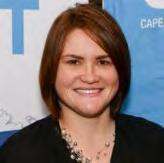
Prof Maretha Opperman oppermanm@cput.ac.za
The Functional Foods Research Unit (FFRU) was established in 2009 and is part of the Faculty of Applied Sciences, Department of Biotechnology & Consumer Science. The FFRU’s aim is to translate research results on essential fatty acids and micronutrients into new and improved functional food products with functional food characteristics for health promotion and disease prevention in South Africa.
The FFRU’s strategic objectives are multifaceted, emphasising both scientific innovation and community impact. Our research is focused on exploring the health benefits of essential fatty acids and selected micronutrients via clinical trials as well as exploration of food waste and indigenous plants for their potential beneficial health effects. We are also fostering partnerships with government agencies, other South African tertiary institutions, and international research institutions. These collaborations are important to ensure the practical application of research findings, securing funding for ongoing research studies, and aligning the unit’s objectives with national and global health priorities.
The FFRU team
The FFRU team comprises the leader
Prof Maretha Opperman, laboratory technician
Ms Buhle Mpahleni, and administrative assistant
Ms Angie van Niekerk.
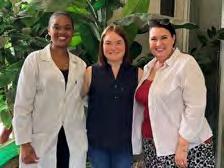
DHET-accredited journal publications
• ‘Nutritional status assessment and the subsequent intervention with a red palm oil biscuit on the nutritional status of pre-school children attending informal crèches, in the Eastern Cape, South Africa’, in African Journal of Food, Agriculture, Nutrition and Development, 23(4) https://doi.org/10.18697/ajfand.119.21685
• ‘Sociodemographic and lifestyle factors and the risk of metabolic syndrome in taxi drivers: A focus on street food’, in Frontiers in Nutrition, 10 https:// doi.org/10.3389/fnut.2023.1112975
• ‘Three decades of research on Centella asiatica: Insights and future trends from bibliometric analysis’, in Journal of Herbal Medicine, 39 https://doi.org/10.1016/J.HERMED.2023.100662
Dr Derrick Sekgala graduated from UWC with a PhD in Public Health. The title of his thesis was ‘Metabolic syndrome and the risk of consuming street food among commercial taxi drivers in South Africa: A cross sectional study’.
Partnerships and collaborations
South African Government
Department of Forestry Fisheries and the Environment
Other tertiary institutions
Unisa, University of the Free State, UCT
International research institutions
Institut de Recherche pour le Développement, Montpellier, France
Research funding and grants
2023 to 2025 – NRF SAASTA funding
The project title is ‘Empowerment of subsistence fisher women of the Weskusmandjie cooperative to produce, identify and market safe food products: Participatory research addressing poverty relief, job creation and zero hunger’. The collaborators are Prof Elizabeth Kempen (Unisa), Dr Suné Henning (CPUT’s Department of Food Science & Technology) and Ms Rache Hanekom (CPUT’s Department of Biotechnology & Consumer Science).
Weskusmandjie is a collective of small-scale fisherwomen from Steenberg’s Cove on the West Coast. Their goal is to revive pride in their indigenous cultural heritage by sharing their knowledge and passion for the ocean, arts and crafts, and sustainable resources. This collective transforms traditional West Coast recipes into delicious marine-sourced products like bokkom bites, sea lettuce salt, curried fish, pickled mussels and limpets. The women also sustainably collect seashells and other natural materials to create beautiful handmade arts and crafts. With their ambition to revive local traditions, they develop and trade in an assortment of handmade crafts and shoreline harvests that draw on their traditional bio-network. Weskusmandjie envisions itself as a sustainable small business model that could be replicated by other groups of women along the West Coast.





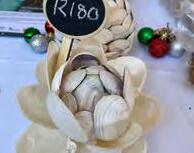
NRF National Equipment Programme Grant
Gas chromatography – Flame ionisation detection tandem mass spectrometry: Several research projects are planned for this equipment for 2024. These include fatty acid analysis in seaweeds and mussels as well as a clinical trial on Rooibos (in collaboration with Prof Jeanine Marnewick).


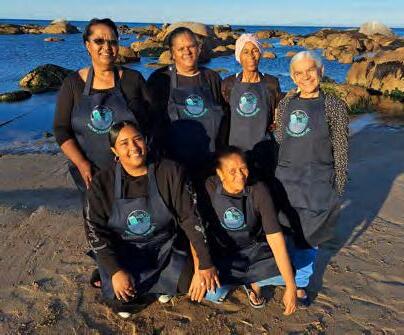


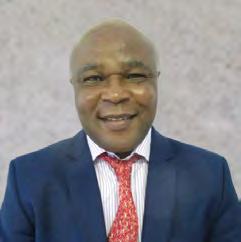
Prof Vincent Okudoh
Co-principal Investigator, Applied Sciences
okudohv@cput.ac.za
Responsible for (sub-units):
Waste2Energy
Biofuels
Materials Sciences
Environmental Biotechnology
Dr Moses Basitere
Co-principal Investigator, Engineering & the Built Environment moses.basitere@uct.ac.za
Responsible for (sub-units):
Agrifood/Agrowaste
Wastewater/Water Engineering – Poultry slaughterhouse and dairy wastewater
Faculty of Applied Sciences and Faculty of Engineering & the Built Environment
Introduction
The Bioresource Engineering Research Group (BioERG) was conceptualised and established under the leadership of Prof Seteno Ntwampe together with two co-principal investigators, Dr Moses Basitere and Prof Vincent Okudoh. The resignation of Prof Ntwampe in December 2019 led to the appointment of Dr Basitere as co-principal investigator responsible for Water & Wastewater Treatment and Agricultural Waste Recovery research; and Prof Okudoh as the coprincipal investigator responsible for the Waste-to-Energy research.
Vision and mission
BioERG has continued to operate according to the same vision and mission. The Vision is to be a research centre of excellence committed to technological innovation through bioresource engineering for economic and environmental well-being in Africa. The Mission is to commit to the advancement of applied natural resources knowledge through excellent teaching, learning and
research. This can only be attained through the dedication of all stakeholders who support the initiatives of the research group.
Throughout 2023, BioERG achieved significant milestones and collaborations, underscoring its commitment to excellence and innovation:
Leadership updates
• Prof Basitere was promoted to Associate Professor at UCT towards the end of 2023.
• Prof Basitere has been nominated as Co-chair of the South African Young Academy of Science.
• Prof Basitere received the Silver Award for Student Supervision from CPUT’s Faculty of Engineering & the Built Environment.
• Prof Okudoh has been nominated as a member of the Institutional Business Continuity Strategy: Cluster on Energy & Climate
Change, reporting to DVC: RTIP on climate change effects on the operations of CPUT, including but not limited to water provision, fire hazards, and adverse weather conditions.
Research output
Two journal papers were published under Prof Moses Basitere, and three journal papers were published under Prof Okudoh, showcasing the group’s scholarly contributions.
Student achievements
• In 2023, BioERG successfully graduated one PGDip Hons, two master’s degree students, and one doctoral student under the supervision of Prof Basitere and Prof Vincent Okudoh.
• Noteworthy graduates include Mr Elvino Norjies and Ms Nthabeleng Vanqa, both achieving cum laude honours in MEng Chemical Engineering, and Ms Cynthia Dlangamadla, who completed her doctoral degree.
• Mr Ulrich Kabamba Mudiayi graduated with a PGDip Hons from the Department of Biotechnology & Consumer Science. He was supervised by Prof Okudoh and Dr Maxwell Mewa. His thesis was titled ‘Isolation of anaerobic fungi from cattle’s rumen for pretreatment of selected lignocellulosic waste for biofuel production’.
Collaborative Research
BioERG maintained collaborative research endeavours with various local and international universities, including UCT, University of Mpumalanga, Namibia University of Science and Technology (NUST), NWU, UKZN, SU and the University of Maribor.
• ‘Biodefoamer-supported activated sludge system for the treatment of poultry slaughterhouse wastewater’, in Applied Sciences, 13(16)
• ‘Production, application, and efficacy of biodefoamers from bacillus, aeromonas, klebsiella, comamonas spp. consortium for the defoamation of poultry slaughterhouse wastewater’, in Water, 15(4)
by Prof Okudoh and his research team
• ‘Sorghum stover and winery solid wastes codigestion: Application of iron oxide nanoparticles for biogas yield optimisation’, in Discover Water, 3(21) https://doi.org/10.1007/s43832-023-00047-9
• ‘Nepenthes mirabilis pitcher fluid functionality for agro-waste pre-treatment: Effect of pH, temperature, trace element solution and the pore size of the waste’, in Sustainability, 15(5) https://doi. org/10.3390/su15053906
• ‘In vitro antioxidant mechanism of action of hibiscus sabdariffa in the induction of apoptosis against breast cancer’, in Journal of Herbs, Spices & Medicinal Plants, 29(3) https://doi. org/10.1080/10496475. 2022.2135661
• Dr Jane Smith delivered an oral presentation titled ‘Addressing diversity using multilingual pedagogical approaches in food microbiology classroom’ at the 11th Annual Research and Innovation in Teaching and Learning (RITAL) 2023 Conference. The conference was held under the theme ‘Inclusive
digital futures: Addressing diversity in a tech-driven world’, and was organised by Fundani CHED. It was held on the Granger Bay Campus in November
• Prof Okudoh was a guest speaker at the 2nd International Conference on Water in Africa (ICWA) & Workshop on Water Testing in Rural Environments for Disease Control, held at the University of Nigeria, Nsukka in June. The conference was organised by the Water and Public Health Research Group, University of Nigeria, Nsukka; Our Water and Health Network Africa (OWHNA); and the International Water and Health Alliances (IWHA). His topic was ‘Turning research into action: Implementing sustainable strategies for abattoir effluent and winery wastewater management’.
• Prof Okudoh attended a workshop titled ‘Ignite the use of biogas towards the achievement of the Paris Climate Goals and SDGs’, which was organised by UNIDO in June https://www.unido.org/events/igniteuse-biogas-towards-achievement-paris-climategoals-and-sdgs
• Dr Basitere received an NRF BAAP Grant of R400 000.
• Prof Basitere was honoured with the UCT College of Fellow Award for outstanding research performance as a young scientist, receiving R30 000.
BioERG’s achievements in 2023 underscore its dedication to excellence in bioresource engineering research. With continued collaborations, scholarly contributions, and recognition, the group remains poised to contribute significantly to technological innovation and environmental sustainability in Africa for many years to come.

Prof Ahmed Mohammed mohammedam@cput.ac.za
The Natural Products Chemistry Research Group is dedicated to unlocking the potential of Cape flora and discovering new active agents as scaffolds for developing novel, safe, and potent drugs.
The group focuses on traditional natural product chemistry for isolating and identifying new bioactive compounds, targeting various biological activities such as neuroprotection, anticancer properties, and protection against skin-related diseases. They also research the synthesis of metal nanoparticles using pure natural products for biomedical applications. Some natural compounds (capping agents) can reduce metal salts and stabilise formed nanoparticles, contributing to their final bioactivity and biodistribution in biological systems. The group aims to design new conjugates for biomedical applications, particularly for cancer diagnosis and treatment.
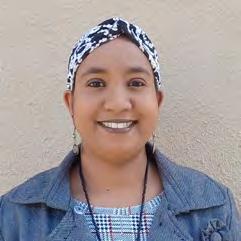
Dr Samantha Meyer
meyers@cput.ac.za
The aim of this research group is to investigate the potential antimicrobial and wound-healing properties of indigenous South African plant extracts and biogenic metal nanoparticles produced from these plant extracts.
The principal investigator for this group is Dr Samantha Meyer, a senior lecturer in CPUT’s Department of Biomedical Sciences. Her collaborators include Prof Mervin Meyer (UWC), Prof Abram Madiehe (UWC), Prof Martin Onani (UWC), Dr Lulama Mciteka (UWC), Dr Nicole Sibuyi (Mintek) and Dr Adewale Fadaka (CCHMC, USA).
Two young women scientists graduated in 2023 under the supervision of Dr Meyer. They are Ms Caroline Tyavambiza (a recipient of the VC’s Prestigious Achievers Award), who graduated with her PhD in April, and Ms Fay Manuel Swanson, who graduated with her MSc in December.
Dr Meyer was a second-time recipient of the CPUT Teaching Excellence Award in recognition of her outstanding performance in both the undergraduate and postgraduate teaching and research programmes.
The eNCA news channel did a special feature on research at CPUT’s Department of Biomedical Sciences. The interview with Dr Meyer and colleagues was broadcast on national television in December.
The research group published the following peer-reviewed research output this year: DHET-accredited journal articles
• ‘The effect of first-line TB treatment on carbapenemresistance in faecal Enterobacterales ’, in Journal of Medical Laboratory Science & Technology of South Africa
• ‘Anticancer and drug-sensitizing activities of gold nanoparticles synthesised from Cyclopia genistoides (honeybush) extracts’, in A pplied Sciences
• ‘Anticancer, antioxidant, and catalytic activities of green synthesized gold nanoparticles using avocado seed aqueous extract’, in ACS Omega
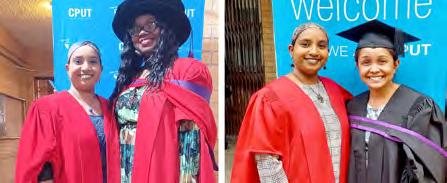
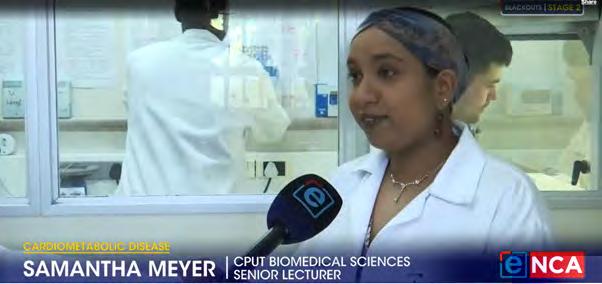

Mr Ndumiso Mshicileli
mshicilelin@cput.ac.za
The Agrifood Technology Station (ATS) is a platform that provides a range of interdisciplinary technological services to the agrifood sector, focusing on existing smaller and medium enterprises, with a view to improving competitiveness and innovation as well as research and development capacity in a sustainable manner.
• ‘The cytotoxicity of Cotyledon orbiculata aqueous extract and the biogenic silver nanoparticles derived from the extract’, in Current Issues in Molecular Biology
Book chapter
The group also co-authored a chapter titled ‘Carbon dots in drug delivery’, in the book Carbon Dots in Biology: Synthesis, Properties, Biological and Pharmaceutical Applications.
Funded by the Technology Innovation Agency (TIA), an initiative of the Department of Science & Innovation (DSI), ATS offers a wide range of services that can assist food and related companies in developing, enhancing and maintaining safe, efficient and cost-effective food production and processing.
Strategically situated at the Department of Food Science & Technology (DFST) on the Bellville Campus, ATS offers its clients access to the
pilot plant, analytical and research laboratories, processing areas, and general and cold stores. This technology station is a source of support for postgraduate research within the higher education fraternity. ATS also extends its reach to communities by providing various tailor-made training workshops on value addition and food safety.
1. Partenership with SA Agri Academy
A strategic goal was set last year to expand ATS visibility beyond the Western Cape. In light of this, ATS partnered with the SA Agri Academy this year to provide technology transfer in form of training workshops. These were presented to a group of individuals with learning challenges
from the Northern Cape Mental Health Society (Yonder) in Kimberly. These workshops comprised Food Safety & Hygiene (good manufacturing practices), Fruit & Vegetable Processing, and Dairy Processing, and took place in February.


Similarly, a technology and skills transfer project was presented by ATS staff to a group of individuals affiliated with Amadlelo Agri (dairy farms) as shareholders in the Eastern Cape in July. The focus was on Good Manufacturing Processes, Food Safety, and Dairy Processing (yoghurt making).
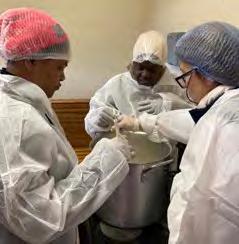
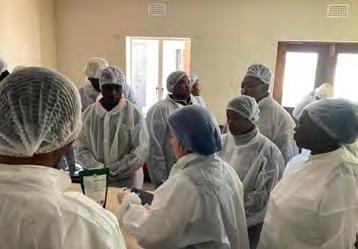
ATS, DFST and the dean of the Faculty of Applied Sciences (FAS) represented CPUT in co-organising an online conference titled Science for Impact in Africa, with the theme ‘Bridging the gap between academia and societal needs in agri-food systems’. This was presented in May in partnership with five other international universities. Dr Suné Henning (a senior lecturer in DFST), Prof Jessy van Wyk (HOD: DFST) and Mr Ndumiso Mshicileli (Manager: ATS) presented on selected topics with Prof Joseph Kioko, the Dean of FAS, co-chairing one of the sessions of the conference.
4.
ATS participated in The Plant Powered Show for the first time this year. The technology station showcased its technology support to SMMEs and entrepreneurs who developed plant-based products through its technology transfer and research and development support. The event took place at CTICC in May.
ATS staff also attended and exhibited at the South African Association for Food Science & Technology in August. One of the staff members, Ms Bongisiwe Zozo, presented a poster on her PhD studies.
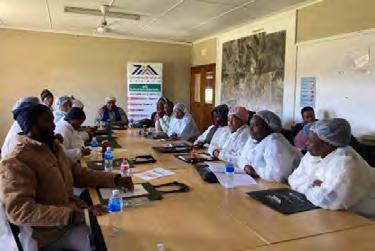
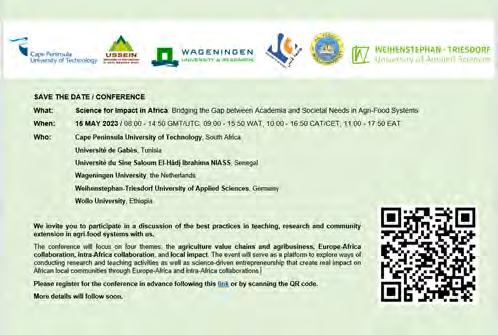

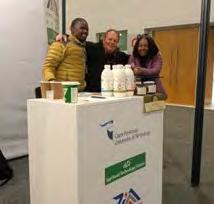

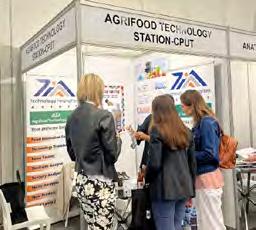
ATS was invited and exhibited at the VC’s Business & Industries Engagement in November.
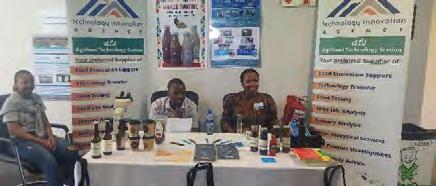
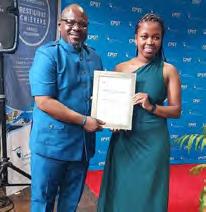
Ms Zozo, who is registered for PhD in Chemistry, became one of the recipients of the VC’s Prestigious Achievers Awards in November.
5. Notable highlights in terms of projects conducted during 2023
a. Equipment funding and procurement
Equipment funding of approximately R3 million was received from DSI for the replacement of obsolete equipment and procurement of new equipment. From this, two tenders were awarded for the purchase of two important pieces of equipment, namely, the Differential Scanning Calorimetry (DSC) coupled with an autosampler and a Pilot Scale Spray Dryer. The DSC was delivered in December, and the spray dryer is expected to be delivered in May next year.

b. Research projects involving product development
- Spicy Bulldog (production and processing of sauces e.g. hot sweet chilli sauce): Heat processing. Spicy Bulldog products that were developed in our facilities with the assistance of ATS were exhibited in Nairobi and Moscow in September.




- Buttercup Farmhouse: New product development. This was initiated by a partnership with the Western Cape Department of Agriculture.


- An ATS client based in the Eastern Cape was awarded a grant funding of R260 000 by the TIA’s Grassroots Innovation Programme after our assistance and intervention in producing prototypes. The funding will be applied in further technology development and improvement of the client’s products.


- GenZone with UCT Postgraduate students: Development of Biltong Bar biltong bites. This project can easily be classified as waste beneficiation as the bites were developed from a meat factory’s off-cuts.



- Amino Acid method development: HighPerformance Liquid Chromatography (HPLC) is used to separate, identify, and quantify amino acids in various samples, which is crucial for food science and technology applications.


- The Western Cape Indigenous Knowledge Systems Documentation Centre (WC-IKSDC) was located within ATS until the end of July, with the Manager of ATS serving as the Project Manager. Upon completing the project with the Attaqua Community, a strategic decision was made to place the centre under CPUT’s DFST starting in August. Activities then commenced with a new community. The project with the Attaqua Community concluded by the end of July, with a hand-over ceremony held in May. A laptop containing the archived database was presented by DSI and CSIR.

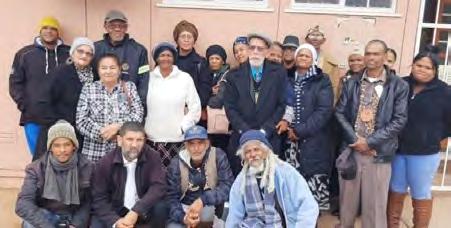
With DFST’s extensive experience in community work through Service-Learning projects, particularly with the West Coast community entity Weskusmandjie, the centre is poised for success. As of August, Prof Jessy van Wyk has assumed the role of Project Manager.
- Chocolate making: A two-day chocolate-making workshop themed ‘Season’s Greetings’ was held in November, in partnership with Cocoa Emporium. The attendees were mainly women from various areas of the Western Cape.
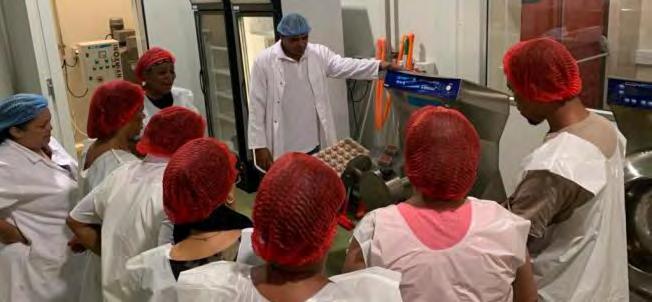

- Collaboration with AMANINA: ATS fostered a relationship with a local cooperative based in Gugulethu to provide them with knowledge sharing and technology transfer through training workshops in May. Long-term objectives are to assist this group of women to develop, analyse and process their own products. Activities included a Good Manufacturing Process, Food Safety & Hygiene Workshop and Dairy Processing – yoghurt making.

A second intervention involved a 2-day cheesemaking workshop in September, for representatives of different cooperatives in the Western Cape including AMANINA members.
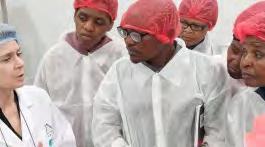

ATS and DFST hosted the Children’s Christmas Pudding Project which produces a steamed fruit cake. This annual project contributes to assisting the organisation with producing the product for fundraising. A production of 2 000 puddings was achieved, and these were sold for R130 each.



The charities who benefit from the Christmas Puddings: Vera School for Autistic Learners; Woodside Special Care Centre; Lelieblom Child and Youth Care Centre; HBAPD Association for Persons with Disabilities; and Lucy G Foundation – workshop for adults with disabilities

The technology station also continues to support postgraduate projects through technology training, demonstrations and instrumentation accessibility for all the relevant CPUT departments.

The strategic plan to strengthen and increase visibility of ATS within CPUT and throughout the country has yielded positive results. An upward trend is envisaged for the new financial year.

Ms Mbalenhle Dlamini, project coordinator of the Western Cape Indigenous Knowledge Systems Documentation Centre (IKSDC), is delighted that the centre has managed to work with the Attaqua community, handing over a community laptop to the community leader, Chief Poem Mooney, with a total 171 participants who were documented with over 500 claims (indigenous plants and food).
In 2004, Cabinet approved the Indigenous Knowledge Systems (IKS) policy. The policy aims to affirm, develop, promote and protect indigenous knowledge. Ms Dlamini said the pilot project began in the provinces in 2016 and as of 2019, CPUT has been the host. “The vision of the national registration system is to be the leading treasure hub for communal socioeconomic development.”
The centre has completed its work with the Attaqua community, and is currently in the process of securing a new community to work with on the West Coast. The centre in the negotiation phase for a new community, and the department and faculty now get to start and work on a project from beginning to end. Ms Dlamini said, “We’ve learnt from our mistakes and take note of our achievements too.”
davidsoni@cput.ac.za
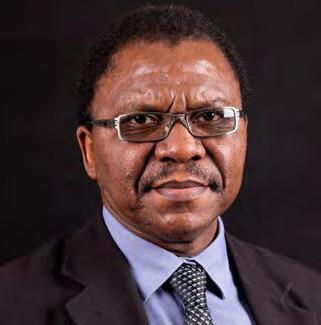
The French–South African Institute of Technology (F’SATI) and the African Space Innovation Centre (ASIC), also serving as the Pan African University Institute for Space Sciences (PAUSS), are based at CPUT. This multi-disciplinary research institute focuses on cutting-edge nanosatellite technologies supporting space-based applications such as space weather research, marine vessel tracking, wildfire detection and monitoring, communications, and technology validation.
Space science and technology (SST) plays a pivotal role in communications, remote sensing and actuation in industry, aviation, maritime and land transportation, urbanisation, mapping and surveying, human health, enhancement of human motor, sensing and cognitive abilities, disaster management, sustainable agriculture, environmental monitoring, food security, natural resource management, and exploring inaccessible areas. This provides a broad range of research areas and applications. F’SATI–ASIC is dedicated to developing and launching nanosatellites and offers a structured master’s degree in satellite systems and applications, supporting the burgeoning space industry in South Africa, southern Africa, across the continent, and globally.
At the F’SATI board meeting in Paris in July, CPUT EM decided to expand the scope of research activities beyond electronic and satellite communications to address real-world problems facing South Africa, Africa and Europe. This includes providing space-based solutions to energy security, the global energy crisis, power shortages, and loadshedding, among other societal challenges. This refocusing is a catalyst for expanding current research to leverage the societal benefits derived from inter- and multi-disciplinary space-based services. F’SATI–ASIC engages in applied scientific research and technology development in support of South Africa’s NDP. The institute aims to improve local living standards and contributes to nationbuilding. It strives to enhance South African engineering and scientific expertise through its fundamental and applied research and collaborative work with others.
Over the past decade, its fundamental research has led to developing a suite of communications products with proven space heritage on a growing number of missions. These products span VHF, UHF, S- and X-band for telemetry, payload data communications, and full lifecycle development of nanosatellite missions. Research continues in developing existing subsystems,
including attitude determination and control, on-board computers, electric power and energy systems, communications, and structures. The multidisciplinary nature of our research is evident in current and planned activities with industry and community-based development projects. An example is CPUT’s Oceans Plastic project, which involves local and international partnerships. These research activities are showcased through diverse technical outcomes from ongoing research at the institute and collaborative efforts.
Staff and researchers affiliated with F’SATI–ASIC in the niche areas, include:
Prof Vipin BalyanDr Ayodele Periola
Dr Janviel KamanziDr Angus Brandt
Dr Ayokunle AyelesoMr Nyameko Royi
Dr Oluwaseyi Paul Babalola
Ms Lilie LeopoldKateya
Mr Sinamandla MaqinaProf Stephen Bosman
Dr Paul Nganyang Bayendang
Prof Graham Oliver
Dr Kessie GovenderMr Rory Pentz
Prof Pierre CilliersMr Kevin Msungu
Mr Ian Van Zyl serves as the Operations Manager. More partners, collaborators and adjunct professors are currently being processed for addition to the F’SATI–ASIC Team.
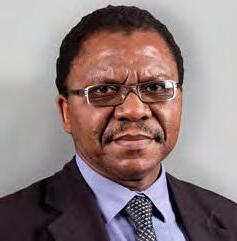
Prof Innocent Ewean Davidson
davidsoni@cput.ac.za
Faculty of Engineering & the Built Environment
CPUT’s key institutional arrangements providing a solid foundation for growth in Focus Area 2: Space Science, Engineering & Technology are:
• The French–South African Institute of Technology (F’SATI), which emanated from a partnership between the governments of the two countries, formed under President Nelson Mandela and President Nicolas Sarkozy.
• The Africa Space Innovation Centre (ASIC) hosted by F’SATI, which serves as an innovation hub to take research to the marketplace through its international industry partnerships.
Since its establishment in 2009, the F’SATI Postgraduate Programme in Satellite Systems Engineering at CPUT has received sustained funding from the DSI and the NRF for the development of human capacity and skills required by South Africa’s space industry. F’SATI hosts the CPUT Research Focus Area: Space Science, Engineering
& Technology, with a programme aimed primarily at postgraduate research and training. A joint master’s degree programme with our French university partner is earmarked to commence in January 2025.
The ASIC CubeSat nanosatellite platform facilitates practical training for local and international staff, students and delegates. It spans four phases: theory, research, development and innovation. The last two phases take place within ASIC, where engineers are employed in a professional environment.
The combined vision of F’SATI and ASIC is to be a world-class African innovation and support hub with end-to-end capability in the design and manufacture of nanosatellites and their components, space operations and ground-based support. The institute also undertakes data acquisition and handling for the provision of cost-effective satellite-based solutions tailored to the continent’s specific socioeconomic needs.
The New Joint CPUT-UPEC master’s degree in Satellite Systems and Applications
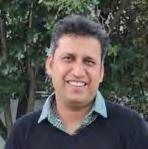
Prof Vipin Balyan
Programme Coordinator
balyanv@cput.ac.za

Dr Ayodele Periola
Deputy Programme Coordinator
periolaa@cput.ac.za
F’SATI functions as a National Institute of Excellence within CPUT. Through F’SATI, CPUT has access to several international experts and instructors. Various partnerships exist with universities such as the French Université Paris-Est Créteil (UPEC) and Université Gustave Eiffel (UGE).
The option for a full master’s qualification by research is available in the Department of Electrical, Electronic & Computer Engineering. However, in 2019, a structured master’s programme in Satellite Systems & Applications was introduced at CPUT, with the first intake in 2020. This collaborative master’s programme offered at F’SATI was in collaboration with l’école de l’innovation technologique (ESIEE) in Paris and was accredited by the Conférence des Grandes Ecoles (CGE) in France. The programme was officially concluded in 2022.
F’SATI has developed a new master’s degree qualification in collaboration with UPEC, which received EU funding for the development of a joint postgraduate qualification with CPUT in the field of space science and technology. Under the new policy framework for Internationalisation of Higher Education in South Africa, this is a joint master’s degree. The new programme is scheduled to commence in January 2025 at CPUT. The coursework component of this qualification will focus on satellite systems and applications. It will provide students with an in-depth theoretical foundation to prepare them for advanced research and technical practice.
The internationalisation of the CPUT degree offering brings on board supervision capacity from UPEC and will allow for student exchanges. Through this qualification, more local and international postgraduate students will be attracted to CPUT. The programme will introduce new courses such as: Image and Signal Processing, Molecular Spectroscopy, Remote Sensing, Astrophysics and Astrochemistry. It will comprise a coursework component and a mini thesis and will be offered over two years.
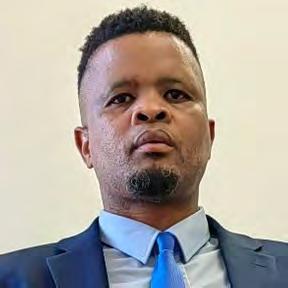
Mr Nyameko Royi
Chief Engineer
rjoyin@cput.ac.za
Faculty of Engineering & the Built Environment
It is recognised that every facet of human advancement is woven around a sound and stable energy and communications infrastructure. Space science and technology (SST) research remains a matter of national security and priority with a focus on addressing the needs of South African government and industry. The government remains committed to the strategic transformation of the national economy into a 100% digital economy, to enable optimal beneficiation from the opportunities and challenges offered by Industry 4.0. Over the past decade, South Africa has become increasingly dependent on space-based applications to manage its national resources and security objectives. SST is one of the five Grand Challenges defined and addressed by the DSI in its 10-year Innovation Plan.
Operation Phakisa is an initiative by the government to fast-track the implementation of critical solutions that address issues highlighted in the NDP. The first initiative of Operation Phakisa focuses on the South African ocean economy and is subdivided into four areas, one of which is Marine Protection Services and Governance. The main thrust of research within this focus area is creating space-based solutions to enhance the maritime domain awareness (MDA) of the South African exclusive economic zone. ZACube-2 was the first mission to validate technologies for the MDA. The satellite was launched in 2018 and represented a precursor mission for an ambitious constellation of nanosatellites. The first three satellites in this constellation were launched in January 2022 as the MDASat-1 mission. The latest project, the M2MSat, has entered the production phase in readiness for launching in 2024.
ASIC was established as a formal RTI research centre within CPUT in 2013. It has since evolved into a vibrant innovation hub, where its graduates and engineers develop cutting-edge nanosatellite technologies in new high-tech facilities. These technologies help to support space-based applications in space weather research, marine vessel tracking, wildfire detection and monitoring, communications and technology validation. Over the past few years, the ASIC team of engineers has developed a suite of communications products with proven space heritage on a growing number of missions. ASIC is responsible for the full lifecycle development of nanosatellite missions.
The ASIC engineering team members are Prof Innocent Davidson, Mr Nyameko Royi, Ms Lilie Leopold and Mr Sinamandla Maqina. Mr Ian van Zyl provides operational support to the centre.
During 2023, several FSATI–ASIC staff members and grant holders attained NRF ratings and received Faculty of Engineering and Built Environment awards:
• Dr Ayodele Periola achieved an NRF Y2-rating
• Prof Vipin Balyan achieved an NRF Y2-rating
• Prof Innocent Ewean Davidson achieved an NRF C2-rating
• ASIC received the Diamond Award for Income Generated from Intellectual Property
• Dr Gunjan Gupta received an FEBE Postgraduate Supervisor Award
• Dr Oluwaseyi Paul Babalola received an FEBE Postgraduate Supervisor Award
• Prof Vipin Balyan won the FEBE Diamond Award for Postgraduate Supervision
• Prof Vipin Balyan won the FEBE Diamond Award for DHET Publications
• Prof Vipin Balyan won the FEBE Bronze Award for Highest Paper Citations
During 2023, FSATI–ASIC staff, postgraduates and postdoctoral research fellows contributed to various research publications.
Chapters in books
• ‘A Methodology for Evaluating Aviation Sustainability Perspectives’, in Proceedings of the 2nd International Seminar on Aeronautics and Energy https://doi.org/10.1007/978-981-99-6874-9_23 .
• ‘Upcycling Trash into Cash Through Repurposing the Bisasar Road Landfill Site into a Solar PV and Energy Storage Site in eThekwini Municipality’, in Future Energy: Challenge, Opportunity, and Sustainability
Journal articles
• ‘Mechanical equipment fault diagnosis based on wireless sensor network data fusion technology’, in Journal of Behavioural Robotics https://doi. org/10.1515/pjbr-2022-0097
• ‘Deepfake generation and detection: Case study and challenges’, in IEEE Access, 4 https://doi. org/10.1109/ACCESS.2023.3342107
• ‘Evaluation of antenna and relay scheme for cooperative non-orthogonal multiple access’, in IET Networks https://doi.org/10.1049/ntw2.12099
• ‘Users’ grouping algorithm for fairness improvement of NOMA based multi-beams satellite networks intended for 5G’, in IET Communications https://doi. org/10.1049/cmu2.12653
• ‘Combined cold, heat and power (CCHP) systems and fuel cells for CCHP applications: A topological review’, in Clean Energy, 7(2) https://doi. org/10.1093/ce/zkac079
• ‘Enhanced electric power adaptability using hybrid pumped-hydro technology with wind and photovoltaic integration’, in Energy Engineering: Journal of the Association of Energy Engineers, 120(9) https://doi.org/10.32604/ee.2023.027574
• ‘Do the Dam Project – Evaluating floating solar photovoltaic and energy storage at Inanda Dam within eThekwini Municipality, South Africa’, in Energy Reports, 9(10) https://doi.org/10.1016/j. egyr.2023.05.190
• ‘Deep lear ning-based single-image super-resolution: A comprehensive review’, in IEEE Access, 11 https://doi.org/10.1109/ACCESS.2023.3251396
• ‘Methods and tools for PV and EV hosting capacity determination in low voltage distribution networks – A review’, in Energies, 16(8) https://doi. org/10.3390/en160836093
• ‘An improved dense CNN architecture for deepfake image detection’, in IEEE Access, 11 https://doi. org/10.1109/ACCESS.2023.3251417
• ‘Mobile broadband adoption, performance measurements and methodology: A review’, in Electronics, 12(7) https://doi.org/10.3390/ electronics12071630
• ‘Efficient hybrid enhanced genetic algorithm and ant colony system model for rerouting multimedia message in multiple node–link failures within wireless network’, in International Journal of Communication Systems https://doi.org/10.1002/ dac.5507
Non-DHET-accredited journal article
• ‘Modelling and fault ride-through control strategy for grid-supporting photovoltaic-based microgrids’, in International Journal of Smart Grid, 7(2) https://doi. org/10.20508/ijsmartgrid
Peer-reviewed conference proceedings
• ‘A comparative analysis of AI techniques applied to space and air traffic deconflicting’, in Proceedings of the 4th BRICS SciTech Forum, Moscow
• ‘Performance analysis of filtered orthogonal frequency division multiplexed LDPC codes for satellite communication in the Ka-band’, in Proceedings of IEEE AFRICON 2023 Conference, Nairobi
• ‘The analytical modelling and estimation of the
signal to noise ratio for the GNSS receivers’, in Proceedings of IEEE AFRICON 2023 Conference, published in Nairobi
• A nanosatellite receiver downconverter C-band to L-band bandpass filters – Review and design’, in Proceedings of the International Conference on Electrical, Computer and Energy Technologies (ICECET 2023), Cape Town
During 2023, FSATI–ASIC staff, postgraduates and postdoctoral research fellows revived and strengthened strategic partnerships, both locally and internationally, and participated in the following events:
• Workshop with staff from F’SATI at CPUT
• Workshop with Prof Anish Kurien from F’SATI at TUT and Prof Lamine Dieng from F’SATI/UGE, Université Gustave Eiffel, France
• Université Paris-Est Créteil
• Université Gustave Eiffel, Paris
• South African National Space Conference, CSIR Convention Centre, Pretoria
• IEEE Africon Conference, Nairobi, with the theme ‘Advancing technology in Africa towards presence on the global stage’
• Group on Earth Observations Week and Ministerial Summit, an international event hosted by the DSI at the CTICC, Cape Town
During 2023, F’SATI at CPUT was visited by the following academics:
• Prof Lamine Dieng from Université Gustave Eiffel, France
• Prof Anish Kurien from TUT
• Prof Tiko Iyamu from CPUT’s FID
• Prof Olayele Adelakun from De Paul University, Chicago
• Dr Florence Trentin from the Université de La Réunion
• Dr Richard Lorion from the Université de La Réunion
• Dr Jean-Pierre Faucon from the Université de La Réunion
• Ms Edel Lynch from the Université de La Réunion
During 2023, FSATI–ASIC successfully graduated: One DEng and six MEng postgraduate students. Five additional students have met the requirements for the MSc degree from ESIEE, which will be awarded in 2024.
Prof Davidson, FSATI–ASIC Director, supervised and graduated two DEng and one MEng postgraduate students from other South African universities.

Dr Kessie Govender
govenderk@cput.ac.za

Dr Kessie Govender
govenderk@cput.ac.za
Faculty of Engineering & the Built Environment
The Centre for Instrumentation Research (CIR) has a long-standing history within CPUT’s Department of Electrical, Electronic & Computer Engineering, and is based in the new Electrical Engineering Research Building on the Bellville Campus.
CIR is led by CPUT physicist Dr Kessie Govender. Its main projects involve novel electronics for direct current technology. Direct current (DC) power has numerous advantages over alternating current (AC) power, including the absence of reactance, ease of controllability, and better operational efficiency. Household appliances are moving towards DC, which makes the conversion from AC to DC unnecessary and wasteful. The centre has developed a focus group which is conducting research into a DC micro-grid and 350V DC house model that promises to set the trend for the future domestic landscape in South Africa. This is a collaborative project involving several local and international partners including De Haagse Hogeschool Delft and the Technische Universiteit Delft in the Netherlands, Katholieke Universiteit Leuven in Belgium, as well as industrial experts in the Netherlands.
Faculty of Engineering & the Built Environment
The Quantum Physics Research Group was established within the Department of Electrical, Electronic & Computer Engineering in 2014. Led by physicist Dr Kessie Govender, the group currently conducts investigations and develops expertise in quantum-based technologies. A quantum optics laboratory has been founded for the purpose of cooling atoms and the subsequent development of quantum information processing components.
The main activities of the group in 2023 include the characterisation of an in-house built diode laser and controller, and the development of a setup for generating entangled photons using a nonlinear process called four-wave mixing.

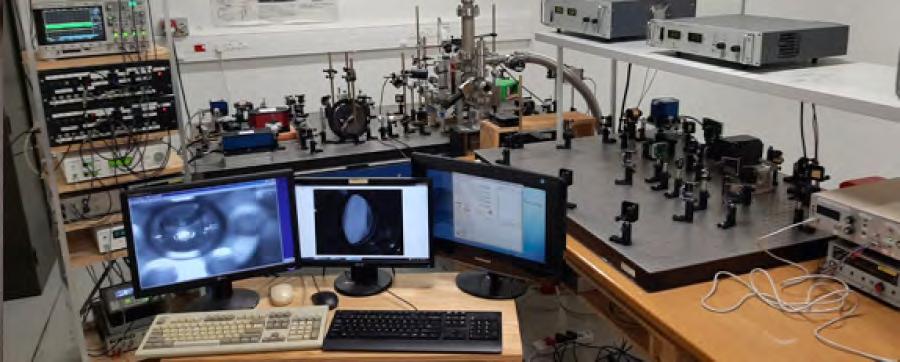
The Quantum Physics Research Group has formed collaborations with researchers at the Laser Physics Group at SU, the National Metrology Institute of South Africa (NMISA) and the Quantum Physics Research Group at UKZN. The group is funded by an NRF Thuthuka grant, a CSIR-NLC laser rental pool grant, as well as CPUT’s DRD and FEBE. The group is a member of the South African Quantum Initiative www.saquti.org and receives a grant from this initiative. Additional support is provided by F’SATI.
Currently, there are three doctoral students and one master’s student in this research group. The group also hosts some engineering interns.
More information on the activities of the group, its members and publications can be found at: https:// www.cput.ac.za/academic/faculties/engineering/ research/febe_research_entities/quantum_physics
The world of higher education is swift to respond to new trends and innovations. Therefore, it is not surprising that new master’s and doctoral programmes are constantly emerging to address the needs of students in a changing world across numerous academic fields. DEECE’s Quantum Physics Research Group is engaged in developing quantum technology components and currently has funding for master’s and doctoral students for 2023 to 2025. Lecturer Mr Rory Pentz said the prospective students will be engaged in developing electronic subsystems, devices, or experimental apparatus that will support the quantum technology research of the group. The prerequisite for this programme: i) an honours degree in Electrical Engineering or Experimental Physics for master’s studies, ii) a master’s degree in Electrical Engineering or Experimental Physics for doctoral studies.
Mr Pentz said, “The student must be interested in quantum technologies such as quantum computing, quantum sensors and quantum communications. We have constructed a cold atoms experiment using rubidium. The cold atoms will be used in a four-wave mixing experiment to create entangled photons for the quantum key distribution system and to develop quantum sensors. We are also developing commercial products such as laser drivers, classical photon detectors, signal photon detectors and electronic counting and/or timing units... The research the students will be doing is cutting-edge in the field of quantum technology… They will be leaders in the area of quantum technology after completion of their studies and able to contribute to emerging quantum technologies. They will be more marketable.” These graduates will have the choice of starting their own spin-off companies, becoming academics at HEIs, or working for existing quantum technology companies.
AREA 3
khant@cput.ac.za
This focus area’s research vision may be defined as an aspiration to provide innovations in the field of Energy that improve quality of life and create value. This vision relates directly to these UN 2030 high-impact Sustainable Development Goals: SDG 7 Affordable and Clean Energy; SDG 9 Industry, Innovation and Infrastructure; SDG 11 Sustainable Cities and Communities; SDG 13 Climate Action; and thus indirectly also SDG 3 Good Health and Well-Being.
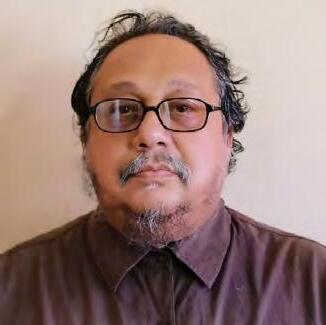
The concept of ‘Smart Energy’ involves leveraging synergies among innovations across all sectors of electrical, chemical, thermal and fossil fuel energy systems. It encompasses transdisciplinary collaboration and technologies. This focus area requires all energyrelated research in any centre across departments and faculties to collaborate with a vision for excellence. This is crucial to a sustainable energy future.
Focus Area 3: Smart Energy encourages extensive use of the ‘smartness’ that digital innovations enable across areas such as energy production, transportation, efficient use and transfer of energy, and the general power system improvement to meet the UN’s SDGs. Providing cost-effective integration of smart energy systems at scale requires balancing present needs, existing fossil fuel resource optimisation and renewable energy deployment in line with future needs.
Difficult trade-offs exist between quick wins and long-term strategies, which is a challenge in the energy sector. The innovative
exploratory research areas mapped by the research under this focus area will achieve solutions tailored to South Africa’s NDP and the UN’s SDGs.
The following research niche areas are among those broadly encouraged in this focus area:
E-mobility and transportation
Increased efficiency in fossil fuel-based transportation, hybrid, plug-in hybrid and extended range electric vehicles is a key player in transportation. This research area is relevant to SDGs 3, 7, 8, 9, 11, 13, 15 and 17.
Energy production, use and access
Sustainable, renewable and alternative energy sources – including cleaner fossil fuel generation, oceans’ energy and waste management approaches – are being investigated across the disciplines of electrical, chemical and mechanical engineering, as well as through interfaculty collaborations.
The key elements in improving energy efficiency would be in reducing the 67% rejected energy on the user side, as well as optimising the demand-side use of energy. This is achievable with power electronic systems and improvements in advanced metering and sensor/ communication technology applied across the sector. This research area is relevant to SDGs 1, 4, 6, 7, 8, 9, 10, 11, 12, 13 and 16.
Energy efficient agriculture and human settlement
Water is essential for agriculture and human settlement. Researchers are looking at developing improved methods of renewable energybased desalination, pumping and energy-efficient water purification. The mechanised agriculture sector, including aquaponics, depends on the effective use of energy in the forms of strategic solar and wind farm placement, smart sensor deployment and electromechanical interface development.
In addition, the expansion of smart sensor technology helps to monitor operations, crops, and livestock with IoT and ambient intelligence, which can also branch out to include green buildings and heating, ventilation and air conditioning (HVAC) climate control in buildings and warehouses. This research area is relevant to SDGs 1, 2, 3, 5, 8, 13, 15, 16 and 17.
Power system improvements, smart grids and microgrids
Energy management systems (EMS) were introduced to combine both the power system hardware and the intelligent software systems that monitor, control and plan for the operation of power systems. EMS is a concept used to identify the systems that forecast, monitor, measure and control energy generation and energy consumption for a reliable and stable operation of modern smart electrical grids.
Development of techniques for assessing customer accountability for harmonic distortion across a ring main network, maximum power point tracking (MPPT) for PV Systems under different meteorological conditions, stability assessment of interconnected IPP renewables to the utility grid, improvements in microgrids and smart grids are investigated in this research area.
Real-time distributed systems, advanced digital technologies, energy modelling – including big data in load forecasting – and blockchain techniques in electricity from generation to load utilisation are explored. This research area is relevant to SDGs 1, 8, 9, 10, 11, 12, 13 and 17.

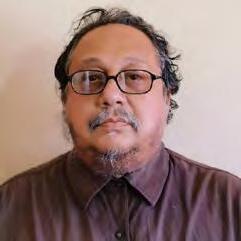
Prof Mohamed Tariq Kahn
khant@cput.ac.za
Dr Atanda Raji
rajia@cput.ac.za
Faculty of Engineering & the Built Environment
The focus area leader for Smart Energy, Prof Mohamed Tariq Kahn, is the Director of the Energy Institute and CPUT’s Research Chair: Energy. Dr Atanda Raji has been Deputy Director of the institute since November 2021.
The Energy Institute links various researchers in these research centres:
• Centre for Distributed Power & Electronic Systems (CDPES)
• Centre for Research in Power Systems (CRPS)
• French–South African Schneider Electric Education Centre (F’SASEC)
The Energy Institute bases its research on the 2030 SDGs adopted by CPUT and on the institution’s 10-year RTI Blueprint. Focus Area: Energy is promoted within the Energy Institute via various niche areas.
Megatrends like urbanisation, globalisation and digitalisation are stimulating change in our world, and the energy sector is being driven toward a more sustainable future. A key aim of the Energy Institute’s research is to enhance prosperity and quality of life for all people by championing the cause of energy access.
Through its research, the institute strives to enhance the energy value chain, from power generation and distribution, energy usage in buildings and industry, and mobility, to products, solutions, and the services sector. The institute’s energy research has had high and medium impact on numerous SDGs, including the ones most affected by the pandemic, namely SDG 3 Good Health and Well-Being, SDG 7 Affordable and Clean Energy, SDG 8 Decent Work and Economic Growth, SDG 9 Industry, Innovation and Infrastructure, SDG 11 Sustainable Cities and Communities, SDG 12 Responsible Consumption and Production, and SDG 13 Climate Action.
The Energy Institute aims to foster collaboration among energy researchers and groups by building a network of expertise to shape the future course of energy development in southern Africa. A focus on interdisciplinary world-class research and advancing novel research in energy is at the heart of the institute.
The institute’s objectives are to promote technologies for efficiency and sustainability and integrate these into smart city applications in South Africa; to support the introduction of sustainable energy solutions and energy access into urban and rural areas; and to create awareness and be at the forefront of new techniques, processes and developments in energy technology.
Fortunately, since 2022, we have seen a return to a more normal and integrated learning approach post-pandemic.
• Dr Marco Adonis graduated three master’s students and one doctoral student; and he published four journal articles and one conference paper
• Prof Khaled Aboalez graduated three master’s students; and he published four journal articles and three conference papers
• Prof Atanda Raji graduated eight master’s and two doctoral students; he published six journal articles and two conference papers; he won three faculty research awards: Gold for Publications, Silver for H-Index, and Silver for Citations; and he edited an MDPI research book
• Dr Ali Almaktoof graduated four master’s students; and he published one journal article and nine conference papers
• Prof Mohamed Tariq Kahn graduated five master’s and two doctoral students; and he published five journal articles and three conference papers
• Prof Balyan Vipin graduated four master’s students; and he published nine journal articles and one conference paper
• Prof Seun Oyekola published four journal articles
• Dr Efe Orumwense published four jour nal articles
• Dr Fareed Ismail published three journal articles; and he graduated one doctoral student and one master’s student summa cum laude
The French–South African Schneider Electric Education Centre (F’SASEC) Laboratory was in its second year with another 100 students attending laboratory sessions during 2023. A new A-Tower learning system which includes state-of-the art content, assessment and practical competencybased education methodology was acquired in November.
The Laboratory for Advances in Converter and Inverter Design (LACID) and the Laboratory for E-Mobility and Battery Testing (LeBaT) continued work with senior graduate students. LeBaT is proud to house the unique NEP-funded Chroma Battery Test and Simulation System, and progress with development work during this year.
The Master’s in Energy degree, a unique interdisciplinary postgraduate degree programme at CPUT, continued to attract positive enrolments during 2023. Funding for bursaries was obtained via Hysa (Hydrogen South Africa) and LTSA (Liquid Telecom South Africa) to the value of R500 000 and R4.1 million respectively.
Energy Institute staff members were involved in the operations and review committees of a number of face-to-face and digital event seminars during this year. Dr Aleksejs Prozuments from Latvia met with faculty and research staff to learn about research projects and practices carried out at the Energy Institute, and to share his experience and research work at Riga Technical University (RTU) on Energy Efficiency and Infrastructure Sustainability. Grounds for future collaborations were established.


In February, Prof Kahn and Dr Busiso Mtunzi, Executive Dean of the Faculty of Engineering at the National University of Science and Technology, Zimbabwe conducted a seminar on Smart Energy.This seminar included several of our graduate students presenting their research. Students from as far away as Sweden attended the event digitally.
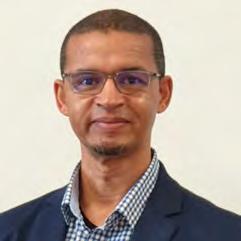
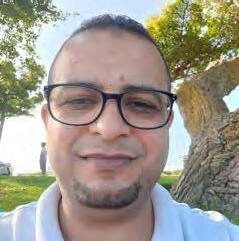
Dr Ali Almaktoof
almaktoofa@cput.ac.za
Dr Marco Adonis
adonism@cput.ac.za
Faculty of Engineering & the Built Environment
Through its research, CDPES aims to:
• Develop power conversions for renewable energy sources and investigate the interconnectivity of distributed resources with microgrids and electric power systems
• Apply such technology in multidisciplinary applications in the energy sector, especially in the commercial and industrial fields
• Investigate and apply optical fibre and wireless communication techniques over large-scale power systems for telemetry and control of microgrids, both AC and DC, and deploy them into smart grids
• Improve control schemes for power converters and drives
• Develop instrumentation for complex alter natives such as the wind, solar and nuclear energy sectors, including environmental protection and sustainable development
Dr Marco Adonis (head), Dr Ali Almaktoof (deputy head), Prof Mohamed Tariq Kahn, Prof Atanda Raji, Prof Khaled Aboalez, Prof Balyan Vipin, Dr Ayokunle Ayeleso, Dr Efe Orumwense, Dr Martial Giraneza and Dr Anges Akim Aminou Moussavou, Mr Deon Kallis and Mr Achmat Fish.
Research publications
During 2023, CDPES members published many peerreviewed national and international publications. A total of 21 journal articles and 10 conference papers were produced.
Journal articles
• ‘A review of demand-side resources in active distribution systems: Communication protocols, smart metering, control, automation, and optimisation’, in Applied Sciences, 13(23) https:// www.mdpi.com/2076-3417/13/23/12573
• ‘An optimal scheduling technique for smart grid communications over 5G networks’, in Applied Sciences,13 (20) https://www.mdpi.com/20763417/13/20/11470
• ‘Inter net of Things for smart energy systems: A review on its applications, challenges and future trends’, in Aim Electronic and Electrical Engineering, 7(1) https://www.aimspress.com/article/doi/10.3934/ electreng.2023004?viewType=HTML
• ‘Kinetic energy recovery of a wind energy doubly-fed induction generator for grid frequency support’, in Engineering Proceedings 56(1) https://www.mdpi. com/2631174
• ‘Scope of soft computing techniques in the development of the ideal design parameters for microgrids: A systematic review’, in TechRxiv (October) 10.22541/au.169735609.93463895/v1
• ‘A Review of solid-state transformer for smart energy’, in Wattnow magazine (the official publication of The South African Institute of Electrical Engineers (SAIEE) (June)
• ‘The subjectification of black engineering educators: A posthumanist cartography’, in Qualitative Inquiry, 29(1) https://doi.org/10.1177/10778004221099570
• ‘Users’ grouping algorithm for fairness improvement of NOMA-based multi-beams satellite networks intended for 5G’, in IET Communications https://doi. org/10.1049/cmu2.12653
• ‘Efficient hybrid enhanced genetic algorithm and ant colony system model for rerouting multimedia message in multiple node–link failures within wireless network’, in International Journal of Communication Systems https://doi.org/10.1002/dac.5507
• ‘Mechanical equipment fault diagnosis based on wireless sensor network data fusion technology’, in Journal of Behavioral Robotics https://doi. org/10.1515/pjbr-2022-0097
• ‘Combined cold, heat and power (CCHP) systems and fuel cells for CCHP applications: A topological review’, in Clean Energy, 7(2) https://doi. org/10.1093/ce/zkac079
• ‘Cell outage detection in 5G self-organising networks based on FDA-HMM’, in Lecture Notes in Networks and Systems, Vol 664 https://doi.org/10.1007/978981-99-1479-1_9
• ‘Hybrid backscatter communication for IoT devices in remote areas’, in Heliyon https://doi.org/10.1016/j. heliyon.2023.e22880
• ‘Evaluation of antenna and relay scheme for cooperative non-orthogonal multiple access’, in IET
Networks https://doi.org/10.1049/ntw2.12099
• ‘Smart irrigation system for farm application using LoRa technology in intelligent computing and optimisation’, in Lecture Notes in Networks and Systems, Vol 853 https://doi.org/10.1007/978-3031-50327-6_10
• ‘Structural frame analysis of an electrically powered robotic subsea dredging crawler under static loading conditions’, in Journal of the Southern African Institute of Mining and Metallurgy, Vol 123(10)
• ‘Reflecting on a community of practice for engineering education research capacity in Africa: Who are we and where are we going?’, in Australasian Journal of Engineering Education, 28(1)
• ‘Operating voltage and frequency regime validation of grid code requirements in South Africa’, in International Transactions on Electrical Energy Systems
• ‘Development and validation of a real-time testbed for renewable energy integration studies: South African grid code case study’, in Journal of Engineering, Design and Technology
• ‘Optimal tuning of PID controller for speed control of DC motor using equilibrium optimiser’, in Indonesian Journal of Electrical Engineering Computer Science, 30(1)
• ‘Modelling and simulation of a large-scale wind power plant considering grid code requirements’, in Energies, 16(6)
• ‘Improving distribution network voltage stability through battery energy storage system’, in 2023 IEEE PES/IAS PowerAfrica, 10.1109/ PowerAfrica57932.2023.10363258
• ‘Improving service restoration on the Eskom distribution grid system through network
reconfiguration’, in 2023 6th International Conference on Renewable Energy for Developing Countries 10.1109/REDEC58286.2023.10208186
• ‘The Green Hydrogen as a renewable energy source and storage in the transportation sector of Germany’, in 2023 31st Southern African Universities Power Engineering Conference 10.1109/ SAUPEC57889.2023.10057750
• ‘Energy access assessment report focusing on energy poverty and energy demand for Rwanda’, in 2023 IEEE 3rd International Maghreb Meeting of the Conference on Sciences and Techniques of Automatic Control and Computer Engineering 10.1109/MI-STA57575.2023.10169338
• ‘Optimised PID controller and generalised inverted decoupling design for MIMO system’, in 2023 IEEE International Conference on Advanced Systems and Emergent Technologies 10.1109/IC_ ASET58101.2023.10150957
• ‘Supervisory control and simulation of boiler drum water level’, in 2023 IEEE International Conference on Advanced Systems and Emergent Technologies 10.1109/IC_ASET58101.2023.10150778
• ‘Mitigating energy poverty in sub-Saharan Africa through smart metering and sustainable energy access programs’, presented at the 2023 International Conference on Innovation and Technological Advances for Sustainability
• ‘The design and analysis of an advanced hybrid renewable energy microgrid for Cyangugu remote rural community in Rwanda using Homer Pro’, presented at the 2023 International Conference on Innovation and Technological Advances for Sustainability
• ‘Design and evaluation of a grid code guided approach to renewable energy integration studies’, presented at the 13th International Symposium on Advanced Topics in Electrical Engineering
• ‘Development of a VLF receiver for lightning detection and monitoring natural and man-made electromagnetic emissions in the VLF band’, presented at the 2023 International Conference on Innovation and Technological Advances for Sustainability
A total of three doctoral graduates and twelve master’s graduates were produced by CDPES staff during 2023.
Supervisor(s)
Prof Balyan
Dr Almaktoof
Dr Almaktoof
Dr Almaktoof & Prof Raji
Master’s
Mr Bennour Bin Amade Bacar
Mr Adimchinobi Daniel Asiegbu
Ms Penelope Palesa Suke
Dr Almaktoof Mr Mkhutazi Mditshwa
Prof Raji & Dr Ayeleso
Prof Raji & Dr Ayeleso
Prof Raji
Prof Raji
Prof Raji
Prof Raji
Dr Adonis and Prof Raji
Prof Raji
Prof Balyan & Prof Raji
Dr Adonis & Dr Moussavou
Ms Rudzani Malange
Mr Christopher James Moult
Ms Niksha Reddy
Mr Jesse Nathan Fritz
Ms Inga Mpontshane
Doctorates
Dr Joel S Biyoghe
Dr Gideon Daniel Joubert
Dr William Norman Murray
Mr Mike Oluwaseun Ojumu
Mr Alfredo Pequeno Duda
Mr Randy Kabala
Various staff members took part in several development and training opportunities, including:
• PYTHON for machine learning, neural networks and deep learning, by Prof Aditya Jagannatham
• Pr Eng Registration Workshop, by Prof Trevor Haas
• Webinar: Open Access for South Africa – What you need to know, from how to publish your article to getting funded, by Springer Nature
• Workshop: Using learner analytics to support at-risk students (hybrid workshop)
• Smart Energy Seminar, hosted by the Energy Institute, DEECE, FEBE
• Digsilent PowerFactory training – Energy storage analysis (online)
• Blackboard Ultra training (online)
Other notable staff achievements
• Prof Balyan was an editor of AI and Blockchain in Healthcare
• Dr Almaktoof was awarded the 2023 Institutional Teaching and Excellence Award (TEA 2023) by CPUT
• Dr Almaktoof was awarded R60 000 from the Eskom TESP programme for the project ‘Impacts of small-scale embedded generation on distribution network behaviour’
• Dr Almaktoof was awarded second best paper by the 6Th IEEE International Conference on Advanced Systems and Emergent Technologies (IEEE IC_ASET 2023) and the Tunisian Association of Specialists in Electrical Sciences (ASET)
• Dr Almaktoof was Session Chair at the 2023 IEEE-ITAS Conference: Environment & Climate Change track
• Dr Almaktoof received a Postgraduate Supervision Award 2023 from FEBE
• Prof Balyan received the Bronze Award for Publication 2020 at the CPUT Research Festival 2023
• Prof Balyan received the Diamond Award for publication 2021 from FEBE
• Prof Balyan received a Departmental Teaching Excellence Award 2022
• Prof Balyan received the Diamond Award for Postgraduate Supervision 2021 from FEBE
• Prof Balyan received the Bronze Award for Google Scholar Citation 2021 from FEBE
• Dr Ayeleso received the Postgraduate Supervision Award in 2023 from FEBE
• Prof Raji received the FEBE Gold Award for Publications
• Prof Raji received the FEBE Silver Award for H-Index
• Prof Raji received the FEBE Silver Award for Citations
• Dr Adonis received the FEBE Gold Award for Postgraduate Supervision
• Dr Adonis received the FEBE Silver Award for Citations


Prof Mohamed Tariq Kahn
khant@cput.ac.za
Prof Khaled Aboalez
aboalezk@cput.ac.za
Faculty of Engineering & the Built Environment
CRPS team members are Prof Khaled Aboalez (head), Prof Tariq Kahn (deputy head) and Mr Christopher Wills (technical support).
The research centre’s aims are to:
• Develop integrated HVAC/HVDC networks within power systems
• Study and improve power quality problems, efficiency and energy-saving techniques
• Expand grid studies in line with moder n protection and control systems and the implementation of 4IR-ready systems
• Evaluation, application and comparison of
modern industrial-grade frequency and time–domain software packages
• Grid frequency support with a high penetration level of wind energy generation systems
• Advanced protection systems for smart grids
• Energy management systems for hybrid energy systems for different applications
• Modelling and advanced control strategies for grid connection and islanded operation
• Demand-side management impacts on distribution networks
• Model predictive control in power systems
• Power systems and energy engineering education research
In collaboration with UCT: ‘The subjectification of black engineering educators: A posthumanist cartography, in Qualitative Inquiry, 29(1)
In collaboration with Delta University for Science and Technology (DUST), Egypt: ‘Security management for an advanced metering infrastructure (AMI) system of smart electrical grids’, in Applied Sciences, 13(5)
CRPS conferences publications:
• ‘A nexus for dispatching of ancillary services of emergency reserves in South African networks’, in Proceedings of the 31st Southern African Universities Power Engineering Conference
• ‘Kinetic energy recovery of a wind energy doubly-fed induction generator for grid frequency support’, in Engineering Proceedings, 56(1)
• ‘Implementation of decentralised load shedding schemes based on the IEC 61850 standard: A practical approach’, in Proceedings of the 24th International Middle East Power System Conference
CRPS journal articles:
• ‘Inter net of Things for smart energy systems: A review on its applications, challenges and future trends’, in AIMS Electronics & Electrical Engineering, 7(1)
• ‘Scope of soft computing techniques in the development of the ideal design parameters for microgrids: A systematic review’, in Authorea Preprints
• ‘An optimal scheduling technique for smart grid communications over 5G networks.” Applied Sciences, 13(20)
Prof Kahn was awarded the CPUT Research Excellence Award for Supervision 2021 at the CPUT Research Festival 2023 in February.
RESEARCH CENTRE
Faculty of Engineering & the Built Environment
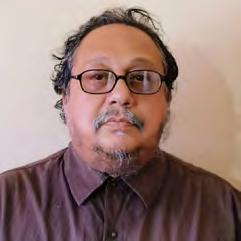
Prof Mohamed Tariq Kahn
khant@cput.ac.za
The French–South African Schneider Electric Centre (F’SASEC) was established at CPUT in 2016. It originally focused on programmable logic controllers (PLCs) in industry. With a renewed partnership with Schneider Electric, the centre has shifted its focus to energy management. It features 27 high-end computer workstations and conducts seminars for both undergraduate and graduate students.
F’SASEC hosted prominent visitors this year, including delegations from the French Embassy and Prof Busiso Mtunzi from the National University of Science and Technology, Zimbabwe. A seminar was held with senior research students on the topic of Smart Energy, and a book of abstracts was produced.
Schneider Electric, a global leader in digital transformation for energy management and automation, operates in over 100 countries. The company excels in power management – both medium and low voltage – and automation systems. Schneider Electric collaborates with universities and developer communities worldwide on its open platform to enhance real-time control and operational efficiency. F’SASEC embodies this collaborative spirit, advancing both education and practical expertise in energy solutions. The students also have access to the Schneider Energy University online courses as part of their curriculum.
RESEARCH CENTRE

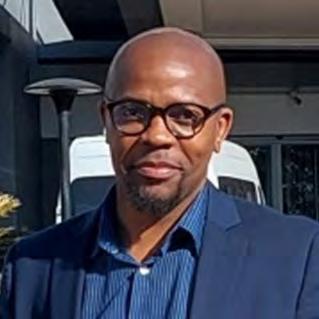
Dr Mkhululi Mnguni
mngunim@cput.ac.za
Dr Carl Kriger
krigerc@cput.ac.za
Faculty of Engineering & the Built Environment
The Centre for Real-Time Distributed Systems (CRTDS) team members are Dr Mkhululi Mnguni (leader), Dr Carl Kriger (deputy leader), Dr Senthil Krishnamurthy, Dr Nomzamo Tshemese, Dr Ntuthuko Dube, Mr Leon Abrahams, Dr Haltor Mataifa, Mr Sinawo Nomandela and Dr Yohan Mfoumboulou.
The centre strives to make a theoretical and application-based contribution to advances in real-time distributed systems. It works on the development of novel models, design methods, software and hardware, as well as their integrated application for real-time monitoring and control. It also aims at insightful and focused determination of proper areas of application and research through appraisal and reappraisal of emerging control technologies.
The core activities are:
- Design and implementation of nonlinear controllers
- Design and implementation of adaptive controllers
- Design and implementation of process automation
- Distributed control based on the IEC61499 standard for function block programming
- Design and implementation of networked control systems
- Optimisation of complex interconnected systems and development of algorithms for parallel computation.
CRTDS achievements in 2023 in research, development and applications of the IEC 61499 standard and technology to various industrial processes include:
• Novel theoretical methods, software and real-time implementation of these methods using PLCs and the RTDS simulator are developed and tested.
• The Master in Engineering project of Mr Kevin Love focused on the development of a controller in a communication network with delays using the modern state–space design methodology.
His work included the development of a hardwarein-the-loop system using a PLC supporting the IEC 61499 communication standard. A lab-scale plant for the control of the azimuth and elevation of an antenna using DC motors was used.
• Mr Emmanuel Thoba, laboratory technician at the CRTDS and CSAEMS, together with a team of students under the leadership of Mr Deon Kallis, represented CPUT and DEECE at the international ‘xPlore 2023 Technology Award for Sustainable World’ competition hosted by Phoenix Contact in Germany. The theme for the competition involved providing solutions for a sustainable world. The CPUT team obtained third place out of the 25 teams from 14 countries that were chosen to demonstrate their project solutions in Berlin. Please visit https://www.phoenixcontact.com/ext/en/ xplore.html for a glimpse of the event.
• Dr Kriger is the institutional host for the Erasmus+ Mobility for staff and student exchange and a collaboration agreement between CPUT and the Department of Automation and Control at Yildiz Technical University, Istanbul. This international project has resulted in the following staff members visiting CPUT at different times during 2023 to present their research projects to academics within the DEECE in order to identify possible areas for collaboration:
- Dr Ayşe Emengen
- Dr Öznur Yıldırım
- Assist Prof Ramazan Ayaz
• Dr Tshemese as chair of the Institute of Electrical Electronics Engineers Power, and Energy Society (IEEE PES) together with CPUT and the IEEE Nigeria, hosted, moderated and was a prominent speaker at the Women in Power Event 2023. This event aims to build a network, to inspire future female electrical engineering students, and provide them with support in the field of Electrical Engineering and Power
Systems with the theme ‘Where are you going?’
Ms Chinelo Okafor, a guest speaker from Nigeria, presented ‘Organisation/data science’. There were various other topics presented by DEECE staff members. Dr Mnguni provided a practical demonstration of a project on industrial automation.
• In collaboration with CPUT, the IEEE PES WIP South Africa Section has organised Education and Skill Outreach to underprivileged high schools. Dr Tshemese is Chair of IEEE PES. She, Dr Yohan Mfoumboulou, and some DEECE students visited the Masibambane High School in Kraaifontein to show learners how to develop their own LED Electric lightbulbs for times of power outage.
• Mr Deon Kallis is the coordinator of the Edunet project. He has forged an industrial partnership with the German company Phoenix Contact. One of the owners of the company, Mr Klaus Hengsbach, visited the DEECE PLC lab at CPUT to see how the purchase of 40 PLCNext PLCs was used in undergraduate and postgraduate studies. This collaboration will continue with Dr Kriger being the CPUT coordinator in future.
• Funding secured: Eskom TESP programme with a total amount of R120 000 was secured with successful proposals submitted by Dr Mnguni and Dr Kriger in 2022. Payment was received in 2023.
• ‘Decentralised proportional-integral controller based on dynamic decoupling technique using Beckhoff TwinCAT-3.1’, in International Journal of Electrical & Computer Engineering, 13(3)
• ‘Modeling and simulation of a large-scale wind power plant considering grid code requirements’, in Energies, 16(6)
Mr Mkhutazi Mditshwa, with his thesis ‘Enhancing stability and power restoration of smart grid through distributed energy resources’, graduated with an MEng in Electrical Engineering (Energy) cum laude. His supervisor was Dr Mfoumboulou.


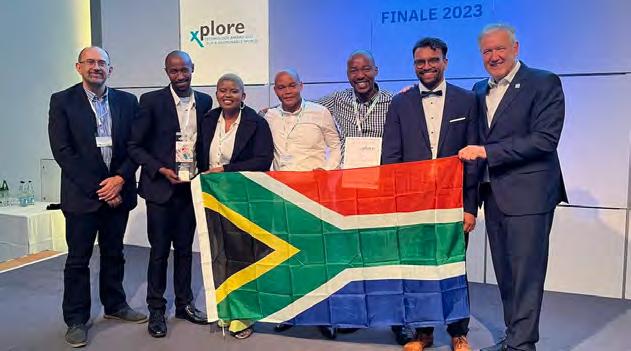
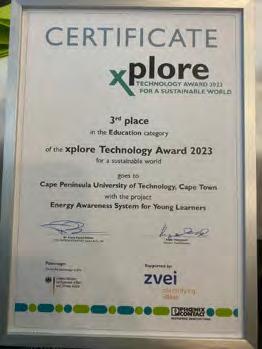
The DEECE and CPUT team were awarded 3rd place at the international ‘xPlore 2023 Technology Award for Sustainable World’ competition, hosted by Phoenix Contact – Mr Deon Kallis, with students Mr Simphiwe Makhathini, Mr Sandile Malinga, Ms Bukho Lingani and Mr Emmanuel Thoba, with Mr Klaus Hengsbach of Phoenix Contact

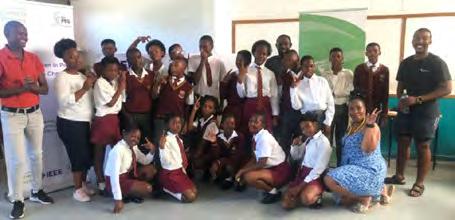
IEEE PES WIP South Africa Section and CPUT organised an Education and Skill Outreach to underprivileged high schools, including a visit to Masibambane High School, Kraaifontein
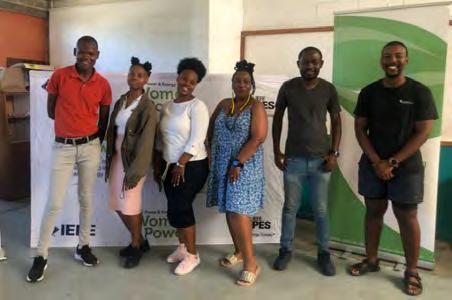
Education and skill outreach: Mr Sinawo Nomandelan (CPUT lecturer and PhD student), Ms Elethu Mvandaba (Curro Delft learner), Dr Nomzamo Tshemese (IEEE PES WIP chair), Ms Lunga Maroqa (Masibambane High School, HOD Science), Dr Yohan Mfoumboulou (CPUT advanced control specialist and lecturer) and Mr Simphiwe Makhathini (DEECE 3rd BET student quantum physics lab assistant)

Dr Senthil Krishnamurthy
krishnamurthys@cput.ac.za

krigerc@cput.ac.za
The Centre for Substation Automation & Energy Management Systems (CSAEMS) team members are Dr Carl Kriger (leader), Dr Senthil Krishnamurthy (deputy leader), Dr Mkhululi Mnguni, Mr Mukovhe Ratshitanga, Dr Haltor Mataifa, Mr Sinawo Nomandela and Dr Yohan Mfoumboulou.
The centre aims to address the need in South Africa for research infrastructure development that supports human capital development as well as research and innovation in the field of metering, monitoring, protection, automation, and control of smart power systems, with a focus on current and emerging standards in this domain. As a result of its visionary approach, the centre has attracted investments from numerous industrial partners and donations from equipment vendors.
The main activities that contribute to the theory and practice of substation automation, energy management systems and smart grids include:
- Continuation of the MEng Electrical Engineering Smart Grid qualification under the Erasmus+ K2 DAMOC project
- Training, development and knowledge transfer through equipment-orientated courses, which are aimed at industry engineers and postgraduate students at other collaborating universities
- Interpretation, modelling and implementation of the IEC61850 standard functions at all levels for the control, protection and automation of smart grids
- Development of innovative protection schemes for different applications
- Integration of the distributed energy resources (DERs) to the power grid
- Development of test-bench facilities for the testing of ideas, project solutions and new developments in the field of power systems
- Real-time simulation and providing of innovative solutions to the energy management problem in the conditions of smart grids
Some CSAEMS staff attended the Eskom Annual Research Testing and Development (RT&D) Industry Workshop in person while others attended online. Topics for the workshop included the RT&D strategy to address Eskom operational challenges, balancing coal sustainability and other focus areas, and how to futureproof Eskom’s transmission and distribution grid. Videos were shown of the Green Hydrogen pilot plant, the Corona cage and micro-grid projects.
Funding secured
• Eskom TESP programme R120 000: Successful proposals from Dr Krishnamurthy and Mr Ratshitanga were submitted in 2022, and payment was received in 2023 for the support of postgraduate students
• Dr Krishnamurthy received R870 000 for the NRF Thuthuka funding with grant No: 138177, for his project ‘Study the impacts of grid connected hybrid renewable energy sources and automate its protection, control and monitoring functions using IEC61850 standard’
• Dr Oludamilare Adewuyi received an NRF post-doc fellowship of R 305 000 for his project ‘Developing AI-based model for integrated flexibility management under high renewable energy penetration’, supervised by Dr Krishnamurthy
Journal publications
• ‘Photovoltaic controller design based on adaptive volt/var algorithm to stand the impact of load increase in grid tied microgrid system’, in International Journal of Electrical and Electronic Engineering & Telecommunications, 12
• ‘Stability evaluation of non-ideal grid-tied photovoltaic on IEEE-9 bus system’, in International Journal of Electrical Engineering and Applied Sciences (IJEEAS) , 6(2)
• ‘Economic power dispatch of a grid-tied photovoltaic-based energy management system: Co-optimisation approach’, in Mathematics, 11(15)
• ‘Discrete optimal quadratic AGC based cost functional minimisation for interconnected power systems’, in Scientific Reports, 13(1)
• ‘A review of optimisation methods for transmission congestion management
systems’, in International Review of Electrical Engineering (IREE), 18(3) (Praiseworthy Prize awarded)
• ‘An efficient primal-dual interior-point algorithm for Volt/VAR optimisation in rectangular voltage coordinates’, in IEEE Access, 11
• ‘Comparative analysis of the particle swarm optimisation and primal-dual interior-point algorithms for transmission system Volt/VAR optimisation in rectangular voltage coordinates’, in Mathematics, 11(19)
• ‘An IEC 61850 standard-based edge computing algorithm to enhance communications in modern power systems’, at the 31st Southern African Universities Power Engineering Conference (SAUPEC), in Johannesburg in June
• ‘Transformer differential protection system testing for scholarly benefits using RTDS hardware-in-the-loop technique’, at the 31st Southern African Universities Power Engineering Conference (SAUPEC), in Johannesburg in June
• ‘Parallel power transformer current differential protection scheme based on IEC61850 standard’, at 2023 IEEE PES/IAS PowerAfrica, in Morocco in May
• ‘Improving distribution network voltage stability through battery energy storage system’, in Proceedings of IEEE PES/IAS PowerAfrica, in Marrakech in November
• ‘Performance assessment of steady-state voltage stability indices for parameter validation using ANFIS’, at the 10th International Conference on Power and Energy Systems Engineering (CPESE), in Nagoya, Japan in September
• ‘An economic feasibility study for off-grid hybrid renewable energy resources’, at the 31st Southern African Universities Power Engineering Conference (SAUPEC), in Johannesburg in June
• ‘An assessment of available renewable energy resources and models integrating technical and economic structures in Limpopo Province (technology analysis)’, at the Southern African Sustainable Energy Conference (SASEC 2023), at Nelson Mandela Bay in November
• ‘A Nexus for dispatching of ancillary services of emergency reserves in South African networks’, at the 31st Southern African Universities Power Engineering Conference (SAUPEC), in Johannesburg in June
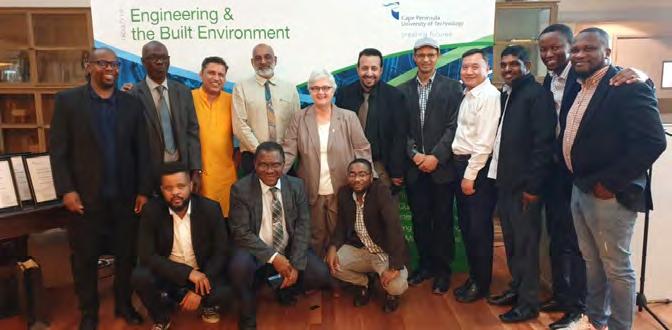

Postgraduate graduations
• Dr Haltor Mataifa, ‘A novel optimisation method for voltage and reactive power control of electric power systems’, DEng in Electrical Engineering, supervised by Dr Krishnamurthy and Dr Kriger
• Ms Nande Mtila Fose, ‘Application of IEC 61850-90-5 standard-based predictive dynamic stability system’, MEng in Electrical Engineering summa cum laude , supervised by Dr Krishnamurthy
• Mr Abuyile Mpaka, ‘IEC16850 standard-based islanding detection algorithm for distributed generator integrated power systems’, MEng in Electrical Engineering, supervised by Dr Krishnamurthy
• Mr Khangwelo Loyd Rathogwa, ‘Hardware-in-the-loop simulation and testing of the volts/hertz protection scheme for a generator overexcitation system’, MEng in Electrical Engineering, supervised by Dr Krishnamurthy
• Mr Abdalla Yahia Daffalla Adam, ‘Algorithms for communication control and automation in a power system network using IEC 61850 standard’, MEng in Electrical Engineering (Smart Grid), supervised by Dr Mnguni, co-supervised by Mr Ratshitanga
• Mr Ntokozo Nichol Shangase, ‘The multi-vendor-based transformer protection scheme for transmission network’, MEng in Electrical Engineering (Smart Grid), supervised by Mr Ratshitanga, co-supervised by Dr Mnguni
• Mr Luntu Siphelo Mgaga, ‘The multi-vendor-based transformer protection scheme for transmission network’, MEng in Electrical Engineering (Smart Grid), supervised by Dr Mnguni


Mr Ratshitanga
Mukovhe
Project leader
krishnamurthys@cput. ac.za
Dr Senthil
Krishnamurthy
Project leader
krishnamurthys@cput.ac.za
In a groundbreaking achievement, CPUT secured the prestigious South African National Energy Development Institute (SANEDI) Just Energy Transition (JET) contract research project, asserting its prominence in the academic and research landscape. Notably, CPUT is the sole university of technology among traditional universities to be awarded this esteemed project. The project was driven by the Department of Electrical, Electronic & Computer Engineering staff, Prof Senthil Krishnamurthy and Mr Mukovhe Ratshitanga, who made the successful technical bid submission.
SANEDI, at the forefront of promoting sustainable energy development and innovation in South Africa, initiated the JET programme to foster collaboration between academia and industry. This programme aims to address critical challenges in the energy sector through cutting-edge research and development projects, using a transformative approach that prioritises social equity, environmental sustainability, and economic development. This initiative seeks to move South Africa towards a more inclusive and cleaner energy future.
The competition for the SANEDI JET contract was intense, with numerous top-tier institutions vying for the opportunity. Despite being the only UoT in contention, CPUT demonstrated its research prowess and capabilities, standing tall among traditional universities known for their strong research portfolios.
The magnitude of CPUT’s success is further highlighted by the project’s financial aspect. The R2.8 million contract underscores the significance of the research and SANEDI’s confidence in CPUT’s ability to deliver impactful results. This substantial investment reflects the institution’s commitment to advancing energy research and innovation in South Africa.
Securing the SANEDI JET contract is a testament to CPUT’s expertise in energy-related research. The UoT has consistently committed to addressing contemporary challenges in the energy sector, aligning its research agenda with national priorities and sustainable development goals. Being awarded this contract positions CPUT as a leader in the energy research domain and opens doors for valuable collaborations. The university can now
engage with industry experts, government agencies, and other academic institutions to leverage collective knowledge and resources, fostering a collaborative ecosystem for meaningful impact.
CPUT’s research into opportunities for energy efficiency in the industrial sector value chain has the potential to revolutionise how industries optimise their energy consumption. The exploration of demand-side management as a planning tool can pave the way for innovative solutions in balancing energy supply and demand. Research into the use of battery storage in the power system value chain could lead to advanced energy storage technologies and services, supporting grid stability and facilitating the integration of renewable energy sources. Forecasting distributed energy resources can revolutionise the role of distribution system operators. With AI-based forecasting techniques, CPUT’s research can offer insights into renewable energy resources’ current and future load demands and generation potential. Research into the control, automation and optimisation of demand-side resources in active distribution systems is poised to redefine local energy management.
CPUT and its Faculty of Engineering & the Built Environment stand to gain numerous benefits from having secured the SANEDI JET contract. These benefits encompass academic, research, financial and strategic advantages that contribute to the university’s overall growth and recognition.
CPUT’s SANEDI JET Project Team

Project leader
Project manager
Prof Krishnamurthy
Mr Ratshitanga
TO1: Opportunities for energy efficiency in industry sector value chains
TO2: Demand-side management as a planning option
TO3: What are the typical use cases of battery storage in the value chain of the power system?
TO4: DER forecasting for distribution system operators
TO5: Impacts of veritable demand-side management strategies, using applicable forecasting techniques (AI tools)
TO6: Control and optimisation methods for demand-side management
Publications
Assistant
Dr Adenuga
Mr Mquqwana
Dr Mataifa
Ms Tshinavhe
Dr Ayeleso
Mr Rose
Dr Moussavou
Ms Fose
Dr Adewuyi
Mr Luwaca
Dr Orumwense
Mr Melamu
Project Administrator
Ms Panda
• ‘Demand-side management as a network planning tool: Review of drivers, benefits and opportunities for South Africa’, in Energies, 17(1) https://doi. org/10.3390/en17010116
• ‘A review of demand-side resources in active distribution systems: Communication protocols, smart metering, control, automation and optimisation’, in Applied Sciences, 13(23) https://doi.org/10.3390/app132312573
FOCUS AREA 4
The Environment, Climate Change & Sustainability
opeolub@cput.ac.za
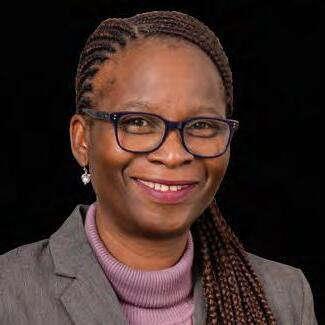
The need for sustainable utilisation of natural resources came to the fore again during the Covid-19 pandemic. The entrenched inequalities in communities across the globe became more evident and pronounced. Critical resources for mitigating the effects of the disease, including necessities such as water, sanitation and shelter, were inadequate or completely absent for many. Rising global temperatures, extreme weather events, and conflicts within and among nations are indicators of climate change and the struggle for survival on planet Earth. Sustainable wealth creation using renewable and non-renewable natural resources, sustainable environmental management, and the development of innovative ways of production with reduced water and energy footprints are all very important for the health of our climate-changing world.
Research Focus Area: The Environment, Climate Change and Sustainability actively promotes and supports sustainability-oriented activities. These include research, teaching and learning, community engagement, and gender issues relating to sustainable development and climate change.
Staff and students across disciplines at CPUT are invited to contribute to The Environment, Climate Change and Sustainability research focus area. For more information on how you can be part of this, please feel welcome to contact:
Niche Area 1: Climate Change & Sustainable Development
Dr Conrad Sparks sparksc@cput.ac.za
Niche Area 2: Climate Change & Sustainable Environment
Prof James Odendaal odendaalj@cput.ac.za
Niche Area 3: Cyclical Economy & Design for Sustainability
Prof Beatrice Opeolu opeolub@cput.ac.za
“Everyone can play a part in reducing greenhouse emissions and begin preparing for the adaptations due to climate change,” VC Prof Chris Nhlapo exhorted guests during his annual VC’s Prestigious Lecture 2023. The lecture was themed ‘Climate change: Implications for the Western Cape Mediterranean climate’, and was held at the Bellville Campus. Prof Nhlapo said being at the tip of Africa, it is the only place in South Africa that has a Mediterranean climate. “Our summers are very dry and hot, and our winters, cool, rainy and wet. We have to maintain the integrity of the biosphere.” Prof Nhlapo said drastic changes in human behaviours need to take place to avert ecological disasters.
“When you talk about industrial development, you have to balance that with the environment… development should be sustainable… It’s important that the greenhouse gases are reduced to minimal… What we can do, what you can do and what everybody else can do, we have to be advocates of climate change. We have to ensure that we deal with all those anti-science or contrarians to ensure that we can protect the climate. We can ensure that the world leaders know that we are counting on them. Then we can reach out to businesses that there must be ethical sustainable development. And then of course as a community we can play a role in terms of addressing the issues of sustainability.”
The respondents to Prof Nhlapo’s lecture, Prof Guy Midgley, Acting Director: School for Climate Studies at SU and Prof Gina Ziervogel, Director: African Climate and Development Initiative at UCT, both hailed the VC’s Prestigious Lecture and acknowledged that the battle against climate change “isn’t a hopeless fight”. Prof Ziervogel said, “I really liked the fact that you focused on the concept of the environment and sustainable development. She added, “It’s very important that local voices are heard.”
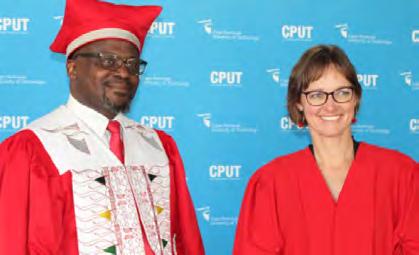
The iconic black Woolworths shopper bag took centre stage at the recent CPUT Green Campus Initiative Fashion Show. Students used these bags, along with other recycled items like newspaper, plastics, aluminium, steel, cardboard, magazines, books and black bags to create recycled or upcycled fashion pieces for the much-anticipated fashion show which happened over the long weekend in September.

Coordinator of the event, Ms Melani-Ann Hara, said students were involved in all aspects of arranging the fashion show including the design, modelling, styling and entertainment. “This was an ideal opportunity for students from a variety of faculties and courses like engineering, nursing and construction management to connect with fellow students outside of their respective departments and actively reduce, reuse and recycle.
Nursing student Che, 19, participated in the event for the second time as a designer and said their own experience as identifying as non-binary inspired their edgy denim look that encouraged inclusivity and looking at clothing in queer ways. “Denim was a very hard material to work with and one of my pieces incorporated a denim jacket reimagined as a skirt.” Industrial Engineering student, Mr Sifiso Bembe, won first place in the Recycled category for his unisex designs crafted out of Woolworths shopper bags. “Everyone knows the Woolworths bag, you can spot it a mile away. I wanted my designs to be unisex but wearable for both male and female,” he said.
Congratulations to:
• Recycled Category – Ms Faith Jansen (first), Mr Okuhle Lingani (second) and Ms Selina Maswanganyi (third)
• Upcycled Category – Mr Sifiso Bembe (first), Ms Banele Mbewana (second) and Ms Kgombiso Sekgobe (third)
• Mr GCI – Mr Ndumiso Ngcobo
• Ms GCI – Ms Tholoana Masitha
CPUT captured the theme of Mandela Day 2023 with members of executive management, deans, staff and students joining hands to plant 67 trees on the Bellville Campus. Mandela Day is a call to action for individuals, communities and organisations to take time to reflect on the late Madiba’s values and principles and to make a positive impact in their own communities. This year’s theme was ‘Climate, food and solidarity’.
The Horticultural Sciences Department’s Mr Hlokane Terence Mabela gave an insightful tree-planting demonstration to attendees, while VC Prof Chris Nhlapo planted the first tree before staff and students also got their hands in the soil. He said, “We need to know that our role is to preserve this planet because we only have one… Let’s keep
on building this institution. Let’s keep on tapping into Madiba’s legacy around making sure that today and every year Mandela Day is not merely a public holiday.”
The Green Campus Initiative’s Mr Wakuenda Alex Bukasa said that planting trees on campus not only enhances the beauty of the environment but also represents a tangible effort to combat climate change. “Each tree we plant acts as a natural air purifier, improving the quality of the air we breathe and reducing the concentration of pollutants. Furthermore, trees provide shade, reducing the need for excessive air conditioning and lowering energy consumption. The benefits of tree planting extend beyond climate change mitigation. They enhance biodiversity by providing habitats for various species of plants, animals and insects. Trees also play a
vital role in preventing soil erosion, conserving water and improving overall air quality.”
Mr Jan Odendaal of Green for Life said trees are the only things we leave behind that really leave a healthy footprint. “We plant trees all over South Africa. Our passion is to plant many trees at all the schools and universities in South Africa, so that the students and young adults of tomorrow can live in a cleaner, greener and healthier environment. The emphasis is on respect. We plant trees of hope and friendship.”
Student Mr Presley Makgolane, who is also involved in this project, commented, “We learned there’s a certain way to plant trees, and it was fun to name trees after ourselves. The value of planting a tree results in producing oxygen, which gives us life.”


Belvue Primary School is a public school in Belhar, dedicated to holistic child development, aiming to prepare students to be responsible citizens of South Africa and the world. CPUT’s SLCE Units and CCEWIL have been collaborating with the school on a food garden project. Belvue Primary School has a garden club called Green Fingers, comprising approximately 35 learners who showed a keen interest in gardening and food security. The Covid-19 pandemic negatively impacted the activities of Green Fingers, and CPUT stepped in to help revive the club. The 12 Shades of Green (a sustainability project aimed at promoting environmental awareness and sustainable practices), the CE Student Leadership Academy project team, and Advanced and Postgraduate Horticulture Sciences students supported the team by demonstrating various essential lessons in gardening.
The school principal, Mr Andy Josephus, welcomed CPUT students and thanked them for availing themselves in making the event successful. Formalities were followed by quizzes, various activities and planting of seedlings. Ms Jacqui Scheepers, Manager of SLCE Units, said the units have a long history of collaborating with the school as it is also the National Senior Certificate Examination venue for CPUT’s Second Chance Matric Rewrite project.
The learners discovered the importance of food and learned that having a garden is essential. They were also taught that planting is beneficial for the earth. “CPUT will continue to demonstrate and live its Vision 2030 through community engagement initiatives like these which serve both students and learners,” said Ms Scheepers.

Dr
sparksc@cput.ac.za
Dr Sparks was seconded to the position as the Acting Research Chair: Oceans Economy and Acting Director of the CPUT Centre for Sustainable Oceans (CSO) in April. The chair and the centre continue to concentrate endeavours on research that underpins regional and global advancements of oceans economies. Given Dr Sparks’ research in microplastics, the activities have shifted to focus attention on the impact and effects of plastics on ocean sustainability and economies, while continuing with the groundbreaking research initiated by the previous research chair, Prof Ken Findlay.
The acting research chair continues with the work of the previous chair, focusing on the following objectives:
• Implementing the Research Chair Strategy regarding ocean sustainability and economy, focusing on microplastics, plastic litter and the accounting of plastics in South Africa
• Initiate and maintain research partnerships within
CPUT, as well as nationally and internationally
• Supervise postgraduate students
• Engage with the marine and maritime sector regarding capacity building and knowledge sharing
Partnership development
CPUT projects initiated and/or in discussion
• ‘Effects of microplastics on cardiometabolic risk factors using in vitro models’, with collaborators Dr Shanel Raghubeer and Prof Glenda Davison, SAMRC/CPUT Cardiometabolic Health Research Unit
• ‘Ecotoxicological impacts of microplastics on marine organisms’, with collaborators Prof Janine Marnewick and Prof Marilize le Roes-Hill, AMHBI.
• ‘Microplastic and dioxin content of mussels (Mytilus galloprovincialis and Choromytilus meridionalis) from marine aquaculture systems in Saldanha
Bay’, with collaborator Prof Maretha Opperman –LIMAQUA NRF-funded project
• ‘Reducing the impact of microplastics release from fabrics through finishing, filtration systems and the impact on marine invertebrates and climate (ReduMicro)’, with collaborator Dr Sweta Patnaik, Department of Clothing & Textile Technology
• ‘Top surface sea plastic waste detection using satellite images and AI segmentation tools’, with collaborators Prof Innocent Davidson (F’SATI), Prof Lamine Dieng (UGE), Prof Anish Kurien (TUT) and Prof Eva Dokladalova (UGE, ESIEE)
• Initiated and partnered with the Department of Mathematics and Physics in offering a Statistics Workshop using SAS in December
• Offered three workshops for postgraduate students
• Community Engagement: The CSO is collaborating with Dr Courtney Ann Puckree-Padua of the Department of Conservation & Marine Sciences to work with South Peninsula High School Marine Science learners
Local and national engagements
• A Strategic Partnership Agreement with the Fisheries Economic Development Research, Advisory and Training Institute (FEDRATI), an industry-funded NPO, was signed this year
• A Project Agreement was signed with Nelson Mandela University to lead inputs to the NRF Ocean Accounts Community of Practice, to develop a Plastics Account for South Africa
• Dr Sparks was appointed Chair of SAIMI’s Fisheries Skills Expert Group
• Dr Sparks was invited by SAIMI to attend the Round-Table Discussion on Measuring the Size of the Ocean Economy, in Pretoria in November
• Invitation: WRC Reference Group committee member
• Invitation: NRF rating reviewer
International engagements
• Via the CSO, CPUT was awarded membership to the Global Ocean Accounts Partnership (GOAP) in December
• Funds were awarded for a doctorate project titled ‘Sources, pathways, and impacts of macro- and microplastics in the Lake Victoria ecosystem, Tanzania’
• Dr Sparks visited the Center for Coastal Management-Africa Center of Excellence in Coastal Resilience (CCM-ACECoR) at the University of Cape Coast
• Dr Sparks visited and initiated an MoU with the School of Aquatic Sciences and Fisheries Technology, University of Dar es Salaam
• Dr Sparks is a member of SETAC Africa Council and was a member of the Scientific and Organising Committee for SETAC Africa’s Biennial
Conference held in Accra, Ghana in October
• Attended the 2023 Western Indian Ocean Science Policy Platform (WIO-SPP), with the theme ‘Addressing global targets in the WIO in support of a sustainable blue economy’, in Maputo in December
• Invited to be Co-PI for the development of a Knowledge Network for Western Indian Ocean (WIO) expertise on plastic pollution, known as KNET-WIO, which aims to bring together experts from Tanzania, Kenya, and South Africa to address the pressing issue of plastic pollution in the region
• Mr Sanjay John, MTech: Oceanography, ‘Factors affecting catch per unit effort of the experimental fishery Octopus vulgaris pot fishery in South Africa’, supervised by Dr Sparks and Ms Singh
• Mr Liam Ferguson, MTech: Oceanography, ‘Environmental microplastic exposure and uptake in selected filter-feeding, grazing and scavenging invertebrates of a rocky shore in False Bay, South Africa’, supervised by Dr Sparks and Dr Awe
• MsWhitney Samuels, Master’s: Marine Science, ‘Microplastics in Zandvlei Estuary and associated urban tributaries’, supervised by Dr Sparks
• Ms Danielle Julius, Master’s: Marine Science, ‘Environmental concentration and uptake of microplastics in selected sea cucumbers and sea urchins (Echinodermata) in South Africa’, supervised by Dr Sparks and Dr A Awe
• Mr Rushdi Ariefdien, Master’s: Marine Science cum laude, ‘Impacts of stormwater outlets on microplastic concentrations and characteristics in coastal water, sediment and biota along the Cape Peninsula’, supervised by Dr Sparks
• Ms Bianca Tree, Master’s: Conservation Science, ‘Population structure and migration links of southern African east coast humpback whales (Megaptera novaeangliae) using photographic identification techniques’, supervised by Dr Sparks, Prof Findlay and Dr Olbers
• Mr Asmat Khan, Master’s: Environmental Management, ‘Occurrence and ecotoxicological effects of microplastics in the Diep River, Milnerton, Cape Town’, supervised by Prof Opeolu and Dr Sparks
• Mr Alex Wakuenda Bukasa, Master’s: Environmental Management, ‘Characteristics and distribution of litter and microplastics in Table Bay, Cape Town, South Africa’, supervised by Dr Sparks
• Mr Komlan Apetogbor, Master’s: Environmental Management, ‘Ecological and human health risk assessment of microplastics in the Plankenburg River, Stellenbosch, Western Cape’, supervised by Prof Opeolu, Dr Sparks and Dr Pereao
DHET-accredited peer-reviewed journal articles
• ‘Spatio-temporal distribution of microplastics in water and sediment samples of the Plankenburg River, Western Cape, South Africa’, in Environmental Pollution https://doi.org/10.1016/j. envpol.2023.121303
• ‘Environmental concentrations, characteristics and risk assessment of microplastics in water and sediment along the Western Cape coastline, South Africa’, in Heliyon https://doi. org/10.1016/j.heliyon.2023.e18559
• ‘Characteristics and risk assessment of microplastics in water and mussels sampled from Cape Town Harbour and Two Oceans Aquarium, South Africa’, in Bulletin of Environmental Contamination and Toxicology, 110 https://doi. org/10.1007/s00128-023-03737-1
Book chapter
• ‘Impacts and Threats of Marine Litter in African Seas’, in The African Marine Litter Outlook, Springer International Publishing https://doi.org/10.1007/978-3-03108626-7_3
Technical reports
• ‘Clean shores, great lakes: Preventing microplastics from entering the African Great Lakes through citizen science cleanups’, in IAGLR Lakes Letter (fall edition)
• ‘Microplastics and associated chemical contaminants in Cape Town, South Africa’, Jennifer Ward Oppenheimer Research Grant: 2023 Report
Conference and keynote presentations
• Dr Sparks was the key guest speaker at World Fisheries Day Celebrations & Career Expo, World Fisheries Day 2023 ‘Celebrating the Wealth of Fisheries and Aquaculture’, held in Cape Town in November.
• He was also a guest speaker at the Clean Shores, Great Lakes project in Mwanza, Tanzania. This included a dissemination workshop to government departments, local authorities and affected communities and organisations. The project was funded by NORCE under the leadership of Dr Farhan Khan (PI). The
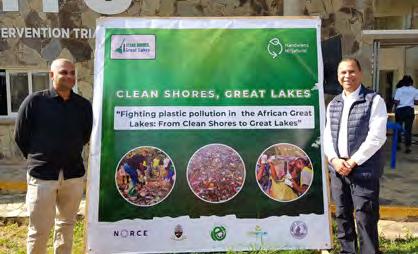
presentation took place in Mwanza, Tanzania in September.
• Dr Sparks was invited to speak to the University of Cape Coast’s academic staff and postgraduate students. His talk was titled ‘Staff and postgraduate discussion on potential collaboration between CCM-ACECoR and CPUT’. This took place at the Centre for Coastal Management–Africa Centre of Excellence in Coastal Resilience (CCM-ACECoR), in the Cape Coast, Ghana in October.
• He also spoke on ‘Microplastics in the coastal environment of the Western Cape, South Africa: Is there cause for concern?’ at SETAC Africa 11th Biennial Conference, in Ghana in October.

“It is abundantly clear that the CPUT executive and management’s hearts are geared towards the development of marginalised persons to reach their full potential,” said Dr Mark Botha, Managing Director: Fisheries Economic Development Research Advisory and Training Institute (FEDRATI). Speaking at the formal launch of the FEDRATI and CPUT strategic partnership at the Granger Bay Campus, Dr Botha said, “Today, my dream is being realised thanks to industry as represented by Brimstone and Sea Harvest, and academia as represented by CPUT. That is, the advancement of the fisheries sector through a strategic collaboration between academia and industry.”
The new strategic partnership agreement concluded between FEDRATI and CPUT is expected to boost the South African Oceans Economy and, in particular, the Small-Scale Fisheries Economy. This
partnership is supported by South African Fisheries Development Fund. FEDRATI initiated the partnership and provides a vehicle for industry (currently Brimstone Investment Corporation and Sea Harvest Corporation) to interact with academia (in this case CPUT) to foster synergistic institutional relations. “In doing so, the fisheries economy is being advanced,” said Dr Botha.
To date, FEDRATI has awarded bursaries to postgraduate students in excess of R2 million for fisheries and allied sectors research. Dr Botha, who has been actively involved in the fisheries sector for 22 years, said several challenges facing the sector have been identified. These include the lack of resources, training, and research to meet the sector’s economic developmental needs. Dr Botha had presented the collaboration concept to CPUT with backing from industry who

instantly bought into the concept. With the assistance of the former and current Research Chairs of CPUT’s Oceans Economy and Centre for Sustainable Oceans, Prof Ken Findlay and Dr Conrad Sparks, and the executive management at CPUT, the concept morphed into an institutional strategic partnership between CPUT and FEDRATI.
In his opening remarks, the DVC: RTIP Dr David Phaho recognised the presence and contributions of executives from Sea Harvest, Ms Mary-Lou Harry, the COO, Mr Konrad Geldenhuys, Dr Botha as well as executives from Brimstone Investment Corporation under the leadership of Dr Fred Robertson. Dr Phaho said, “Central is our commitment to focus on research activities which have a tangible impact on society as well as focusing on skills development which are aligned to the needs of the industry. CPUT is deeply appreciative of the overwhelming support of FEDRATI through its funders for our postgraduate bursary programme and the mutually beneficial partnership with our Centre for Sustainable Oceans.”
Acting Chair: Centre for Sustainable Oceans, Dr Conrad Sparks, said “The partnership will strengthen opportunities for CPUT (via the Centre for Sustainable Oceans) to build on its strategic plan Vision 2030, in particular Focus Areas 2, 6 and 7 within the fisheries (and related) sectors.”
Director: DRD Prof Dina Burger thanked all the dignitaries representing the respective stakeholders for the opportunity to partner and journey with them and for the collective efforts to support CPUT research as well as the students. Prof Burger explained that the research and projects in which they would ideally prefer to be involved should originate from the community and be carefully co-planned and created between the community and CPUT researchers and ultimately find their way back to the community of origin. “I encourage the interim chair Dr Sparks to engage with the communities present from the West Coast to jointly decide on the most pressing issues of concern that they believe we should research.”
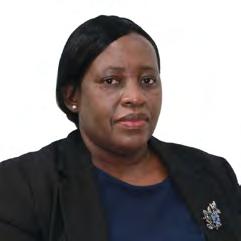
Prof Bongani Ncube
ncubeb@cput.ac.za
CPUT was awarded the SARChI Research Chair in Governance & Economics for Water & Sanitation Sector Institutions after a competitive review process in 2021. The chair is hosted at the Centre for Water and Sanitation Research (CWSR). In 2023, Prof Ncube continued leading the Research Chair and implementing Head of Centre responsibilities at the CWSR.
CWSR was established in the early 2000s with a focus on:
- Identification and establishment of water-related activities based on regional and national priorities
- Facilitation and execution of interdisciplinary
research projects which generate outputs, income and postgraduate opportunities
- Development and maintenance of partnerships on behalf of CPUT in the water sector regionally, nationally and internationally
The SARChI Research Chair is funded by the DSI, the WRC and the NRF. The Research Chair focuses on seven main objectives:
- Development and implementation of the Research Chair strategy focusing on governance, financial and economic viability, and security for water sector institutions
- Establishment of research partnerships that advance the programme of the Research Chair
- Supervision of master’s and doctoral degrees
- Organisation and facilitation of seminars, colloquia and symposia
- Enhancement of staff research capacity for both the Research Chair and CWSR
- Development of intellectual and knowledge synergies with the host faculty and department
- Facilitation of sectoral knowledge transfer
In achieving the research objectives, the Research Chair explores factors such as the impact of extreme events, financial sustainability models, and economic regulation of the water and sanitation sector in terms of service delivery, pricing and tariff impacts. This also includes financial modelling, data
science and benchmarking to improve municipal financial systems. The Research Chair is guided by frameworks and policies such as the UN’s SDGs 2030; the South African NDP 2030); the Water Research, Development, and Innovation Roadmap (RDI, 2015 to 2025); and other prevailing national policies, legislation and strategies.
• Prof Ncube co-hosted a special session ‘Water governance and economics as enablers for innovation and integration in sustainable water resource management’ at the 24th WaterNet/ WARFSA/GWP–SA Symposium in October. The session was hosted in collaboration with Prof Larry Swatuk (University of Waterloo, Canada), Prof Stefano Farolfi and Prof Damien Jourdain (CIRAD, France), Mr John Dini (WRC), Prof Hodson Makurira (University of Zimbabwe), and Prof Maxwell Mudhara and Dr Aidan Senzanje (UKZN). WaterNet Executive Manager, Prof JeanMarie Kileshye Onema, gave opening remarks, while WRC CEO, Dr Jennifer Molwantwa, gave closing remarks.
• Prof Ncube attended two quarterly meetings of the Water and Sanitation Sector Leadership Group in July and November.
• The Inaugural NRF/WRC Research Advisory Committee Meeting of the SARChI on Governance and Economics for Water and Sanitation Sector Institutions was held in April.
• Prof Ncube was invited by the Minister of the Department of Water & Sanitation to chair the Advisory Committee to select the board of the Breede–Olifants Catchment Management Agency (BOCMA) to support the operationalisation of the catchment management agency.
• A new project titled ‘Fresh and marine water management for food security and water democracy’ was awarded by the NRF, with Prof Ncube as project leader. The project is a collaboration between the Swedish University of Agricultural Sciences, Stockholm University, UWC, SU and CPUT, with support through SASUF for collaborative research.
• The WRC-funded research project titled ‘Water governance, institutions, and infrastructure integration for climate-resilient pathways for smallholder farming systems in the Western Cape, South Africa’ continued in 2023. The inaugural Reference Group Meeting was held in February, and two technical reports were submitted in May and August.
• The final meeting of the Global Challenges Research Fund (GCRF) project ‘Supporting transformative adaptation and building equitable resilience to drought for sustainable development’ was held in February. Project data files were submitted. Prof Ncube participated in reviewing and editing two related journal articles.
• CWSR hosted Prof Larry Swatuk from the University of Waterloo, Canada for joint proposal writing and the discussion of future collaborative research.
• During 2023, the Research Chair continued setting up and establishing new partnerships and finalising those that were started in 2022. In March, a framework agreement for scientific cooperation was signed between CPUT and the French Agricultural Research Centre for International Development (Centre de Coopération Internationale en Recherche Agronomique pour Le Développement (CIRAD, 2023 to 2027). Under this framework, a partnership agreement was signed in August, between the SARChI Research Chair (CPUT) and UMR G-EAU (CIRAD) that facilitates joint proposals and research, joint training, student exchange and co-supervision, staff exchange and visiting scientist activities.
• An MOU was signed between UKZN and CPUT to facilitate research collaboration, joint proposal writing and student co-supervision through the Research Chair.
• A partnership was established with the Swedish University of Agricultural Sciences and Stockholm University through the South Africa-Sweden University Forum (SASUF).
• CPUT was admitted as a full member of the WaterNet regional network at their AGM in November, with Prof Ncube as the contact person and Dr Elma Maleka as the seconder.
• A partnership document with the SU’s Water Institute reached signing stage at the end of 2023. The partnership aims are collaborative
research, technical and training cooperation, and facilitating capacity development cooperation between the two institutions.
• Partnerships were discussed with the University of Limpopo and the University of Pretoria to collaborate with the Research Chair to strengthen research and postgraduate student cosupervision.
• Two government partnerships are under development with the Department of Water and Sanitation and the Western Cape Department of Agriculture.
Publications
DHET-accredited peer-reviewed journal articles
• ‘Deriving surface water storage and curve numbers from rainfall–runoff relationships in conventional and minimum tillage systems in Gwanda, Zimbabwe’, in Applied Sciences https:// doi.org/10.3390/app13179623
• ‘Support services to smallholder farmers during the 2015 to 2018 drought in the Overberg and West Coast districts, South Africa’, in South African Journal of Agricultural Extension https:// doi.org/10.17159/2413-3221/2023/v51n2a13086
• ‘The rhetoric of community participation in urban South African water governance’, in Utilities Policy https://doi.org/10.1016/j.jup.2023.10157
• ‘Temporal changes in minimum and maximum temperatures at selected locations of Southern Africa’, in Climate https://doi.org/10.3390/ cli11040084
• ‘Micromineral content of Swiss chard (Beta vulgaris L. var. cicla) leaves grown on zeoliteamended sandy soil’, in Indonesian Journal of Agricultural Research https://doi.org/10.32734/ injar.v5i03.10038
• ‘Cabbage and Swiss chard yield, irrigation requirement and soil chemical responses in zeolite-amended sandy soil’, in Asian Journal of Agriculture and Biology https://doi.org/10.35495/ ajab.2021.11.387
• ‘Crop productivity, nutritional and economic benefits of no-till systems in smallholder farms of Ethiopia’, in Agronomy https://doi.org/10.3390/ agronomy13010115
Technical reports
• Report on climate change impacts and drought on water resources in Genadendal and Goedgedacht, for WRC
• Report on the performance of agricultural water infrastructures that supply smallholder farmers, for WRC
Conference participation
Prof Ncube and Prof Veruscha Fester participated in the 1st International Water Association (IWA) Non-Sewered Sanitation (NSS) Conference in Johannesburg in October. Prof Ncube participated in an online roundtable of the Agri4D 2023: Building Resilient Food Systems in Uncertain Times. This took place in September and was hosted by the Swedish University of Agricultural Sciences (SLU) and the Swedish International Agriculture Network
Initiative (SIANI). Prof Ncube was a keynote speaker at the Innovative Solutions (Innosol1_2023) Workshop hosted by FEBE in August. She also attended the Africa Week 2023 and the Sustainable Development Solutions Network Member Meeting at the University of Pretoria in May.
• Prof Ncube co-hosted a workshop with the Swedish University of Agricultural Sciences at the SASUF Research and Innovation Week 2023: Sustainability Forum hosted by SASUF at the University of Western Cape in March. She also attended the SDG6 Mid-Term Review hosted by the Department of Water and Sanitation in Pretoria in March.
• Six smallholder farmer workshops were presented at the Transfer of Water Research Commission Knowledge Products Expo held in February/March in Giyani, Limpopo.
Conference presentations
• ‘An interface between indigenous knowledge and legislative frameworks and scientific research for sustainable water management’, at the 24th WaterNet/WARFSA/GWPSA Symposium, in Zanzibar in October
• ‘Structural configurations for South African urban water governance: The case of Cape Town’, at the 24th WaterNet/WARFSA/GWPSA Symposium, in Zanzibar in October
• ‘Cooperation in common property resource management: A group engagement approach’, at
the 24th WaterNet/WARFSA/GWPSA Symposium, in Zanzibar in October
• ‘Smallholder farmer coping and adaptation strategies for agricultural water use during drought periods in the Overberg and West Coast Districts’, at the Western Cape Department of Agriculture’s Annual Departmental Extension and Advisory Services Symposium, in Saldana Bay in July
• ‘Indigenous knowledge perspectives on water management in South Africa’, at Confluency – Water Justice Colloquium & Art Exhibit Linking South Africa, Canada, and Broader Africa, at UCT’s Future Water Research Institute in June
Through the SARChI Research Chair, NRF awarded one master’s and one PhD scholarship that started in 2023. One master’s student, Mr Simphiwe Mthokozisi Dude, submitted his thesis in December.
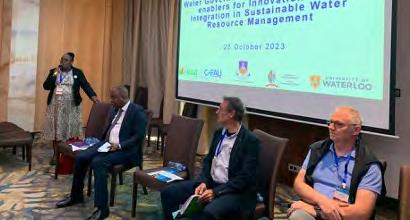
IN10278/20000338C2022/202300845
IN10351/20000338C2022/202300845
IN10623/ 20000338 C2022/202300845
To continue the facilitation of a partnership with the Centre de coopération internationale en recherche agronomique pour le développement (CIRAD), CPUT hosted a CIRAD delegation through the SARChI Chair in Governance & Economics for Water & Sanitation Sector Institutions in January. CPUT met with two delegations from CIRAD, France. The main objectives of the meetings were to further exchange ideas concerning the Research Chair, led by Prof Bongani Ncube, and to discuss other potential areas of collaboration. In the first meeting, CPUT representatives, Prof Ncube, Prof Veruscha Fester, Prof Karabo Shale, and Dr Elma Maleka, met with Dr Jean Marc Bouvet, the CIRAD Regional Director for Southern Africa and Madagascar, a representative of INRAE, and Prof Damien Jourdain of CIRAD UMR G-EAU and UP.
Prof Ncube said the meeting was a follow-up on the development of an institutional partnership, which was already in an advanced stage. During the meeting, she gave a presentation on the Research Chair. Prof Fester (FEBE) and Prof Shale (FAS) each presented an overview of their respective faculties. Dr Bouvet presented an overview of CIRAD, emphasising the importance of water and how it needs to be managed well. Director: DRD, Prof Dina Burger, joined the meeting online and echoed the importance of water, touching on the water–energy links with sustainability, health, and economics.

Prof Veruscha Fester
festerv@cput.ac.za
of Engineering & the Built Environment
The Flow Process & Rheology Centre (FPRC) was founded in 1995. The centre applies the fundamental principles and techniques of rheology to solve industrial problems such as deformation and flow under different shear, material structure and process flow conditions. Since its inception, FPRC has produced over 100 peer-reviewed publications.

In the second meeting, the DVC: RTIP, Dr David Phaho, paid a courtesy call to the president and CEO of CIRAD, Ms Elisabeth Claverie de Saint Martin, and Dr Philippe Petithuguenin, the CIRAD Director of Research and Strategy. Dr Phaho was accompanied by Prof Ncube and Prof Shale. Prof Ncube summarised the content of the partnership document that is under development. She commented, “The meeting received a positive response, with Dr Petithuguenin assuring the CPUT delegation that CIRAD was happy to strengthen the collaboration, and that water governance is a relevant topic, which has a regional dimension, and they gave their support.”
The centre’s core activities include:
• Rheological characterisation and modelling of concentrated emulsions, suspensions, solutions and polymer melts and wastewater sludge, and modelling of the phenomena of micro- and nanostructural evaluation involved in the mixing, pumping, transportation and storage processes of multiphase systems
• Modelling non-Newtonian flows in pipes, fittings, open channels, tanks and pumps
• Instrumentation systems to measure in situ concentration and particle velocity in settling slurry and coarse particle flow, and visualisation in pipes and complex geometries
The team members are Prof Veruscha Fester, Dr Morakane Khahledi and Dr Nsenda Tshilumbu, along with two master’s students and two doctoral students.
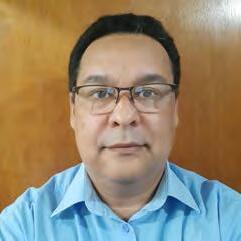
Prof James Odendaal
odendaalj@cput.ac.za
The Environmental Chemistry, Toxicology and Remediation research group focuses on chemical and biological assessment and monitoring of environmental pollution. It also focuses on the development of remediation techniques to manage environmental pollution, as well as environmental and human health risk assessment.
Various research projects are undertaken by staff and postgraduate students in different academic disciplines, from environmental sciences to biology. Certain projects zoom in on the impacts of metal pollutants on water quality and riverine biodiversity. Plants and animals are used as biomonitors to assess the effects of pollution on the biological components of the environment. Some student projects are done in the aquatic environment, where they are investigating metal pollution and bioaccumulation of some urban rivers and estuaries. Other research done in this group is aimed at studying the effects of pollutants in the terrestrial environment.
An investigation on the impact of urban pollution of an estuary in Cape Town focused on metal contamination or water and sediment, as well as bioaccumulation in algae. This study dealt with identifying point and non-point sources of pollution associated with this estuary. Another master’s degree student is investigating possible changes in the pollution profile of a river system over
several years. The goal here is to assess the impact of growing anthropogenic activities in Cape Town on this river system. Other postgraduate studies are assessing the effects of illegal solid waste dumping at a local informal settlement on microbial and metal contamination of soil. Contamination of soil may result in it being unfit for food gardening and may increase the health risk that residents, especially children, are exposed to.
This research group wants to contribute to the body of scientific knowledge with regard to a variety of crucial environmental concerns. We hope that the research will contribute to the understanding of the impacts of human activities on the functioning of the natural environment. Ultimately, the goal is to eventually, through the research activities and outputs, contribute to the development of environmental policies, legislation and environmental guidelines and standards for South Africa.
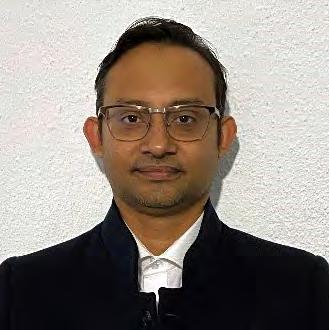
Principal Investigator (FEBE)
chowdhurym@cput.ac.za
Responsible for sub-units:
Functional Nanomaterials
Electrochemical Sensors
Photoelectrochemical Sensors
Fuel Cell

Prof Veruscha Fester
Principal Investigator (FEBE)
festerv@cput.ac.za
Responsible for sub-units:
Nanomaterial based environmental remediation
Nanomaterial Synthesis
Naomateriasl for energy generation
[Please note: This research group is also involved with projects in FA 5]
The Nanomaterial Research Group (NRG) at CPUT is the first established research group dedicated to studying both the fundamental and applied aspects of synthesising, characterising and applying various metal oxide (MOX) nanomaterials. NRG has developed MOXs for applications in environmental remediation, sensing and energy generation.
NRG’s vision and mission are to become a world-leading research hub that develops cutting-edge solutions to societal challenges. The group aims to contribute to society by using nanoscience and nanotechnology tools to improve lives.
Publications from the group can be found via the links below:
• Prof Veruscha Fester http://tiny.cc/6o6puz
• Dr Mahabubur Chowdhury https://tinyurl.com/j5w7e9hv
FOCUS AREA 5
Human, Health & Social Dynamics
besterd@cput.ac.za

The Human, Health & Social Dynamics (HHSD) research and innovation focus area at CPUT intersects with the UN’s SDGs 1, 2, 3, 4, 5, 8, 10, 11, 16 and 17. These address an array of social, economic, health, political, legal, scientific and technological issues. They stimulate trans/multi/ interdisciplinary thinking to challenge South African researchers, industry and policy developers to answer existing questions and create new disciplines and develop new, relevant and applicable technologies.
This focus area contributes to greater global understanding and builds knowledge of shifting human, health and social dynamics. This supports trans/multi/ interdisciplinary collaborative research, and responds to the needs of our South African society. Opportunities include the integration of strong theoretical and empirical links, enabling the following multidisciplinary research approaches to integrate personal, societal and environmental transformation in order to:
• Promote humanity and humaneness in the 21st century
• Create spaces where researchers collaborate and conduct research in a trans/multi/interdisciplinary manner across disciplines, faculties and units at CPUT
• Develop the capacity to deconstruct boundaries and interrogate the ways in which members of society may intersect with and reinforce one another
• Create a social and structural justice orientation which enables work towards a transformed society
In addition, and more specifically, the word ‘technology’ in our One Smart CPUT brief provides us with a special focus on research into human, health and social dynamics. Technology necessarily entails a close relationship between the university and society, which includes working life and creating a sense of human-centredness. Technology enables this new description.
Human, health and social science research at a UoT would then, firstly, serve to problematise and improve the relationship between university curricula and practices and those of broader society, e.g., through integrated learning initiatives. Secondly, research can highlight how technology and new ideas may be taken up by society in different ways (i.e., accepted, changed, shelved or rejected), and how changes in human, health and social innovations can be harnessed for the benefit of society.
• Connecting societies: Crossing boundaries, inside and outside the university, developing and bridging people for well-being and social cohesion
- Sustainable Development Goals: 1, 3, 4, 5, 8, 10, 16 and 17
- National Development Plan chapters: 8, 9, 10, 12, 13 and 15
• Empowerment: Purposive agency, care and the ethics of care, services and practices, transformation and 21st century innovations such as the 4th Industrial Revolution
- Sustainable Development Goals: 1, 3, 4, 5, 8, 10, 16 and 17
- National Development Plan chapters: 8, 9, 10, 11, 12, 13 and 15
• Human Rights: Freedom, health, equality, dignity, Ubuntu, access to service and justice, and ethics
- Sustainable Development Goals: 1, 2, 3, 4, 5, 8, 10, 11, 16 and 17
- National Development Plan chapters: 7, 8, 9, 10, 11, 12, 13 and 15
• Health and Well-being: Quality of life, wellness in communities, service delivery, social determinants of health, food security, technology for well-being
- Sustainable Development Goals: 1, 2, 3, 4, 5, 8, 10, 11, 16 and 17
- National Development Plan chapters: 7, 8, 9, 10, 11, 12, 13 and 15

The SLCE Units, Community Engagement and WIL has embarked on a food garden project at Excelsior High School in Belhar. The initiative was driven by the Green Legacy student team and the Civic Engagement Student Leadership Academy. In the academy, student teams are required to align their individual projects with the UN’s SDGs. This project is aligned with the second goal, creating a world free of hunger by 2030. Excelsior High School, in conjunction with the WCED feeding scheme, makes provision for approximately 300 learners to have a meal daily.
“Each student and staff member at CPUT represents a community. Embarking on projects of such a nature reduces food insecurity and instils a sense of responsibility in learners at a very young age to adjust their thinking in terms of food security,” said Mr David Haarhoff, project leader. Mr Luthando Ndayi, group leader
of Green Legacy, emphasised the importance of food garden projects and their positive impact on society in general. The programme started with formalities, followed by a quiz and then the planting of crops. Horticulture students partnered with the SLCE units by offering expert advice and guidance to both learners and students.
“We are extremely grateful for Shadowlands Nursery’s contributions toward crops planted at the school,” said Mr Haarhoff.
Ms Jacqui Scheepers, Manager SLCE, indicated that projects like these provide opportunities for students to engage and contribute to society in an interdisciplinary and intercultural environment, which is in line with CPUT’s Vision 2030. “Engaging with our students in Civic Engagement projects allows for learners to consider and to view post-school studies, hopefully at CPUT, as a future option.”
The CPUT Men’s Conference, held at the Bellville campus in September, centred around the theme ‘Shaping our lived experiences to redefine our role as men in society’. The conference covered a range of topics, including addressing the types of abuse faced by men, experiences of LGBTIQ or queer men, and experiences of men with disabilities.
The objectives were to:
• Address the social norms in men’s society
• Promote men’s development through mentorship
• Equip CPUT men with different tools to handle social norms
• Acknowledge men who have been making a difference
• Propose a CPUT Men’s Charter and/or Men’s Forum
VC Prof Chris Nhlapo welcomed attendees and said, “We are here to build each other as men and to tell each other the truth”. He said, “This Men’s Conference gives us an opportunity to reflect on the road ahead, what remains to be done in our quest for gender equality, and how we might harness our collective energy, our collective effervescence or joie de vivre as they say in French.”
Messages of support were delivered by Mr Thamsanqa Zondi, Secretary General: Central SRC; Mr Danwer Tromp, Amajita’s Men’s Programme; and Mr Lutho Runeli from the HeForShe Programme. Mr Ndumiso Madubela, Programme Specialist: Adolescent Boys and Young Men at NACOSA, delivered the keynote address titled ‘Addressing the societal norms, lived experiences and role of men which is perpetuated by society in defining men in Higher Education and society in general’.
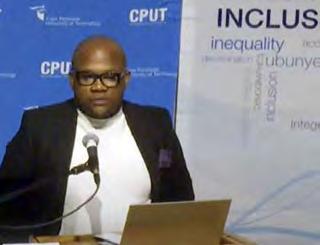
The conference also honoured several men who have been making a difference at CPUT through the Inspiring Young Men 2023 Awards. “The organisers of this event requested nominations of students for this conference who they would like to recognise and celebrate for their excellence and talent as well as their positive contribution to the CPUT community and beyond,” said Dr David Phaho, DVC: RTIP.

The SLCE Units and CCEWIL, in collaboration with Lovafriworx CEO, Ms Lovetta Bolters, hosted an Emergency Medical Services (EMS) interdisciplinary project in Mossel Bay, led by EMS lecturer and SL departmental coordinator, Mr John Meyer. The purpose of the project was for students to empower a group of 30 community members from the southern Cape with necessary basic first aid skills to promote employability. The focal points of the project training included Basic Life Support (BLS), Cardiopulmonary Resuscitation (CPR), relief from choking, and basic first aid level wound dressing and bleeding control.
Mr David Haarhoff, CE project leader, said that community engagement projects of this nature are critical and could be the decider between life and death before medical emergency services are dispatched to a scene, particularly in remote and under-resourced communities. Mr Haarhoff said that skilled first responders can assist a distressed patient and save a life. The dedication and commitment displayed by community members to complete their project training was commendable. CPUT’s social footprint has become prevalent within surrounding communities. “It is extremely important that we continue to make inroads into our Vision 2030 strategic blueprint,” said Mr Haarhoff.
EMS Course facilitator, Mr Athenkosi Sobada, said the students were great to teach and engaged very well. “You could tell they wanted to learn by the interest they had in the course content and asking questions to get clarity about previous cases they encountered. As the course is SETA-accredited, the learners can go to the nearest schools and ambulance services to work as first aiders when they have sports events and can be remunerated.” SLCE Manager, Ms Jacqui Scheepers, said the students were inspired by the passion and dedication of the community participants and by the positive impact which the programme and their contributions had on the community.

Oral Health Month is celebrated in September, and the Dental Sciences Department marked the occasion by giving back to the community. Lecturer Ms Nyembo Maskini said the department had the privilege of collaborating with dental students and staff from UWC on an outreach in Grabouw. Ten Dental Assistant students were selected to work on the Phelophepa train over two days. Students, under staff supervision, screened and attended to 88 patients. Treatments included consultations, cleanings, extractions and fillings as needed. “The department would like to thank UWC Dentistry staff and students for the amazing teamwork over the weekend. It was an absolute pleasure to collaborate on the outreach. We are grateful to Dr Khabiso Ramphoma from UWC Community Dentistry for the relationship and look forward to more collaborations in the near future,” said Ms Maskini. She also thanked CPUT for providing transport.
The department also held an oral health awareness session at the Handjiesvol Hospital Creche at Tygerberg Hospital. Ms Maskini said children between the ages of two and six were attended to by three Dental Assistant students together with herself and Ms Eleanor Andrews. “We had the children watching videos, which showed them how to brush and why they should brush their teeth and also how many times a day. Thereafter, we had the children play games, indicating the difference between healthy teeth and unhealthy teeth. Lastly, we gave the children healthy oral hygiene colouring booklets to colour in at home.”
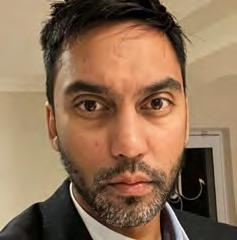
Prof Zayd Waghid
waghidz@cput.ac.za
In 2023, Professor Zayd Waghid was appointed Interim Leader for the National Research Foundation’s (NRF) South African Research Chair Initiative (SARChI) in Teacher Education and Acting Director of the Global Institute for Teacher Education and Society (GITES). Professor Waghid is an NRF-rated researcher, a recipient of the CHE-Heltasa National Teaching Excellence Award (Commendation) and a Fulbright Alumnus. GITES was officially established in 2023 following its successful approval by the Senate and the Council of CPUT. The institute aims to enhance teacher education and contribute to educational research and policy development. The institute is known for its interdisciplinary approach, addressing issues of social and cognitive justice in education.
The GITES research programme covers four research streams with supporting research projects:
1) Quality teachers for equitable and quality education for all in South Africa
2) Teacher experiences of continuing teacher professional development (CPD)
3) The future of progressive education and social policy in South Africa
4) Education Interventions – Quality and Equitable Education for All
GITES focuses on generating knowledge about initial teacher education, continuous professional development, public–private partnerships, and teaching and learning during crises and disruptions. The institute is invested in developing research capacity among emerging and established researchers in the faculty, and among postgraduate students, postdoctoral fellows and research fellows. The institute does this through workshops, writing retreats, monthly seminars and an annual symposium on teacher education. The institute comprises the research chair, postdoctoral fellows, research associates and other staff involved in research and supervising postgraduate students.
In its third phase, this SARChI chair builds on the innovative and relevant research agenda established during its first and second phases. The chair and institute continue to contribute to scholarships in teacher education nationally, regionally and globally. Its research programme encompasses the following key themes: ‘Initial teacher education’, ‘Continuing professional teacher development’, ‘Teacher pedagogy study’, and ‘Public-private partnerships and teacher education’.
CITE hosted the Symposium on Teaching for Social Justice 2023 at Cape Town Hotel School, Granger Bay Campus in October. Supported financially by the NRF, the symposium’s theme was ‘In pursuit of equity: Disrupting social injustice in higher education in South Africa in a post-Covid era’.
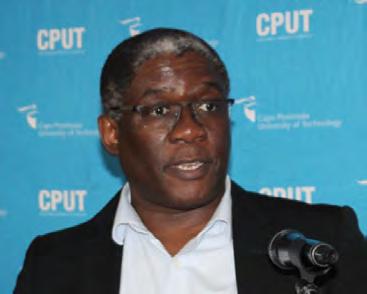
CITE Director, Prof Zayd Waghid, said the symposium was aimed to facilitate the discussion of ideas and perspectives that can transform and re-evaluate the prevailing discourses concerning social justice within education. “It presented a valuable opportunity to engage in innovative discourse, derive fresh insights, and establish collaborative networks.” The symposium was established in 2023 under the leadership of Prof Waghid, the current interim SARChI Chair.
In his opening address, DVC: RTIP Dr David Phaho revealed that earlier this year, the CPUT Council approved the business plan to turn CITE from a Centre to an Institute, henceforth to be called The Global Institute for Teacher Education and Society (GITES). The new entity is envisaged to focus on multidisciplinary and transdisciplinary research and innovation. “It would be the first of its kind in Southern Africa and aims to generate knowledge in the social sciences with a particular focus on building and promoting scholars and scholarship in the Global South.” Dr Phaho added that the drive for access to higher education for all deserving students is topical in South Africa and beyond our borders.
Prof Kirti Meno from UJ presented on ‘Pedagogical continuities in teaching and learning in a ‘supercomplex’ higher education system’. Prof Meno said demands on higher education in South Africa have resulted in universities having to respond to the multiplicity of needs of the new South Africa while still grappling with the constraints of the apartheid regime. UCT’s Prof Joanne Hardman’s presentation was ‘A Vygotskian approach to decolonial pedagogy: Back to the future’. Virtually, Prof Yusuf Sayed from Cambridge University provided a presentation on ‘Crises, education policy and teacher education: Towards a social justice agenda’.

Prof Nothemba Joyce Nduna
ndunaj@cput.ac.za
The ETDP SETA WIL Research Chair’s 2023 project was an in-depth study on the barriers preventing ten selected TVET colleges from effectively conducting five specific WIL elements. The colleges that participated in the study were selected by the DHET and ETDP SETA in nine South African provinces, to serve as Centres of Excellence in terms of leading the 4th Industrial Revolution and WIL. The workplaces that served as partners were also included in the study to find out how they operated in collaboration with these colleges.
The challenging areas of WIL that were identified through previous studies conducted by the chair are:
- preparation of students for workplace learning
- placement of students in workplaces
- monitoring of students’ workplace lear ning
- assessment of students’ workplace lear ning
- building and maintenance of WIL partnerships
The study adopted an exploratory case study approach to analyse these WIL-related issues. Qualitative research approaches were used to explore concepts that relate to WIL and to understand the opinions and/or experiences of TVET college staff and workplace mentors. Data was collected using an online questionnaire which was followed by interviews.
Findings and conclusions
The findings derived from the responses of the TVET college staff and workplaces revealed the following challenges that prevent the colleges from practising the five elements of WIL effectively:
- Preparation of students needs improvement in terms of time allocation, regular engagements, resources and content
- Insufficient workplaces to place students; lack of close working relationships with the private sector; lack of working relationships between college structures; and limited financial and human resources
- Limited human resources for monitoring students’ workplace learning; implementation of workplace learning as employment rather than learning; uncoordinated monitoring that is left in the hands of workplaces only; and absence of monitoring guidelines for WIL
- Absence of standardised assessment instruments and guidelines; non-alignment of curriculum outcomes to the workplace practice; an uncoordinated and disintegrated assessment that excludes the academic staff of the colleges
- A lack of strong relationship building between the college and industry sectors; a lack of regular communication and information sharing; reluctance of workplaces to sign MoUs; and college management structures not being perceived as conducive to strengthening WIL partnerships
Other mentioned challenges were a lack of funding from the SETAs; under-resourced linkages and partnership units at the colleges; lack of support from the college management; red tape and bureaucracy; and part-time students who do not submit their names on time after completing their course work. Another challenge was that WIL is not an institutionalised and structured function of the colleges.
• The ETDP SETA WIL Research Chair achieved all the deliverables and generated an amount of R2 415 000 through submitting CPUT invoices for four tranche payments by the ETDP SETA during 2023.
• An amount of R72 000 supported an FBMS master’s student involved in the Research Chair activities, as per the requirements of the ETDP SETA. The student who was co-supervised by the Research Chair, graduated in December.
• Another amount of R72 000 supported a second master’s student from the Faculty of Education who was also co-supervised by the Research Chair. The student completed his studies and will graduate in April 2024.
• An article on the 2023 research project was submitted to the South African Journal of Higher Education, as per the requirements of the ETDP SETA.
• Some of CPUT staff conducted WIL research and capacity-building workshops in TVET colleges. These included WIL coordinators and academic staff of the Department of Teacher Professional Development which offers an Advanced Diploma for TVET college lecturers.
• Research partnerships between the ETDP SETA, CPUT and TVET colleges were strengthened as college principals were requested to sign MoUs with CPUT’s DVC: RTIP and select research
The study calls for a clear national strategy that includes the quality enhancement of WIL and curriculum development processes that involve relevant stakeholders interested in promoting professional and career-focused education in South Africa. It also calls for guidance from the DHET as it is unlikely that academic institutions alone would be able to deal with funding issues related to WIL.
coordinators within the colleges to work with CPUT’s core research team.
• The TVET colleges expressed their interest in being involved in participatory action research from 2024 to 2026 to develop action plans, execute them, and reflect on them to improve the identified five WIL elements.
• Research partnerships were also strengthened with SASCE, as the ETDP SETA WIL Research Chair was nominated to serve as a board member and lead the organisation’s research and development strategic pillar.
All these highlights have enhanced CPUT’s reputation as a leader in WIL practice and research.
This study has led to well-planned interventions to improve WIL practice in TVET colleges. These interventions include WIL capacity building workshops for college staff, involvement of the colleges in participatory action research from 2024 to 2026, and the development of innovative ways that include the integration of WIL with technologically driven virtual reality.

Prof Glenda Davison (Interim Chair and Director)
davisong@cput.ac.za
It is well documented that non-communicable diseases including diabetes, hypertension, chronic kidney disease, and cardiovascular diseases are increasing rapidly in Africa. It is hypothesised that the development of these diseases and their complications is most likely due to a complex interaction between genetic, behavioural and environmental factors, which results in genetic and epigenetic changes. This ultimately leads to chronic inflammation and endothelial dysfunction. Many individuals in Africa and South Africa remain undiagnosed and untreated. To address this challenge, the SAMRC/CPUT Cardiometabolic Health Research Unit’s mandate is to investigate the unique risk factors and pathophysiological changes which underlie this group of diseases, and to develop and propose early biomarkers
which could identify at-risk patients. These studies and investigations have the potential to significantly impact the increasing burden of disease and will lead to strategies which could possibly prevent the onset of cardiovascular disease.
The SAMRC/CPUT extramural unit aims to further investigate cardiometabolic disease, using an integrated approach. The unit focuses on four areas, which include the role of epigenetic mechanisms, the oral microbiota, immune function and endothelial dysfunction, as well as the impact of environmental and lifestyle factors. A further goal is to translate these studies into strategies which will improve prevention, early detection, and treatment of cardiovascular disease in South Africa.
2023 was a busy and successful year for the unit, and highlights and achievements are listed below.
The unit made significant contributions to both postgraduate and undergraduate project supervision this year, including:
• 22 BHSc 4th year projects
• eight master’s
• one PhD
• four postdoctoral fellows
Dr Dipuo Motshwari graduated with a PhD and Ms Chanelle Sylvester completed her MSc during this period.
Dr Shanel Raghubeer, a researcher within the unit, obtained her Y2 NRF rating.
Keynote, invited speaker and conference presentations
• Dr Dipuo Motshwari presented ‘Advances in microRNA research and potential implications in molecular diagnostics’ at the Pathology Research and Development Congress (PathReD), in Johannesburg in September
• Dr Cecil Weale, invited speaker, presented ‘MicroRNAs and their potential role as novel population-specific biomarkers for dysglycaemia in a South African population’ at Medlab Africa Conference co-located with Africa Health Exhibition, in Johannesburg in October
• Dr Shanel Raghubeer, invited guest speaker, presented ‘Apolipoprotein and low-density lipoprotein receptors in cardiovascular diseases and Alzheimer’s diseases’ at the 49th ACBICON in Kerala, India
• Prof Glenda Davison, invited speaker, presented ‘Quality assurance in the era of multiparameter flowcytometery’ at PathRed, in Johannesburg in September
• Prof Glenda Davison, invited speaker, presented ‘The role of MicroRNA’s in chronic lymphocytic leukaemia’ at an SMLTSA webinar in October
• Prof Glenda Davison, invited speaker, presented ‘Using haematological cell ratios to diagnose sepsis’ at ISLH, in New Orleans in May
The unit published eleven articles in peer reviewed accredited journals, nine abstracts as well as one editorial.
• ‘Establishing inter national optimal cut-offs of waistto-height ratio for predicting cardiometabolic risk in children and adolescents aged 6 to 18 years’, in BMC Medicine, 21(1)
• ‘An investigation into the correlation of vitamin D status and management outcomes in patients with severe Covid-19 at a South African tertiary hospital’, in IJID Regions, 8
• ‘Association between the MTNR1B, HHEX, SLC30A8, and TCF7L2 single nucleotide polymorphisms and cardiometabolic risk profile in a mixed ancestry South African population’, in Scientific Reports
• ‘A review of the relationship between the immune response, inflammation, oxidative stress and the pathogenesis of sickle cell anaemia’, in Biomedicines, 11(9)
• ‘Moving towards a value-added procurement process in the medical laboratory in Africa’, in Journal of Medical Laboratory Science & Technology of South Africa, 5(1)
• ‘Use of full blood count parameters and haematology cell ratios in screening for sepsis in South Africa’, in African Journal of Laboratory Medicine, 12(1)
• ‘The association between acid-base status and clinical outcome in critically ill Covid-19 patients admitted to intensive care unit with an emphasis on high anion gap metabolic acidosis’, in Annals of Clinical Biochemistry, 60(2)
• ‘MicroRNAs associated with chronic kidney disease in the general population and high-risk
subgroups – A systematic review’, in International Journal of Molecular Sciences, 24(2)
• ‘Global variations in diabetes mellitus based on fasting glucose and haemoglobin A1c’, in
• ‘Immunologic and vascular biomarkers of mortality in critical Covid-19 in a South African cohort’, in Frontiers in Immunology, 14
• ‘The influence of epigenetics and inflammation on cardiometabolic risks’, in Seminars in Cell and Developmental Biology, 145
Other direct research output: Media publications and other presentations
• ‘Brush your teeth! Bad Oral hygiene linked to cancer, heart attacks and renal failure’, interview on Radio 786
• ‘Brush your teeth! Bad Oral hygiene linked to cancer, heart attacks and renal failure’ https:// theconversation.com/brush-your-teeth-bad-oralhygiene-linked-to-cancer-heart-attacks-and-renalfailure-214169
• ‘Brush your teeth! Bad Oral hygiene linked to cancer, heart attacks and renal failure’ https:// www.youtube.com/watch?v=9bJj-wFlg2s
• Invited speakers at the First Virtual Internationalisation@Home Forum (where the focus is on bringing the internationalisation abroad experience, intercultural and cross-border learning, and global competence to the CPUT community)
• ‘Cardiometabolic Disease’, TV interviews for eNCA
• Article discussing the Cardiometabolic Health Symposium which explores innovations in a technological era, in the IFCC eNewsletter No 12
• Article discussing the Medlab Africa Conference, held in Johannesburg in October, in the IFCC eNewsletter No 12
discipline advisory committees, conference/ symposium organising committees
Various members of the unit were organisers and chairs at The Cardiometabolic Health in a Technological Era event, which was part of the 18th Annual Cardiometabolic Health Congress, held in Boston in October. Prof Davison was a panel member of the Disciplinary Advisory Committee: Research Development at PathRed in August/September. Prof Davids was a panel member of the the Disciplinary Advisory Committee: Research Development at PathRed in August/ September. Prof Davison was chair and panellist at the Cellular Analysis and Flow Cytometry session at the International Society for Laboratory Hematology Congress, held in New Orleans in May.
Prof Matsha received CPUT’s Platinum Award for External Funding. Prof Davison received The Conversation Africa Award for Communication.
Senior researcher in the Department of Biomedical Sciences Dr Shanel Raghubeer’s passion for research has earned her a Y2 rating from the NRF. Dr Raghubeer joined the South African Medical Research Council/CPUT CHRC as a postdoctoral research fellow in July 2019, and took up her current position in October last year. “This fellowship was very fruitful. learned a lot from Prof Tandi Matsha and Prof Glenda Davison and was very fortunate to be involved in several projects at the unit resulting in many publications.”

Dr Raghubeer’s research background includes molecular biology, genetics and toxicology. “During my time at CPUT, I extended my field of expertise to include diabetes, metabolic syndromes, genetics and epigenetics. I am currently involved in studying the use of natural, easily accessible compounds for the treatment of several illnesses, including metabolic dysregulation, inflammation and glucose metabolism. I am also involved in genetic and epigenetic research on cardiometabolic disorders.”
She holds a master’s in medical science and a PhD in medical biochemistry, both from UKZN. Her career highlights include meeting Prof Tandi Matsha, former Dean: FHWS, and being recruited by her to conduct important community research at her SAMRC extracurricular research unit. “I am also thrilled to have established a cell culture laboratory in the Department of Biomedical Sciences, which will provide valuable skills for many students to come. Additionally, my first PhD student will be completing her studies this year and is set to graduate in April 2024.”
Dr Raghubeer said she is very excited to be included in the group of esteemed rated researchers across South Africa and looks forward to training the next generation of scientists at CPUT and improving research uptake.
In January, staff members from the Department of Biomedical Sciences were invited to board the ship, Statsraad Lehmkuhl, where they shared their experiences of collaboration with the Western Norway University of Applied Sciences (HVL). “The department’s collaboration with HVL dates back to 2008 when an MoU was signed allowing students from CPUT to spend three months in Norway doing a clinical placement and Norwegian students to come to Cape Town to do a combination of a clinical placement and mini research project,” said HOD Prof Glenda Davison.
In 2016, Prof Tandi Matsha, the former HOD, together with colleagues from HVL, applied for the UTFORSK Grant, which enabled the two universities to expand their collaboration and explore platforms for joint research projects. This resulted in a joint publication, which was the first study examining the incidence of HNF1A and GCK Mature Onset Diabetes of the Young (MODY) variants in a South African population. Prof Davison continued the collaboration and, apart from 2021 due to the Covid-19 pandemic, CPUT continued to host exchange students.
“The two universities have had a 15-year relationship in which 28 Norwegian students and 14 South African ones have benefited from this international exchange,” said Prof Davison. During the recent event held on the Statsraad Lehmkuhl, staff from the department shared their experiences. These included Prof Davison, who conducted a presentation, Dr Yvonne Prince, who has been instrumental in welcoming the Norwegian students and ensuring that all the arrangements and clinical placements for the exchange run smoothly, as well as senior lecturer Dr Stanton Hector. Dr Shanel Raghubeer and Dr Saarah Davids of the SAMRC/CPUT CHRC also attended.
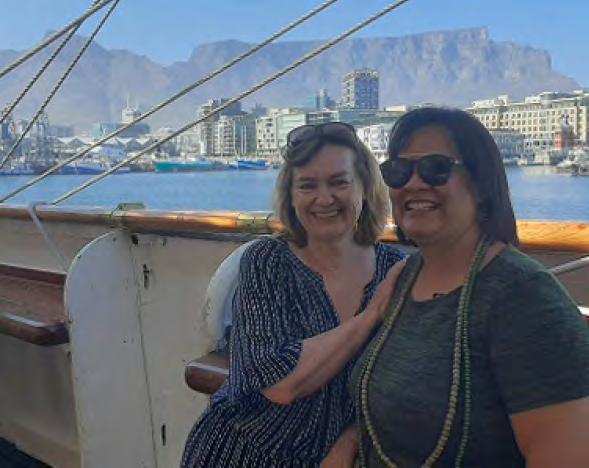
The Statsraad Lehmkuhl is a training ship which was built in 1914 and is currently circumnavigating the world to raise awareness about the role of the oceans in sustainable development. Part of the visit to Cape Town was to explore North–South collaborations and how the world can work together to achieve the UN’s SDGs. Prof Davison commented, “Being on board this beautiful ship was a very special experience. It was uplifting to meet academics from other universities around South Africa as well as Norway who are all working together to make a difference not only in research but also in tertiary education and schools.”
Four representatives from the SAMRC CPUT CHRC presented their research at the International Federation of Clinical Chemistry and Laboratory Medicine (IFCC) and the European Federation of Clinical Chemistry and Laboratory Medicine WorldLab-EuroMedLab Conference 2023 in July. Postdoctoral fellows Dr Don Matshazi and Dr Cecil Weale, PhD student Ms Abegail Tshivhase, and unit manager and researcher Dr Saarah Davids presented their research posters at the congress. In addition, Dr Matshazi was a speaker at the Young Scientist Forum at the main congress and Ms Tshivhase was a speaker at the session on microRNAs. Dr Matshazi and Ms Tshivhase both received an IFCC travel grant while Dr Weale received the African Federation of Clinical Chemistry (AFCC) travel grant. All four delegates received CPUT ConfCom funding to attend the congress.
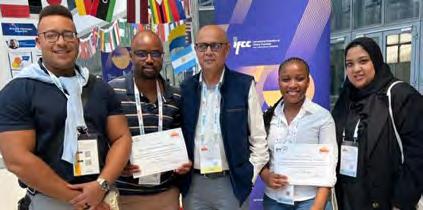
More than 11 500 delegates, exhibitors and guests from 118 countries attended the five-day congress, which was held in Rome. Dr Weale said the scientific programme of the conference boasted a Young Scientists Forum, which took place on the first official day of the congress. “This forum laid the foundation for early-career scientists, such as myself to interact with other emerging researchers in our niche, forging relationships and discussing potential collaborations.”
Dr Weale continued, “I am extremely thankful to the African Federation of Clinical Chemistry for awarding me their travel scholarship, which assisted greatly in contributing towards the travel expenses. I was one of eight individuals to have been awarded the scholarship, out of the pool of applications from young researchers across the continent. The trip was also supported by the Oppenheimer Memorial Trust, which also helped substantially in funding my travels for the conference… I am extremely appreciative to these distinguished bodies to have been awarded such prestigious grants, allowing me to attend this gathering of acclaimed clinical biochemist researchers, and present my research findings, in the form of a poster presentation titled ‘The association between altered miR-486-5p and miR-novel-chr1 40444 expression patterns and dysglycaemia in South African individuals’.”
In November, the SAMRC/CPUT Cardiometabolic Health Research Unit held a symposium themed ‘Cardiometabolic Disease in the Technological Era’ to explore the intricate intersection of health and technology. The event took place at the Cape Town Hotel School, with the keynote address delivered by Prof Faadiel Essop, Director of the Centre for Cardiometabolic Research in Africa at the Biomedical Research Institute, which is part of the Faculty of Medicine and Health Sciences at Stellenbosch University. Prof Essop’s talk titled ‘Enhancing cardiometabolic research care: Innovations for a healthier tomorrow’ set the tone for an intellectually stimulating day.
Each of the four sessions delved into critical facets of the field, namely AI, point of care and medical devices, e-health, and personalised medicine. In attendance were distinguished national experts and academics, including Dr Ashlin Rampul, a representative of the International Federation of Clinical Chemistry and Laboratory Medicine Young Scientist Task Team; Prof Annalise Zemlin, Head of Division at Chemical Pathology, SU; Prof Kotsedi Monyeki from the Department of Physiology and Environmental Health at the University of Limpopo, and Mr James Ross, co-founder and CEO of BixBio, a biotech company that is disrupting global healthcare by unlocking the power of African genomes for drug development.
What set the symposium apart was the active participation of young emerging researchers in pivotal organisational roles. The organising committee consisted of Dr Saarah Davids, Dr Shanel Raghubeer, Dr Cecil Weale, Dr Dipuo Motshwari and Dr Don Matshazi, who played a central role in the event. All members of the organising committee are affiliated with the South African Association for Clinical Biochemistry and Laboratory Medicine, under the auspices of the African Federation of Clinical Chemistry, and the International Federation of Clinical Chemistry and Laboratory Medicine. Guiding this dynamic team of emerging researchers are esteemed figures in the field, nameley Prof Tandi Matsha, Prof Glenda Davison and Prof Rajiv Erasmus. These seasoned scientists have provided mentorship, fostering an environment conducive to innovative research in the realm of noncommunicable diseases.

Prof Davison, who is the leader of CPUT’s Department of Biomedical Sciences and co-director of the SAMRC/ CPUT CHRC said, “For me, two current themes were highlighted across all the sessions. These were the power of collaboration and the move toward interdisciplinary and transdisciplinary partnerships. If we can work together, I believe the future is bright for South Africa and Africa.”
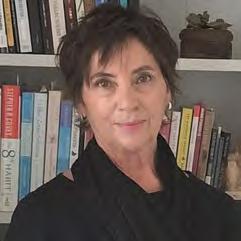
winbergc@cput.ac.za
This report summarises the research activities and achievements of the Professional Education Research Institute (PERI) and the SARChI Chair in Work-Integrated Learning (WIL) during 2023. Research highlights for this year include a visit of research partners from four international universities who participated in a writing retreat at Montfleur, Stellenbosch in January, resulting in collaborative research publications.
Prof Chris Winberg presented research findings at three international conferences: EDULEARN (Spain), SEFI (Ireland), and TOPPS (Greece) and delivered keynote addresses on WIL at USAF, THENSA and UJ. PERI member
Prof James Garraway secured an SASUF grant for research on WIL, with Prof Winberg as a co-researcher. Prof Winberg was invited to conduct a five-year review of UCT’s Centre for Research in Engineering Education (CREE).
One doctoral and one master’s student graduated from PERI this year, with the master’s student achieving a distinction.
Several publications are aligned with the SARChI Chair’s aims:
Aim 1: Curricula for the world-of-work
Four publications explored critical reflection in professional education research and the historical development of engineering education.
Aim 2: Pedagogies of employability
Four publications addressed collaborative writing for academic progress, a pedagogy of care in postgraduate education, graduate employability in digitised workplaces, and effective online WIL.
Aim 3: The evaluation, uptake and impact of WIL research
Two publications focused on a systematic review of Change Laboratory interventions and Cultural Historical Activity Theory for reimagining WIL.
Prof Winberg disseminated research findings through presentations at workshops and conferences, targeting academic staff and ultimately benefiting students. Research activities focused on vocational and technical education in STEM disciplines. PERI staff offered workshops on improving WIL and research methodology, reaching institutions beyond CPUT, namely, UCT, SU, UT and Stadio.
Master’s and doctoral students received support through a cohort approach, including a weekly writing group. Prof Winberg served on national bodies including the CHE and USAf, advising on WIL and technical and vocational education from a social and epistemic justice perspective.
Research publications, presentations and workshops contributed significantly to knowledge production in WIL. Prof Winberg’s contributions to national committees and working groups, along with editorial work for South African and international journals, showcase the value of the SARChI WIL Chair. Examining doctoral and master’s theses, and reviewing for journals, demonstrate Prof Winberg’s expertise in professional and vocational education, and graduate employability.
PERI members and the SARChI Chair in WIL delivered impactful research in 2023. Prof Winberg’s leadership and collaboration contributed to knowledge production, dissemination, and capacity building in WIL in South Africa and internationally.
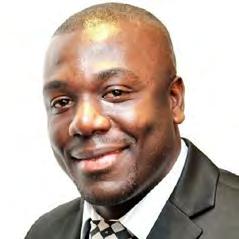

Ms Mandisa Silo
HOD: Department of Tourism & Events Management
Acting Manager: CETRA
silom@cput.ac.za
Dr Hilary Kennedy Nji Bama
Departmental Research Coordinator
Coordinator: CETRA
bamah@cput.ac.za
CETRA is the research unit for tourism and events-related research studies which is based in the Tourism & Events Management Department housed at the District 6 Campus. CETRA’s mandate is to showcase the institution’s contribution to tourism and events teaching and research, facilitate research activities, unite university researchers and practitioners domestically and internationally, and to provide research facilities for students and researchers. The centre’s key achievements for 2023 are captured below.
Stakeholder collaboration on research activities
Continuing the centre’s high-value focus on stakeholder collaboration, CETRA is working towards expanding its research collaboration network. To enhance this, students, researchers, and academic practitioners are presented with opportunities for collaboration in finding feasible answers to applied research questions or problems. In February, CETRA partnered with Cape Town Carnival organisers to conduct research to evaluate the event, primarily in relation to attendees’ profiles, satisfaction levels, and perceptions. Among the outcomes of this project were publications in DHET journals and proceedings from international conferences. This collaborative engagement continues, and the department has partnered with colleagues in Sports Management. With the help of Dr Janice HemmonsbeyLodewick and her team, students assisted with data collection, resulting in more than 400 surveys being gathered.
CETRA’s international partnerships were also strengthened through the Visiting Researcher Programme, an avenue for accomplishing academic exchange in the areas of collaborative research, capacity enhancement, and collaborative scholarly activity with various international institutional partners. In April, CETRA welcomed Prof Katja Stamer from DHBW Stuttgart University, Germany. Among the highlights of her visit, Prof Stamer engaged successfully with various students on her research focus, joint research activities and cooperation in the field of leadership.

Capacity development and enhancement programmes were also supported by CETRA this year. These afforded staff and students the opportunity to develop and enhance their scholarship by interacting and collaborating with academics and researchers in different localities and varying contexts. This resulted in benefits
such as skills enhancement, collaborative research establishment, and exposure to contemporary trends in research and innovation around issues of tourism, events and hospitality.
CETRA continued its growth trajectory by focusing on developing its research capacity through a research-aligned workshop and event. The aim of the Research Visibility Workshop was to empower the staff of the Tourism & Events Department and the Hospitality Department to understand the principles of research and enhancing research visibility. This was followed by a first-of-its-kind Research Speed Dating Event, aimed at showcasing the research interests of the staff from these two departments.


Staff and students were given opportunities to participate in exchange programmes, with two female researchers undertaking a three-month exchange at DHBW in Ravensburg, Germany between January and March. Key activities included engaging with experienced research academics at their host institution on issues related to their studies. Outreach activities, such as a visit to the Black Forest, were additional highlights of the programme.
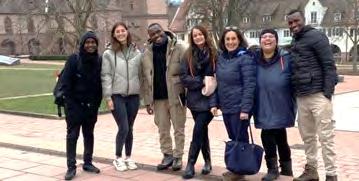

CETRA also facilitated the application to ConfCom and other related funding for staff and students to participate in national and international conferences. Key developments from these endeavours were DHET-accredited journal publications and conference proceedings. This included the participation of three staff members at the 10th Advances in Hospitality and Tourism Marketing and Management Conference in Rome, where presentations on topics around the effects of Covid-19 on South Africa’s business events sector were made.
In addition, staff and students from the centre participated in various local, national and international conferences, including the International Conference on Tourism Research, the International Conference on Hospitality and Tourism Management, and the International Conference: From Recovery to Resilience in Tourism – Sustainable Pathways for Transforming Tourism, where a range of papers and presentations were presented. Four colleagues presented at the FBMS Postgraduate Emerging Research Conference, where two won the Best Presentation award in their category.
Departmental colleagues continue to collaborate with peers in and across departments as well as with those at other universities. This has resulted in an increase in the number of outputs, with twelve authored and co-authored DHET-accredited journal articles. In addition, many of the department’s academic staff participate in the review process of leading journals, where they assess manuscripts for quality prior to publication. Dr Chris Hatting, a senior lecturer has
played a tremendous role taking the chairmanship of the 7th International Conference on Tourism Research Conference to be hosted by CPUT in March 2024.
During 2023, CETRA supported staff and student capacity enhancement programmes, including sponsorships for local and international conferences. These activities provided both staff members and students with opportunities to enhance their scholarship by interacting and collaborating with academics and researchers from various localities and contexts. Such interactions lead to benefits including capacity enhancement, the establishment of collaborative research, and exposure to contemporary trends in research and innovation in the fields of tourism, events and hospitality. Key developments from these endeavours, facilitated by CETRA’s collaboration with various partners, have been published in accredited journal publications and conference proceedings.
The Department of Tourism & Events supports staff development programmes organised by both the institution and external parties. Ms Zimkitha Bavuma, an emerging researcher and lecturer in the department who is affiliated with SAACI, was the recipient of the SAACI Enkuklu Youth Award 2023. The Tourism Department’s research coordinator

assistant, Ms Elhaam Abrahams, was part of the core team that designed and implemented Phase Two of the Sisonke Supervisor Mentorship Programme, CPUT’s flagship initiative aimed at mentoring and developing the next cohort of research supervisors across the institution. Phase Two of the programme saw the mentoring of more than 80 new supervisors, with colleagues from the Tourism Department,
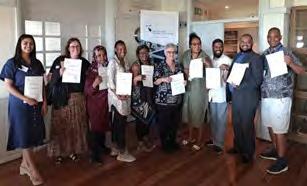
including Mr Nizaam Peck, Dr Phitlhelelo Mokoena, Mr Jean Irakoze and Dr Cynthia Dube among the successful participants. CETRA and the department are focused on encouraging the enrolment of current and emerging supervisors in Phase Three of the programme, which will be implemented in 2024.
To further highlight CETRA’s efforts to collaborate with industry partners, staff in the department have been invited to attend and deliver presentations at significant national workshops. Notably, Dr Cynthia Dube delivered a presentation at the South Africa Heritage Hub Inception Workshop, focusing on fostering a stronger, mutually beneficial relationship with Iziko Museum. This workshop resulted in an MoU being signed between the Tourism & Events Department and the museum. The MoU aims to advance collaboration on matters of mutual interest, promoting research and the development of the next generation of leaders and experts.

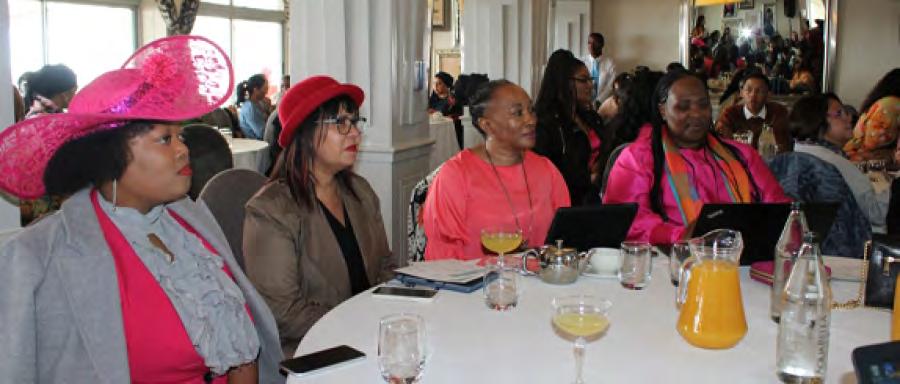
High tea celebration at Granger Bay
The FBMS hosted a high tea for staff and students to celebrate the contributions and successes of women. The glittering event, held at the Cape Town Hotel School, was themed ‘Empowered women embrace equity’, aligning with the International Women’s Day theme and speaks to the call for everyone to embrace equity to empower women across all spheres of society.
Ms Mandisa Silo, HOD: Tourism & Events Management said, “The faculty invited students from each department. We were encouraged by the notion of women empowerment and were of the view that the message should start from an educational perspective and, since we are in the business of education, we thought it was valuable to influence the upcoming women in our space. Women leaders in industry, academia and government are great examples of high achievement and leadership, including their role in empowering others.” Amongst the remarkable women who are trailblazers in their respective fields, Prof Vivienne Lawack from UWC was keynote speaker, and there was a panel discussion featuring Dr Nomvuselelo Songelwa, Ms Sikelelwa Waka and Ms Notukela Makohliso.
Reflecting on the event, Ms Silo said, “It was awesome and uplifting… It had a diverse programme with phenomenal speakers, entertainment and reflections on women empowerment.” She added that a unique feature was the integration of messages from men in the faculty, and the commitment made by women who signed a pledge to empower other women and promote equity. “The women’s pledge was a highlight and will be displayed in the faculty as a reminder of our commitment to ensuring equity.”
Ms Abenathi Ntelezi, who graduated with her Advanced Diploma in Tourism Management, was named the VC’s Medal recipient at CPUT’s April Graduation. The award goes to the top Advanced Diploma student who graduates at the ceremony. For the Advanced Diploma student, the highest average mark is calculated for all subjects over all four years of study at the institution. The student must have passed all courses at the first attempt and have completed the qualification in the minimum time permissible.
Ms Ntelezi, said, “The effort put in is well worth the results and I am grateful that the university recognises all of our hard work we put into our studies”. She credited her achievement to knowing and trusting God. In her first year, she remembers travelling from her home in Khayelitsha to campus every day, arriving early for class and leaving late at night because the environment at home was not conducive to learning. This top achiever never imagined herself in this field. In high school, she studied Maths and Science and always assumed that was where her destiny lay. She fell in love with Tourism

while attending Northlink College in 2018, where she graduated as the top achiever in Utilities and General Studies, earning trophies and certificates in this category. She obtained six distinctions in her final year, with an average of 86%.
In 2019, Ms Ntelezi enrolled in the Diploma in Tourism Management programme at CPUT, and she graduated in 2021 with an average of 87% and summa cum laude status. In 2022, she enrolled in the Advanced Diploma in Tourism Management, passing all her subjects with distinctions. Her highest mark was 96%, and her lowest was 86%, earning her summa cum laude status and recognition as the top achiever in the entire university, with an average of 92.5%.
In her second year at CPUT, through academic excellence, she was selected for an exchange programme at two institutions in Germany: Worms University of Applied Sciences and Osnabrück University. “Reaching this incredible accomplishment was not without its challenges, which I believe pushed me to where I am today.” She said one of the best comments her lecturers made was about her academic writing, how she articulates in speaking and writing, and how she reasons and analyses complex concepts. “They pushed me to achieve all of these qualifications, and some of them have even requested to be my supervisors when do my master’s next year.”
“This one is dedicated to my department, the Tourism & Events Management Department because it would not have been possible without their assistance. Simply being intelligent is insufficient, as without discipline and sacrifice, you may not amount to anything. This speaks to having the discipline to commit and the discipline to recognise that anything worthwhile requires some level of sacrifice. One of my guiding principles is that I know I am destined for greatness. Psalms 46:5 says, ‘God is within her, she will not fall’.”
Prof Paul Green, Dean of FBMS said, “I am extremely proud of Ms Ntelezi’s excellent academic performance.” He said that her academic excellence is a testament to her conscientious and disciplined approach to her studies. “She is indeed a role model to other students within the faculty, and we will observe her academic trajectory with great interest.”
HOD: Tourism and Events Management, Ms Mandisa Silo, said they are excited about Ms Ntelezi being awarded the VC’s Medal. “This is testimony to her hard work and intentional pursuit of academic excellence.” Ms Silo also commented that Ms Ntelezi has displayed exceptional leadership potential throughout her studies, and that the department has appointed her as a tutor, mentor and teacher’s assistant. “Indeed, this is well deserved, and the department congratulates her on this prestigious award.”

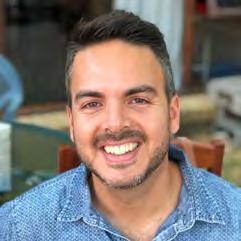
Prof Brendon Knott
Centre for Sport Business & Technology Research
knottb@cput.ac.za
https://orcid.org/0000-00016401-1970
Prof Simeon Davies
HOD: Sport Management
daviess@cput.ac.za
https://orcid.org/0000-0003-1156-6934
Faculty of Business & Management Sciences
The relocation of the Sport Management Department to the new educational site at Newlands Cricket Ground (NCG) signifies that the department and the Faculty of Business & Management Sciences are affirming important strategic changes to better align and position our research imperative. The Centre for Sport Business & Technology Research (CSBTR), physically located within the Sport Performance Laboratory (SPL) at NCG, features world-class testing equipment and dedicated research staff and technicians. The site also has a dedicated postgraduate learning and research space with direct access to the library that has a specialist selection of sport-themed books and online resources. The SPL provides the space and cutting-edge technology to pursue research and enhance education and technical training in terms of sport performance and technology.
The vision of the Centre is to be a research entity of outstanding excellence and innovation, in line with ‘One Smart CPUT’, creating leaders in the field of applied sport and leisure research to find solutions to South Africa’s scientific and socioeconomic challenges through sport and leisure-related research. The CSBTR engages in transdisciplinary research, primarily aligned with two institutional key focus areas, namely, FA 1: Bioeconomy & Biotechnology and FA 2: Human, Health & Social Dynamics.
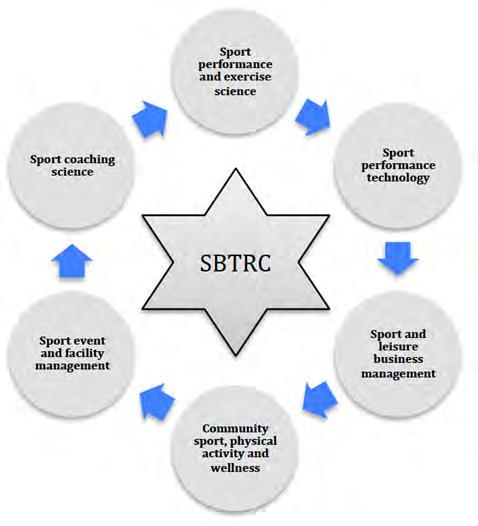
The CSBTR’s operational capacity supports the following inter-related research components:
• Research promotion, uptake and engagement (with a focus on postgraduate research and staff capacity building)
• Sport performance testing and rehabilitation
• Community engagement and internationalisation through research
• Third-stream income generation through research activities such as grant/ funding applications; conference hosting; equipment/venue usage; and technology development/testing
The senior academics associated with the CSBTR lead an array of activities and projects. The Rooibos Exercise Study continues as a flagship project, led by Prof Davies of the CSBTR, in collaboration with the Applied Microbial & Health Biotechnology Institute (AMHBI) at CPUT. Other current research projects and research funding proposals are summarised in the table below.
The new NCG site has led to several prestigious conferences hosted or planned through the CSBTR. The centre, supported by the Western Cape Department of Cultural Affairs and Sport (DCAS), hosted the Women in Sport conference in October. It is set to co-host the World Association of Sport Management (WASM) Conference in 2026. Furthermore, members of the CSBTR support international research conferences.
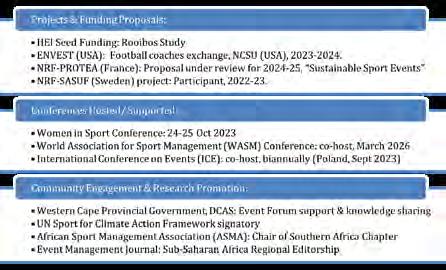



Prof Brendon Knott, a valued member of the Department of Sport Management’s Centre for Sport Business & Technology Research, authored an insightful article for The Conversation Africa (TCA) last year titled ‘Hosting the World Cup: What Qatar can learn from South Africa about nation branding’. This piece was honoured as the most-read article at the CPUT Research Excellence Awards in 2023, highlighting its impact and relevance.
This year, the academic also published another thought-provoking article for TCA, where he explored the potential benefits and drawbacks of South African Tourism sponsoring the renowned football club Tottenham Hotspur. Titled ‘South African Tourism wants to sponsor football club Tottenham Hotspur – Is it a good idea?’, the article provided valuable insights into global sport sponsorship and its implications for local tourism.
Throughout 2023, Prof Knott engaged with the media, conducting interviews with prominent outlets such as SABC radio and ENCA Africa TV. These interviews focused on his research regarding nation branding, particularly examining what Qatar could learn from South Africa’s experiences. His insights contributed to a broader understanding of effective nation-branding strategies in the context of major sporting events.
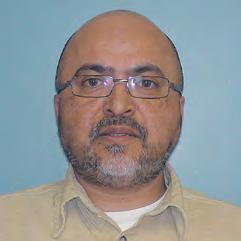
Mr Shamil Isaacs
isaacssh@cput.ac.za techstation@cput.ac.za www.tsct.co.za
The Technology Station: Clothing and Textiles (TSCT) is located in the Faculty of Engineering & the Built Environment on the Bellville Campus. This technology station provides innovation support to the clothing and textile industry in order to help improve competitiveness.
These specific services are provided to the clothing, textiles and related sectors:
Examples include manufacturing audits and assessment; industrial engineering services for the improvement of productivity, including process layout, optimising sewing methods and work-study; and advice on the acquisition of new or improved technology.
The TSCT has a number of specialised technologies available at its Bellville office for research, technology demonstration, prototype development and small-scale manufacturing. Small businesses can use the technology on an appointment basis, and staff at the TSCT also provide advice on the application and use of these machines. Charges are levied for the use of the equipment, but these are largely subsidised.
The laboratory at the TSCT provides product testing and an analysis service to the clothing, textile and related industries, as well as clothing- and textile-related consulting services, e.g., advice on material use and care, and fabric specification development.
The TSCT regularly hosts interns, providing them with the opportunity to work on client projects under supervision. This gives them valuable industry experience. Additionally, the TSCT offers a variety of short learning programmes tailored to the clothing, textiles and related industries.
Product development
Services include clothing product development using CAD software for pattern development; pattern grading (sizing); marker making (maximising the material utilisation before cutting); and 3D body scanning and 3D simulation on an avatar using data extracted from the 3D body scanner.
Dr Sweta Patnaik (Department of Clothing & Textile Technology) and Mr Shamil Isaacs (TSCT) were awarded First Prize for a paper included in the 9th Teaching Innovation & Entrepreneurship Excellence Awards 2023: An Anthology of Case Histories. They presented the paper titled ‘Promoting technopreneurship through educational initiatives’ at the 18th European Conference on Innovation and Entrepreneurship (ECIE 2023) at Universidade Portucalense, Porto.
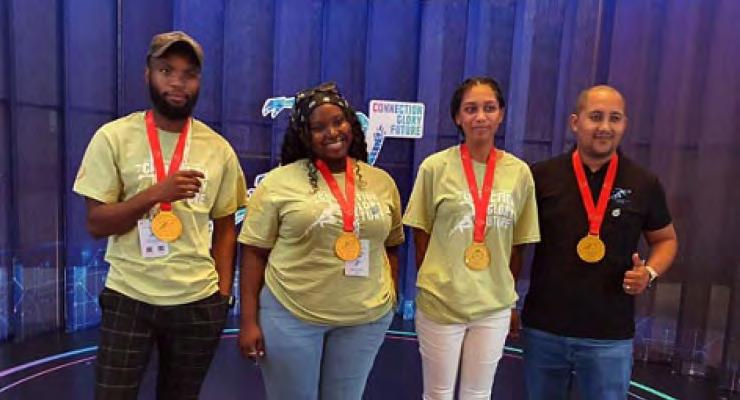
* for personal protective equipment (PPE) facility expansion and an incubation hub set-up for PPE and medical textile products
FOCUS AREA 6
The Digital Society
vanzyliz@cput.ac.za
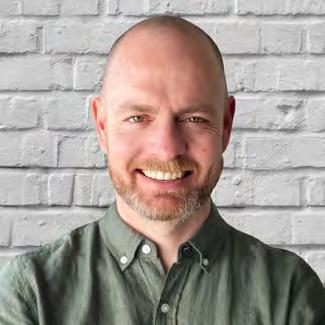
As a leading institution dedicated to advancing the Digital Society, our research delves into its multifaceted complexities, as articulated through our niche areas. We conduct in-depth studies of the Digital Society’s core components described below through our specialised centres (e.g., BIIC and PLMCC) and research hubs (e.g., BDR). As a university of technology, these scientific endeavours aim to develop sustainable solutions to complex (‘wicked’) real-world problems.
This niche area encompasses a broad spectrum of artificial intelligence, focusing on solving real-world problems and enhancing human decision-making. The emphasis is on expert systems that operate on predefined knowledge and learning models, emulating human cognitive processes to generate machine-driven solutions. This area also explores how vast amounts of raw data – structured, unstructured, incomplete, skewed or irrelevant – can be managed, manipulated, extracted and interpreted. The critical focus is transforming large datasets and continuous data streams into informed and actionable insights. This niche includes data generated from the Internet of Things (IoT), social media, big data, and the application of machine
learning, along with statistical and mathematical modelling methods for data analytics.
The sharing economy introduces a new approach to distributing goods and services, moving away from the conventional corporate model where companies sell products directly to consumers. Instead, the sharing economy facilitates peer-to-peer sharing and renting assets, such as cars, homes and personal time, primarily through mobile applications. This area has grown to encompass the gig economy – a labour market characterised by short-term jobs, contracts or freelance work rather than permanent employment. This emerging concept strongly emphasises social upliftment and economic growth, providing individuals with new opportunities to participate in the economy.
Additive manufacturing involves joining materials to create objects from 3D model data, typically layer by layer, contrasting with subtractive manufacturing techniques like traditional machining. This niche includes rapid prototyping,
additive fabrication, layer manufacturing, freeform manufacturing, and 3D printing, pivotal in revolutionising production processes and enabling innovative product design and development.
Distributed systems comprise networks of autonomous computers and devices interconnected through distribution middleware. These systems facilitate sharing resources and capabilities, providing users with a seamless and integrated access experience. In the context of Industry 4.0, distributed systems are crucial, encompassing the Cloud, IoT, robotics, automated process simulation, blockchain technologies and cybersecurity. This niche area is essential for managing and integrating information across diverse sources.
This area leverages ICT-based approaches to address complex societal, ecological, governmental and industrial challenges. It also encompasses aspects of digital citizenship, aiming to enhance user access to information and communication technologies and reduce digital inequalities. Additionally, ICT4D focuses on the ethical and responsible management of digital resources and technologies. Examples include e-government, e-health and e-learning initiatives that contribute to societal upliftment by adopting and developing digital technologies.
Collectively, the core elements of the Digital Society – artificial intelligence, the sharing economy, additive manufacturing, distributed systems, and ICT for development – form the backbone of our research efforts in this focus area, aligned with CPUT’s Vision 2030. Together, our researchers are dedicated to understanding and integrating these components to foster inclusive development, particularly within a fragile global ecosystem.

Prof Michael Twum-Darko Graduate Centre for Management
darkom@cput.ac.za
The year 2023 marked a significant period of growth and refinement for the Centre for Business Innovation and Incubation (BIIC). As an institute dedicated to fostering innovation and supporting entrepreneurial endeavours, BIIC continued to evolve its processes, expand its network, and refine its focus. This report outlines the key initiatives and achievements undertaken by the centre throughout the year.
One of the pivotal developments in 2023 was the establishment of the Advisory Committee (AC). Comprising seasoned professionals from various industries, the AC provides invaluable insights, guidance and mentorship to BIIC and its stakeholders. Through regular meetings and strategic discussions, the AC plays a crucial role in shaping BIIC’s direction, identifying opportunities and mitigating challenges.
Building upon BIIC’s existing strengths, the AC worked collaboratively to refine the centre’s value proposition. By aligning with market needs and emerging trends, BIIC enhanced its ability to attract and support innovative projects with high growth potential. The refined value proposition served as a cornerstone for the centre’s initiatives, ensuring relevance, competitiveness, and sustainability in the ever-evolving landscape of business innovation.
Recognising the need for a more robust and efficient selection process, BIIC amended its selection criteria and screening process for innovative projects. By incorporating feedback from industry experts and stakeholders, the centre implemented tailored criteria that prioritised scalability, market viability, and social impact. The revised screening process facilitated the identification of projects with the greatest potential for success, thereby optimising resource allocation and maximising impact.
In line with its commitment to nurturing talent and fostering entrepreneurship, BIIC actively participated in the Students’ Innovative Projects Showcase. By engaging with students and showcasing their
innovative projects, the centre provided a platform for young innovators to gain visibility, recognition and support. Through mentorship, networking opportunities, and access to resources, BIIC empowered students to transform their ideas into viable businesses with real-world impact.

Several projects supported by BIIC reached the minimum viable product (MVP) stage in 2023, and are now seeking venture capital or investment for commercialisation. These projects span various domains, including FinTech products and digital ecosystem platforms.
FinTech MVP products
Dropwork: A settlement platform facilitating local labour sourcing and payment within communities, aimed at enhancing economic empowerment and community resilience

Nimbly: An automated financial reporting mobile application catering to informal and unbanked community-based small businesses, providing realtime income and expenditure tracking
eBoleka: A blockchain settlement platform offering stokvel-styled loans to unbanked individuals in local communities, leveraging smart contracts and USSD technology
iGrosa: An augmented reality product integrated with blockchain and smart contracts, enabling virtual shopping experiences and price comparison for groceries
iTeksi: A blockchain token settlement platform for long-distance taxi services, incorporating prior booking, smart contracts, and revenue management mechanisms
Digital ecosystem platform and products
eVillageTM: A digital ecosystem initiative simulating township economy; aimed at revitalising township and rural economies, fostering youth entrepreneurship, and retaining wealth within local communities
Co-ParentTM: A multifunctional platform facilitating parenting plan creation, linking parents to credit industry services, and streamlining dispute resolution processes
OKDocTM: An online platform connecting healthcare providers with patients, enabling appointment booking, and improving workflow efficiency in medical practices
Student Performance Predictor: Machine learning algorithms focused on predicting and improving student performance based on social and academic factors; this initiative, driven by a doctoral thesis, aims to provide personalised interventions to address atrisk students’ needs, ultimately enhancing educational outcomes and student success
In conclusion, the year 2023 marked a period of significant progress and innovation for the Centre for Business Innovation and Incubation. Through the establishment of the Advisory Committee, refinement of the centre’s value proposition, amendment of selection criteria, participation in students’ showcases, and support for diverse projects reaching the MVP stage, BIIC continued to advance its mission of fostering entrepreneurship, driving innovation, and creating tangible social and economic impact. Looking ahead, the centre remains committed to nurturing talent, supporting innovative ventures, and contributing to the thriving ecosystem of business innovation.
The Executive Chairman and Co-Founder of TymeBank Group, Mr Coenraad Jonker, visited BIIC at the District 6 Campus in May. The purpose of the visit was to explore collaboration on the eVillage concept with BIIC and CPUT to revolutionise township and rural economies via digital banking.
The eVillage concept aims to integrate proven disruptive technologies and modelled small and medium-sized enterprises (SMEs) to create and retain wealth, thereby stimulating and growing township and rural economies. This initiative focuses on youth enterprise development and employment creation. Founder and leader of BIIC, Prof Michael Twum-Darko, stated that the collaboration with TymeBank will facilitate the finalisation of the eVillage prototype and bring it to fruition.
Dean of FBMS, Prof Paul Green, welcomed the guests and said, “What we are attempting to do here as a faculty, and also as the only UoT in the Western Cape, is to increase our footprint in these particular types of projects. Each business will be run by youth and CPUT graduates trained, mentored and coached by BIIC to become entrepreneurs.”
Those present included Ms Sandra Lloyd (TymeBank Community Franchising), Mr John Lawson (Cape Chamber of Commerce and Industry), Ms Sumaya Taliep (CoCT), Ms Bushra Razack (Phillippi Village), Mr Pasi Nieminen (XCFpay, Finland), Dr Revel Iyer
(CPUT), Mr Lucien Paulsen (Plum Systems), Mr Chris Mulhall (RD4A), Mr Mark Simon (Plum Systems), and CPUT students Mr Blessing Hove, Mr Roman Gulu and Mr Bambelela Mpulu.
Prof Twum-Darko is upbeat about the future of the eVillage concept, and said, “It was a very successful event for the chairperson and cofounder of Tyme Bank to visit and engage with the centre.” Mr Jonker’s visit was to determine how to collaborate with BIIC on the e-Village, eSpaza, eCampus business project, which has been innovated and incubated at the Centre since 2021.” He said the project emanated from a community engagement-driven research with MTech (Business Administration) students, conducted at Zwelethemba Township in the Breede Valley District Municipality.
Prof Twum-Darko, who is also Head of the Graduate Centre for Management (GCM), said TymeBank is interested in piloting the roll-out of eVillage, eSpaza, eCampus “to retain wealth in rural settings and townships to create employment and small enterprises of different services to simulate the local economy”.
Following numerous presentations, Mr Jonker said, “For me, the unique aspect of what I have heard this morning is the handson connection into the informal economy of South Africa.” Prof Green added, “Coen Jonker, I have seen the information and I am really excited that we can partner with you in all of this. strongly believe that we are going to see excellent results emanate from this particular collaboration and this particular partnership.”
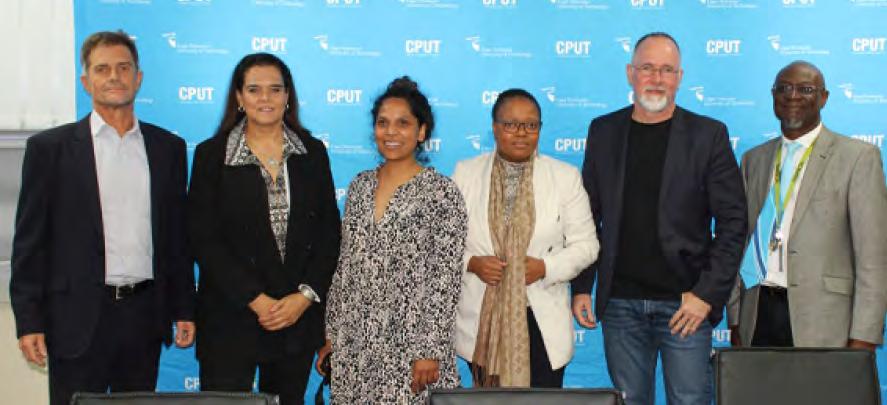

Entrepreneurs, innovators and potential stakeholders joined BIIC to celebrate innovation and entrepreneurship at SARETEC in November. Members of the centre and numerous presenters took the audience through the world of innovation, presenting a curated selection of groundbreaking projects nurtured within the BIIC. The attendees met the visionaries behind these ventures, connected with industry experts, and the innovators explored sponsorship and collaboration opportunities. The event showcased the ideas of students that have been innovated by the centre and are about to be incubated and become start-
ups. The goal was to attract more students, investors, partners, technology mentors and coaches.
In her opening remarks, Assistant Dean: R&I Prof Renitha Rampersad described BIIC as an entity focused on fostering sustainable, innovative, and tech-driven start-ups and small businesses. She highlighted BIIC’s role in nurturing promising ideas from students and graduates through research outputs or capstone projects by providing essential resources and support. Prof Rampersad noted that the showcase allowed a glimpse into
CPUT’s creative activities and cutting-edge projects, emphasising that the celebration of innovation was thanks to BIIC. She praised BIIC for creating a structured and supportive environment that enhances the chances of start-ups becoming successful and sustainable businesses.
Director: TTIL Dr Revel Iyer, who was a guest speaker, touched on the unemployment rate in South Africa, on entrepreneurship in higher education, and start-up support structures. Leader of BIIC Prof Michael Twum-Darko said, “The highlight for me is how far these students have come – from day one that they couldn’t even articulate what they want to do to pitching their businesses humbled me. Some of these students come from rural areas and townships, they have dreamt of solutions to addressing societal problems.”
Prof Twum-Darko highlighted that BIIC has since its inception faced challenges in navigating institutional policies to establish partnerships, foster collaboration, and secure funding for its activities. Despite these hurdles, he praised the success of student projects – some of which were showcased – and emphasised that these projects have the potential to turn graduates into employers rather than employees. Looking ahead, he anticipates increased student participation, enhanced relationships, and greater support from institutional structures to benefit both students and community innovators from the Western Cape.
Prof Rampersad added, “To our innovators, it’s great to see young people like you all taking the future into your own hands, with the fresh perspectives and fearlessness that the world needs. The imagination and energy you bring make every difference in the global adherence to the SDGs. Today is a celebration of CPUT’s newest innovators and entrepreneurs. Well done to each of you – you have the potential to achieve great things.”

Prof Stephen Bosman
bosmans@cput.ac.za
Faculty of Engineering & the Built Environment
Introduction
The Product Lifecycle Management Competency Centre (PLMCC) trains students and professionals in the art of system engineering, product design, and product lifecycle management. It also hosts and supervises design projects. The centre was launched in March 2012 as a partnership between the French government, Dassault Systèmes and CPUT. In 2017, the project was extended to include DUT. In November 2020, the contract between all four parties was extended for another three years.
The French Ministry of Education seconded a 3D Experience expert, Prof Laurent Marche, to work between the only two PLMCC centres in Africa, one at CPUT and the other at DUT. Prof Marche has introduced one of the most advanced software suites of its kind in the world. He spends 40% of his time working with the PLMCC on CPUT’s Bellville Campus and the Maritime Department in Granger Bay.
The Dassault Systèmes software provides students with an advanced 3D experience for product design, primarily used in Engineering but also applicable in teaching design and modelling skills across other disciplines in higher education.
The key members represent several departments and areas across the Faculty of Engineering & the Built Environment:
• Prof Stephen Bosman (Manager) (Industrial & Systems Engineering)
• Prof Laurent Marche (3D Experience Specialist, French Ministry of Education)
• Prof Veruscha Vester (Assistant Dean, R&I)
• Mr Bharet Morar (Industrial & Systems Engineering)
• Mr Donovan Cogan (F’SATI)
• Mr Robert Daniels (F’SATI)
• Mr Shane Martin (F’SATI)
• Mr Gregory Naidoo (F’SATI)
• Mr Butteur Ntamba Ntamba (Maritime)
• Mr Michael Peterson (Mechanical)
• Dr Mohammed Pourbehi (Civil & Geomatics)
• Mr Adile Thole (Chemical)
PLMCC has a partnership with its neighbouring research facility, the French–South African Institute of Technology (F’SATI), which hosts the African Space Innovation Centre (ASIC). ASIC is where CubeSats for South Africa are developed. Many of the projects run at the centre support the research and development of CubeSat projects.
ASIC’s mechanical team utilised the PLMCC facilities for much of the design and development process for both the MDASat-1 and M2MSat CubeSat projects. These projects focus on the Automatic Identification System for ship detection around the coast of southern Africa. This supports Operation Phakisa, which aims to expand maritime domain awareness for South Africa, as initially demonstrated by ZACube-2, launched in December 2018.
The ASIC team launched a constellation of three identical 2U nanosatellites, named the Maritime Domain Awareness Satellite (MDASat 1a, 1b, and 1c), into space on 13th January this year. The constellation was part of a larger SSO rideshare, launched with Falcon 9’s Transporter-3 from the Space Launch Complex 40 (SLC-40) at Cape Canaveral Space Force Station in Florida.
The research centre also facilitates two FDMbased 3D printers belonging to ASIC. These specialised printers were used by PLMCC members to print parts for replicas of the ZACube-2 CubeSat and aid in rapid design
development. These parts were then assembled by PLMCC interns at the facility. The PLMCC’s high-powered simulation PC was used for simulations related to research conducted for ASIC. A study was conducted to simulate the on-orbit thermal heating experienced by ZACube-2 and compare this with actual telemetry from the satellite, contributing to the development of thermal models for current and future CubeSat missions.
The PLMCC features a new range of highpowered PCs within the lab, upgraded in early 2023. These PCs aim to facilitate a seamless learning environment for students and lecturers, allowing both inexperienced and experienced CAD users to work effortlessly without concerns about technological capabilities.
Additionally, the PLMCC has been a valuable resource for the ASIC mechanical team when CPUT was invited to design and build a payload by the Aerospace System Research Institute (ASRI), formerly known as the Aerospace Systems Research Group (ASReG) at the University of KwaZulu-Natal (UKZN). The payload was designed using in-house CAD software and fabricated with the FDM 3D printer. The payload, along with others designed by local stakeholders within the South African space sector, was launched at Denel Overberg Test Range (OTR) on 16th March 2023 aboard the Phoenix-1B Mk II. The mission was a success and proved invaluable to the South African space sector, demonstrating the capabilities of both ASIC and the PLMCC.
The PLMCC hosts several bachelor’s and master’s students conducting research in fields including CubeSat development, additive manufacturing, and power plant research.
Prof Laurent Marche focuses on part optimisation within the wider PLMCC group.
Prof Stephen Bosman presented at the Improving Industrial Policy Intervention (IIPI) Workshop in Stellenbosch in October 2021. This initiative, involving KU Leuven, Belgium, Stellenbosch University, and CPUT, covered the topic ‘Trends in Industry X.0 and the impact on industrial policy’. The workshop was attended by delegates from more than 10 countries and was translated into French.
A collaboration with Hochschule Düsseldorf University of Applied Sciences (HSD) resumed in 2022 after a break due to Covid-19 shutdowns. Three students from HSD participated in various activities while completing their bachelor’s degrees. They utilised the facilities at both the PLMCC and the Department of Industrial and Systems Engineering and the Department of Mechanical and Mechatronics Engineering.

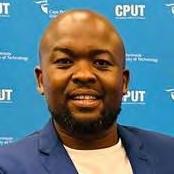
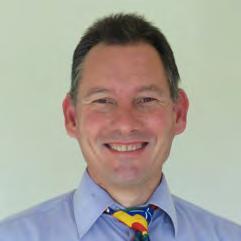
Dr Pieter Steenkamp steenkamppi@cput.ac.za
Dr Kuhle Zwakala zwakalak@cput.ac.za
Dr Kuhle Zwakala zwakalak@cput.ac.za
In line with the VC’s vision of ‘One Smart CPUT’, and to support the institutional focus on research output and supervision throughput, the Marketing Department consolidated its research efforts into a focus area called the Brand and Digital Research (BDR) Hub in October 2019. With the research emanating from the BDR Hub, the department endeavours to positively contribute to economic growth and 4th Industrial Revolution (4IR) challenges.
The main objectives of the BDR Hub are:
• to support the strategic goals of CPUT and FBMS, including focusing on 4IR
• to increase awareness of the research projects of the Marketing Department
• to explore and develop a pan-Africanist perspective regarding strategic brand and digital media management
• to improve the amount of research output
• to improve the quality of research output
• to attract high-calibre postgraduate students and researchers
• to attract high-calibre research projects
• to attract inter nal and external research funding
• to increase research and supervision capacity
• to foster and leverage industry linkages
Since its inception, the BDR Hub has so far:
• published 31 peer-reviewed academic articles in accredited journals
• graduated 14 postgraduate students (four doctorates and ten master’s - two summa cum laude and three cum laude)
• presented 14 conference papers
• published papers in three conference proceedings
• published eight book chapters
The BDR Hub total published research output for the academic year 2023 is 3.92, with 3.42 by academic staff and 0.5 by postgraduate students. Furthermore, two doctoral students graduated in April, who were supervised by one of the founding members of the BDR Hub, and another four master’s students graduated in December (two cum laude). Dr Kuhle Zwakala, a founding member of the BDR Hub, wrote and published an article, ‘The Springbok positive brand equity – Where to from here?’ on Bizcommunity https://www.bizcommunity.com/Article/196/82/243708.html.
The second BDR Hub Research Symposium was once again well attended by students, alumni, industry, international guests and staff. It was held at the Garden Court Victoria Junction Hotel in November. The symposium showcased the
exceptional work being done within the department. This included the master’s students’ research presentations that provided a glimpse into the innovative ideas and talent emerging from the BDR Hub. Mr Shaun Thomas, a Master of Marketing graduate, showcased his topical research ‘Social media as a marketing communication strategy among health-related NPOs in the Western Cape, South Africa’, which was well received by the audience. Another Master of Marketing graduate, Mr Jaydi Charles, presented his research ‘Influence of Google shopping ads on intention to purchase among Generation Y in Cape Town’, and gave a face to those personalised advertisements that we receive across digital platforms.
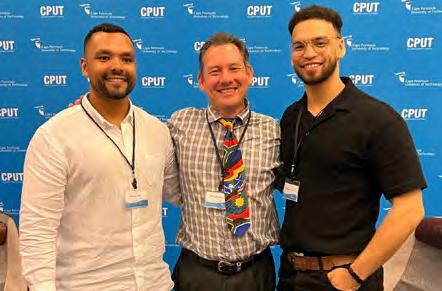
Prof Dr Daniel Michelis from Anhalt University of Applied Sciences, Germany was the keynote speaker, sharing his expertise on using digital communication for good. His address on
collaborative online international learning (COIL) and the other collaborations with the Marketing Department motivated enhanced collaboration. Furthermore, the Services Brand Management book, co-authored by Dr Pieter Steenkamp and Dr Kuhle Zwakala, was officially launched through an interview skilfully conducted by Prof Nkosivile Madinga from UCT. The book is a contribution to the field of brand strategy and an achievement for the department.
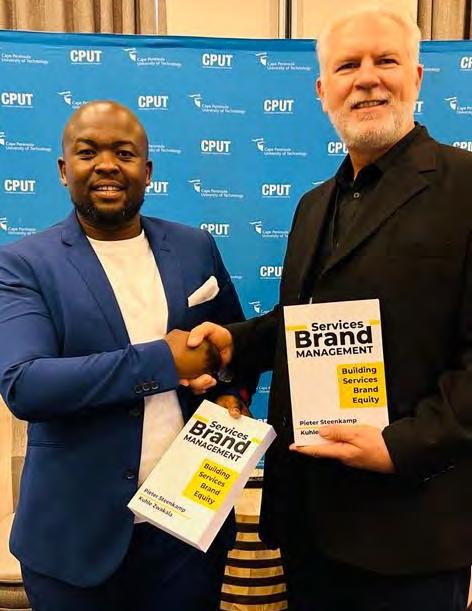
A group of Marketing Department Advanced Diploma students were awarded first prize for their paper presentation titled ‘Influence of social media influencers on different cohorts’ attitudes in South Africa’ at the annual FBMS Emerging Researcher Conference, themed ‘Voices of the future: Empowering emerging researchers in social sciences’.
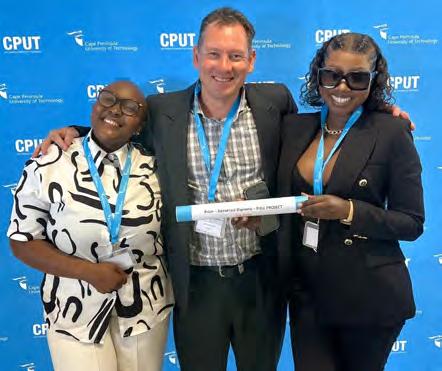
Two prominent CPUT academics embarked on a journey to close the gap in literature where services brand management is under-represented. This gap encouraged Dr Pieter Steenkamp and Dr Kuhle Zwakala to publish the first book specifically on this topic. The authors have been working hard over the years to take branding from one module in CPUT’s undergraduate Marketing curriculum to full subjects at both the Advanced Diploma and Postgraduate Diploma levels, making our university’s Marketing Department the most comprehensive brand strategy offering among universities in South Africa.
The academic book for higher education was launched by Prof Nkosivile Madinga of UCT. Prof Madinga emphasised that the book is aimed at graduate marketing students and industry professionals. The launch took place at Garden Court Victoria Junction during the annual Brand and Digital Research (BDR) Hub Symposium. Dr Zwakala said the event was ideal for the launch. It brought together marketing academics, academics from related departments that could benefit from the book, and international faculty and postgraduate students who are already working within the industry.
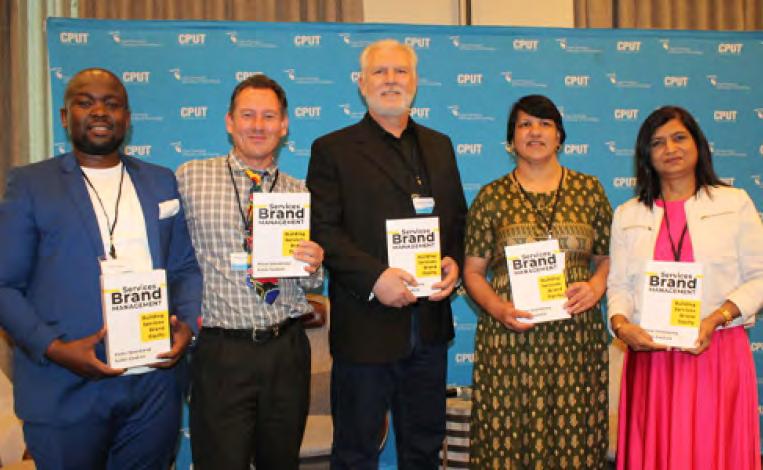
Reflecting on the symposium, Dr Zwakala said in line with VC Prof Chris Nhlapo’s vision of One Smart CPUT and to support the institutional focus on research output and supervision throughput, the BDR Hub was established by him (Dr Zwakala), Dr Steenkamp, and Prof Rodney Duffett in 2019 to consolidate and focus research efforts within the Marketing Department. Dr Zwakala said the symposium showcases the progress and output of the BDR Hub for the year.
BDR Hub partner Prof Daniel Mitchelis from Anhalt University of Applied Sciences in Germany was a guest speaker. Prof Tudor Edu from Romanian–American University, another BDR Hub partner, joined the event virtually. Acting Head of the Marketing Department, Ms Mandy Jones, delivered a vote of thanks and said, “Dr Zwakala, Dr Steenkamp, we are extremely proud of your achievements and contributions.”
4IR 4th Industrial Revolution
AAC African Agri Council
AMHBI Applied Microbial & Health Biotechnology Institute (CPUT)
AMTL Adaptronics Advanced Manufacturing Technology Laboratory (CPUT)
ASIC Africa Space Innovation Centre (CPUT)
ATS Agrifood Technology Station (CPUT)
AU African Union
BDR Brand & Digital Research Hub (CPUT)
BIIC Centre for Business Innovation & Incubation (CPUT)
BioERG Bioresource Engineering Research Group (CPUT)
CDPES Centre for Distributed Power and Electronic Systems (CPUT)
CEO Chief Executive Officer
CERPIA Centre for Enterprise Research Partnership and Innovation in Africa
CETRA Centre for Tourism Research in Africa (CPUT)
CHEC Cape Higher Education Consortium (SA)
CHED Centre for Higher Education Development (Fundani, CPUT)
CHRC Cardiometabolic Health Research Centre (SAMRC/ CPUT/CHRC)
CIET Centre for Innovation in Educational Technology (CPUT)
CITE Centre for Initial Teacher Education (CPUT)
CIR Centre for Instrumentation Research (CPUT)
ConfCom Conference Committee (CPUT)
CPSR Centre for Power Systems Research (CPUT)
CPUT Cape Peninsula University of Technology (SA)
CRTDS Centre for Real-Time Distributed Systems (CPUT)
CSAEMS Centre for Substation Automation & Energy Management Systems (CPUT)
CSIR Council for Scientific and Industrial Research (SA)
CTICC Cape Town International Convention Centre
CUT Central University of Technology (SA)
CWSR Centre for Water & Sanitation Research (CPUT)
DEECE Department of Electrical, Electronic and Computer Engineering (CPUT)
DFST Department of Food Science & Technology (CPUT)
DHET Department of Higher Education & Training (SA)
DSI Department of Science & Innovation (SA) (formerly DST)
DUT Durban University of Technology (SA)
DVC Deputy Vice-Chancellor
DVC: RTIP Deputy Vice-Chancellor: Research, Technology Innovation & Partnerships
ECP Extended curriculum programme
EMS Emergency medical services
EU European Union
FBMS Faculty of Business Management Sciences (CPUT)
FAS Faculty of Applied Sciences (CPUT)
FEBE Faculty of Engineering & the Built Environment (CPUT)
FFRU Functional Foods Research Unit (CPUT)
FHWS Faculty of Health & Wellness Sciences (CPUT)
FID Faculty of Informatics & Design (CPUT)
FPRC Flow Process & Rheology Centre (CPUT)
F’SATI French–South African Institute of Technology (SA and CPUT)
GBV Gender-based violence
HE Higher Education
HEAIDS Higher Education and Training HIV/AIDS Programme
HEIs Higher education institutions
HELTASA Higher Education Learning & Teaching Association of South Africa
HERS-SA Higher Education Resource Services South Africa
HOD Head of Department
HSRC Human Sciences Research Council (SA)
IT Information Technology
ISSTAA Innovative Small Satellite Technology & Applications for Africa
JET Just Energy Transition
KUAS Koblenz University of Applied Sciences (Germany)
MDA Maritime domain awareness
MITS Medical Imaging and Therapeutic Sciences (CPUT)
MOCAA Museum of Contemporary Art Africa (Cape Town)
MoU Memorandum of understanding
MUT Mangosuthu University of Technology (SA)
NDP National Development Plan (SA)
NGO Non-governmental organisation
NMU Nelson Mandela University (SA)
NPC Non-profit company
NPO Non-profit organisation
NQF National Qualification Framework (SA)
NRF National Research Foundation (SA)
NSTF National Science and Technology Forum (SA)
NWU North-West University (SA)
PERI Professional Education Research Institute (CPUT)
PLMCC Product Lifecycle Management Competency Centre (CPUT)
R4M Reading for Meaning (CPUT)
R&D Research & development
RIFTAL Research and Innovation Fund for Teaching and Learning (CPUT)
RITAL Research Innovation in Teaching and Learning Conference
RPL Recognition of Prior Learning
RTIP Research, Technology Innovation & Partnerships (CPUT)
RU Rhodes University (SA)
SA South Africa
SAASTA South African Agency for Science & Technology Advancement
SAMRC South African Medical Research Council
SANSA South Africa National Space Agency
SARChI South African Research Chairs Initiative
SARETEC South African Renewable Energy Centre (CPUT)
SASUF South Africa–Sweden University Forum
SDGs Sustainable Development Goals (UN)
SL Service-Learning
SLCE Service-Learning and Civic Engagement (CPUT)
RTI-SIP Strategic Initiatives & Partnerships (CPUT)
SRC Student Representative Council
STEM Science, technology, engineering and mathematics
SU Stellenbosch University (SA)
THENSA Technological Higher Education Network of South Africa
TIA Technology Innovation Agency (SA)
TTO Technology Transfer Office (CPUT)
TUT Tshwane University of Technology (SA)
TSCT Technology Station: Clothing & Textiles (CPUT)
TVET Technical and Vocational Education and Training
UCDG University Capacity Development Grant (CPUT)
UCT University of Cape Town (SA)
UFS University of the Free State (SA)
UJ University of Johannesburg (SA)
UKZN University of KwaZulu Natal (SA)
UPEC University of Paris East Créteil
UN United Nations
Unisa University of South Africa (SA)
UoT University of technology
UP University of Pretoria (SA)
URF University Research Fund (CPUT)
USAf Universities South Africa
UWC University of the Western Cape (SA)
VC Vice-Chancellor
WIL Work-integrated learning
WITS University of the Witwatersrand (SA)
WRLC Wholesale & Retail Leadership Chair (SA)
WSU Walter Sisulu University (SA)
RESEARCH, TECHNOLOGY INNOVATION & PARTNERSHIPS
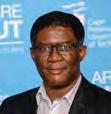
Dr David Phaho
Tel: 021 959 6203
Fax: 021 959 6002
Email: phahod@cput.ac.za
Room 228, Administration Building, Bellville

Ms Liziwe Poni
Secretary to the DVC
Tel: 021 959 6242
Fax: 021 959 6002
Email: ponil@cput.ac.za
Room 228, Administration Building, Bellville


Prof Dina Burger Director: Research
Ms Edwina Pedro Secretary to the Director




Dr Hester M Burger Manager: Research Integrity
Ms Pumza Makaula Manager: Research Grants
Mr Clement Matasane Manager: Research
Tel Email Address 021 460 3878
burgerd@cput.ac.za
Room 2.8, Administration Building, District Six Campus
Tel Email Address 021 460 3878 pedroe@cput.ac.za
Room 2.8, Administration Building, District Six Campus
Tel Email Address 082 873 1484
burgerh@cput.ac.za
Room 2.8, Administration Building, District Six Campus
Tel Email Address 021 460 3895 makaulap@cput.ac.za
Room 2.8, Administration Building, District Six Campus
Tel Email Address 021 460 3383 matasanec@cput.ac.za
Room 2.8, Administration Building, District Six Campus
Dr Patricia Smit Manager: Capacity Development (until March 2024)
Tel Email Address 021 460 3539/021 959 6249 smitpa@cput.ac.za
Room 2.8, Administration Building, District Six Campus and B2.07 New Electrical Engineering Building, Bellville Campus



Ms Luyolo Oyo
Co-ordinator: Research Information Management System (RIMS)
Ms Nikeziwe Ngcani
Co-ordinator: Finance
Tel Email Address 021 460 3843
kamatil@cput.ac.za
Room 2.8, Administration Building, District Six Campus
Tel Email Address 021 460 3539
ngcanin@cput.ac.za
Room 2.8, Administration Building, District Six Campus
Ms Lara Lee Smith
Co-ordinator: Research
Writing, Information & Publications
TEAM

Ms Shafeeqa Hendricks-Dramat Research Finance Administrator (until August 2023) Research Grants Officer (from September 2023)

Mr Marvin La Meyer Research Finance Administrator
Tel Email Address 021 460 3328
smithll@cput.ac.za
Room 2.8, Administration Building, District Six Campus
Tel Email Address 021 460 4241
dramats@cput.ac.za
Room 2.8, Administration Building, District Six Campus
Tel Email Address 021 460 3798
lameyerm@cput.ac.za
Room 2.8, Administration Building, District Six Campus
TEAM


Ms Phathiswa Swaartbooi Research Finance Administrator
Ms Elizabeth Gemba Research Assistant Administrator (intern)
Tel Email Address 021 460 3796/021 959 4489
swartbooip@cput.ac.za
CPGS offices, New Library Building, Bellville Campus
Email Address gembae@cput.ac.za
Room 2.8, Administration Building, District Six Campus
Ms Anelisa Mtabateni
DSI-HSRC Intern
Ms Simnikiwe Tamana Project Administrator Assistant

Ms Zuzeka Tshayina Research Assistant Administrator (intern)
Email Address mtabatenia@cput.ac.za
Room 2.8, Administration Building, District Six Campus
Tel Email Address 021 959 4338 tamanas@cput.ac.za
Room 2.8, Administration Building, District Six Campus
Email Address tshayinaz@cput.ac.za
Room 2.8, Administration Building, District Six Campus
Mr Chris Majola Research Finance Administrator (from September 2024)
Ms Sinothando Ndiko DSI-HSRC Intern (from August 2024
Tel Email Address 021 460 3539 majolamh@cput.ac.za
Room 2.8, Administration Building, District 6 Campus
Tel Email Address 021 460 3383
ndikosi@cput.ac.za
Room 2.8, Administration Building, District 6 Campus
Director

Prof Izak van Zyl
Director
Manager

Dr Corrie Uys
Interim CPGS Manager (until March 2023)
Tel Email Address 021 953 8455 vanzyliz@cput.ac.za
Centre for Postgraduate Studies New Library Building, Bellville Campus
Tel Email Address 021 460 3258 uysc@cput.ac.za
Centre for Postgraduate Studies
New Library Building, Bellville Campus
TEAM



Mr Stanley Lekata Co-ordinator: Postgraduate Development (until July 2023)
Email Address lekatas@cput.ac.za
Centre for Postgraduate Studies New Library Building, Bellville Campus
Ms Zimkhitha Mbunge NRF Administrator (until February 2023)
Email Address mbungez@cput.ac.za
Centre for Postgraduate Studies
New Library Building, Bellville Campus
Ms Ethne Mentoor Finance Administrator (until July 2023)
Tel Email Address 021 959 6505 mentoore@cput.ac.za
Centre for Postgraduate Studies
New Library Building, Bellville Campus
Co-ordinator

Mr Masimba Paradza CPGS Coordinator (until March 2023)
Email Address paradzam@cput.ac.za
Centre for Postgraduate Studies New Library Building, Bellville Campus

Ms Phaphama Mhlekwa Evaluation & Monitoring Officer

Ms Mtembukazi Sibindlana Bursary Administrator
Tel Email Address 021 953 8462 mhlekwap@cput.ac.za Centre for Postgraduate Studies
New Library Building, Bellville Campus
Tel Email Address 021 953 8600 sibindlanam@cput.ac.za Centre for Postgraduate Studies
New Library Building, Bellville Campus
Director

Dr Revel Iyer
Director: Technology Transfer Office
Manager

Mr Marlin Fransman
Tech Transfer Manager: Legal
Tel Email Address 021 959 6431
iyerr@cput.ac.za Technology Transfer Office Bellville Campus
Tel Email Address 021 959 5605 fransmanm@cput.ac.za
Technology Transfer Office Bellville Campus




Ms Halimah Rabiu Tech Transfer Officer: Funding
Tel Email Address 021 959 6879
rabiuh@cput.ac.za
Technology Transfer Office Bellville Campus
Ms Karen Martin TTO Secretary
Tel Email Address 021 959 6044 martink@cput.ac.za
Technology Transfer Office Bellville Campus
Ms Jayde Barends Senior Tech Transfer Officer: Marketing
Ms Veruscha Naidoo Tech Transfer Officer: Contracts
Tel Email Address 021 959 5871 barendsj@cput.ac.za Technology Transfer Office Bellville Campus
Tel Email Address 021 959 5871 naidoov@cput.ac.za Technology Transfer Office Bellville Campus
Mr Siyabonga Zulu Tech Transfer Officer: IP

Dr Al Farao Tech Transfer Officer: Business Development
Tel Email Address 021 959 5871 zulys@cput.ac.za
Technology Transfer Office Bellville Campus
Tel Email Address 021 959 5871
faraoal@cput.ac.za Technology Transfer Office Bellville Campus
Director

Prof Judy Peter
Director: RTIP-SIP
Managers


Dr Tasmeera Singh
Manager: International Relations
Tel Email
Address 021 959 6405
peterj@cput.ac.za
Room 0004, Administration Building, Bellville Campus
Email Address singht@cput.ac.za Room 0004, Administration Building, Bellville Campus



Dr Elma Maleka
Manager: Research Uptake
Email Address malekae@cput.ac.za Room 0004, Administration Building, Bellville Campus

Ms Mercia Bosman
Administrative Assistant: International Relations
Tel Email Address 021 959 6595
bosmanm@cput.ac.za
Room 0004, Administration Building, Bellville Campus
Ms Hlengiwe Nzama
Administrative Assistant: Research Uptake
Tel Email Address 021 959 6595
nzamah@cput.ac.za
Room 0004, Administration Building, Bellville Campus
Ms Xolelwa Bashala
Administrator: RTI SIP
Mr Dingaan Booi
Officer: International Relations
Tel Email Address 021 959 4502
bashalax@cput.ac.za
Room 0004, Administration Building, Bellville Campus
Tel Email Address 021 959 6048
booidi@cput.ac.za
Room 0004, Administration Building, Bellville Campus
The 2023 Research Report is published by the CPUT Directorate Research Development.
The editor acknowledges with thanks the contributions of:
• Colleagues from the Directorate Research Development for a variety of input
• Mr Aphiwe Boyce, Mr Craig Christians, Mr Kwanele Butana, Ms Ilse Fredericks and Ms Lauren Kansley (Marketing & Communication Department) for news items and photographs retrieved from the CPUT News Archive
• Dr André Steenkamp (Faculty of Education) for the Afrikaans translation of the VC’s foreword
• Ms Mirriam Nonkazimlo Mdledle (Faculty of Education) for the isiXhosa translation of the VC’s foreword
• CPUT researchers, faculties, support units and research institutes for various contributions and assistance with fact-checking
• All the helpful staff at the Marketing & Communication Department

EDITOR
Ms Lara Lee Smith
Directorate Research Development smithll@cput.ac.za
DESIGN CONCEPT & LAYOUT
Bridgette Hunt bahunt@wol.co.za


Proof-reading
Ms Luyolo Oyo kamatil@cput.ac.za
Proof-reading
Ms Cheryl Thomson cherylthomson2@gmail.com
• Last, but certainly not least, Ms Bridgette Hunt for her design concept and layout and Ms Luyolo Oyo and Ms Cheryl Thomson for proof-reading +27 21 959 6767 info@cput.ac.za www.cput.ac.za @cput @wearecput www.facebook.com/cput.ac.za